Sustainable Practices and its Impact on Retaining and Attracting Valuable Customers within Hotel Industry: A Study of Marriott
VerifiedAdded on 2023/06/09
|67
|24115
|402
AI Summary
This dissertation explores the impact of sustainable practices on retaining and attracting valuable customers within the hotel industry, with a focus on Marriott. It examines the reasons for sustainability being a key factor for the future of the industry, the sustainable practices adopted by Marriott, and the challenges faced in the absence of such practices. The study also investigates the need for sustainable practices and their impact on customer retention and attraction.
Contribute Materials
Your contribution can guide someone’s learning journey. Share your
documents today.
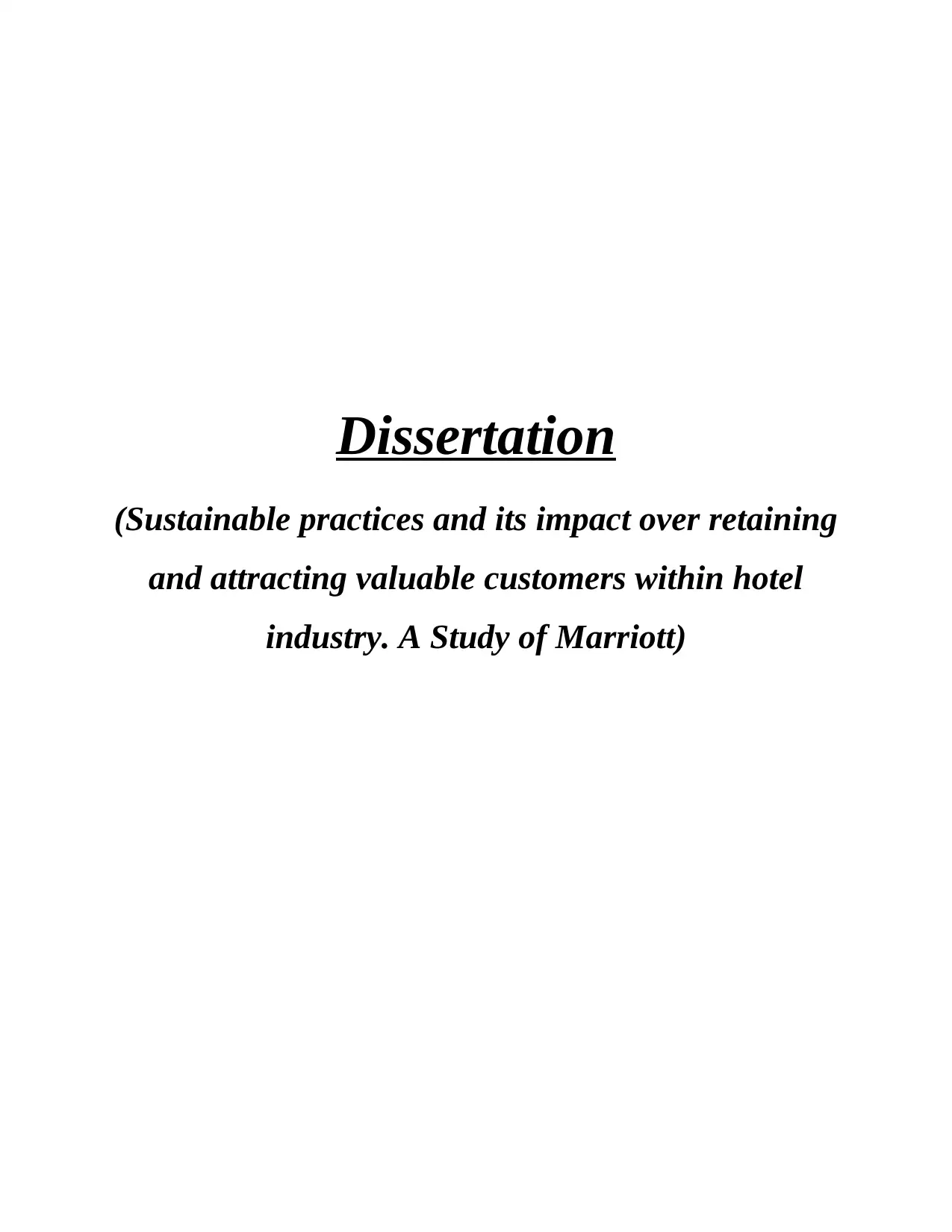
Dissertation
(Sustainable practices and its impact over retaining
and attracting valuable customers within hotel
industry. A Study of Marriott)
(Sustainable practices and its impact over retaining
and attracting valuable customers within hotel
industry. A Study of Marriott)
Secure Best Marks with AI Grader
Need help grading? Try our AI Grader for instant feedback on your assignments.
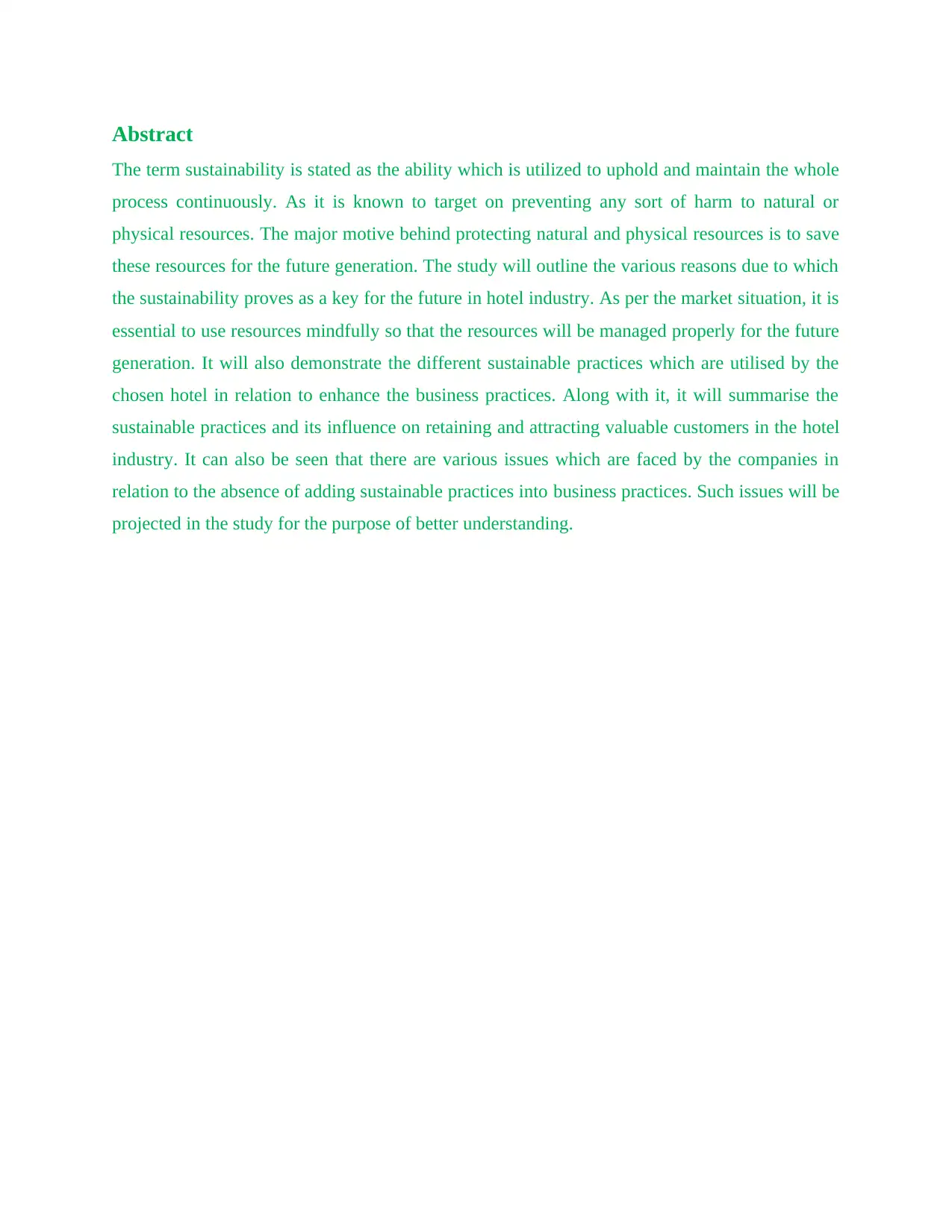
Abstract
The term sustainability is stated as the ability which is utilized to uphold and maintain the whole
process continuously. As it is known to target on preventing any sort of harm to natural or
physical resources. The major motive behind protecting natural and physical resources is to save
these resources for the future generation. The study will outline the various reasons due to which
the sustainability proves as a key for the future in hotel industry. As per the market situation, it is
essential to use resources mindfully so that the resources will be managed properly for the future
generation. It will also demonstrate the different sustainable practices which are utilised by the
chosen hotel in relation to enhance the business practices. Along with it, it will summarise the
sustainable practices and its influence on retaining and attracting valuable customers in the hotel
industry. It can also be seen that there are various issues which are faced by the companies in
relation to the absence of adding sustainable practices into business practices. Such issues will be
projected in the study for the purpose of better understanding.
The term sustainability is stated as the ability which is utilized to uphold and maintain the whole
process continuously. As it is known to target on preventing any sort of harm to natural or
physical resources. The major motive behind protecting natural and physical resources is to save
these resources for the future generation. The study will outline the various reasons due to which
the sustainability proves as a key for the future in hotel industry. As per the market situation, it is
essential to use resources mindfully so that the resources will be managed properly for the future
generation. It will also demonstrate the different sustainable practices which are utilised by the
chosen hotel in relation to enhance the business practices. Along with it, it will summarise the
sustainable practices and its influence on retaining and attracting valuable customers in the hotel
industry. It can also be seen that there are various issues which are faced by the companies in
relation to the absence of adding sustainable practices into business practices. Such issues will be
projected in the study for the purpose of better understanding.
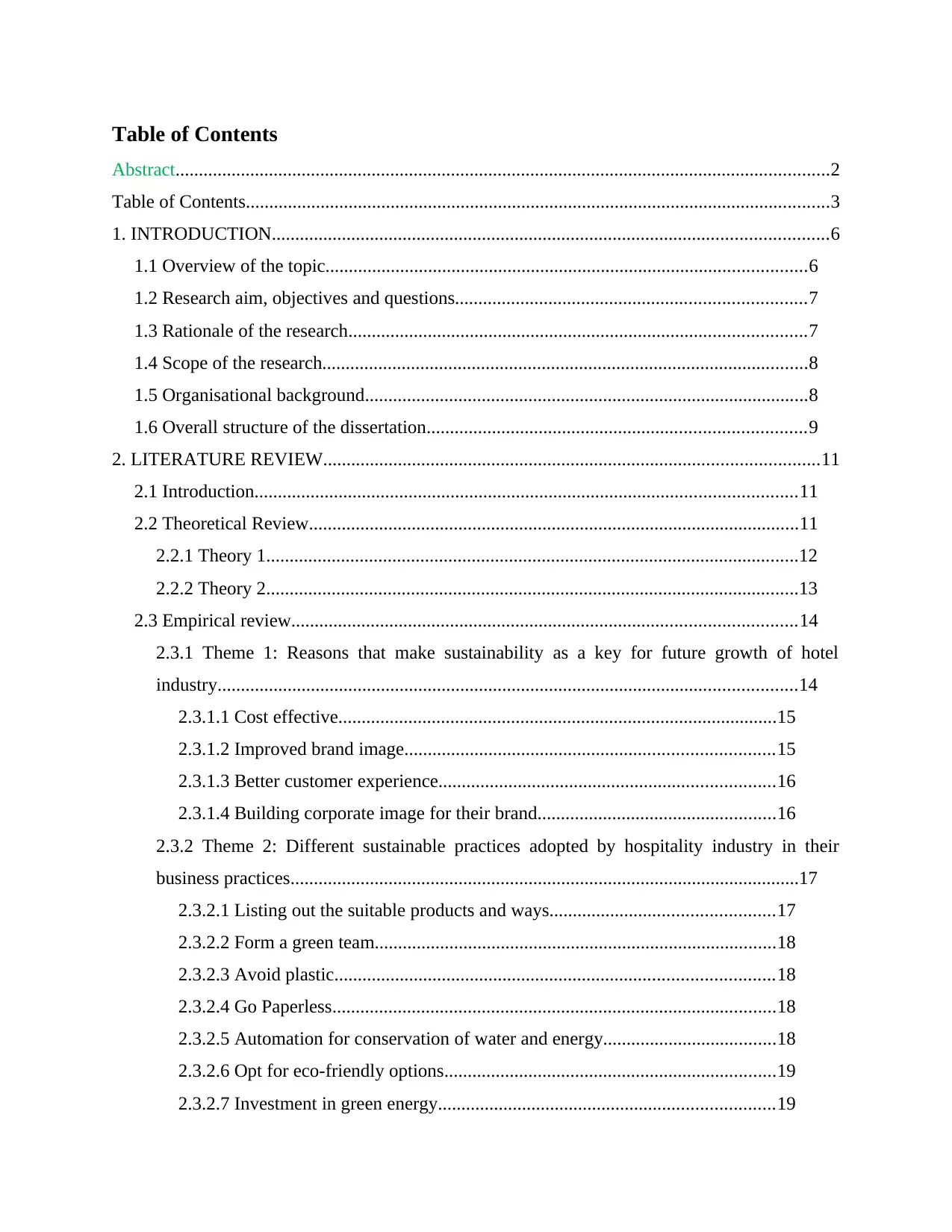
Table of Contents
Abstract............................................................................................................................................2
Table of Contents.............................................................................................................................3
1. INTRODUCTION.......................................................................................................................6
1.1 Overview of the topic.......................................................................................................6
1.2 Research aim, objectives and questions...........................................................................7
1.3 Rationale of the research..................................................................................................7
1.4 Scope of the research........................................................................................................8
1.5 Organisational background...............................................................................................8
1.6 Overall structure of the dissertation.................................................................................9
2. LITERATURE REVIEW..........................................................................................................11
2.1 Introduction....................................................................................................................11
2.2 Theoretical Review.........................................................................................................11
2.2.1 Theory 1..................................................................................................................12
2.2.2 Theory 2..................................................................................................................13
2.3 Empirical review............................................................................................................14
2.3.1 Theme 1: Reasons that make sustainability as a key for future growth of hotel
industry............................................................................................................................14
2.3.1.1 Cost effective..............................................................................................15
2.3.1.2 Improved brand image...............................................................................15
2.3.1.3 Better customer experience........................................................................16
2.3.1.4 Building corporate image for their brand...................................................16
2.3.2 Theme 2: Different sustainable practices adopted by hospitality industry in their
business practices.............................................................................................................17
2.3.2.1 Listing out the suitable products and ways................................................17
2.3.2.2 Form a green team......................................................................................18
2.3.2.3 Avoid plastic..............................................................................................18
2.3.2.4 Go Paperless...............................................................................................18
2.3.2.5 Automation for conservation of water and energy.....................................18
2.3.2.6 Opt for eco-friendly options.......................................................................19
2.3.2.7 Investment in green energy........................................................................19
Abstract............................................................................................................................................2
Table of Contents.............................................................................................................................3
1. INTRODUCTION.......................................................................................................................6
1.1 Overview of the topic.......................................................................................................6
1.2 Research aim, objectives and questions...........................................................................7
1.3 Rationale of the research..................................................................................................7
1.4 Scope of the research........................................................................................................8
1.5 Organisational background...............................................................................................8
1.6 Overall structure of the dissertation.................................................................................9
2. LITERATURE REVIEW..........................................................................................................11
2.1 Introduction....................................................................................................................11
2.2 Theoretical Review.........................................................................................................11
2.2.1 Theory 1..................................................................................................................12
2.2.2 Theory 2..................................................................................................................13
2.3 Empirical review............................................................................................................14
2.3.1 Theme 1: Reasons that make sustainability as a key for future growth of hotel
industry............................................................................................................................14
2.3.1.1 Cost effective..............................................................................................15
2.3.1.2 Improved brand image...............................................................................15
2.3.1.3 Better customer experience........................................................................16
2.3.1.4 Building corporate image for their brand...................................................16
2.3.2 Theme 2: Different sustainable practices adopted by hospitality industry in their
business practices.............................................................................................................17
2.3.2.1 Listing out the suitable products and ways................................................17
2.3.2.2 Form a green team......................................................................................18
2.3.2.3 Avoid plastic..............................................................................................18
2.3.2.4 Go Paperless...............................................................................................18
2.3.2.5 Automation for conservation of water and energy.....................................18
2.3.2.6 Opt for eco-friendly options.......................................................................19
2.3.2.7 Investment in green energy........................................................................19
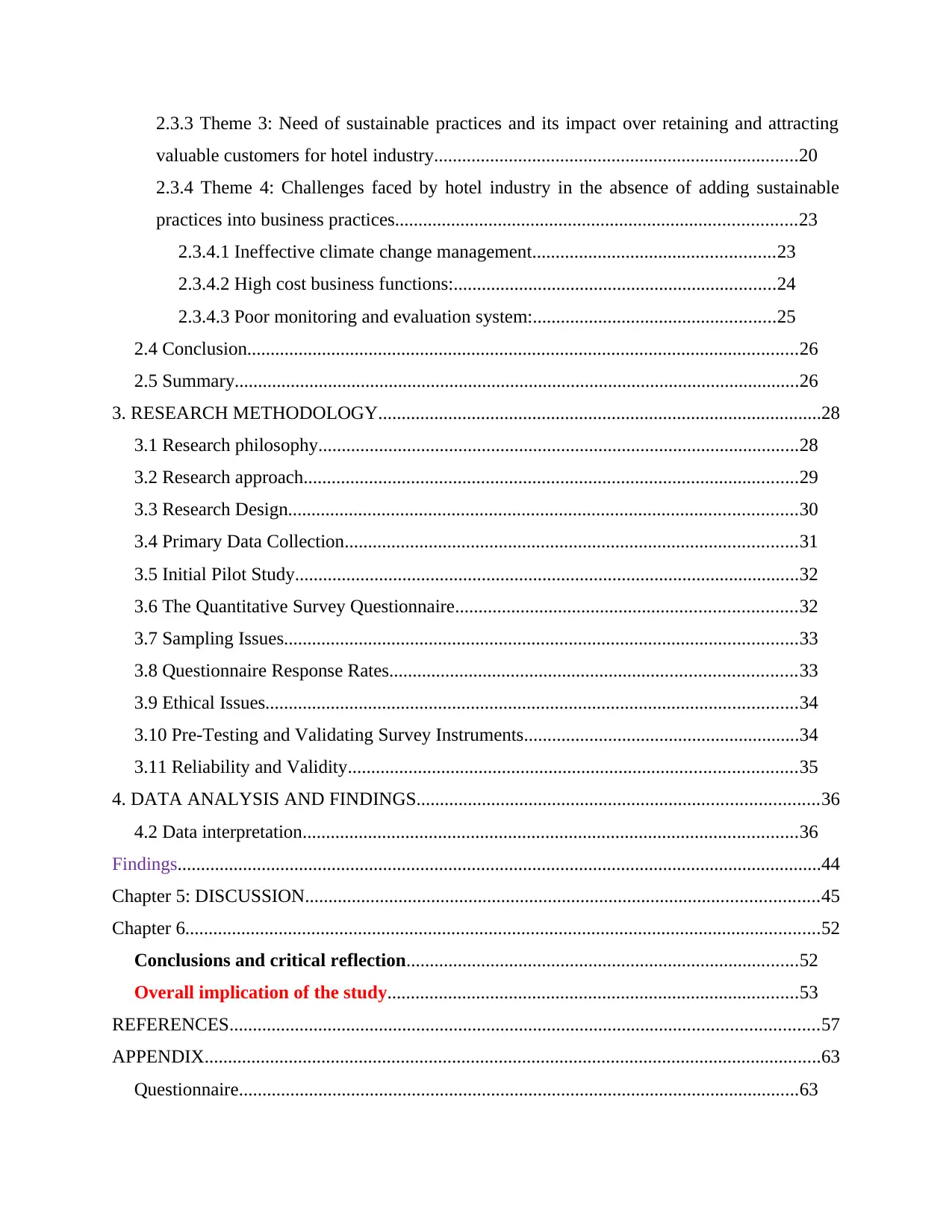
2.3.3 Theme 3: Need of sustainable practices and its impact over retaining and attracting
valuable customers for hotel industry..............................................................................20
2.3.4 Theme 4: Challenges faced by hotel industry in the absence of adding sustainable
practices into business practices......................................................................................23
2.3.4.1 Ineffective climate change management....................................................23
2.3.4.2 High cost business functions:.....................................................................24
2.3.4.3 Poor monitoring and evaluation system:....................................................25
2.4 Conclusion......................................................................................................................26
2.5 Summary.........................................................................................................................26
3. RESEARCH METHODOLOGY...............................................................................................28
3.1 Research philosophy.......................................................................................................28
3.2 Research approach..........................................................................................................29
3.3 Research Design.............................................................................................................30
3.4 Primary Data Collection.................................................................................................31
3.5 Initial Pilot Study............................................................................................................32
3.6 The Quantitative Survey Questionnaire.........................................................................32
3.7 Sampling Issues..............................................................................................................33
3.8 Questionnaire Response Rates.......................................................................................33
3.9 Ethical Issues..................................................................................................................34
3.10 Pre-Testing and Validating Survey Instruments...........................................................34
3.11 Reliability and Validity................................................................................................35
4. DATA ANALYSIS AND FINDINGS......................................................................................36
4.2 Data interpretation..........................................................................................................36
Findings..........................................................................................................................................44
Chapter 5: DISCUSSION..............................................................................................................45
Chapter 6........................................................................................................................................52
Conclusions and critical reflection....................................................................................52
Overall implication of the study........................................................................................53
REFERENCES..............................................................................................................................57
APPENDIX....................................................................................................................................63
Questionnaire........................................................................................................................63
valuable customers for hotel industry..............................................................................20
2.3.4 Theme 4: Challenges faced by hotel industry in the absence of adding sustainable
practices into business practices......................................................................................23
2.3.4.1 Ineffective climate change management....................................................23
2.3.4.2 High cost business functions:.....................................................................24
2.3.4.3 Poor monitoring and evaluation system:....................................................25
2.4 Conclusion......................................................................................................................26
2.5 Summary.........................................................................................................................26
3. RESEARCH METHODOLOGY...............................................................................................28
3.1 Research philosophy.......................................................................................................28
3.2 Research approach..........................................................................................................29
3.3 Research Design.............................................................................................................30
3.4 Primary Data Collection.................................................................................................31
3.5 Initial Pilot Study............................................................................................................32
3.6 The Quantitative Survey Questionnaire.........................................................................32
3.7 Sampling Issues..............................................................................................................33
3.8 Questionnaire Response Rates.......................................................................................33
3.9 Ethical Issues..................................................................................................................34
3.10 Pre-Testing and Validating Survey Instruments...........................................................34
3.11 Reliability and Validity................................................................................................35
4. DATA ANALYSIS AND FINDINGS......................................................................................36
4.2 Data interpretation..........................................................................................................36
Findings..........................................................................................................................................44
Chapter 5: DISCUSSION..............................................................................................................45
Chapter 6........................................................................................................................................52
Conclusions and critical reflection....................................................................................52
Overall implication of the study........................................................................................53
REFERENCES..............................................................................................................................57
APPENDIX....................................................................................................................................63
Questionnaire........................................................................................................................63
Secure Best Marks with AI Grader
Need help grading? Try our AI Grader for instant feedback on your assignments.

Appendix 2.....................................................................................................................................64
4.1 Frequency distribution table...........................................................................................64
4.1 Frequency distribution table...........................................................................................64
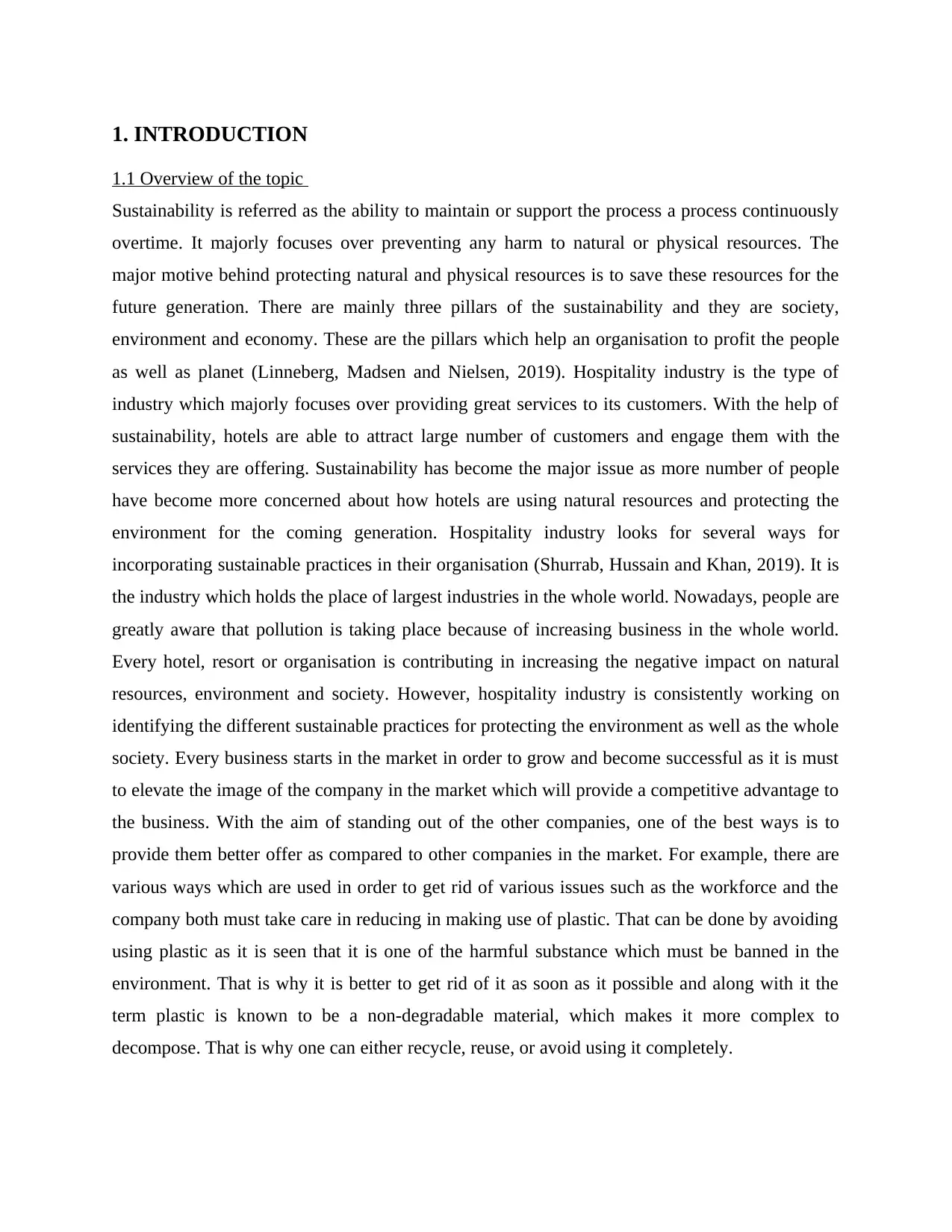
1. INTRODUCTION
1.1 Overview of the topic
Sustainability is referred as the ability to maintain or support the process a process continuously
overtime. It majorly focuses over preventing any harm to natural or physical resources. The
major motive behind protecting natural and physical resources is to save these resources for the
future generation. There are mainly three pillars of the sustainability and they are society,
environment and economy. These are the pillars which help an organisation to profit the people
as well as planet (Linneberg, Madsen and Nielsen, 2019). Hospitality industry is the type of
industry which majorly focuses over providing great services to its customers. With the help of
sustainability, hotels are able to attract large number of customers and engage them with the
services they are offering. Sustainability has become the major issue as more number of people
have become more concerned about how hotels are using natural resources and protecting the
environment for the coming generation. Hospitality industry looks for several ways for
incorporating sustainable practices in their organisation (Shurrab, Hussain and Khan, 2019). It is
the industry which holds the place of largest industries in the whole world. Nowadays, people are
greatly aware that pollution is taking place because of increasing business in the whole world.
Every hotel, resort or organisation is contributing in increasing the negative impact on natural
resources, environment and society. However, hospitality industry is consistently working on
identifying the different sustainable practices for protecting the environment as well as the whole
society. Every business starts in the market in order to grow and become successful as it is must
to elevate the image of the company in the market which will provide a competitive advantage to
the business. With the aim of standing out of the other companies, one of the best ways is to
provide them better offer as compared to other companies in the market. For example, there are
various ways which are used in order to get rid of various issues such as the workforce and the
company both must take care in reducing in making use of plastic. That can be done by avoiding
using plastic as it is seen that it is one of the harmful substance which must be banned in the
environment. That is why it is better to get rid of it as soon as it possible and along with it the
term plastic is known to be a non-degradable material, which makes it more complex to
decompose. That is why one can either recycle, reuse, or avoid using it completely.
1.1 Overview of the topic
Sustainability is referred as the ability to maintain or support the process a process continuously
overtime. It majorly focuses over preventing any harm to natural or physical resources. The
major motive behind protecting natural and physical resources is to save these resources for the
future generation. There are mainly three pillars of the sustainability and they are society,
environment and economy. These are the pillars which help an organisation to profit the people
as well as planet (Linneberg, Madsen and Nielsen, 2019). Hospitality industry is the type of
industry which majorly focuses over providing great services to its customers. With the help of
sustainability, hotels are able to attract large number of customers and engage them with the
services they are offering. Sustainability has become the major issue as more number of people
have become more concerned about how hotels are using natural resources and protecting the
environment for the coming generation. Hospitality industry looks for several ways for
incorporating sustainable practices in their organisation (Shurrab, Hussain and Khan, 2019). It is
the industry which holds the place of largest industries in the whole world. Nowadays, people are
greatly aware that pollution is taking place because of increasing business in the whole world.
Every hotel, resort or organisation is contributing in increasing the negative impact on natural
resources, environment and society. However, hospitality industry is consistently working on
identifying the different sustainable practices for protecting the environment as well as the whole
society. Every business starts in the market in order to grow and become successful as it is must
to elevate the image of the company in the market which will provide a competitive advantage to
the business. With the aim of standing out of the other companies, one of the best ways is to
provide them better offer as compared to other companies in the market. For example, there are
various ways which are used in order to get rid of various issues such as the workforce and the
company both must take care in reducing in making use of plastic. That can be done by avoiding
using plastic as it is seen that it is one of the harmful substance which must be banned in the
environment. That is why it is better to get rid of it as soon as it possible and along with it the
term plastic is known to be a non-degradable material, which makes it more complex to
decompose. That is why one can either recycle, reuse, or avoid using it completely.
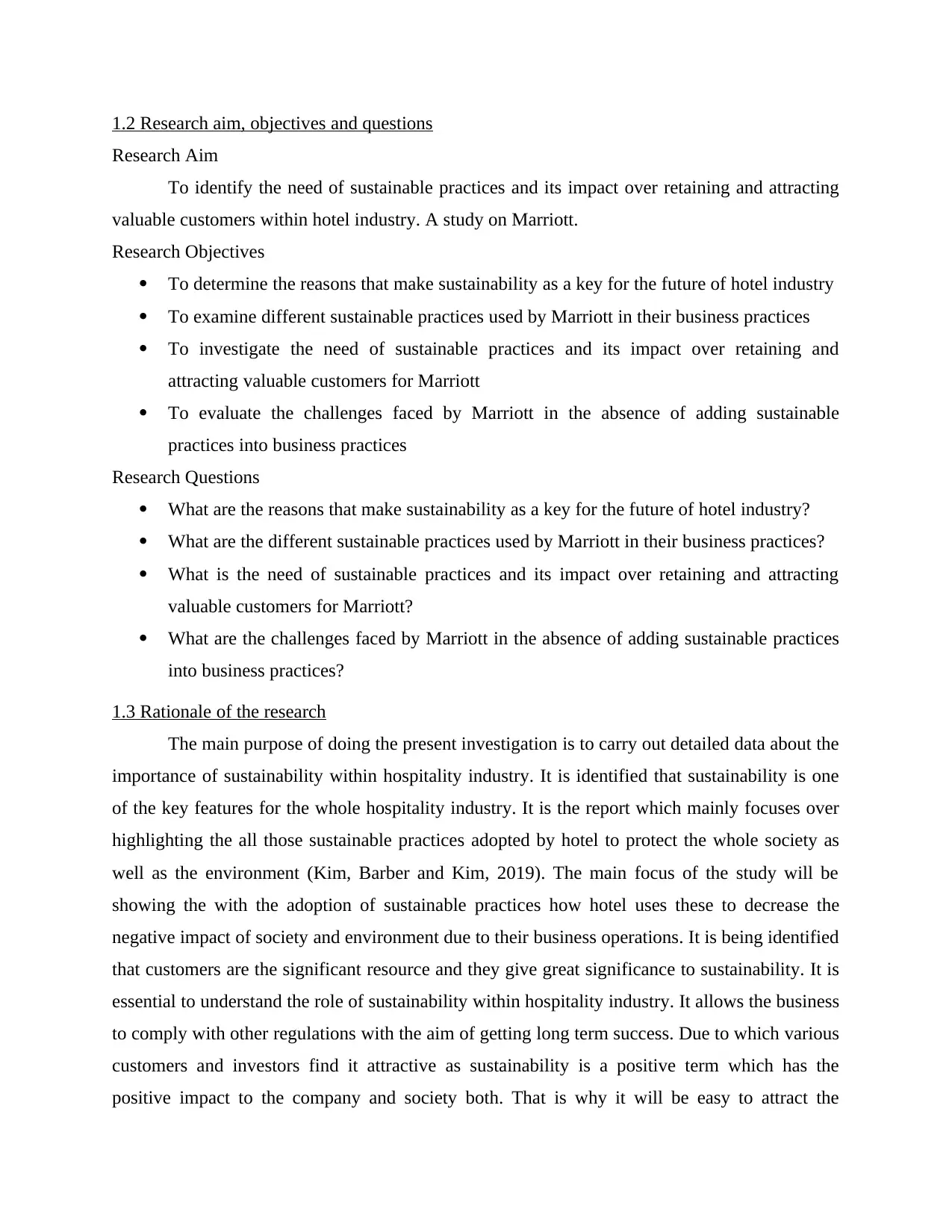
1.2 Research aim, objectives and questions
Research Aim
To identify the need of sustainable practices and its impact over retaining and attracting
valuable customers within hotel industry. A study on Marriott.
Research Objectives
To determine the reasons that make sustainability as a key for the future of hotel industry
To examine different sustainable practices used by Marriott in their business practices
To investigate the need of sustainable practices and its impact over retaining and
attracting valuable customers for Marriott
To evaluate the challenges faced by Marriott in the absence of adding sustainable
practices into business practices
Research Questions
What are the reasons that make sustainability as a key for the future of hotel industry?
What are the different sustainable practices used by Marriott in their business practices?
What is the need of sustainable practices and its impact over retaining and attracting
valuable customers for Marriott?
What are the challenges faced by Marriott in the absence of adding sustainable practices
into business practices?
1.3 Rationale of the research
The main purpose of doing the present investigation is to carry out detailed data about the
importance of sustainability within hospitality industry. It is identified that sustainability is one
of the key features for the whole hospitality industry. It is the report which mainly focuses over
highlighting the all those sustainable practices adopted by hotel to protect the whole society as
well as the environment (Kim, Barber and Kim, 2019). The main focus of the study will be
showing the with the adoption of sustainable practices how hotel uses these to decrease the
negative impact of society and environment due to their business operations. It is being identified
that customers are the significant resource and they give great significance to sustainability. It is
essential to understand the role of sustainability within hospitality industry. It allows the business
to comply with other regulations with the aim of getting long term success. Due to which various
customers and investors find it attractive as sustainability is a positive term which has the
positive impact to the company and society both. That is why it will be easy to attract the
Research Aim
To identify the need of sustainable practices and its impact over retaining and attracting
valuable customers within hotel industry. A study on Marriott.
Research Objectives
To determine the reasons that make sustainability as a key for the future of hotel industry
To examine different sustainable practices used by Marriott in their business practices
To investigate the need of sustainable practices and its impact over retaining and
attracting valuable customers for Marriott
To evaluate the challenges faced by Marriott in the absence of adding sustainable
practices into business practices
Research Questions
What are the reasons that make sustainability as a key for the future of hotel industry?
What are the different sustainable practices used by Marriott in their business practices?
What is the need of sustainable practices and its impact over retaining and attracting
valuable customers for Marriott?
What are the challenges faced by Marriott in the absence of adding sustainable practices
into business practices?
1.3 Rationale of the research
The main purpose of doing the present investigation is to carry out detailed data about the
importance of sustainability within hospitality industry. It is identified that sustainability is one
of the key features for the whole hospitality industry. It is the report which mainly focuses over
highlighting the all those sustainable practices adopted by hotel to protect the whole society as
well as the environment (Kim, Barber and Kim, 2019). The main focus of the study will be
showing the with the adoption of sustainable practices how hotel uses these to decrease the
negative impact of society and environment due to their business operations. It is being identified
that customers are the significant resource and they give great significance to sustainability. It is
essential to understand the role of sustainability within hospitality industry. It allows the business
to comply with other regulations with the aim of getting long term success. Due to which various
customers and investors find it attractive as sustainability is a positive term which has the
positive impact to the company and society both. That is why it will be easy to attract the
Paraphrase This Document
Need a fresh take? Get an instant paraphrase of this document with our AI Paraphraser
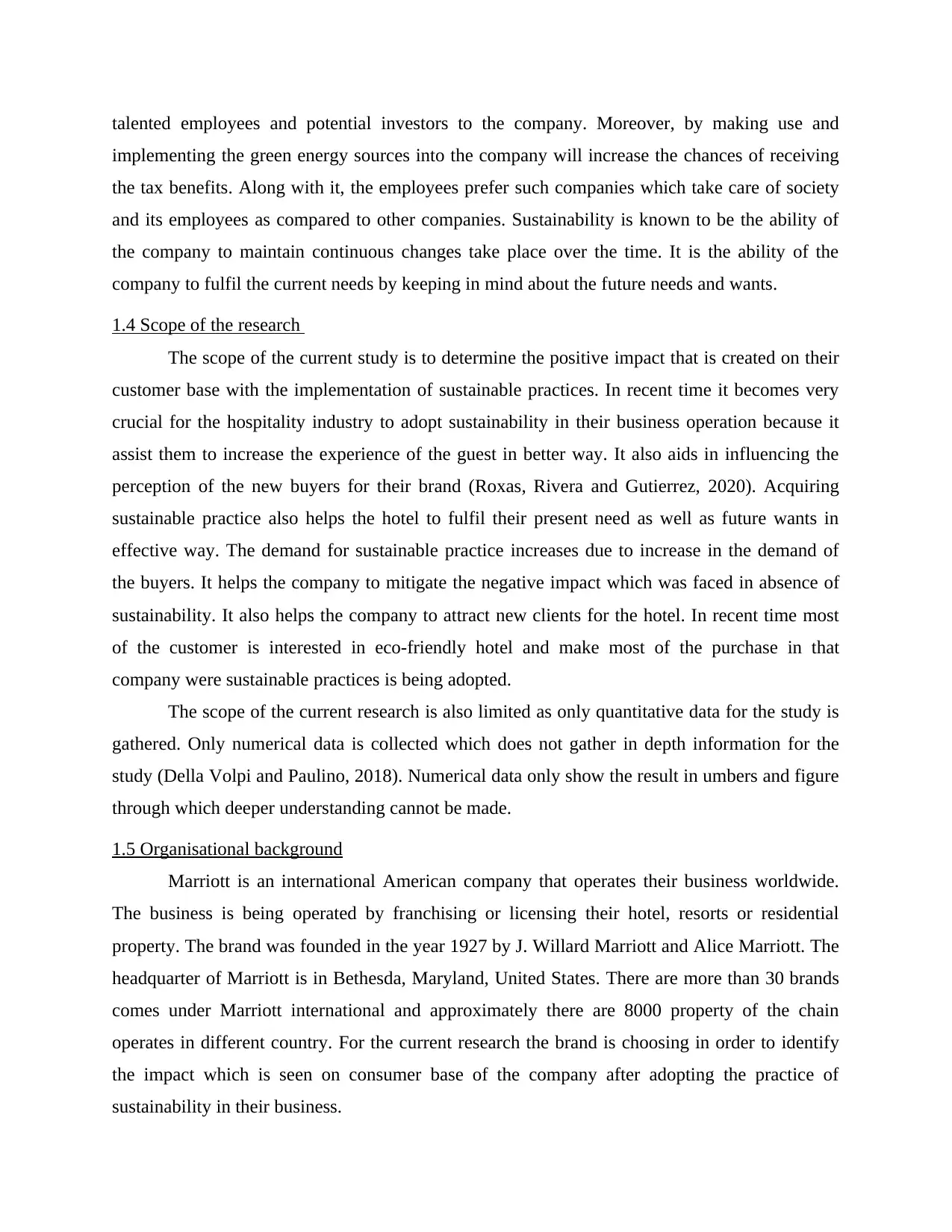
talented employees and potential investors to the company. Moreover, by making use and
implementing the green energy sources into the company will increase the chances of receiving
the tax benefits. Along with it, the employees prefer such companies which take care of society
and its employees as compared to other companies. Sustainability is known to be the ability of
the company to maintain continuous changes take place over the time. It is the ability of the
company to fulfil the current needs by keeping in mind about the future needs and wants.
1.4 Scope of the research
The scope of the current study is to determine the positive impact that is created on their
customer base with the implementation of sustainable practices. In recent time it becomes very
crucial for the hospitality industry to adopt sustainability in their business operation because it
assist them to increase the experience of the guest in better way. It also aids in influencing the
perception of the new buyers for their brand (Roxas, Rivera and Gutierrez, 2020). Acquiring
sustainable practice also helps the hotel to fulfil their present need as well as future wants in
effective way. The demand for sustainable practice increases due to increase in the demand of
the buyers. It helps the company to mitigate the negative impact which was faced in absence of
sustainability. It also helps the company to attract new clients for the hotel. In recent time most
of the customer is interested in eco-friendly hotel and make most of the purchase in that
company were sustainable practices is being adopted.
The scope of the current research is also limited as only quantitative data for the study is
gathered. Only numerical data is collected which does not gather in depth information for the
study (Della Volpi and Paulino, 2018). Numerical data only show the result in umbers and figure
through which deeper understanding cannot be made.
1.5 Organisational background
Marriott is an international American company that operates their business worldwide.
The business is being operated by franchising or licensing their hotel, resorts or residential
property. The brand was founded in the year 1927 by J. Willard Marriott and Alice Marriott. The
headquarter of Marriott is in Bethesda, Maryland, United States. There are more than 30 brands
comes under Marriott international and approximately there are 8000 property of the chain
operates in different country. For the current research the brand is choosing in order to identify
the impact which is seen on consumer base of the company after adopting the practice of
sustainability in their business.
implementing the green energy sources into the company will increase the chances of receiving
the tax benefits. Along with it, the employees prefer such companies which take care of society
and its employees as compared to other companies. Sustainability is known to be the ability of
the company to maintain continuous changes take place over the time. It is the ability of the
company to fulfil the current needs by keeping in mind about the future needs and wants.
1.4 Scope of the research
The scope of the current study is to determine the positive impact that is created on their
customer base with the implementation of sustainable practices. In recent time it becomes very
crucial for the hospitality industry to adopt sustainability in their business operation because it
assist them to increase the experience of the guest in better way. It also aids in influencing the
perception of the new buyers for their brand (Roxas, Rivera and Gutierrez, 2020). Acquiring
sustainable practice also helps the hotel to fulfil their present need as well as future wants in
effective way. The demand for sustainable practice increases due to increase in the demand of
the buyers. It helps the company to mitigate the negative impact which was faced in absence of
sustainability. It also helps the company to attract new clients for the hotel. In recent time most
of the customer is interested in eco-friendly hotel and make most of the purchase in that
company were sustainable practices is being adopted.
The scope of the current research is also limited as only quantitative data for the study is
gathered. Only numerical data is collected which does not gather in depth information for the
study (Della Volpi and Paulino, 2018). Numerical data only show the result in umbers and figure
through which deeper understanding cannot be made.
1.5 Organisational background
Marriott is an international American company that operates their business worldwide.
The business is being operated by franchising or licensing their hotel, resorts or residential
property. The brand was founded in the year 1927 by J. Willard Marriott and Alice Marriott. The
headquarter of Marriott is in Bethesda, Maryland, United States. There are more than 30 brands
comes under Marriott international and approximately there are 8000 property of the chain
operates in different country. For the current research the brand is choosing in order to identify
the impact which is seen on consumer base of the company after adopting the practice of
sustainability in their business.
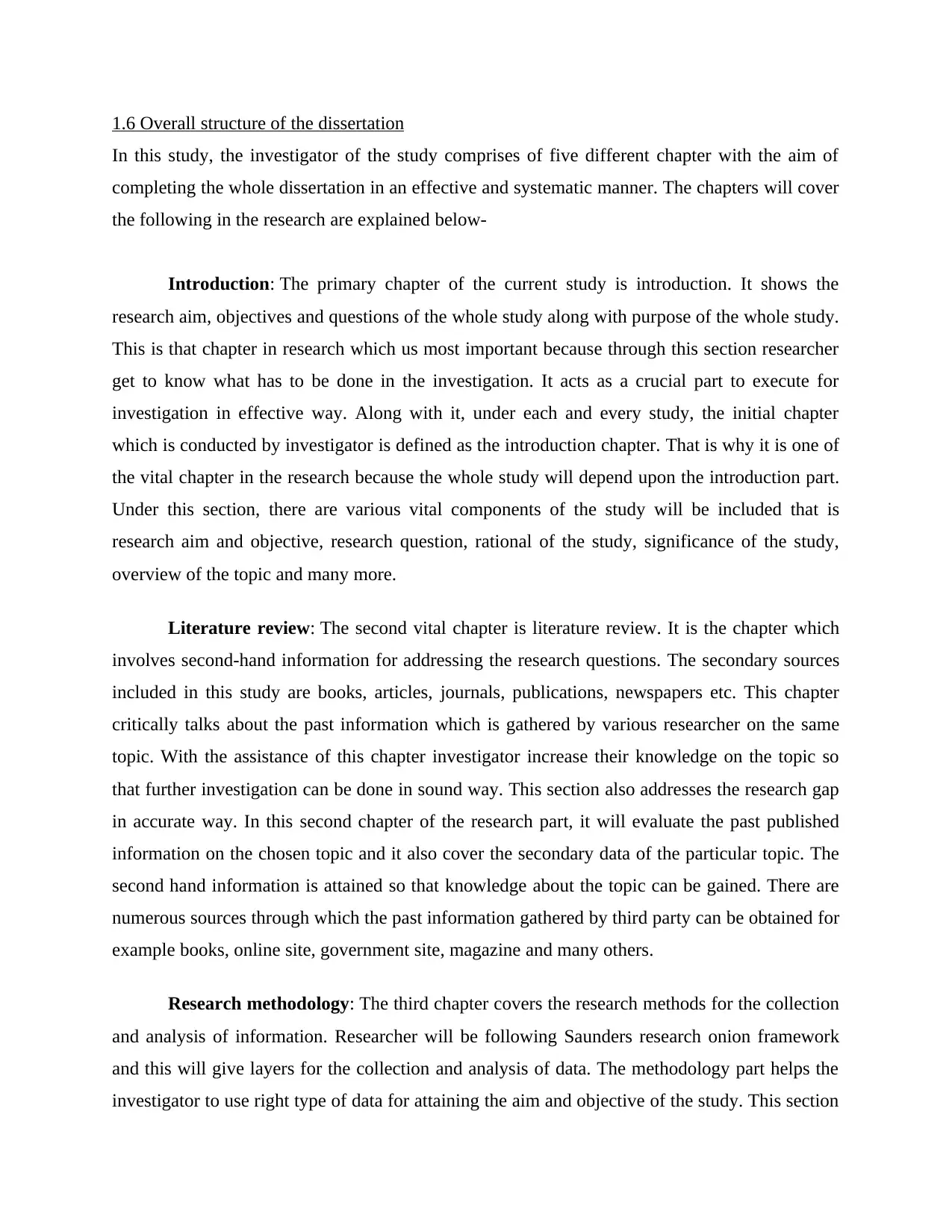
1.6 Overall structure of the dissertation
In this study, the investigator of the study comprises of five different chapter with the aim of
completing the whole dissertation in an effective and systematic manner. The chapters will cover
the following in the research are explained below-
Introduction: The primary chapter of the current study is introduction. It shows the
research aim, objectives and questions of the whole study along with purpose of the whole study.
This is that chapter in research which us most important because through this section researcher
get to know what has to be done in the investigation. It acts as a crucial part to execute for
investigation in effective way. Along with it, under each and every study, the initial chapter
which is conducted by investigator is defined as the introduction chapter. That is why it is one of
the vital chapter in the research because the whole study will depend upon the introduction part.
Under this section, there are various vital components of the study will be included that is
research aim and objective, research question, rational of the study, significance of the study,
overview of the topic and many more.
Literature review: The second vital chapter is literature review. It is the chapter which
involves second-hand information for addressing the research questions. The secondary sources
included in this study are books, articles, journals, publications, newspapers etc. This chapter
critically talks about the past information which is gathered by various researcher on the same
topic. With the assistance of this chapter investigator increase their knowledge on the topic so
that further investigation can be done in sound way. This section also addresses the research gap
in accurate way. In this second chapter of the research part, it will evaluate the past published
information on the chosen topic and it also cover the secondary data of the particular topic. The
second hand information is attained so that knowledge about the topic can be gained. There are
numerous sources through which the past information gathered by third party can be obtained for
example books, online site, government site, magazine and many others.
Research methodology: The third chapter covers the research methods for the collection
and analysis of information. Researcher will be following Saunders research onion framework
and this will give layers for the collection and analysis of data. The methodology part helps the
investigator to use right type of data for attaining the aim and objective of the study. This section
In this study, the investigator of the study comprises of five different chapter with the aim of
completing the whole dissertation in an effective and systematic manner. The chapters will cover
the following in the research are explained below-
Introduction: The primary chapter of the current study is introduction. It shows the
research aim, objectives and questions of the whole study along with purpose of the whole study.
This is that chapter in research which us most important because through this section researcher
get to know what has to be done in the investigation. It acts as a crucial part to execute for
investigation in effective way. Along with it, under each and every study, the initial chapter
which is conducted by investigator is defined as the introduction chapter. That is why it is one of
the vital chapter in the research because the whole study will depend upon the introduction part.
Under this section, there are various vital components of the study will be included that is
research aim and objective, research question, rational of the study, significance of the study,
overview of the topic and many more.
Literature review: The second vital chapter is literature review. It is the chapter which
involves second-hand information for addressing the research questions. The secondary sources
included in this study are books, articles, journals, publications, newspapers etc. This chapter
critically talks about the past information which is gathered by various researcher on the same
topic. With the assistance of this chapter investigator increase their knowledge on the topic so
that further investigation can be done in sound way. This section also addresses the research gap
in accurate way. In this second chapter of the research part, it will evaluate the past published
information on the chosen topic and it also cover the secondary data of the particular topic. The
second hand information is attained so that knowledge about the topic can be gained. There are
numerous sources through which the past information gathered by third party can be obtained for
example books, online site, government site, magazine and many others.
Research methodology: The third chapter covers the research methods for the collection
and analysis of information. Researcher will be following Saunders research onion framework
and this will give layers for the collection and analysis of data. The methodology part helps the
investigator to use right type of data for attaining the aim and objective of the study. This section
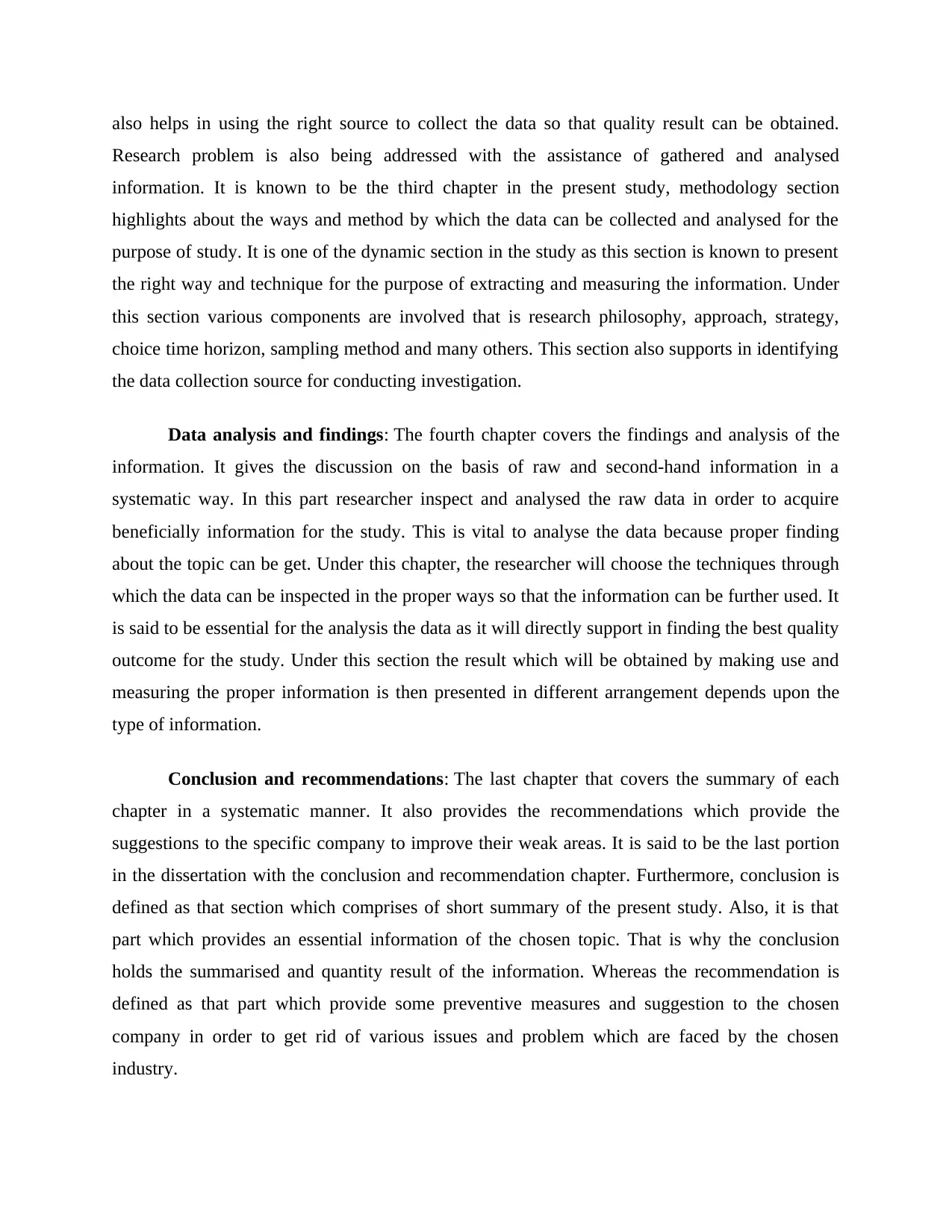
also helps in using the right source to collect the data so that quality result can be obtained.
Research problem is also being addressed with the assistance of gathered and analysed
information. It is known to be the third chapter in the present study, methodology section
highlights about the ways and method by which the data can be collected and analysed for the
purpose of study. It is one of the dynamic section in the study as this section is known to present
the right way and technique for the purpose of extracting and measuring the information. Under
this section various components are involved that is research philosophy, approach, strategy,
choice time horizon, sampling method and many others. This section also supports in identifying
the data collection source for conducting investigation.
Data analysis and findings: The fourth chapter covers the findings and analysis of the
information. It gives the discussion on the basis of raw and second-hand information in a
systematic way. In this part researcher inspect and analysed the raw data in order to acquire
beneficially information for the study. This is vital to analyse the data because proper finding
about the topic can be get. Under this chapter, the researcher will choose the techniques through
which the data can be inspected in the proper ways so that the information can be further used. It
is said to be essential for the analysis the data as it will directly support in finding the best quality
outcome for the study. Under this section the result which will be obtained by making use and
measuring the proper information is then presented in different arrangement depends upon the
type of information.
Conclusion and recommendations: The last chapter that covers the summary of each
chapter in a systematic manner. It also provides the recommendations which provide the
suggestions to the specific company to improve their weak areas. It is said to be the last portion
in the dissertation with the conclusion and recommendation chapter. Furthermore, conclusion is
defined as that section which comprises of short summary of the present study. Also, it is that
part which provides an essential information of the chosen topic. That is why the conclusion
holds the summarised and quantity result of the information. Whereas the recommendation is
defined as that part which provide some preventive measures and suggestion to the chosen
company in order to get rid of various issues and problem which are faced by the chosen
industry.
Research problem is also being addressed with the assistance of gathered and analysed
information. It is known to be the third chapter in the present study, methodology section
highlights about the ways and method by which the data can be collected and analysed for the
purpose of study. It is one of the dynamic section in the study as this section is known to present
the right way and technique for the purpose of extracting and measuring the information. Under
this section various components are involved that is research philosophy, approach, strategy,
choice time horizon, sampling method and many others. This section also supports in identifying
the data collection source for conducting investigation.
Data analysis and findings: The fourth chapter covers the findings and analysis of the
information. It gives the discussion on the basis of raw and second-hand information in a
systematic way. In this part researcher inspect and analysed the raw data in order to acquire
beneficially information for the study. This is vital to analyse the data because proper finding
about the topic can be get. Under this chapter, the researcher will choose the techniques through
which the data can be inspected in the proper ways so that the information can be further used. It
is said to be essential for the analysis the data as it will directly support in finding the best quality
outcome for the study. Under this section the result which will be obtained by making use and
measuring the proper information is then presented in different arrangement depends upon the
type of information.
Conclusion and recommendations: The last chapter that covers the summary of each
chapter in a systematic manner. It also provides the recommendations which provide the
suggestions to the specific company to improve their weak areas. It is said to be the last portion
in the dissertation with the conclusion and recommendation chapter. Furthermore, conclusion is
defined as that section which comprises of short summary of the present study. Also, it is that
part which provides an essential information of the chosen topic. That is why the conclusion
holds the summarised and quantity result of the information. Whereas the recommendation is
defined as that part which provide some preventive measures and suggestion to the chosen
company in order to get rid of various issues and problem which are faced by the chosen
industry.
Secure Best Marks with AI Grader
Need help grading? Try our AI Grader for instant feedback on your assignments.
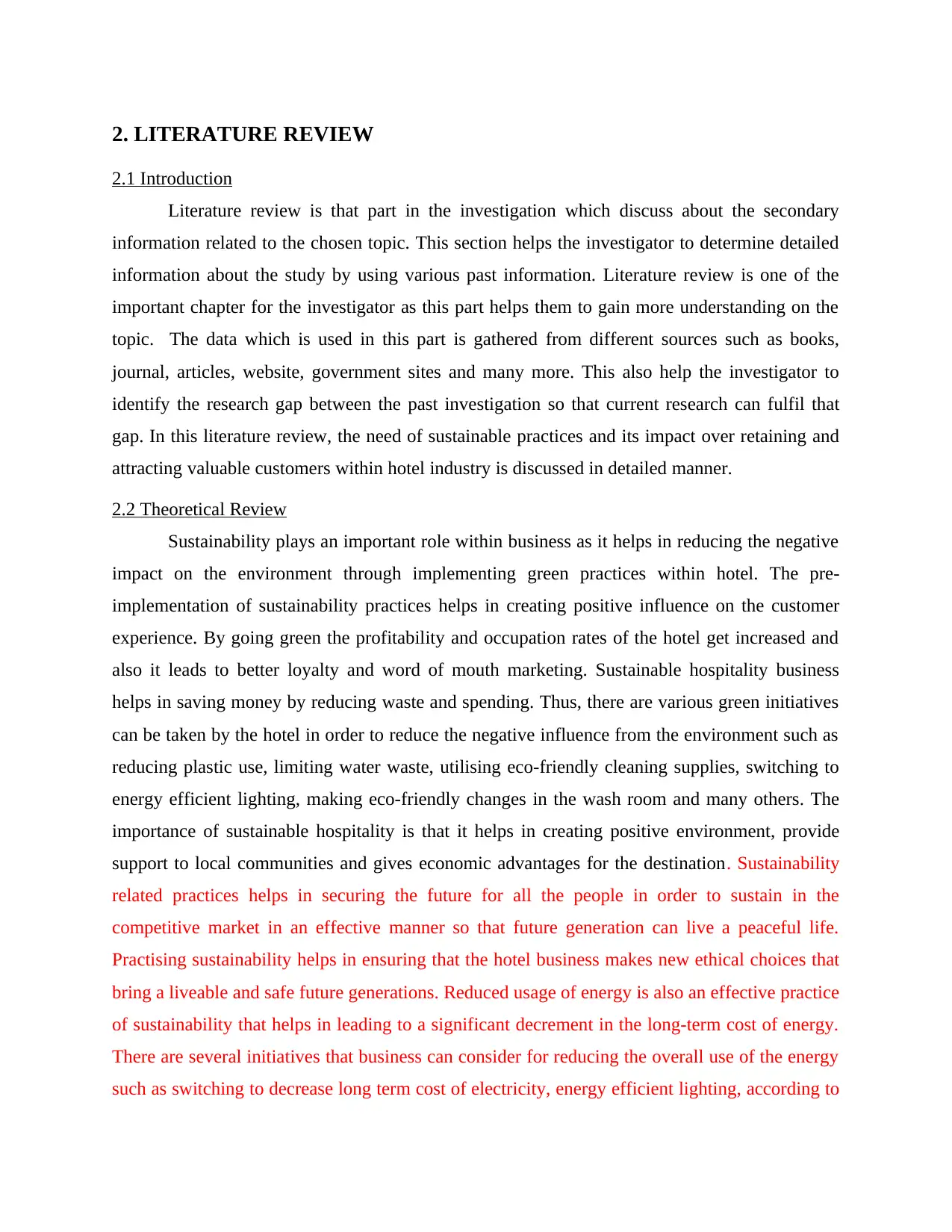
2. LITERATURE REVIEW
2.1 Introduction
Literature review is that part in the investigation which discuss about the secondary
information related to the chosen topic. This section helps the investigator to determine detailed
information about the study by using various past information. Literature review is one of the
important chapter for the investigator as this part helps them to gain more understanding on the
topic. The data which is used in this part is gathered from different sources such as books,
journal, articles, website, government sites and many more. This also help the investigator to
identify the research gap between the past investigation so that current research can fulfil that
gap. In this literature review, the need of sustainable practices and its impact over retaining and
attracting valuable customers within hotel industry is discussed in detailed manner.
2.2 Theoretical Review
Sustainability plays an important role within business as it helps in reducing the negative
impact on the environment through implementing green practices within hotel. The pre-
implementation of sustainability practices helps in creating positive influence on the customer
experience. By going green the profitability and occupation rates of the hotel get increased and
also it leads to better loyalty and word of mouth marketing. Sustainable hospitality business
helps in saving money by reducing waste and spending. Thus, there are various green initiatives
can be taken by the hotel in order to reduce the negative influence from the environment such as
reducing plastic use, limiting water waste, utilising eco-friendly cleaning supplies, switching to
energy efficient lighting, making eco-friendly changes in the wash room and many others. The
importance of sustainable hospitality is that it helps in creating positive environment, provide
support to local communities and gives economic advantages for the destination. Sustainability
related practices helps in securing the future for all the people in order to sustain in the
competitive market in an effective manner so that future generation can live a peaceful life.
Practising sustainability helps in ensuring that the hotel business makes new ethical choices that
bring a liveable and safe future generations. Reduced usage of energy is also an effective practice
of sustainability that helps in leading to a significant decrement in the long-term cost of energy.
There are several initiatives that business can consider for reducing the overall use of the energy
such as switching to decrease long term cost of electricity, energy efficient lighting, according to
2.1 Introduction
Literature review is that part in the investigation which discuss about the secondary
information related to the chosen topic. This section helps the investigator to determine detailed
information about the study by using various past information. Literature review is one of the
important chapter for the investigator as this part helps them to gain more understanding on the
topic. The data which is used in this part is gathered from different sources such as books,
journal, articles, website, government sites and many more. This also help the investigator to
identify the research gap between the past investigation so that current research can fulfil that
gap. In this literature review, the need of sustainable practices and its impact over retaining and
attracting valuable customers within hotel industry is discussed in detailed manner.
2.2 Theoretical Review
Sustainability plays an important role within business as it helps in reducing the negative
impact on the environment through implementing green practices within hotel. The pre-
implementation of sustainability practices helps in creating positive influence on the customer
experience. By going green the profitability and occupation rates of the hotel get increased and
also it leads to better loyalty and word of mouth marketing. Sustainable hospitality business
helps in saving money by reducing waste and spending. Thus, there are various green initiatives
can be taken by the hotel in order to reduce the negative influence from the environment such as
reducing plastic use, limiting water waste, utilising eco-friendly cleaning supplies, switching to
energy efficient lighting, making eco-friendly changes in the wash room and many others. The
importance of sustainable hospitality is that it helps in creating positive environment, provide
support to local communities and gives economic advantages for the destination. Sustainability
related practices helps in securing the future for all the people in order to sustain in the
competitive market in an effective manner so that future generation can live a peaceful life.
Practising sustainability helps in ensuring that the hotel business makes new ethical choices that
bring a liveable and safe future generations. Reduced usage of energy is also an effective practice
of sustainability that helps in leading to a significant decrement in the long-term cost of energy.
There are several initiatives that business can consider for reducing the overall use of the energy
such as switching to decrease long term cost of electricity, energy efficient lighting, according to
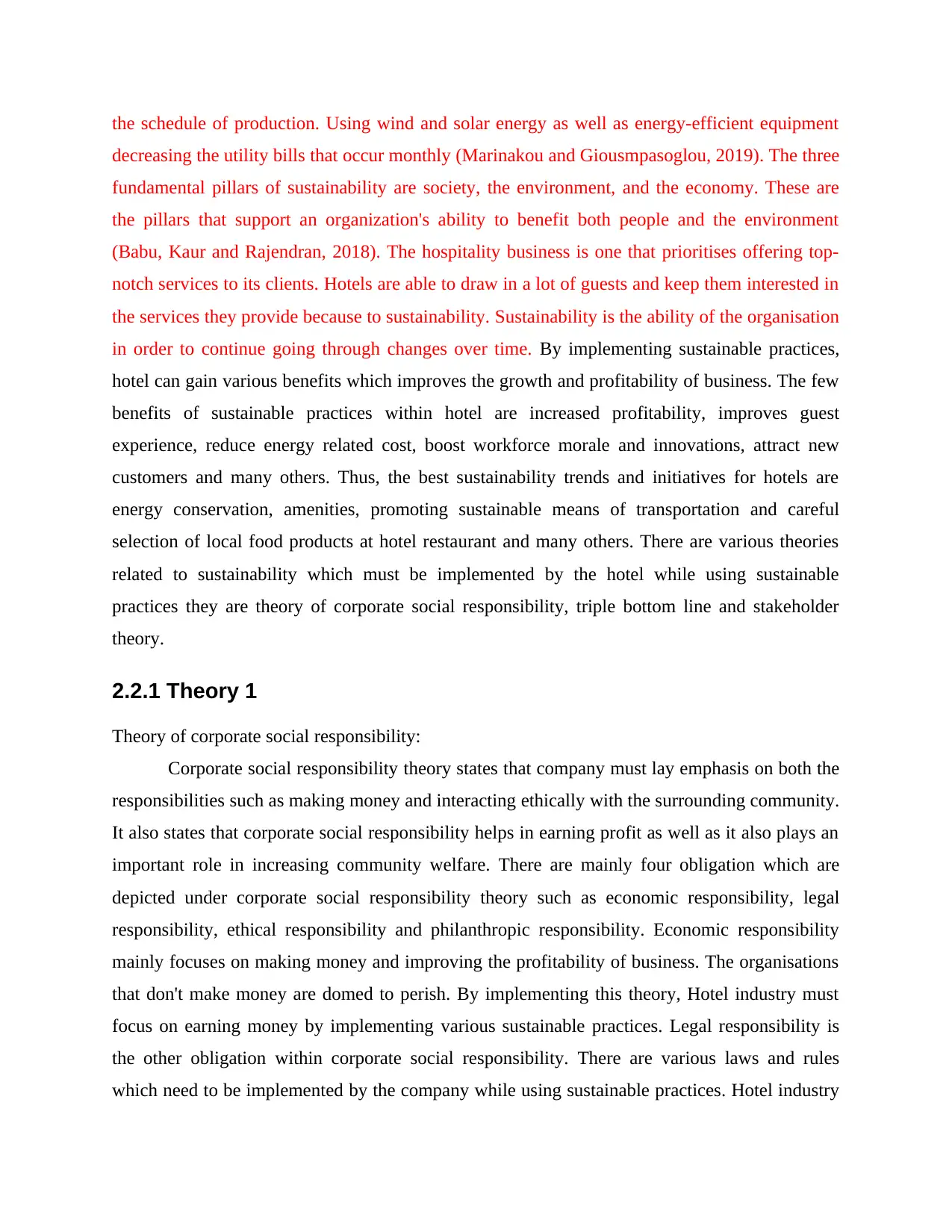
the schedule of production. Using wind and solar energy as well as energy-efficient equipment
decreasing the utility bills that occur monthly (Marinakou and Giousmpasoglou, 2019). The three
fundamental pillars of sustainability are society, the environment, and the economy. These are
the pillars that support an organization's ability to benefit both people and the environment
(Babu, Kaur and Rajendran, 2018). The hospitality business is one that prioritises offering top-
notch services to its clients. Hotels are able to draw in a lot of guests and keep them interested in
the services they provide because to sustainability. Sustainability is the ability of the organisation
in order to continue going through changes over time. By implementing sustainable practices,
hotel can gain various benefits which improves the growth and profitability of business. The few
benefits of sustainable practices within hotel are increased profitability, improves guest
experience, reduce energy related cost, boost workforce morale and innovations, attract new
customers and many others. Thus, the best sustainability trends and initiatives for hotels are
energy conservation, amenities, promoting sustainable means of transportation and careful
selection of local food products at hotel restaurant and many others. There are various theories
related to sustainability which must be implemented by the hotel while using sustainable
practices they are theory of corporate social responsibility, triple bottom line and stakeholder
theory.
2.2.1 Theory 1
Theory of corporate social responsibility:
Corporate social responsibility theory states that company must lay emphasis on both the
responsibilities such as making money and interacting ethically with the surrounding community.
It also states that corporate social responsibility helps in earning profit as well as it also plays an
important role in increasing community welfare. There are mainly four obligation which are
depicted under corporate social responsibility theory such as economic responsibility, legal
responsibility, ethical responsibility and philanthropic responsibility. Economic responsibility
mainly focuses on making money and improving the profitability of business. The organisations
that don't make money are domed to perish. By implementing this theory, Hotel industry must
focus on earning money by implementing various sustainable practices. Legal responsibility is
the other obligation within corporate social responsibility. There are various laws and rules
which need to be implemented by the company while using sustainable practices. Hotel industry
decreasing the utility bills that occur monthly (Marinakou and Giousmpasoglou, 2019). The three
fundamental pillars of sustainability are society, the environment, and the economy. These are
the pillars that support an organization's ability to benefit both people and the environment
(Babu, Kaur and Rajendran, 2018). The hospitality business is one that prioritises offering top-
notch services to its clients. Hotels are able to draw in a lot of guests and keep them interested in
the services they provide because to sustainability. Sustainability is the ability of the organisation
in order to continue going through changes over time. By implementing sustainable practices,
hotel can gain various benefits which improves the growth and profitability of business. The few
benefits of sustainable practices within hotel are increased profitability, improves guest
experience, reduce energy related cost, boost workforce morale and innovations, attract new
customers and many others. Thus, the best sustainability trends and initiatives for hotels are
energy conservation, amenities, promoting sustainable means of transportation and careful
selection of local food products at hotel restaurant and many others. There are various theories
related to sustainability which must be implemented by the hotel while using sustainable
practices they are theory of corporate social responsibility, triple bottom line and stakeholder
theory.
2.2.1 Theory 1
Theory of corporate social responsibility:
Corporate social responsibility theory states that company must lay emphasis on both the
responsibilities such as making money and interacting ethically with the surrounding community.
It also states that corporate social responsibility helps in earning profit as well as it also plays an
important role in increasing community welfare. There are mainly four obligation which are
depicted under corporate social responsibility theory such as economic responsibility, legal
responsibility, ethical responsibility and philanthropic responsibility. Economic responsibility
mainly focuses on making money and improving the profitability of business. The organisations
that don't make money are domed to perish. By implementing this theory, Hotel industry must
focus on earning money by implementing various sustainable practices. Legal responsibility is
the other obligation within corporate social responsibility. There are various laws and rules
which need to be implemented by the company while using sustainable practices. Hotel industry
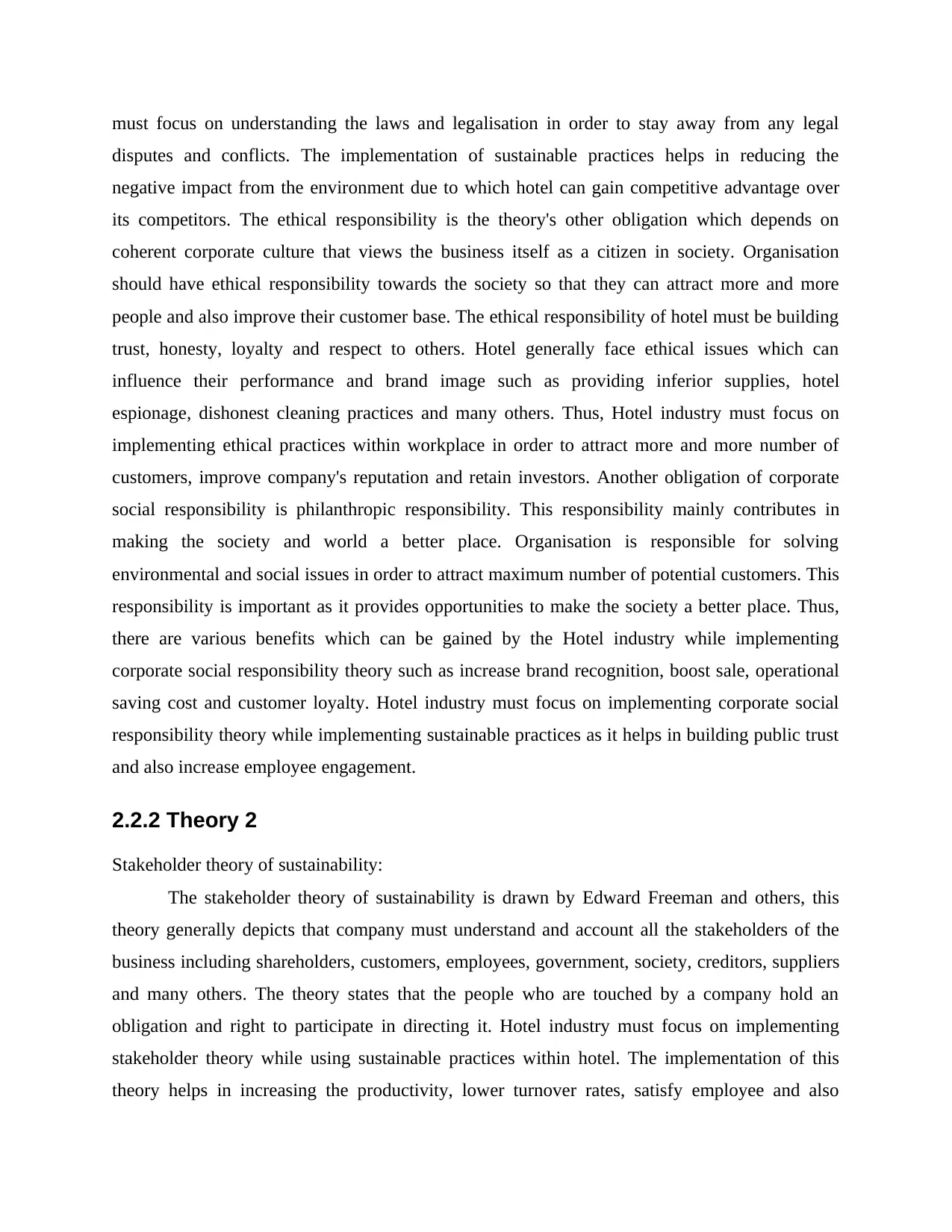
must focus on understanding the laws and legalisation in order to stay away from any legal
disputes and conflicts. The implementation of sustainable practices helps in reducing the
negative impact from the environment due to which hotel can gain competitive advantage over
its competitors. The ethical responsibility is the theory's other obligation which depends on
coherent corporate culture that views the business itself as a citizen in society. Organisation
should have ethical responsibility towards the society so that they can attract more and more
people and also improve their customer base. The ethical responsibility of hotel must be building
trust, honesty, loyalty and respect to others. Hotel generally face ethical issues which can
influence their performance and brand image such as providing inferior supplies, hotel
espionage, dishonest cleaning practices and many others. Thus, Hotel industry must focus on
implementing ethical practices within workplace in order to attract more and more number of
customers, improve company's reputation and retain investors. Another obligation of corporate
social responsibility is philanthropic responsibility. This responsibility mainly contributes in
making the society and world a better place. Organisation is responsible for solving
environmental and social issues in order to attract maximum number of potential customers. This
responsibility is important as it provides opportunities to make the society a better place. Thus,
there are various benefits which can be gained by the Hotel industry while implementing
corporate social responsibility theory such as increase brand recognition, boost sale, operational
saving cost and customer loyalty. Hotel industry must focus on implementing corporate social
responsibility theory while implementing sustainable practices as it helps in building public trust
and also increase employee engagement.
2.2.2 Theory 2
Stakeholder theory of sustainability:
The stakeholder theory of sustainability is drawn by Edward Freeman and others, this
theory generally depicts that company must understand and account all the stakeholders of the
business including shareholders, customers, employees, government, society, creditors, suppliers
and many others. The theory states that the people who are touched by a company hold an
obligation and right to participate in directing it. Hotel industry must focus on implementing
stakeholder theory while using sustainable practices within hotel. The implementation of this
theory helps in increasing the productivity, lower turnover rates, satisfy employee and also
disputes and conflicts. The implementation of sustainable practices helps in reducing the
negative impact from the environment due to which hotel can gain competitive advantage over
its competitors. The ethical responsibility is the theory's other obligation which depends on
coherent corporate culture that views the business itself as a citizen in society. Organisation
should have ethical responsibility towards the society so that they can attract more and more
people and also improve their customer base. The ethical responsibility of hotel must be building
trust, honesty, loyalty and respect to others. Hotel generally face ethical issues which can
influence their performance and brand image such as providing inferior supplies, hotel
espionage, dishonest cleaning practices and many others. Thus, Hotel industry must focus on
implementing ethical practices within workplace in order to attract more and more number of
customers, improve company's reputation and retain investors. Another obligation of corporate
social responsibility is philanthropic responsibility. This responsibility mainly contributes in
making the society and world a better place. Organisation is responsible for solving
environmental and social issues in order to attract maximum number of potential customers. This
responsibility is important as it provides opportunities to make the society a better place. Thus,
there are various benefits which can be gained by the Hotel industry while implementing
corporate social responsibility theory such as increase brand recognition, boost sale, operational
saving cost and customer loyalty. Hotel industry must focus on implementing corporate social
responsibility theory while implementing sustainable practices as it helps in building public trust
and also increase employee engagement.
2.2.2 Theory 2
Stakeholder theory of sustainability:
The stakeholder theory of sustainability is drawn by Edward Freeman and others, this
theory generally depicts that company must understand and account all the stakeholders of the
business including shareholders, customers, employees, government, society, creditors, suppliers
and many others. The theory states that the people who are touched by a company hold an
obligation and right to participate in directing it. Hotel industry must focus on implementing
stakeholder theory while using sustainable practices within hotel. The implementation of this
theory helps in increasing the productivity, lower turnover rates, satisfy employee and also
Paraphrase This Document
Need a fresh take? Get an instant paraphrase of this document with our AI Paraphraser
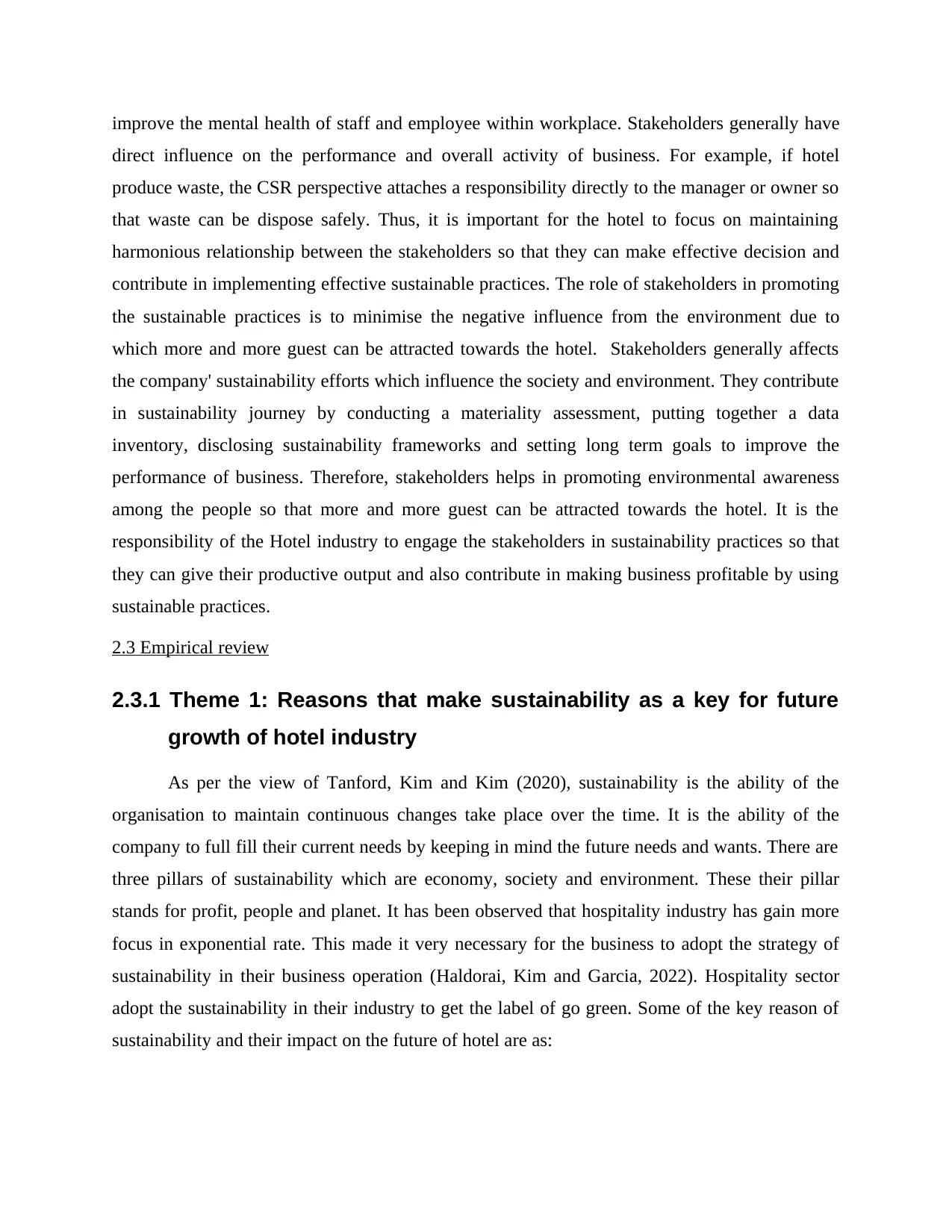
improve the mental health of staff and employee within workplace. Stakeholders generally have
direct influence on the performance and overall activity of business. For example, if hotel
produce waste, the CSR perspective attaches a responsibility directly to the manager or owner so
that waste can be dispose safely. Thus, it is important for the hotel to focus on maintaining
harmonious relationship between the stakeholders so that they can make effective decision and
contribute in implementing effective sustainable practices. The role of stakeholders in promoting
the sustainable practices is to minimise the negative influence from the environment due to
which more and more guest can be attracted towards the hotel. Stakeholders generally affects
the company' sustainability efforts which influence the society and environment. They contribute
in sustainability journey by conducting a materiality assessment, putting together a data
inventory, disclosing sustainability frameworks and setting long term goals to improve the
performance of business. Therefore, stakeholders helps in promoting environmental awareness
among the people so that more and more guest can be attracted towards the hotel. It is the
responsibility of the Hotel industry to engage the stakeholders in sustainability practices so that
they can give their productive output and also contribute in making business profitable by using
sustainable practices.
2.3 Empirical review
2.3.1 Theme 1: Reasons that make sustainability as a key for future
growth of hotel industry
As per the view of Tanford, Kim and Kim (2020), sustainability is the ability of the
organisation to maintain continuous changes take place over the time. It is the ability of the
company to full fill their current needs by keeping in mind the future needs and wants. There are
three pillars of sustainability which are economy, society and environment. These their pillar
stands for profit, people and planet. It has been observed that hospitality industry has gain more
focus in exponential rate. This made it very necessary for the business to adopt the strategy of
sustainability in their business operation (Haldorai, Kim and Garcia, 2022). Hospitality sector
adopt the sustainability in their industry to get the label of go green. Some of the key reason of
sustainability and their impact on the future of hotel are as:
direct influence on the performance and overall activity of business. For example, if hotel
produce waste, the CSR perspective attaches a responsibility directly to the manager or owner so
that waste can be dispose safely. Thus, it is important for the hotel to focus on maintaining
harmonious relationship between the stakeholders so that they can make effective decision and
contribute in implementing effective sustainable practices. The role of stakeholders in promoting
the sustainable practices is to minimise the negative influence from the environment due to
which more and more guest can be attracted towards the hotel. Stakeholders generally affects
the company' sustainability efforts which influence the society and environment. They contribute
in sustainability journey by conducting a materiality assessment, putting together a data
inventory, disclosing sustainability frameworks and setting long term goals to improve the
performance of business. Therefore, stakeholders helps in promoting environmental awareness
among the people so that more and more guest can be attracted towards the hotel. It is the
responsibility of the Hotel industry to engage the stakeholders in sustainability practices so that
they can give their productive output and also contribute in making business profitable by using
sustainable practices.
2.3 Empirical review
2.3.1 Theme 1: Reasons that make sustainability as a key for future
growth of hotel industry
As per the view of Tanford, Kim and Kim (2020), sustainability is the ability of the
organisation to maintain continuous changes take place over the time. It is the ability of the
company to full fill their current needs by keeping in mind the future needs and wants. There are
three pillars of sustainability which are economy, society and environment. These their pillar
stands for profit, people and planet. It has been observed that hospitality industry has gain more
focus in exponential rate. This made it very necessary for the business to adopt the strategy of
sustainability in their business operation (Haldorai, Kim and Garcia, 2022). Hospitality sector
adopt the sustainability in their industry to get the label of go green. Some of the key reason of
sustainability and their impact on the future of hotel are as:
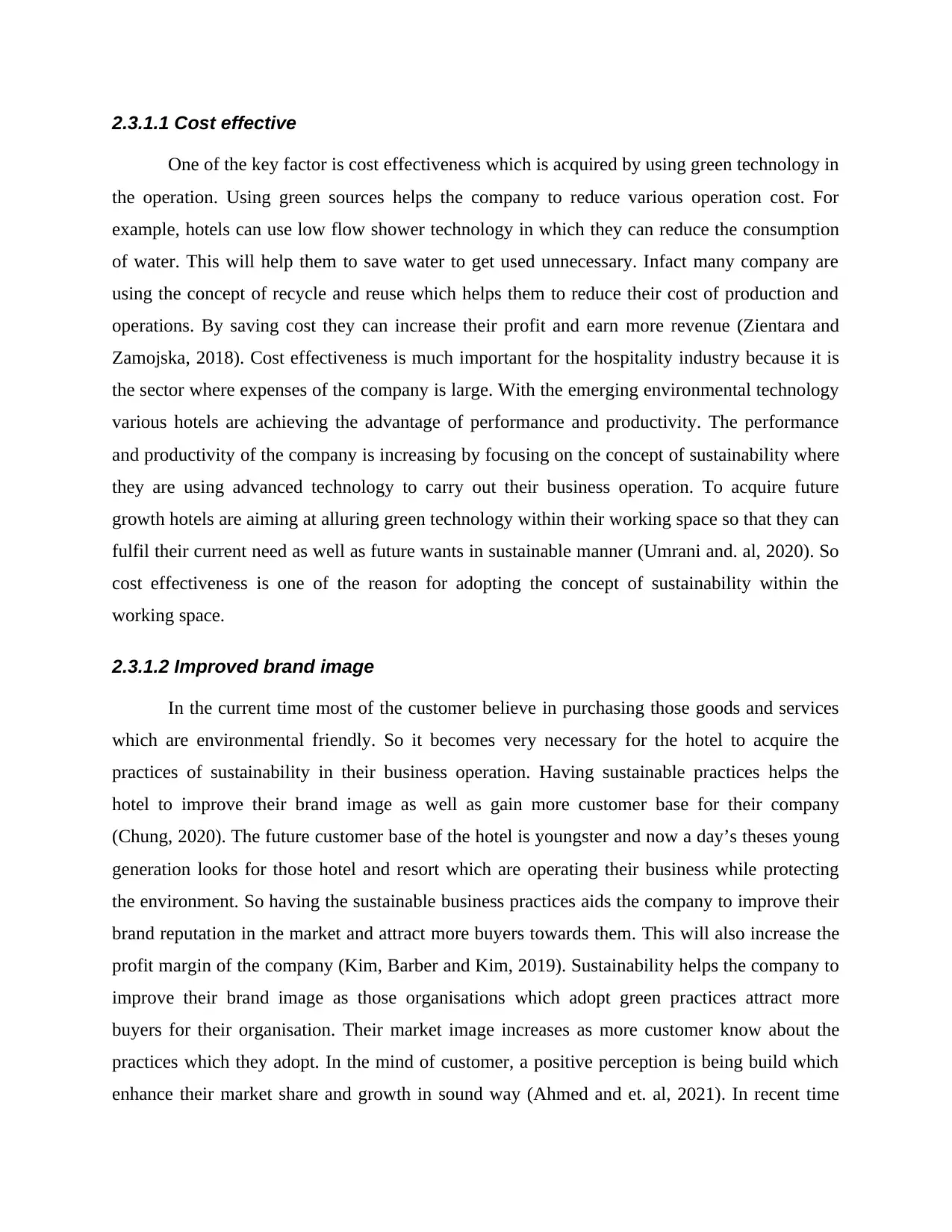
2.3.1.1 Cost effective
One of the key factor is cost effectiveness which is acquired by using green technology in
the operation. Using green sources helps the company to reduce various operation cost. For
example, hotels can use low flow shower technology in which they can reduce the consumption
of water. This will help them to save water to get used unnecessary. Infact many company are
using the concept of recycle and reuse which helps them to reduce their cost of production and
operations. By saving cost they can increase their profit and earn more revenue (Zientara and
Zamojska, 2018). Cost effectiveness is much important for the hospitality industry because it is
the sector where expenses of the company is large. With the emerging environmental technology
various hotels are achieving the advantage of performance and productivity. The performance
and productivity of the company is increasing by focusing on the concept of sustainability where
they are using advanced technology to carry out their business operation. To acquire future
growth hotels are aiming at alluring green technology within their working space so that they can
fulfil their current need as well as future wants in sustainable manner (Umrani and. al, 2020). So
cost effectiveness is one of the reason for adopting the concept of sustainability within the
working space.
2.3.1.2 Improved brand image
In the current time most of the customer believe in purchasing those goods and services
which are environmental friendly. So it becomes very necessary for the hotel to acquire the
practices of sustainability in their business operation. Having sustainable practices helps the
hotel to improve their brand image as well as gain more customer base for their company
(Chung, 2020). The future customer base of the hotel is youngster and now a day’s theses young
generation looks for those hotel and resort which are operating their business while protecting
the environment. So having the sustainable business practices aids the company to improve their
brand reputation in the market and attract more buyers towards them. This will also increase the
profit margin of the company (Kim, Barber and Kim, 2019). Sustainability helps the company to
improve their brand image as those organisations which adopt green practices attract more
buyers for their organisation. Their market image increases as more customer know about the
practices which they adopt. In the mind of customer, a positive perception is being build which
enhance their market share and growth in sound way (Ahmed and et. al, 2021). In recent time
One of the key factor is cost effectiveness which is acquired by using green technology in
the operation. Using green sources helps the company to reduce various operation cost. For
example, hotels can use low flow shower technology in which they can reduce the consumption
of water. This will help them to save water to get used unnecessary. Infact many company are
using the concept of recycle and reuse which helps them to reduce their cost of production and
operations. By saving cost they can increase their profit and earn more revenue (Zientara and
Zamojska, 2018). Cost effectiveness is much important for the hospitality industry because it is
the sector where expenses of the company is large. With the emerging environmental technology
various hotels are achieving the advantage of performance and productivity. The performance
and productivity of the company is increasing by focusing on the concept of sustainability where
they are using advanced technology to carry out their business operation. To acquire future
growth hotels are aiming at alluring green technology within their working space so that they can
fulfil their current need as well as future wants in sustainable manner (Umrani and. al, 2020). So
cost effectiveness is one of the reason for adopting the concept of sustainability within the
working space.
2.3.1.2 Improved brand image
In the current time most of the customer believe in purchasing those goods and services
which are environmental friendly. So it becomes very necessary for the hotel to acquire the
practices of sustainability in their business operation. Having sustainable practices helps the
hotel to improve their brand image as well as gain more customer base for their company
(Chung, 2020). The future customer base of the hotel is youngster and now a day’s theses young
generation looks for those hotel and resort which are operating their business while protecting
the environment. So having the sustainable business practices aids the company to improve their
brand reputation in the market and attract more buyers towards them. This will also increase the
profit margin of the company (Kim, Barber and Kim, 2019). Sustainability helps the company to
improve their brand image as those organisations which adopt green practices attract more
buyers for their organisation. Their market image increases as more customer know about the
practices which they adopt. In the mind of customer, a positive perception is being build which
enhance their market share and growth in sound way (Ahmed and et. al, 2021). In recent time
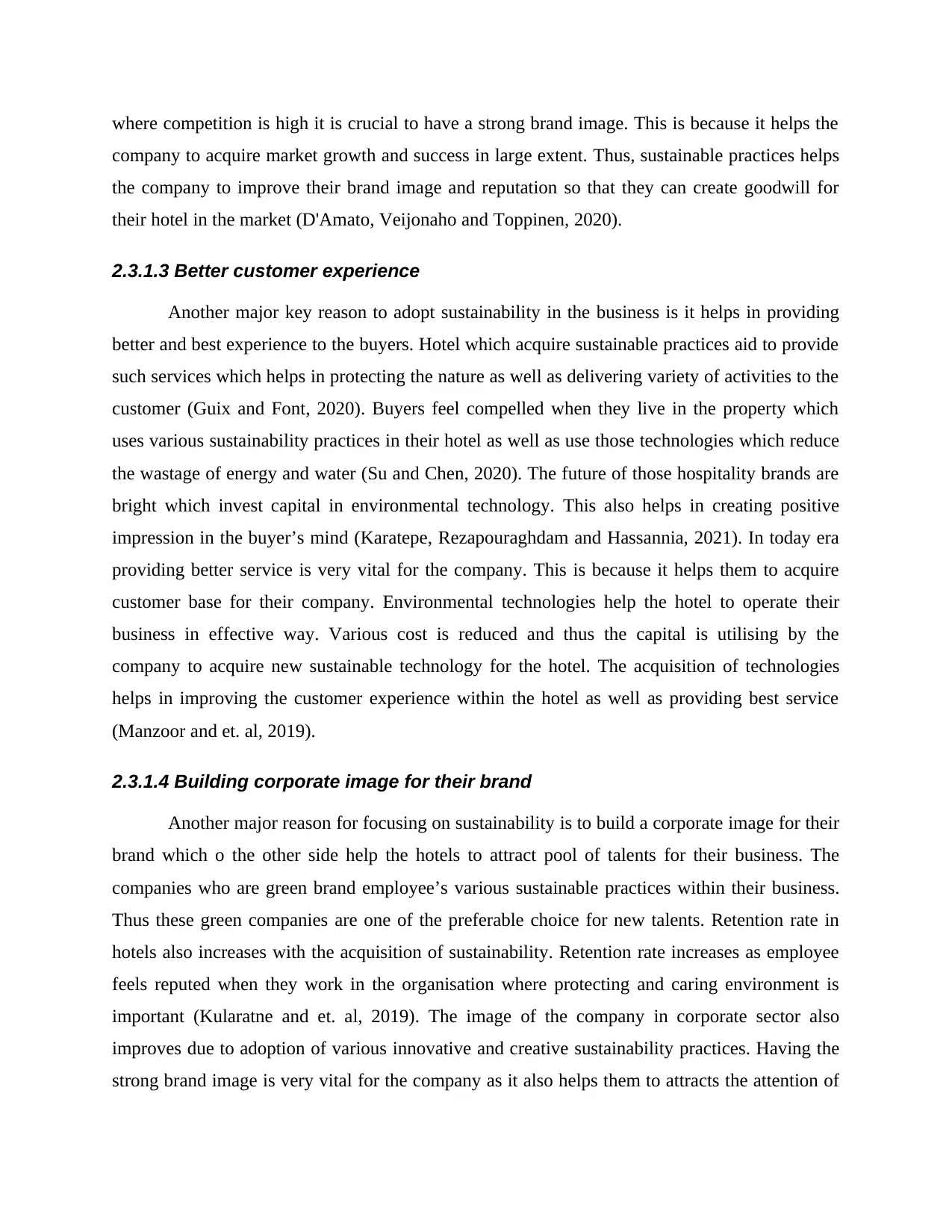
where competition is high it is crucial to have a strong brand image. This is because it helps the
company to acquire market growth and success in large extent. Thus, sustainable practices helps
the company to improve their brand image and reputation so that they can create goodwill for
their hotel in the market (D'Amato, Veijonaho and Toppinen, 2020).
2.3.1.3 Better customer experience
Another major key reason to adopt sustainability in the business is it helps in providing
better and best experience to the buyers. Hotel which acquire sustainable practices aid to provide
such services which helps in protecting the nature as well as delivering variety of activities to the
customer (Guix and Font, 2020). Buyers feel compelled when they live in the property which
uses various sustainability practices in their hotel as well as use those technologies which reduce
the wastage of energy and water (Su and Chen, 2020). The future of those hospitality brands are
bright which invest capital in environmental technology. This also helps in creating positive
impression in the buyer’s mind (Karatepe, Rezapouraghdam and Hassannia, 2021). In today era
providing better service is very vital for the company. This is because it helps them to acquire
customer base for their company. Environmental technologies help the hotel to operate their
business in effective way. Various cost is reduced and thus the capital is utilising by the
company to acquire new sustainable technology for the hotel. The acquisition of technologies
helps in improving the customer experience within the hotel as well as providing best service
(Manzoor and et. al, 2019).
2.3.1.4 Building corporate image for their brand
Another major reason for focusing on sustainability is to build a corporate image for their
brand which o the other side help the hotels to attract pool of talents for their business. The
companies who are green brand employee’s various sustainable practices within their business.
Thus these green companies are one of the preferable choice for new talents. Retention rate in
hotels also increases with the acquisition of sustainability. Retention rate increases as employee
feels reputed when they work in the organisation where protecting and caring environment is
important (Kularatne and et. al, 2019). The image of the company in corporate sector also
improves due to adoption of various innovative and creative sustainability practices. Having the
strong brand image is very vital for the company as it also helps them to attracts the attention of
company to acquire market growth and success in large extent. Thus, sustainable practices helps
the company to improve their brand image and reputation so that they can create goodwill for
their hotel in the market (D'Amato, Veijonaho and Toppinen, 2020).
2.3.1.3 Better customer experience
Another major key reason to adopt sustainability in the business is it helps in providing
better and best experience to the buyers. Hotel which acquire sustainable practices aid to provide
such services which helps in protecting the nature as well as delivering variety of activities to the
customer (Guix and Font, 2020). Buyers feel compelled when they live in the property which
uses various sustainability practices in their hotel as well as use those technologies which reduce
the wastage of energy and water (Su and Chen, 2020). The future of those hospitality brands are
bright which invest capital in environmental technology. This also helps in creating positive
impression in the buyer’s mind (Karatepe, Rezapouraghdam and Hassannia, 2021). In today era
providing better service is very vital for the company. This is because it helps them to acquire
customer base for their company. Environmental technologies help the hotel to operate their
business in effective way. Various cost is reduced and thus the capital is utilising by the
company to acquire new sustainable technology for the hotel. The acquisition of technologies
helps in improving the customer experience within the hotel as well as providing best service
(Manzoor and et. al, 2019).
2.3.1.4 Building corporate image for their brand
Another major reason for focusing on sustainability is to build a corporate image for their
brand which o the other side help the hotels to attract pool of talents for their business. The
companies who are green brand employee’s various sustainable practices within their business.
Thus these green companies are one of the preferable choice for new talents. Retention rate in
hotels also increases with the acquisition of sustainability. Retention rate increases as employee
feels reputed when they work in the organisation where protecting and caring environment is
important (Kularatne and et. al, 2019). The image of the company in corporate sector also
improves due to adoption of various innovative and creative sustainability practices. Having the
strong brand image is very vital for the company as it also helps them to attracts the attention of
Secure Best Marks with AI Grader
Need help grading? Try our AI Grader for instant feedback on your assignments.
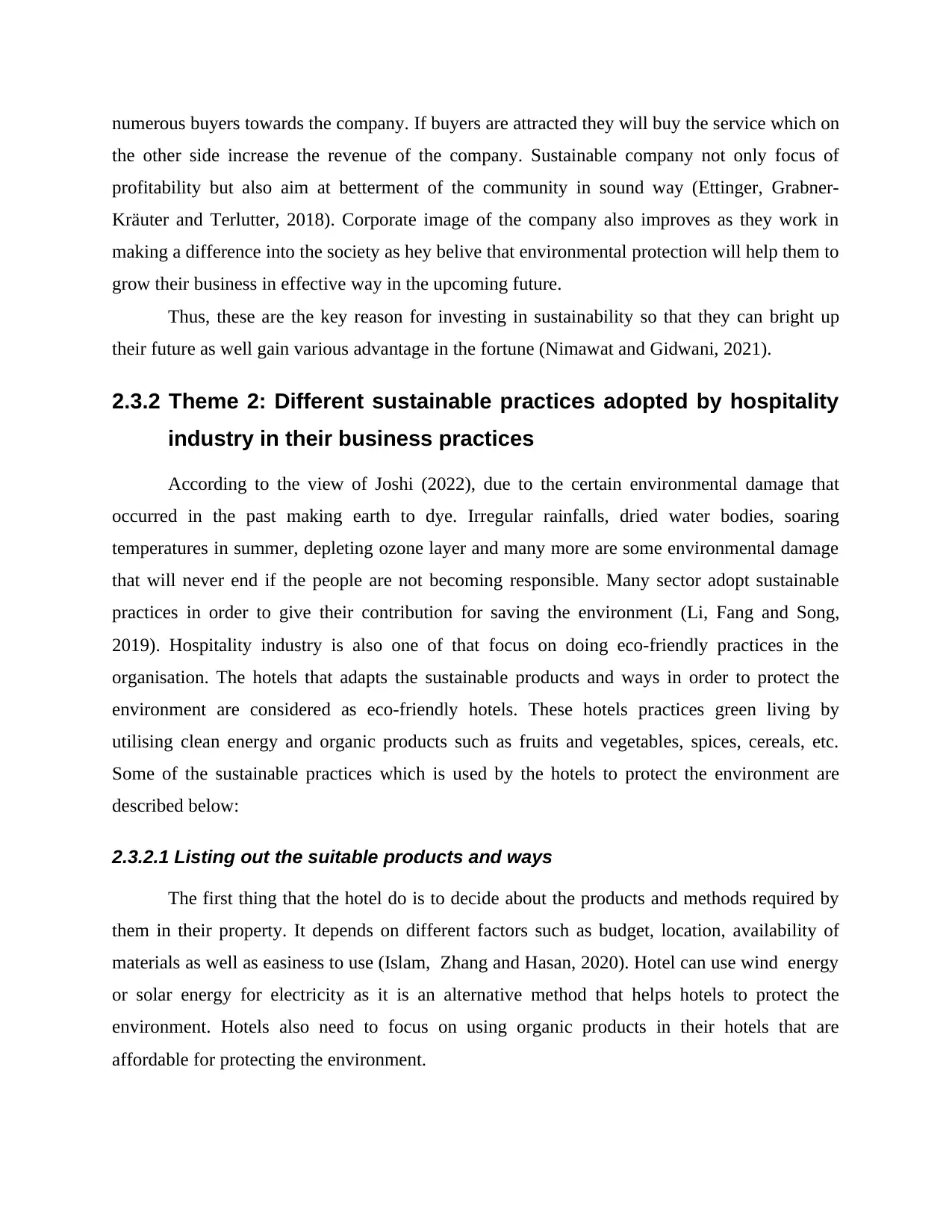
numerous buyers towards the company. If buyers are attracted they will buy the service which on
the other side increase the revenue of the company. Sustainable company not only focus of
profitability but also aim at betterment of the community in sound way (Ettinger, Grabner-
Kräuter and Terlutter, 2018). Corporate image of the company also improves as they work in
making a difference into the society as hey belive that environmental protection will help them to
grow their business in effective way in the upcoming future.
Thus, these are the key reason for investing in sustainability so that they can bright up
their future as well gain various advantage in the fortune (Nimawat and Gidwani, 2021).
2.3.2 Theme 2: Different sustainable practices adopted by hospitality
industry in their business practices
According to the view of Joshi (2022), due to the certain environmental damage that
occurred in the past making earth to dye. Irregular rainfalls, dried water bodies, soaring
temperatures in summer, depleting ozone layer and many more are some environmental damage
that will never end if the people are not becoming responsible. Many sector adopt sustainable
practices in order to give their contribution for saving the environment (Li, Fang and Song,
2019). Hospitality industry is also one of that focus on doing eco-friendly practices in the
organisation. The hotels that adapts the sustainable products and ways in order to protect the
environment are considered as eco-friendly hotels. These hotels practices green living by
utilising clean energy and organic products such as fruits and vegetables, spices, cereals, etc.
Some of the sustainable practices which is used by the hotels to protect the environment are
described below:
2.3.2.1 Listing out the suitable products and ways
The first thing that the hotel do is to decide about the products and methods required by
them in their property. It depends on different factors such as budget, location, availability of
materials as well as easiness to use (Islam, Zhang and Hasan, 2020). Hotel can use wind energy
or solar energy for electricity as it is an alternative method that helps hotels to protect the
environment. Hotels also need to focus on using organic products in their hotels that are
affordable for protecting the environment.
the other side increase the revenue of the company. Sustainable company not only focus of
profitability but also aim at betterment of the community in sound way (Ettinger, Grabner-
Kräuter and Terlutter, 2018). Corporate image of the company also improves as they work in
making a difference into the society as hey belive that environmental protection will help them to
grow their business in effective way in the upcoming future.
Thus, these are the key reason for investing in sustainability so that they can bright up
their future as well gain various advantage in the fortune (Nimawat and Gidwani, 2021).
2.3.2 Theme 2: Different sustainable practices adopted by hospitality
industry in their business practices
According to the view of Joshi (2022), due to the certain environmental damage that
occurred in the past making earth to dye. Irregular rainfalls, dried water bodies, soaring
temperatures in summer, depleting ozone layer and many more are some environmental damage
that will never end if the people are not becoming responsible. Many sector adopt sustainable
practices in order to give their contribution for saving the environment (Li, Fang and Song,
2019). Hospitality industry is also one of that focus on doing eco-friendly practices in the
organisation. The hotels that adapts the sustainable products and ways in order to protect the
environment are considered as eco-friendly hotels. These hotels practices green living by
utilising clean energy and organic products such as fruits and vegetables, spices, cereals, etc.
Some of the sustainable practices which is used by the hotels to protect the environment are
described below:
2.3.2.1 Listing out the suitable products and ways
The first thing that the hotel do is to decide about the products and methods required by
them in their property. It depends on different factors such as budget, location, availability of
materials as well as easiness to use (Islam, Zhang and Hasan, 2020). Hotel can use wind energy
or solar energy for electricity as it is an alternative method that helps hotels to protect the
environment. Hotels also need to focus on using organic products in their hotels that are
affordable for protecting the environment.
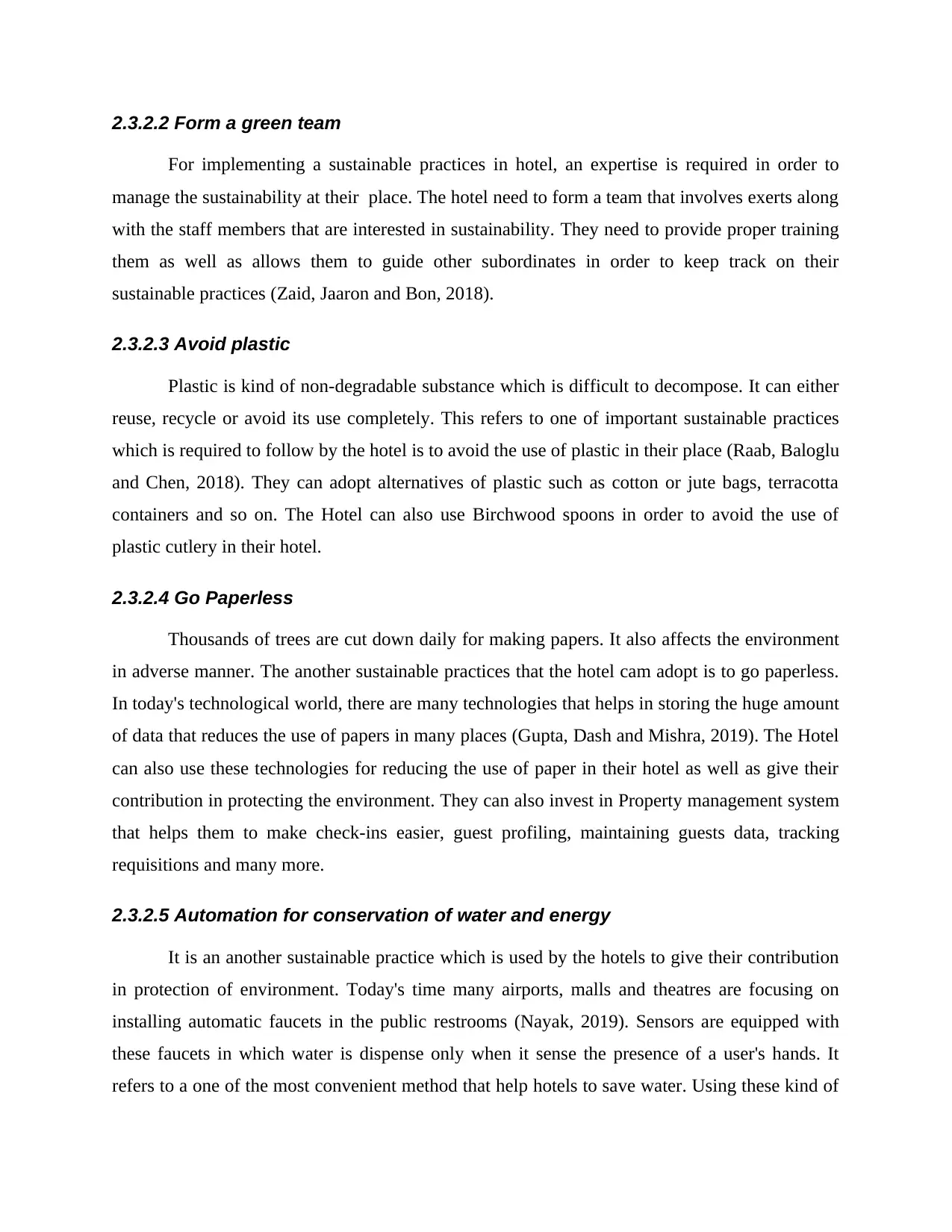
2.3.2.2 Form a green team
For implementing a sustainable practices in hotel, an expertise is required in order to
manage the sustainability at their place. The hotel need to form a team that involves exerts along
with the staff members that are interested in sustainability. They need to provide proper training
them as well as allows them to guide other subordinates in order to keep track on their
sustainable practices (Zaid, Jaaron and Bon, 2018).
2.3.2.3 Avoid plastic
Plastic is kind of non-degradable substance which is difficult to decompose. It can either
reuse, recycle or avoid its use completely. This refers to one of important sustainable practices
which is required to follow by the hotel is to avoid the use of plastic in their place (Raab, Baloglu
and Chen, 2018). They can adopt alternatives of plastic such as cotton or jute bags, terracotta
containers and so on. The Hotel can also use Birchwood spoons in order to avoid the use of
plastic cutlery in their hotel.
2.3.2.4 Go Paperless
Thousands of trees are cut down daily for making papers. It also affects the environment
in adverse manner. The another sustainable practices that the hotel cam adopt is to go paperless.
In today's technological world, there are many technologies that helps in storing the huge amount
of data that reduces the use of papers in many places (Gupta, Dash and Mishra, 2019). The Hotel
can also use these technologies for reducing the use of paper in their hotel as well as give their
contribution in protecting the environment. They can also invest in Property management system
that helps them to make check-ins easier, guest profiling, maintaining guests data, tracking
requisitions and many more.
2.3.2.5 Automation for conservation of water and energy
It is an another sustainable practice which is used by the hotels to give their contribution
in protection of environment. Today's time many airports, malls and theatres are focusing on
installing automatic faucets in the public restrooms (Nayak, 2019). Sensors are equipped with
these faucets in which water is dispense only when it sense the presence of a user's hands. It
refers to a one of the most convenient method that help hotels to save water. Using these kind of
For implementing a sustainable practices in hotel, an expertise is required in order to
manage the sustainability at their place. The hotel need to form a team that involves exerts along
with the staff members that are interested in sustainability. They need to provide proper training
them as well as allows them to guide other subordinates in order to keep track on their
sustainable practices (Zaid, Jaaron and Bon, 2018).
2.3.2.3 Avoid plastic
Plastic is kind of non-degradable substance which is difficult to decompose. It can either
reuse, recycle or avoid its use completely. This refers to one of important sustainable practices
which is required to follow by the hotel is to avoid the use of plastic in their place (Raab, Baloglu
and Chen, 2018). They can adopt alternatives of plastic such as cotton or jute bags, terracotta
containers and so on. The Hotel can also use Birchwood spoons in order to avoid the use of
plastic cutlery in their hotel.
2.3.2.4 Go Paperless
Thousands of trees are cut down daily for making papers. It also affects the environment
in adverse manner. The another sustainable practices that the hotel cam adopt is to go paperless.
In today's technological world, there are many technologies that helps in storing the huge amount
of data that reduces the use of papers in many places (Gupta, Dash and Mishra, 2019). The Hotel
can also use these technologies for reducing the use of paper in their hotel as well as give their
contribution in protecting the environment. They can also invest in Property management system
that helps them to make check-ins easier, guest profiling, maintaining guests data, tracking
requisitions and many more.
2.3.2.5 Automation for conservation of water and energy
It is an another sustainable practice which is used by the hotels to give their contribution
in protection of environment. Today's time many airports, malls and theatres are focusing on
installing automatic faucets in the public restrooms (Nayak, 2019). Sensors are equipped with
these faucets in which water is dispense only when it sense the presence of a user's hands. It
refers to a one of the most convenient method that help hotels to save water. Using these kind of
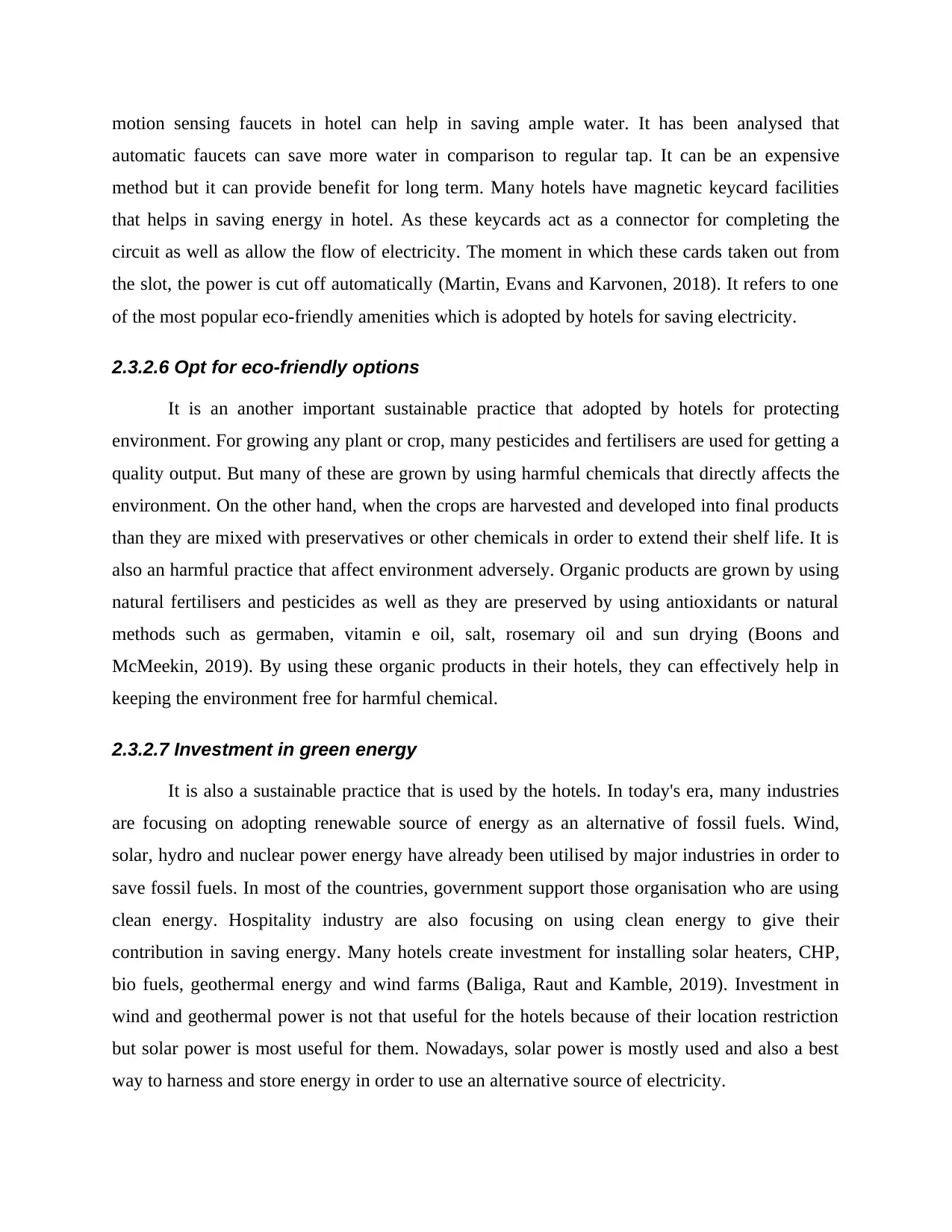
motion sensing faucets in hotel can help in saving ample water. It has been analysed that
automatic faucets can save more water in comparison to regular tap. It can be an expensive
method but it can provide benefit for long term. Many hotels have magnetic keycard facilities
that helps in saving energy in hotel. As these keycards act as a connector for completing the
circuit as well as allow the flow of electricity. The moment in which these cards taken out from
the slot, the power is cut off automatically (Martin, Evans and Karvonen, 2018). It refers to one
of the most popular eco-friendly amenities which is adopted by hotels for saving electricity.
2.3.2.6 Opt for eco-friendly options
It is an another important sustainable practice that adopted by hotels for protecting
environment. For growing any plant or crop, many pesticides and fertilisers are used for getting a
quality output. But many of these are grown by using harmful chemicals that directly affects the
environment. On the other hand, when the crops are harvested and developed into final products
than they are mixed with preservatives or other chemicals in order to extend their shelf life. It is
also an harmful practice that affect environment adversely. Organic products are grown by using
natural fertilisers and pesticides as well as they are preserved by using antioxidants or natural
methods such as germaben, vitamin e oil, salt, rosemary oil and sun drying (Boons and
McMeekin, 2019). By using these organic products in their hotels, they can effectively help in
keeping the environment free for harmful chemical.
2.3.2.7 Investment in green energy
It is also a sustainable practice that is used by the hotels. In today's era, many industries
are focusing on adopting renewable source of energy as an alternative of fossil fuels. Wind,
solar, hydro and nuclear power energy have already been utilised by major industries in order to
save fossil fuels. In most of the countries, government support those organisation who are using
clean energy. Hospitality industry are also focusing on using clean energy to give their
contribution in saving energy. Many hotels create investment for installing solar heaters, CHP,
bio fuels, geothermal energy and wind farms (Baliga, Raut and Kamble, 2019). Investment in
wind and geothermal power is not that useful for the hotels because of their location restriction
but solar power is most useful for them. Nowadays, solar power is mostly used and also a best
way to harness and store energy in order to use an alternative source of electricity.
automatic faucets can save more water in comparison to regular tap. It can be an expensive
method but it can provide benefit for long term. Many hotels have magnetic keycard facilities
that helps in saving energy in hotel. As these keycards act as a connector for completing the
circuit as well as allow the flow of electricity. The moment in which these cards taken out from
the slot, the power is cut off automatically (Martin, Evans and Karvonen, 2018). It refers to one
of the most popular eco-friendly amenities which is adopted by hotels for saving electricity.
2.3.2.6 Opt for eco-friendly options
It is an another important sustainable practice that adopted by hotels for protecting
environment. For growing any plant or crop, many pesticides and fertilisers are used for getting a
quality output. But many of these are grown by using harmful chemicals that directly affects the
environment. On the other hand, when the crops are harvested and developed into final products
than they are mixed with preservatives or other chemicals in order to extend their shelf life. It is
also an harmful practice that affect environment adversely. Organic products are grown by using
natural fertilisers and pesticides as well as they are preserved by using antioxidants or natural
methods such as germaben, vitamin e oil, salt, rosemary oil and sun drying (Boons and
McMeekin, 2019). By using these organic products in their hotels, they can effectively help in
keeping the environment free for harmful chemical.
2.3.2.7 Investment in green energy
It is also a sustainable practice that is used by the hotels. In today's era, many industries
are focusing on adopting renewable source of energy as an alternative of fossil fuels. Wind,
solar, hydro and nuclear power energy have already been utilised by major industries in order to
save fossil fuels. In most of the countries, government support those organisation who are using
clean energy. Hospitality industry are also focusing on using clean energy to give their
contribution in saving energy. Many hotels create investment for installing solar heaters, CHP,
bio fuels, geothermal energy and wind farms (Baliga, Raut and Kamble, 2019). Investment in
wind and geothermal power is not that useful for the hotels because of their location restriction
but solar power is most useful for them. Nowadays, solar power is mostly used and also a best
way to harness and store energy in order to use an alternative source of electricity.
Paraphrase This Document
Need a fresh take? Get an instant paraphrase of this document with our AI Paraphraser
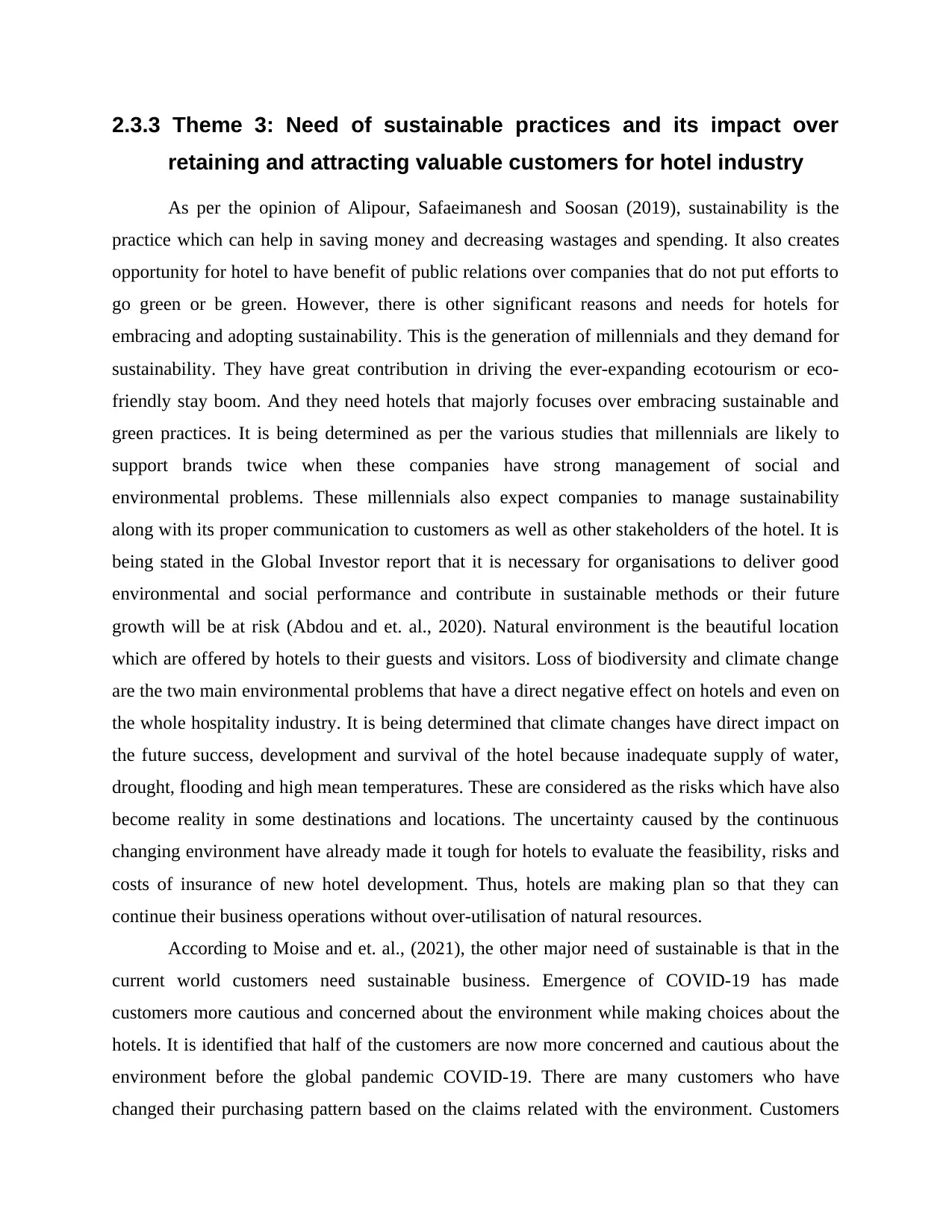
2.3.3 Theme 3: Need of sustainable practices and its impact over
retaining and attracting valuable customers for hotel industry
As per the opinion of Alipour, Safaeimanesh and Soosan (2019), sustainability is the
practice which can help in saving money and decreasing wastages and spending. It also creates
opportunity for hotel to have benefit of public relations over companies that do not put efforts to
go green or be green. However, there is other significant reasons and needs for hotels for
embracing and adopting sustainability. This is the generation of millennials and they demand for
sustainability. They have great contribution in driving the ever-expanding ecotourism or eco-
friendly stay boom. And they need hotels that majorly focuses over embracing sustainable and
green practices. It is being determined as per the various studies that millennials are likely to
support brands twice when these companies have strong management of social and
environmental problems. These millennials also expect companies to manage sustainability
along with its proper communication to customers as well as other stakeholders of the hotel. It is
being stated in the Global Investor report that it is necessary for organisations to deliver good
environmental and social performance and contribute in sustainable methods or their future
growth will be at risk (Abdou and et. al., 2020). Natural environment is the beautiful location
which are offered by hotels to their guests and visitors. Loss of biodiversity and climate change
are the two main environmental problems that have a direct negative effect on hotels and even on
the whole hospitality industry. It is being determined that climate changes have direct impact on
the future success, development and survival of the hotel because inadequate supply of water,
drought, flooding and high mean temperatures. These are considered as the risks which have also
become reality in some destinations and locations. The uncertainty caused by the continuous
changing environment have already made it tough for hotels to evaluate the feasibility, risks and
costs of insurance of new hotel development. Thus, hotels are making plan so that they can
continue their business operations without over-utilisation of natural resources.
According to Moise and et. al., (2021), the other major need of sustainable is that in the
current world customers need sustainable business. Emergence of COVID-19 has made
customers more cautious and concerned about the environment while making choices about the
hotels. It is identified that half of the customers are now more concerned and cautious about the
environment before the global pandemic COVID-19. There are many customers who have
changed their purchasing pattern based on the claims related with the environment. Customers
retaining and attracting valuable customers for hotel industry
As per the opinion of Alipour, Safaeimanesh and Soosan (2019), sustainability is the
practice which can help in saving money and decreasing wastages and spending. It also creates
opportunity for hotel to have benefit of public relations over companies that do not put efforts to
go green or be green. However, there is other significant reasons and needs for hotels for
embracing and adopting sustainability. This is the generation of millennials and they demand for
sustainability. They have great contribution in driving the ever-expanding ecotourism or eco-
friendly stay boom. And they need hotels that majorly focuses over embracing sustainable and
green practices. It is being determined as per the various studies that millennials are likely to
support brands twice when these companies have strong management of social and
environmental problems. These millennials also expect companies to manage sustainability
along with its proper communication to customers as well as other stakeholders of the hotel. It is
being stated in the Global Investor report that it is necessary for organisations to deliver good
environmental and social performance and contribute in sustainable methods or their future
growth will be at risk (Abdou and et. al., 2020). Natural environment is the beautiful location
which are offered by hotels to their guests and visitors. Loss of biodiversity and climate change
are the two main environmental problems that have a direct negative effect on hotels and even on
the whole hospitality industry. It is being determined that climate changes have direct impact on
the future success, development and survival of the hotel because inadequate supply of water,
drought, flooding and high mean temperatures. These are considered as the risks which have also
become reality in some destinations and locations. The uncertainty caused by the continuous
changing environment have already made it tough for hotels to evaluate the feasibility, risks and
costs of insurance of new hotel development. Thus, hotels are making plan so that they can
continue their business operations without over-utilisation of natural resources.
According to Moise and et. al., (2021), the other major need of sustainable is that in the
current world customers need sustainable business. Emergence of COVID-19 has made
customers more cautious and concerned about the environment while making choices about the
hotels. It is identified that half of the customers are now more concerned and cautious about the
environment before the global pandemic COVID-19. There are many customers who have
changed their purchasing pattern based on the claims related with the environment. Customers
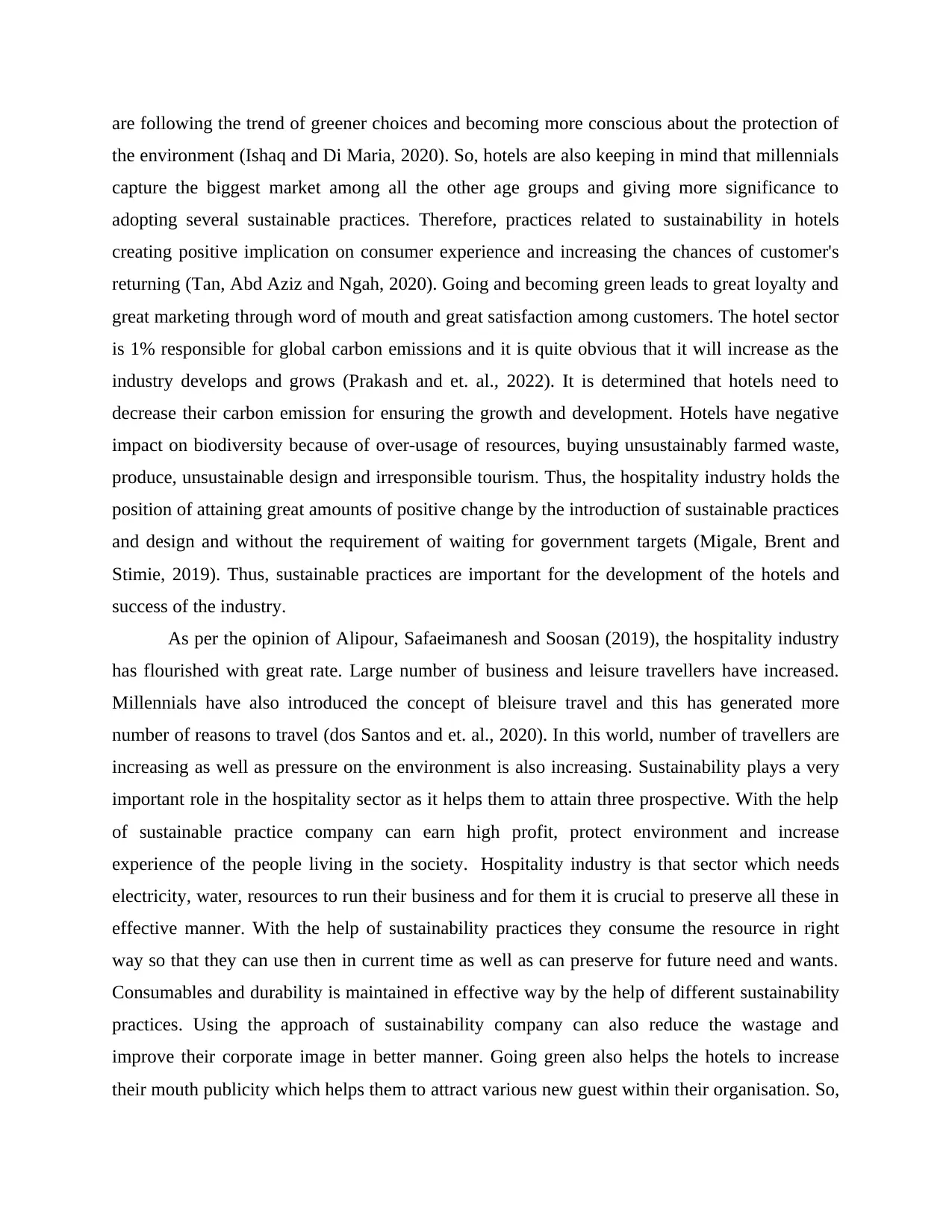
are following the trend of greener choices and becoming more conscious about the protection of
the environment (Ishaq and Di Maria, 2020). So, hotels are also keeping in mind that millennials
capture the biggest market among all the other age groups and giving more significance to
adopting several sustainable practices. Therefore, practices related to sustainability in hotels
creating positive implication on consumer experience and increasing the chances of customer's
returning (Tan, Abd Aziz and Ngah, 2020). Going and becoming green leads to great loyalty and
great marketing through word of mouth and great satisfaction among customers. The hotel sector
is 1% responsible for global carbon emissions and it is quite obvious that it will increase as the
industry develops and grows (Prakash and et. al., 2022). It is determined that hotels need to
decrease their carbon emission for ensuring the growth and development. Hotels have negative
impact on biodiversity because of over-usage of resources, buying unsustainably farmed waste,
produce, unsustainable design and irresponsible tourism. Thus, the hospitality industry holds the
position of attaining great amounts of positive change by the introduction of sustainable practices
and design and without the requirement of waiting for government targets (Migale, Brent and
Stimie, 2019). Thus, sustainable practices are important for the development of the hotels and
success of the industry.
As per the opinion of Alipour, Safaeimanesh and Soosan (2019), the hospitality industry
has flourished with great rate. Large number of business and leisure travellers have increased.
Millennials have also introduced the concept of bleisure travel and this has generated more
number of reasons to travel (dos Santos and et. al., 2020). In this world, number of travellers are
increasing as well as pressure on the environment is also increasing. Sustainability plays a very
important role in the hospitality sector as it helps them to attain three prospective. With the help
of sustainable practice company can earn high profit, protect environment and increase
experience of the people living in the society. Hospitality industry is that sector which needs
electricity, water, resources to run their business and for them it is crucial to preserve all these in
effective manner. With the help of sustainability practices they consume the resource in right
way so that they can use then in current time as well as can preserve for future need and wants.
Consumables and durability is maintained in effective way by the help of different sustainability
practices. Using the approach of sustainability company can also reduce the wastage and
improve their corporate image in better manner. Going green also helps the hotels to increase
their mouth publicity which helps them to attract various new guest within their organisation. So,
the environment (Ishaq and Di Maria, 2020). So, hotels are also keeping in mind that millennials
capture the biggest market among all the other age groups and giving more significance to
adopting several sustainable practices. Therefore, practices related to sustainability in hotels
creating positive implication on consumer experience and increasing the chances of customer's
returning (Tan, Abd Aziz and Ngah, 2020). Going and becoming green leads to great loyalty and
great marketing through word of mouth and great satisfaction among customers. The hotel sector
is 1% responsible for global carbon emissions and it is quite obvious that it will increase as the
industry develops and grows (Prakash and et. al., 2022). It is determined that hotels need to
decrease their carbon emission for ensuring the growth and development. Hotels have negative
impact on biodiversity because of over-usage of resources, buying unsustainably farmed waste,
produce, unsustainable design and irresponsible tourism. Thus, the hospitality industry holds the
position of attaining great amounts of positive change by the introduction of sustainable practices
and design and without the requirement of waiting for government targets (Migale, Brent and
Stimie, 2019). Thus, sustainable practices are important for the development of the hotels and
success of the industry.
As per the opinion of Alipour, Safaeimanesh and Soosan (2019), the hospitality industry
has flourished with great rate. Large number of business and leisure travellers have increased.
Millennials have also introduced the concept of bleisure travel and this has generated more
number of reasons to travel (dos Santos and et. al., 2020). In this world, number of travellers are
increasing as well as pressure on the environment is also increasing. Sustainability plays a very
important role in the hospitality sector as it helps them to attain three prospective. With the help
of sustainable practice company can earn high profit, protect environment and increase
experience of the people living in the society. Hospitality industry is that sector which needs
electricity, water, resources to run their business and for them it is crucial to preserve all these in
effective manner. With the help of sustainability practices they consume the resource in right
way so that they can use then in current time as well as can preserve for future need and wants.
Consumables and durability is maintained in effective way by the help of different sustainability
practices. Using the approach of sustainability company can also reduce the wastage and
improve their corporate image in better manner. Going green also helps the hotels to increase
their mouth publicity which helps them to attract various new guest within their organisation. So,
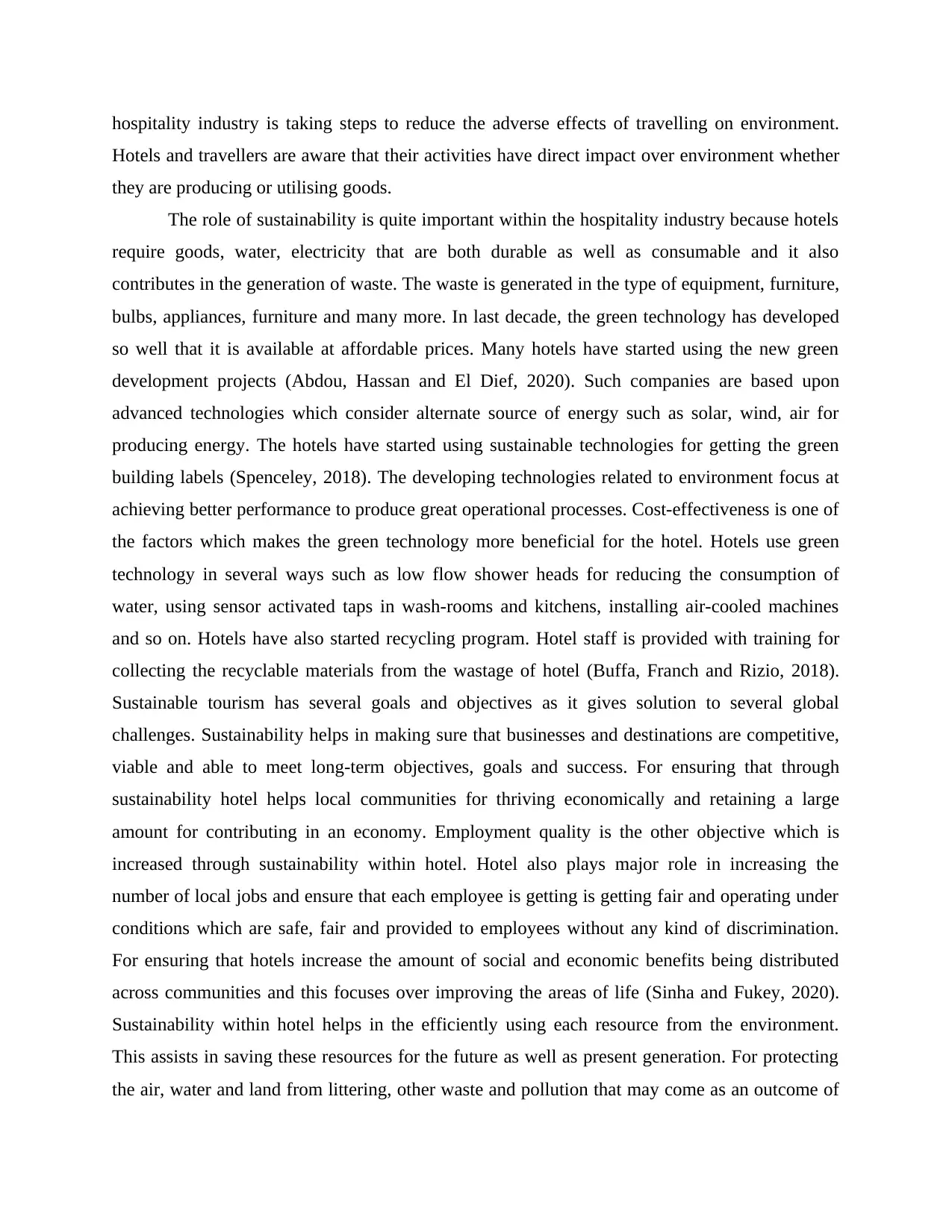
hospitality industry is taking steps to reduce the adverse effects of travelling on environment.
Hotels and travellers are aware that their activities have direct impact over environment whether
they are producing or utilising goods.
The role of sustainability is quite important within the hospitality industry because hotels
require goods, water, electricity that are both durable as well as consumable and it also
contributes in the generation of waste. The waste is generated in the type of equipment, furniture,
bulbs, appliances, furniture and many more. In last decade, the green technology has developed
so well that it is available at affordable prices. Many hotels have started using the new green
development projects (Abdou, Hassan and El Dief, 2020). Such companies are based upon
advanced technologies which consider alternate source of energy such as solar, wind, air for
producing energy. The hotels have started using sustainable technologies for getting the green
building labels (Spenceley, 2018). The developing technologies related to environment focus at
achieving better performance to produce great operational processes. Cost-effectiveness is one of
the factors which makes the green technology more beneficial for the hotel. Hotels use green
technology in several ways such as low flow shower heads for reducing the consumption of
water, using sensor activated taps in wash-rooms and kitchens, installing air-cooled machines
and so on. Hotels have also started recycling program. Hotel staff is provided with training for
collecting the recyclable materials from the wastage of hotel (Buffa, Franch and Rizio, 2018).
Sustainable tourism has several goals and objectives as it gives solution to several global
challenges. Sustainability helps in making sure that businesses and destinations are competitive,
viable and able to meet long-term objectives, goals and success. For ensuring that through
sustainability hotel helps local communities for thriving economically and retaining a large
amount for contributing in an economy. Employment quality is the other objective which is
increased through sustainability within hotel. Hotel also plays major role in increasing the
number of local jobs and ensure that each employee is getting is getting fair and operating under
conditions which are safe, fair and provided to employees without any kind of discrimination.
For ensuring that hotels increase the amount of social and economic benefits being distributed
across communities and this focuses over improving the areas of life (Sinha and Fukey, 2020).
Sustainability within hotel helps in the efficiently using each resource from the environment.
This assists in saving these resources for the future as well as present generation. For protecting
the air, water and land from littering, other waste and pollution that may come as an outcome of
Hotels and travellers are aware that their activities have direct impact over environment whether
they are producing or utilising goods.
The role of sustainability is quite important within the hospitality industry because hotels
require goods, water, electricity that are both durable as well as consumable and it also
contributes in the generation of waste. The waste is generated in the type of equipment, furniture,
bulbs, appliances, furniture and many more. In last decade, the green technology has developed
so well that it is available at affordable prices. Many hotels have started using the new green
development projects (Abdou, Hassan and El Dief, 2020). Such companies are based upon
advanced technologies which consider alternate source of energy such as solar, wind, air for
producing energy. The hotels have started using sustainable technologies for getting the green
building labels (Spenceley, 2018). The developing technologies related to environment focus at
achieving better performance to produce great operational processes. Cost-effectiveness is one of
the factors which makes the green technology more beneficial for the hotel. Hotels use green
technology in several ways such as low flow shower heads for reducing the consumption of
water, using sensor activated taps in wash-rooms and kitchens, installing air-cooled machines
and so on. Hotels have also started recycling program. Hotel staff is provided with training for
collecting the recyclable materials from the wastage of hotel (Buffa, Franch and Rizio, 2018).
Sustainable tourism has several goals and objectives as it gives solution to several global
challenges. Sustainability helps in making sure that businesses and destinations are competitive,
viable and able to meet long-term objectives, goals and success. For ensuring that through
sustainability hotel helps local communities for thriving economically and retaining a large
amount for contributing in an economy. Employment quality is the other objective which is
increased through sustainability within hotel. Hotel also plays major role in increasing the
number of local jobs and ensure that each employee is getting is getting fair and operating under
conditions which are safe, fair and provided to employees without any kind of discrimination.
For ensuring that hotels increase the amount of social and economic benefits being distributed
across communities and this focuses over improving the areas of life (Sinha and Fukey, 2020).
Sustainability within hotel helps in the efficiently using each resource from the environment.
This assists in saving these resources for the future as well as present generation. For protecting
the air, water and land from littering, other waste and pollution that may come as an outcome of
Secure Best Marks with AI Grader
Need help grading? Try our AI Grader for instant feedback on your assignments.
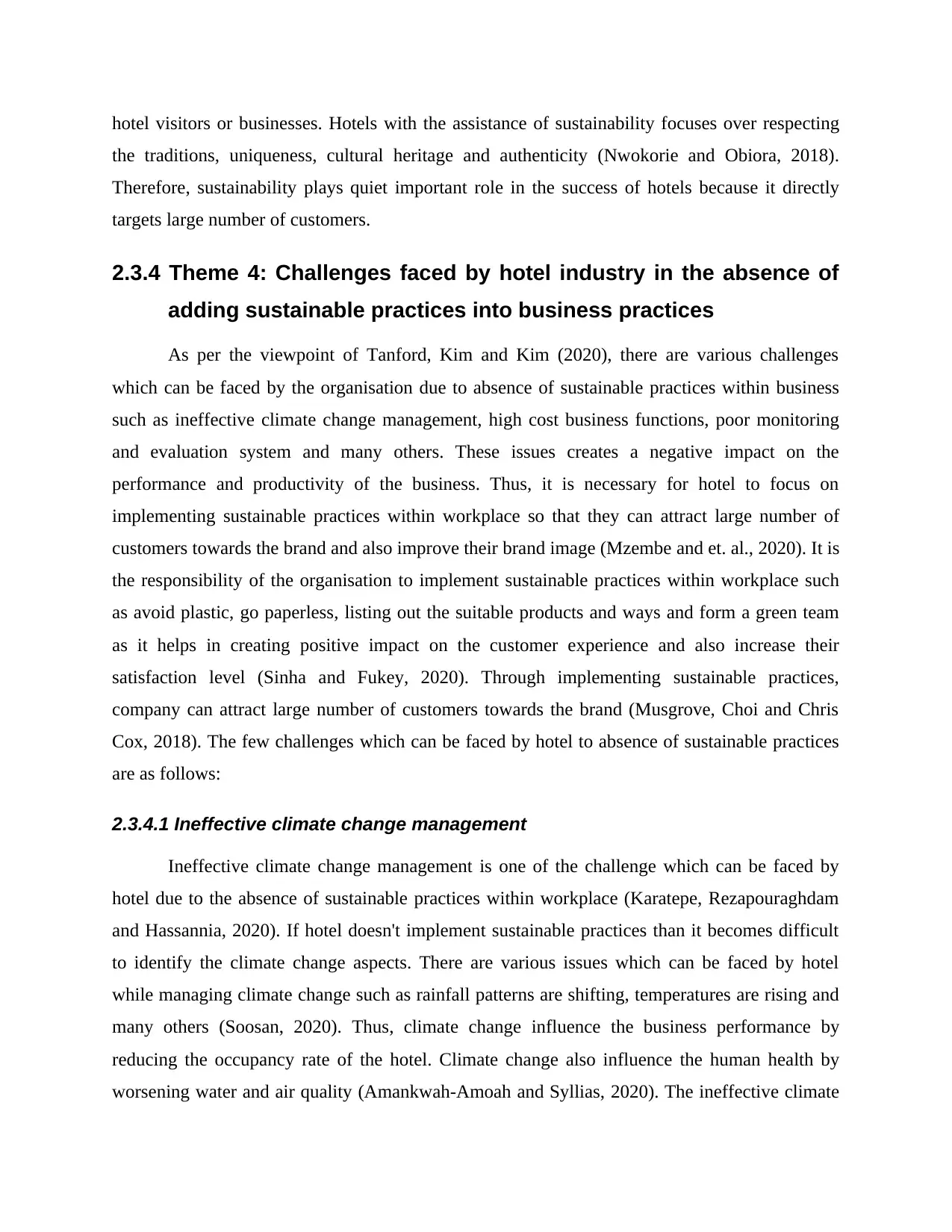
hotel visitors or businesses. Hotels with the assistance of sustainability focuses over respecting
the traditions, uniqueness, cultural heritage and authenticity (Nwokorie and Obiora, 2018).
Therefore, sustainability plays quiet important role in the success of hotels because it directly
targets large number of customers.
2.3.4 Theme 4: Challenges faced by hotel industry in the absence of
adding sustainable practices into business practices
As per the viewpoint of Tanford, Kim and Kim (2020), there are various challenges
which can be faced by the organisation due to absence of sustainable practices within business
such as ineffective climate change management, high cost business functions, poor monitoring
and evaluation system and many others. These issues creates a negative impact on the
performance and productivity of the business. Thus, it is necessary for hotel to focus on
implementing sustainable practices within workplace so that they can attract large number of
customers towards the brand and also improve their brand image (Mzembe and et. al., 2020). It is
the responsibility of the organisation to implement sustainable practices within workplace such
as avoid plastic, go paperless, listing out the suitable products and ways and form a green team
as it helps in creating positive impact on the customer experience and also increase their
satisfaction level (Sinha and Fukey, 2020). Through implementing sustainable practices,
company can attract large number of customers towards the brand (Musgrove, Choi and Chris
Cox, 2018). The few challenges which can be faced by hotel to absence of sustainable practices
are as follows:
2.3.4.1 Ineffective climate change management
Ineffective climate change management is one of the challenge which can be faced by
hotel due to the absence of sustainable practices within workplace (Karatepe, Rezapouraghdam
and Hassannia, 2020). If hotel doesn't implement sustainable practices than it becomes difficult
to identify the climate change aspects. There are various issues which can be faced by hotel
while managing climate change such as rainfall patterns are shifting, temperatures are rising and
many others (Soosan, 2020). Thus, climate change influence the business performance by
reducing the occupancy rate of the hotel. Climate change also influence the human health by
worsening water and air quality (Amankwah‐Amoah and Syllias, 2020). The ineffective climate
the traditions, uniqueness, cultural heritage and authenticity (Nwokorie and Obiora, 2018).
Therefore, sustainability plays quiet important role in the success of hotels because it directly
targets large number of customers.
2.3.4 Theme 4: Challenges faced by hotel industry in the absence of
adding sustainable practices into business practices
As per the viewpoint of Tanford, Kim and Kim (2020), there are various challenges
which can be faced by the organisation due to absence of sustainable practices within business
such as ineffective climate change management, high cost business functions, poor monitoring
and evaluation system and many others. These issues creates a negative impact on the
performance and productivity of the business. Thus, it is necessary for hotel to focus on
implementing sustainable practices within workplace so that they can attract large number of
customers towards the brand and also improve their brand image (Mzembe and et. al., 2020). It is
the responsibility of the organisation to implement sustainable practices within workplace such
as avoid plastic, go paperless, listing out the suitable products and ways and form a green team
as it helps in creating positive impact on the customer experience and also increase their
satisfaction level (Sinha and Fukey, 2020). Through implementing sustainable practices,
company can attract large number of customers towards the brand (Musgrove, Choi and Chris
Cox, 2018). The few challenges which can be faced by hotel to absence of sustainable practices
are as follows:
2.3.4.1 Ineffective climate change management
Ineffective climate change management is one of the challenge which can be faced by
hotel due to the absence of sustainable practices within workplace (Karatepe, Rezapouraghdam
and Hassannia, 2020). If hotel doesn't implement sustainable practices than it becomes difficult
to identify the climate change aspects. There are various issues which can be faced by hotel
while managing climate change such as rainfall patterns are shifting, temperatures are rising and
many others (Soosan, 2020). Thus, climate change influence the business performance by
reducing the occupancy rate of the hotel. Climate change also influence the human health by
worsening water and air quality (Amankwah‐Amoah and Syllias, 2020). The ineffective climate
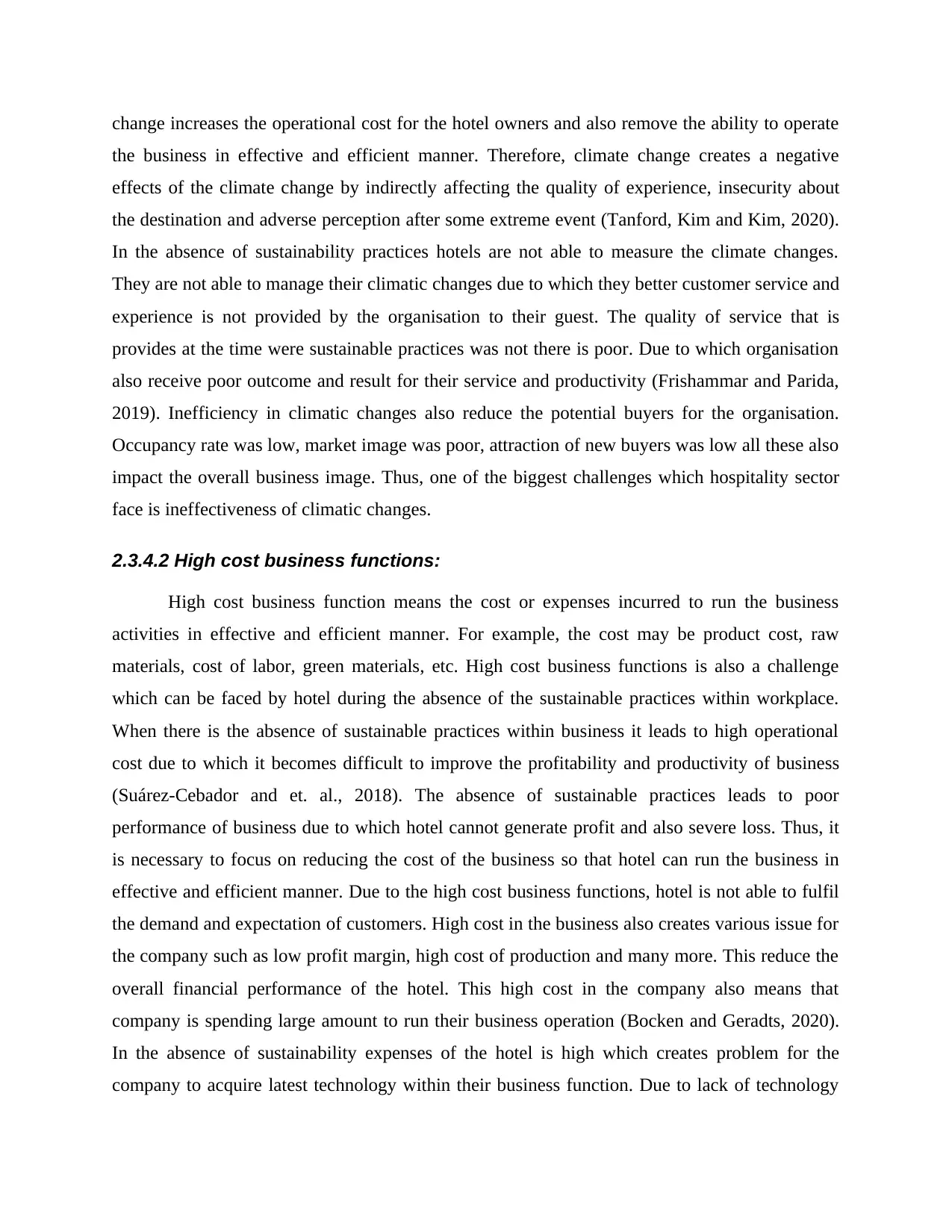
change increases the operational cost for the hotel owners and also remove the ability to operate
the business in effective and efficient manner. Therefore, climate change creates a negative
effects of the climate change by indirectly affecting the quality of experience, insecurity about
the destination and adverse perception after some extreme event (Tanford, Kim and Kim, 2020).
In the absence of sustainability practices hotels are not able to measure the climate changes.
They are not able to manage their climatic changes due to which they better customer service and
experience is not provided by the organisation to their guest. The quality of service that is
provides at the time were sustainable practices was not there is poor. Due to which organisation
also receive poor outcome and result for their service and productivity (Frishammar and Parida,
2019). Inefficiency in climatic changes also reduce the potential buyers for the organisation.
Occupancy rate was low, market image was poor, attraction of new buyers was low all these also
impact the overall business image. Thus, one of the biggest challenges which hospitality sector
face is ineffectiveness of climatic changes.
2.3.4.2 High cost business functions:
High cost business function means the cost or expenses incurred to run the business
activities in effective and efficient manner. For example, the cost may be product cost, raw
materials, cost of labor, green materials, etc. High cost business functions is also a challenge
which can be faced by hotel during the absence of the sustainable practices within workplace.
When there is the absence of sustainable practices within business it leads to high operational
cost due to which it becomes difficult to improve the profitability and productivity of business
(Suárez‐Cebador and et. al., 2018). The absence of sustainable practices leads to poor
performance of business due to which hotel cannot generate profit and also severe loss. Thus, it
is necessary to focus on reducing the cost of the business so that hotel can run the business in
effective and efficient manner. Due to the high cost business functions, hotel is not able to fulfil
the demand and expectation of customers. High cost in the business also creates various issue for
the company such as low profit margin, high cost of production and many more. This reduce the
overall financial performance of the hotel. This high cost in the company also means that
company is spending large amount to run their business operation (Bocken and Geradts, 2020).
In the absence of sustainability expenses of the hotel is high which creates problem for the
company to acquire latest technology within their business function. Due to lack of technology
the business in effective and efficient manner. Therefore, climate change creates a negative
effects of the climate change by indirectly affecting the quality of experience, insecurity about
the destination and adverse perception after some extreme event (Tanford, Kim and Kim, 2020).
In the absence of sustainability practices hotels are not able to measure the climate changes.
They are not able to manage their climatic changes due to which they better customer service and
experience is not provided by the organisation to their guest. The quality of service that is
provides at the time were sustainable practices was not there is poor. Due to which organisation
also receive poor outcome and result for their service and productivity (Frishammar and Parida,
2019). Inefficiency in climatic changes also reduce the potential buyers for the organisation.
Occupancy rate was low, market image was poor, attraction of new buyers was low all these also
impact the overall business image. Thus, one of the biggest challenges which hospitality sector
face is ineffectiveness of climatic changes.
2.3.4.2 High cost business functions:
High cost business function means the cost or expenses incurred to run the business
activities in effective and efficient manner. For example, the cost may be product cost, raw
materials, cost of labor, green materials, etc. High cost business functions is also a challenge
which can be faced by hotel during the absence of the sustainable practices within workplace.
When there is the absence of sustainable practices within business it leads to high operational
cost due to which it becomes difficult to improve the profitability and productivity of business
(Suárez‐Cebador and et. al., 2018). The absence of sustainable practices leads to poor
performance of business due to which hotel cannot generate profit and also severe loss. Thus, it
is necessary to focus on reducing the cost of the business so that hotel can run the business in
effective and efficient manner. Due to the high cost business functions, hotel is not able to fulfil
the demand and expectation of customers. High cost in the business also creates various issue for
the company such as low profit margin, high cost of production and many more. This reduce the
overall financial performance of the hotel. This high cost in the company also means that
company is spending large amount to run their business operation (Bocken and Geradts, 2020).
In the absence of sustainability expenses of the hotel is high which creates problem for the
company to acquire latest technology within their business function. Due to lack of technology
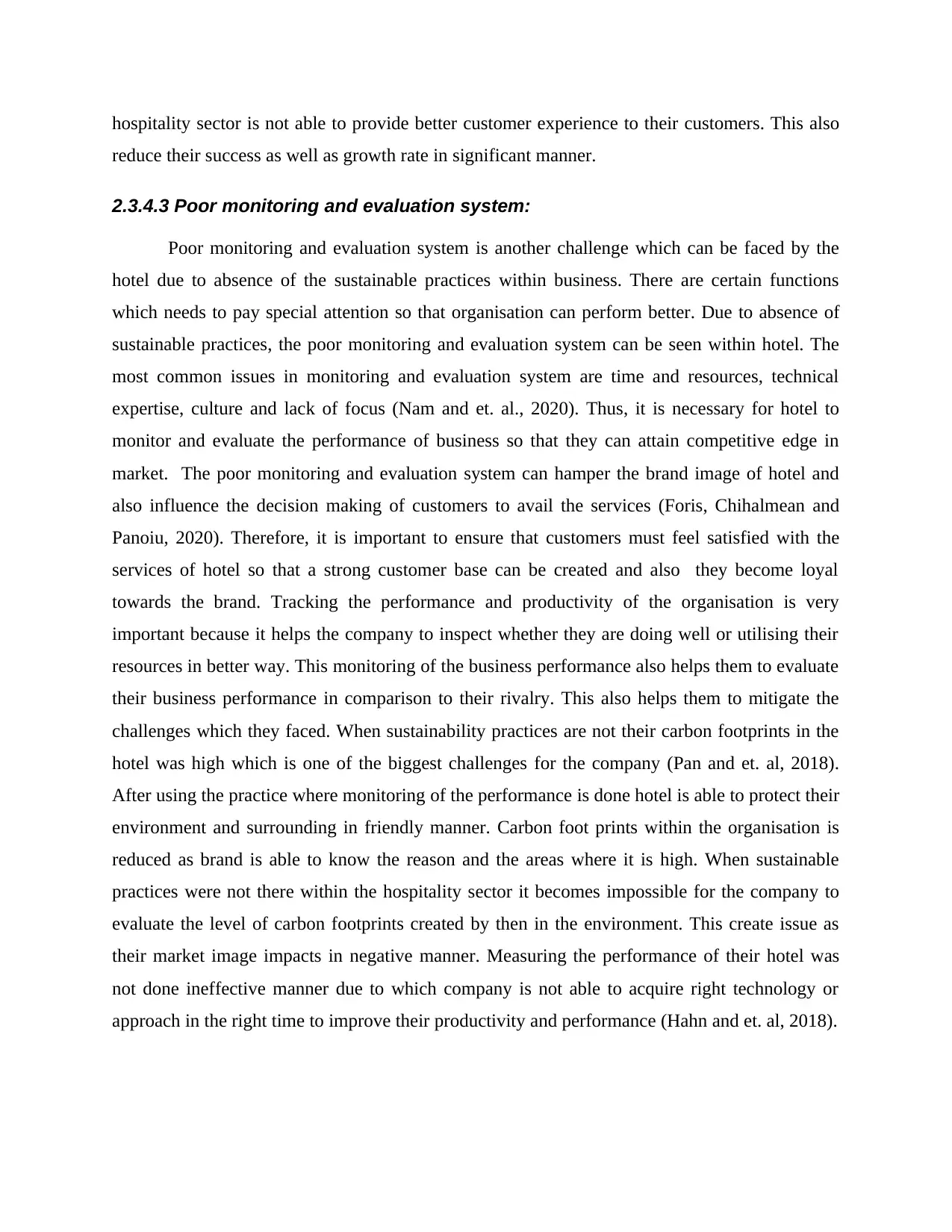
hospitality sector is not able to provide better customer experience to their customers. This also
reduce their success as well as growth rate in significant manner.
2.3.4.3 Poor monitoring and evaluation system:
Poor monitoring and evaluation system is another challenge which can be faced by the
hotel due to absence of the sustainable practices within business. There are certain functions
which needs to pay special attention so that organisation can perform better. Due to absence of
sustainable practices, the poor monitoring and evaluation system can be seen within hotel. The
most common issues in monitoring and evaluation system are time and resources, technical
expertise, culture and lack of focus (Nam and et. al., 2020). Thus, it is necessary for hotel to
monitor and evaluate the performance of business so that they can attain competitive edge in
market. The poor monitoring and evaluation system can hamper the brand image of hotel and
also influence the decision making of customers to avail the services (Foris, Chihalmean and
Panoiu, 2020). Therefore, it is important to ensure that customers must feel satisfied with the
services of hotel so that a strong customer base can be created and also they become loyal
towards the brand. Tracking the performance and productivity of the organisation is very
important because it helps the company to inspect whether they are doing well or utilising their
resources in better way. This monitoring of the business performance also helps them to evaluate
their business performance in comparison to their rivalry. This also helps them to mitigate the
challenges which they faced. When sustainability practices are not their carbon footprints in the
hotel was high which is one of the biggest challenges for the company (Pan and et. al, 2018).
After using the practice where monitoring of the performance is done hotel is able to protect their
environment and surrounding in friendly manner. Carbon foot prints within the organisation is
reduced as brand is able to know the reason and the areas where it is high. When sustainable
practices were not there within the hospitality sector it becomes impossible for the company to
evaluate the level of carbon footprints created by then in the environment. This create issue as
their market image impacts in negative manner. Measuring the performance of their hotel was
not done ineffective manner due to which company is not able to acquire right technology or
approach in the right time to improve their productivity and performance (Hahn and et. al, 2018).
reduce their success as well as growth rate in significant manner.
2.3.4.3 Poor monitoring and evaluation system:
Poor monitoring and evaluation system is another challenge which can be faced by the
hotel due to absence of the sustainable practices within business. There are certain functions
which needs to pay special attention so that organisation can perform better. Due to absence of
sustainable practices, the poor monitoring and evaluation system can be seen within hotel. The
most common issues in monitoring and evaluation system are time and resources, technical
expertise, culture and lack of focus (Nam and et. al., 2020). Thus, it is necessary for hotel to
monitor and evaluate the performance of business so that they can attain competitive edge in
market. The poor monitoring and evaluation system can hamper the brand image of hotel and
also influence the decision making of customers to avail the services (Foris, Chihalmean and
Panoiu, 2020). Therefore, it is important to ensure that customers must feel satisfied with the
services of hotel so that a strong customer base can be created and also they become loyal
towards the brand. Tracking the performance and productivity of the organisation is very
important because it helps the company to inspect whether they are doing well or utilising their
resources in better way. This monitoring of the business performance also helps them to evaluate
their business performance in comparison to their rivalry. This also helps them to mitigate the
challenges which they faced. When sustainability practices are not their carbon footprints in the
hotel was high which is one of the biggest challenges for the company (Pan and et. al, 2018).
After using the practice where monitoring of the performance is done hotel is able to protect their
environment and surrounding in friendly manner. Carbon foot prints within the organisation is
reduced as brand is able to know the reason and the areas where it is high. When sustainable
practices were not there within the hospitality sector it becomes impossible for the company to
evaluate the level of carbon footprints created by then in the environment. This create issue as
their market image impacts in negative manner. Measuring the performance of their hotel was
not done ineffective manner due to which company is not able to acquire right technology or
approach in the right time to improve their productivity and performance (Hahn and et. al, 2018).
Paraphrase This Document
Need a fresh take? Get an instant paraphrase of this document with our AI Paraphraser
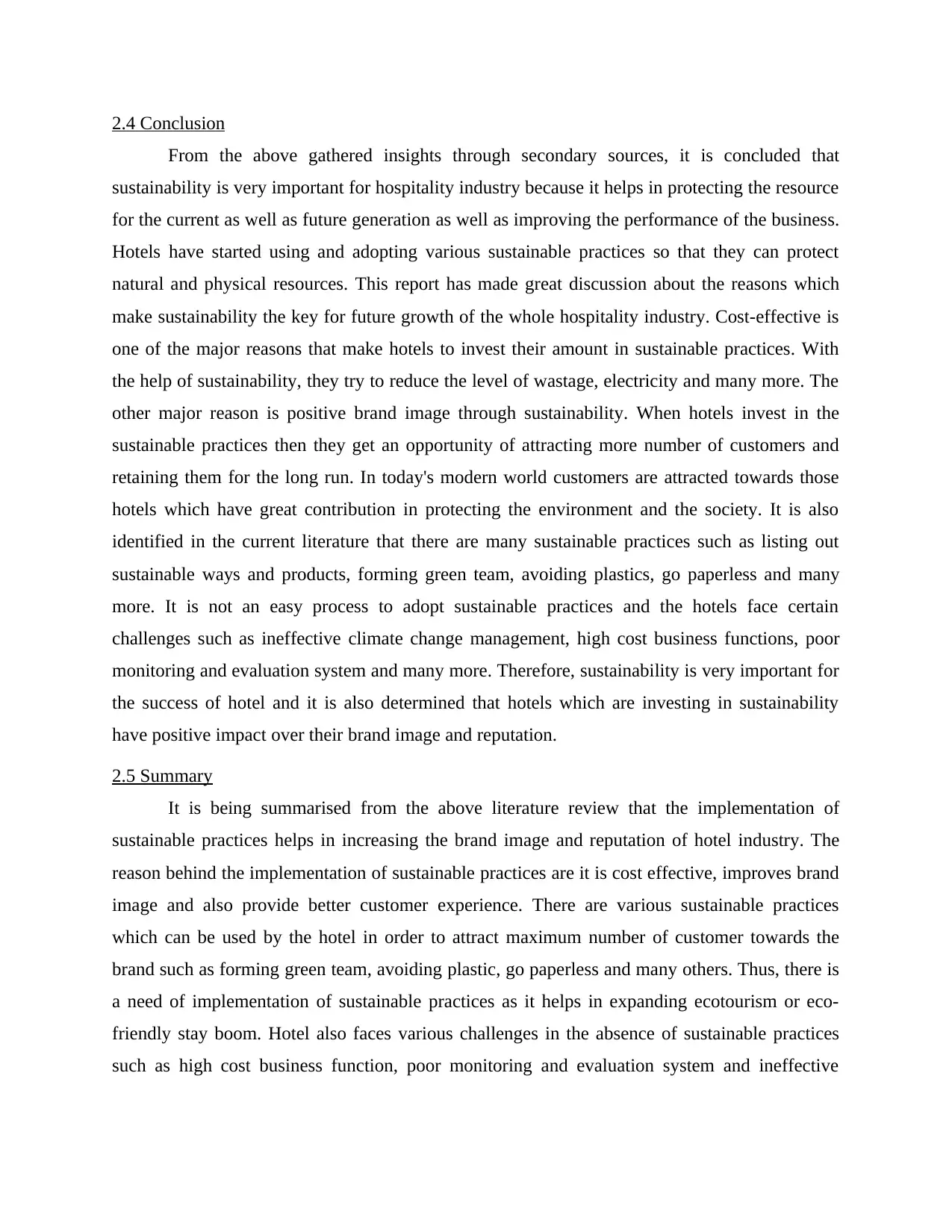
2.4 Conclusion
From the above gathered insights through secondary sources, it is concluded that
sustainability is very important for hospitality industry because it helps in protecting the resource
for the current as well as future generation as well as improving the performance of the business.
Hotels have started using and adopting various sustainable practices so that they can protect
natural and physical resources. This report has made great discussion about the reasons which
make sustainability the key for future growth of the whole hospitality industry. Cost-effective is
one of the major reasons that make hotels to invest their amount in sustainable practices. With
the help of sustainability, they try to reduce the level of wastage, electricity and many more. The
other major reason is positive brand image through sustainability. When hotels invest in the
sustainable practices then they get an opportunity of attracting more number of customers and
retaining them for the long run. In today's modern world customers are attracted towards those
hotels which have great contribution in protecting the environment and the society. It is also
identified in the current literature that there are many sustainable practices such as listing out
sustainable ways and products, forming green team, avoiding plastics, go paperless and many
more. It is not an easy process to adopt sustainable practices and the hotels face certain
challenges such as ineffective climate change management, high cost business functions, poor
monitoring and evaluation system and many more. Therefore, sustainability is very important for
the success of hotel and it is also determined that hotels which are investing in sustainability
have positive impact over their brand image and reputation.
2.5 Summary
It is being summarised from the above literature review that the implementation of
sustainable practices helps in increasing the brand image and reputation of hotel industry. The
reason behind the implementation of sustainable practices are it is cost effective, improves brand
image and also provide better customer experience. There are various sustainable practices
which can be used by the hotel in order to attract maximum number of customer towards the
brand such as forming green team, avoiding plastic, go paperless and many others. Thus, there is
a need of implementation of sustainable practices as it helps in expanding ecotourism or eco-
friendly stay boom. Hotel also faces various challenges in the absence of sustainable practices
such as high cost business function, poor monitoring and evaluation system and ineffective
From the above gathered insights through secondary sources, it is concluded that
sustainability is very important for hospitality industry because it helps in protecting the resource
for the current as well as future generation as well as improving the performance of the business.
Hotels have started using and adopting various sustainable practices so that they can protect
natural and physical resources. This report has made great discussion about the reasons which
make sustainability the key for future growth of the whole hospitality industry. Cost-effective is
one of the major reasons that make hotels to invest their amount in sustainable practices. With
the help of sustainability, they try to reduce the level of wastage, electricity and many more. The
other major reason is positive brand image through sustainability. When hotels invest in the
sustainable practices then they get an opportunity of attracting more number of customers and
retaining them for the long run. In today's modern world customers are attracted towards those
hotels which have great contribution in protecting the environment and the society. It is also
identified in the current literature that there are many sustainable practices such as listing out
sustainable ways and products, forming green team, avoiding plastics, go paperless and many
more. It is not an easy process to adopt sustainable practices and the hotels face certain
challenges such as ineffective climate change management, high cost business functions, poor
monitoring and evaluation system and many more. Therefore, sustainability is very important for
the success of hotel and it is also determined that hotels which are investing in sustainability
have positive impact over their brand image and reputation.
2.5 Summary
It is being summarised from the above literature review that the implementation of
sustainable practices helps in increasing the brand image and reputation of hotel industry. The
reason behind the implementation of sustainable practices are it is cost effective, improves brand
image and also provide better customer experience. There are various sustainable practices
which can be used by the hotel in order to attract maximum number of customer towards the
brand such as forming green team, avoiding plastic, go paperless and many others. Thus, there is
a need of implementation of sustainable practices as it helps in expanding ecotourism or eco-
friendly stay boom. Hotel also faces various challenges in the absence of sustainable practices
such as high cost business function, poor monitoring and evaluation system and ineffective

climate change management. Thus, sustainable practices help in improving the performance and
growth of hotel.
growth of hotel.
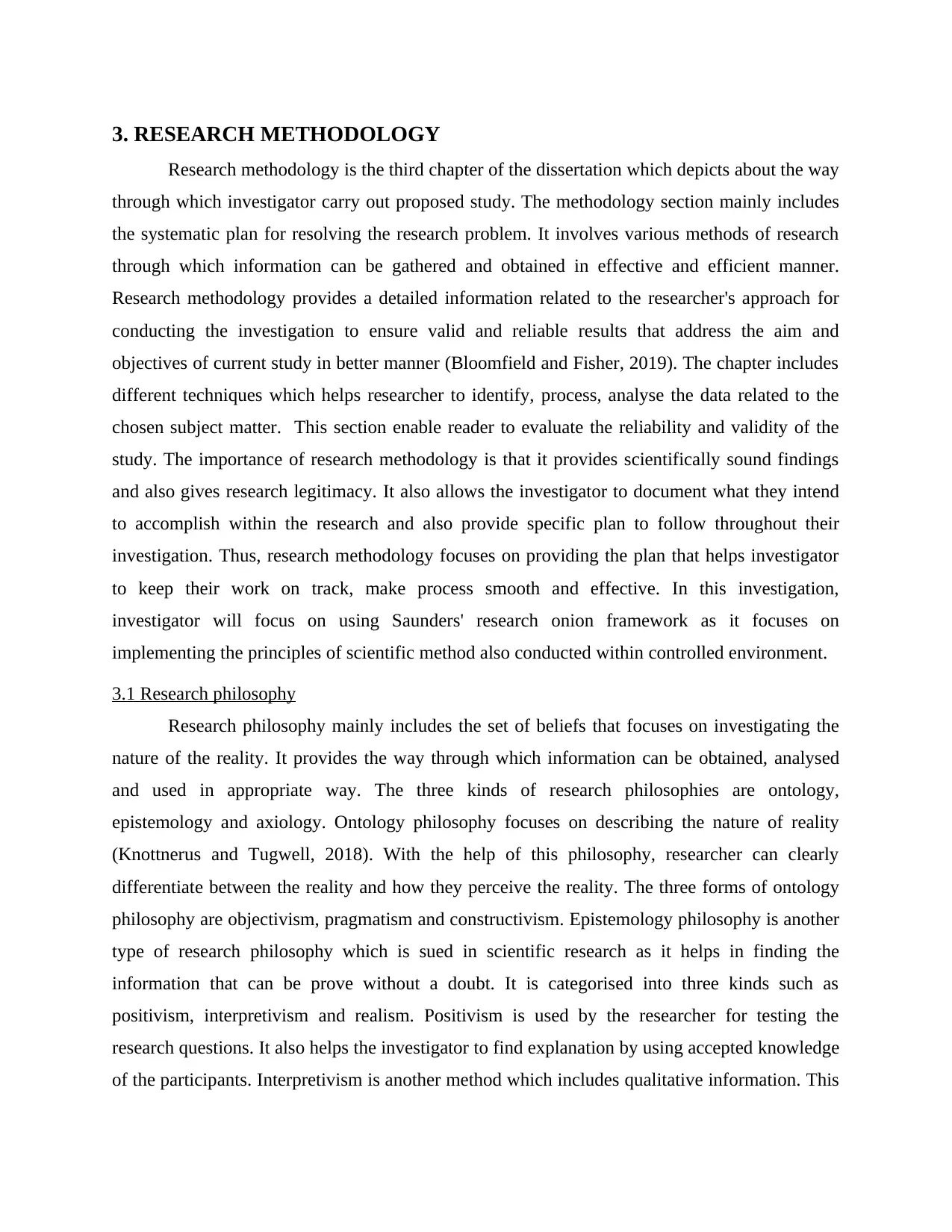
3. RESEARCH METHODOLOGY
Research methodology is the third chapter of the dissertation which depicts about the way
through which investigator carry out proposed study. The methodology section mainly includes
the systematic plan for resolving the research problem. It involves various methods of research
through which information can be gathered and obtained in effective and efficient manner.
Research methodology provides a detailed information related to the researcher's approach for
conducting the investigation to ensure valid and reliable results that address the aim and
objectives of current study in better manner (Bloomfield and Fisher, 2019). The chapter includes
different techniques which helps researcher to identify, process, analyse the data related to the
chosen subject matter. This section enable reader to evaluate the reliability and validity of the
study. The importance of research methodology is that it provides scientifically sound findings
and also gives research legitimacy. It also allows the investigator to document what they intend
to accomplish within the research and also provide specific plan to follow throughout their
investigation. Thus, research methodology focuses on providing the plan that helps investigator
to keep their work on track, make process smooth and effective. In this investigation,
investigator will focus on using Saunders' research onion framework as it focuses on
implementing the principles of scientific method also conducted within controlled environment.
3.1 Research philosophy
Research philosophy mainly includes the set of beliefs that focuses on investigating the
nature of the reality. It provides the way through which information can be obtained, analysed
and used in appropriate way. The three kinds of research philosophies are ontology,
epistemology and axiology. Ontology philosophy focuses on describing the nature of reality
(Knottnerus and Tugwell, 2018). With the help of this philosophy, researcher can clearly
differentiate between the reality and how they perceive the reality. The three forms of ontology
philosophy are objectivism, pragmatism and constructivism. Epistemology philosophy is another
type of research philosophy which is sued in scientific research as it helps in finding the
information that can be prove without a doubt. It is categorised into three kinds such as
positivism, interpretivism and realism. Positivism is used by the researcher for testing the
research questions. It also helps the investigator to find explanation by using accepted knowledge
of the participants. Interpretivism is another method which includes qualitative information. This
Research methodology is the third chapter of the dissertation which depicts about the way
through which investigator carry out proposed study. The methodology section mainly includes
the systematic plan for resolving the research problem. It involves various methods of research
through which information can be gathered and obtained in effective and efficient manner.
Research methodology provides a detailed information related to the researcher's approach for
conducting the investigation to ensure valid and reliable results that address the aim and
objectives of current study in better manner (Bloomfield and Fisher, 2019). The chapter includes
different techniques which helps researcher to identify, process, analyse the data related to the
chosen subject matter. This section enable reader to evaluate the reliability and validity of the
study. The importance of research methodology is that it provides scientifically sound findings
and also gives research legitimacy. It also allows the investigator to document what they intend
to accomplish within the research and also provide specific plan to follow throughout their
investigation. Thus, research methodology focuses on providing the plan that helps investigator
to keep their work on track, make process smooth and effective. In this investigation,
investigator will focus on using Saunders' research onion framework as it focuses on
implementing the principles of scientific method also conducted within controlled environment.
3.1 Research philosophy
Research philosophy mainly includes the set of beliefs that focuses on investigating the
nature of the reality. It provides the way through which information can be obtained, analysed
and used in appropriate way. The three kinds of research philosophies are ontology,
epistemology and axiology. Ontology philosophy focuses on describing the nature of reality
(Knottnerus and Tugwell, 2018). With the help of this philosophy, researcher can clearly
differentiate between the reality and how they perceive the reality. The three forms of ontology
philosophy are objectivism, pragmatism and constructivism. Epistemology philosophy is another
type of research philosophy which is sued in scientific research as it helps in finding the
information that can be prove without a doubt. It is categorised into three kinds such as
positivism, interpretivism and realism. Positivism is used by the researcher for testing the
research questions. It also helps the investigator to find explanation by using accepted knowledge
of the participants. Interpretivism is another method which includes qualitative information. This
Secure Best Marks with AI Grader
Need help grading? Try our AI Grader for instant feedback on your assignments.
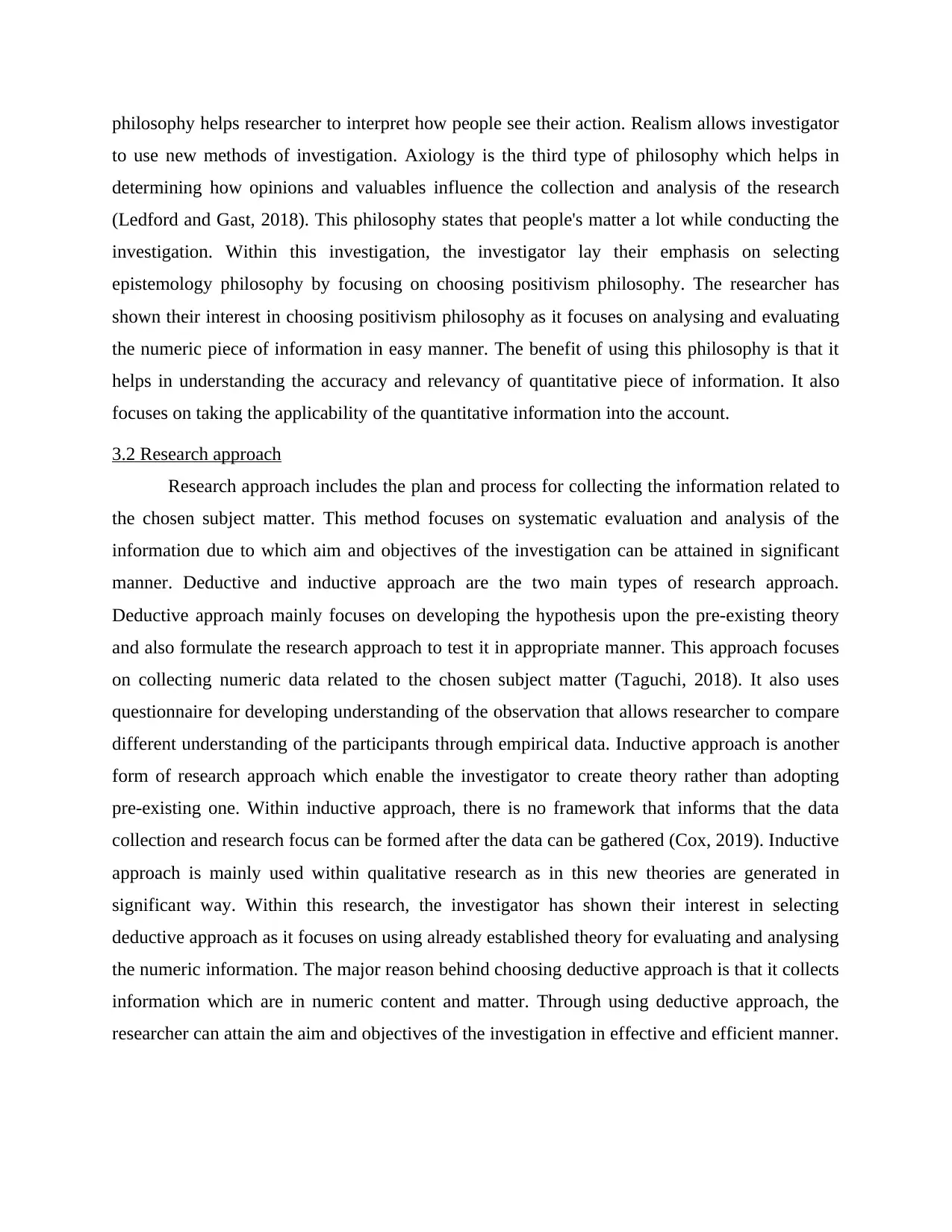
philosophy helps researcher to interpret how people see their action. Realism allows investigator
to use new methods of investigation. Axiology is the third type of philosophy which helps in
determining how opinions and valuables influence the collection and analysis of the research
(Ledford and Gast, 2018). This philosophy states that people's matter a lot while conducting the
investigation. Within this investigation, the investigator lay their emphasis on selecting
epistemology philosophy by focusing on choosing positivism philosophy. The researcher has
shown their interest in choosing positivism philosophy as it focuses on analysing and evaluating
the numeric piece of information in easy manner. The benefit of using this philosophy is that it
helps in understanding the accuracy and relevancy of quantitative piece of information. It also
focuses on taking the applicability of the quantitative information into the account.
3.2 Research approach
Research approach includes the plan and process for collecting the information related to
the chosen subject matter. This method focuses on systematic evaluation and analysis of the
information due to which aim and objectives of the investigation can be attained in significant
manner. Deductive and inductive approach are the two main types of research approach.
Deductive approach mainly focuses on developing the hypothesis upon the pre-existing theory
and also formulate the research approach to test it in appropriate manner. This approach focuses
on collecting numeric data related to the chosen subject matter (Taguchi, 2018). It also uses
questionnaire for developing understanding of the observation that allows researcher to compare
different understanding of the participants through empirical data. Inductive approach is another
form of research approach which enable the investigator to create theory rather than adopting
pre-existing one. Within inductive approach, there is no framework that informs that the data
collection and research focus can be formed after the data can be gathered (Cox, 2019). Inductive
approach is mainly used within qualitative research as in this new theories are generated in
significant way. Within this research, the investigator has shown their interest in selecting
deductive approach as it focuses on using already established theory for evaluating and analysing
the numeric information. The major reason behind choosing deductive approach is that it collects
information which are in numeric content and matter. Through using deductive approach, the
researcher can attain the aim and objectives of the investigation in effective and efficient manner.
to use new methods of investigation. Axiology is the third type of philosophy which helps in
determining how opinions and valuables influence the collection and analysis of the research
(Ledford and Gast, 2018). This philosophy states that people's matter a lot while conducting the
investigation. Within this investigation, the investigator lay their emphasis on selecting
epistemology philosophy by focusing on choosing positivism philosophy. The researcher has
shown their interest in choosing positivism philosophy as it focuses on analysing and evaluating
the numeric piece of information in easy manner. The benefit of using this philosophy is that it
helps in understanding the accuracy and relevancy of quantitative piece of information. It also
focuses on taking the applicability of the quantitative information into the account.
3.2 Research approach
Research approach includes the plan and process for collecting the information related to
the chosen subject matter. This method focuses on systematic evaluation and analysis of the
information due to which aim and objectives of the investigation can be attained in significant
manner. Deductive and inductive approach are the two main types of research approach.
Deductive approach mainly focuses on developing the hypothesis upon the pre-existing theory
and also formulate the research approach to test it in appropriate manner. This approach focuses
on collecting numeric data related to the chosen subject matter (Taguchi, 2018). It also uses
questionnaire for developing understanding of the observation that allows researcher to compare
different understanding of the participants through empirical data. Inductive approach is another
form of research approach which enable the investigator to create theory rather than adopting
pre-existing one. Within inductive approach, there is no framework that informs that the data
collection and research focus can be formed after the data can be gathered (Cox, 2019). Inductive
approach is mainly used within qualitative research as in this new theories are generated in
significant way. Within this research, the investigator has shown their interest in selecting
deductive approach as it focuses on using already established theory for evaluating and analysing
the numeric information. The major reason behind choosing deductive approach is that it collects
information which are in numeric content and matter. Through using deductive approach, the
researcher can attain the aim and objectives of the investigation in effective and efficient manner.
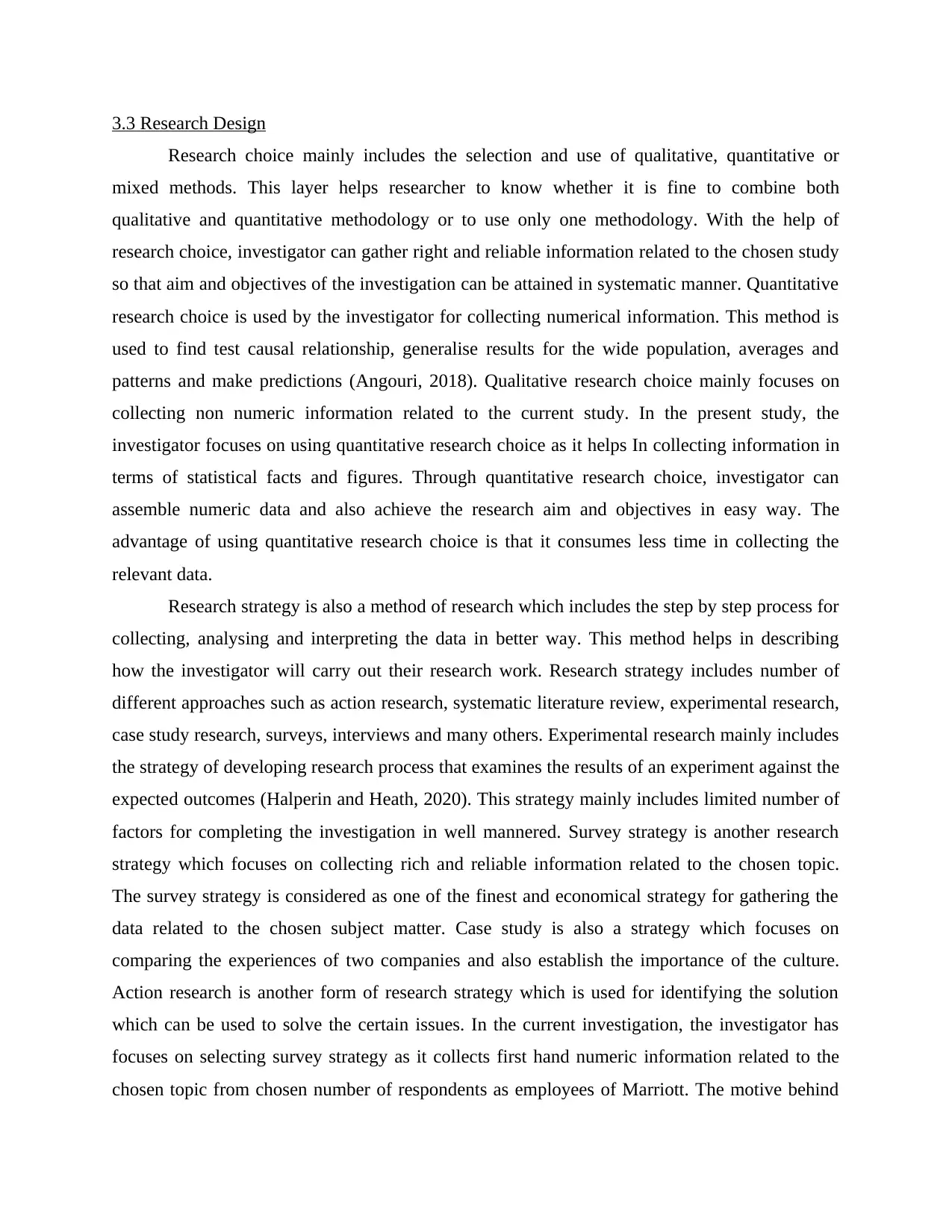
3.3 Research Design
Research choice mainly includes the selection and use of qualitative, quantitative or
mixed methods. This layer helps researcher to know whether it is fine to combine both
qualitative and quantitative methodology or to use only one methodology. With the help of
research choice, investigator can gather right and reliable information related to the chosen study
so that aim and objectives of the investigation can be attained in systematic manner. Quantitative
research choice is used by the investigator for collecting numerical information. This method is
used to find test causal relationship, generalise results for the wide population, averages and
patterns and make predictions (Angouri, 2018). Qualitative research choice mainly focuses on
collecting non numeric information related to the current study. In the present study, the
investigator focuses on using quantitative research choice as it helps In collecting information in
terms of statistical facts and figures. Through quantitative research choice, investigator can
assemble numeric data and also achieve the research aim and objectives in easy way. The
advantage of using quantitative research choice is that it consumes less time in collecting the
relevant data.
Research strategy is also a method of research which includes the step by step process for
collecting, analysing and interpreting the data in better way. This method helps in describing
how the investigator will carry out their research work. Research strategy includes number of
different approaches such as action research, systematic literature review, experimental research,
case study research, surveys, interviews and many others. Experimental research mainly includes
the strategy of developing research process that examines the results of an experiment against the
expected outcomes (Halperin and Heath, 2020). This strategy mainly includes limited number of
factors for completing the investigation in well mannered. Survey strategy is another research
strategy which focuses on collecting rich and reliable information related to the chosen topic.
The survey strategy is considered as one of the finest and economical strategy for gathering the
data related to the chosen subject matter. Case study is also a strategy which focuses on
comparing the experiences of two companies and also establish the importance of the culture.
Action research is another form of research strategy which is used for identifying the solution
which can be used to solve the certain issues. In the current investigation, the investigator has
focuses on selecting survey strategy as it collects first hand numeric information related to the
chosen topic from chosen number of respondents as employees of Marriott. The motive behind
Research choice mainly includes the selection and use of qualitative, quantitative or
mixed methods. This layer helps researcher to know whether it is fine to combine both
qualitative and quantitative methodology or to use only one methodology. With the help of
research choice, investigator can gather right and reliable information related to the chosen study
so that aim and objectives of the investigation can be attained in systematic manner. Quantitative
research choice is used by the investigator for collecting numerical information. This method is
used to find test causal relationship, generalise results for the wide population, averages and
patterns and make predictions (Angouri, 2018). Qualitative research choice mainly focuses on
collecting non numeric information related to the current study. In the present study, the
investigator focuses on using quantitative research choice as it helps In collecting information in
terms of statistical facts and figures. Through quantitative research choice, investigator can
assemble numeric data and also achieve the research aim and objectives in easy way. The
advantage of using quantitative research choice is that it consumes less time in collecting the
relevant data.
Research strategy is also a method of research which includes the step by step process for
collecting, analysing and interpreting the data in better way. This method helps in describing
how the investigator will carry out their research work. Research strategy includes number of
different approaches such as action research, systematic literature review, experimental research,
case study research, surveys, interviews and many others. Experimental research mainly includes
the strategy of developing research process that examines the results of an experiment against the
expected outcomes (Halperin and Heath, 2020). This strategy mainly includes limited number of
factors for completing the investigation in well mannered. Survey strategy is another research
strategy which focuses on collecting rich and reliable information related to the chosen topic.
The survey strategy is considered as one of the finest and economical strategy for gathering the
data related to the chosen subject matter. Case study is also a strategy which focuses on
comparing the experiences of two companies and also establish the importance of the culture.
Action research is another form of research strategy which is used for identifying the solution
which can be used to solve the certain issues. In the current investigation, the investigator has
focuses on selecting survey strategy as it collects first hand numeric information related to the
chosen topic from chosen number of respondents as employees of Marriott. The motive behind
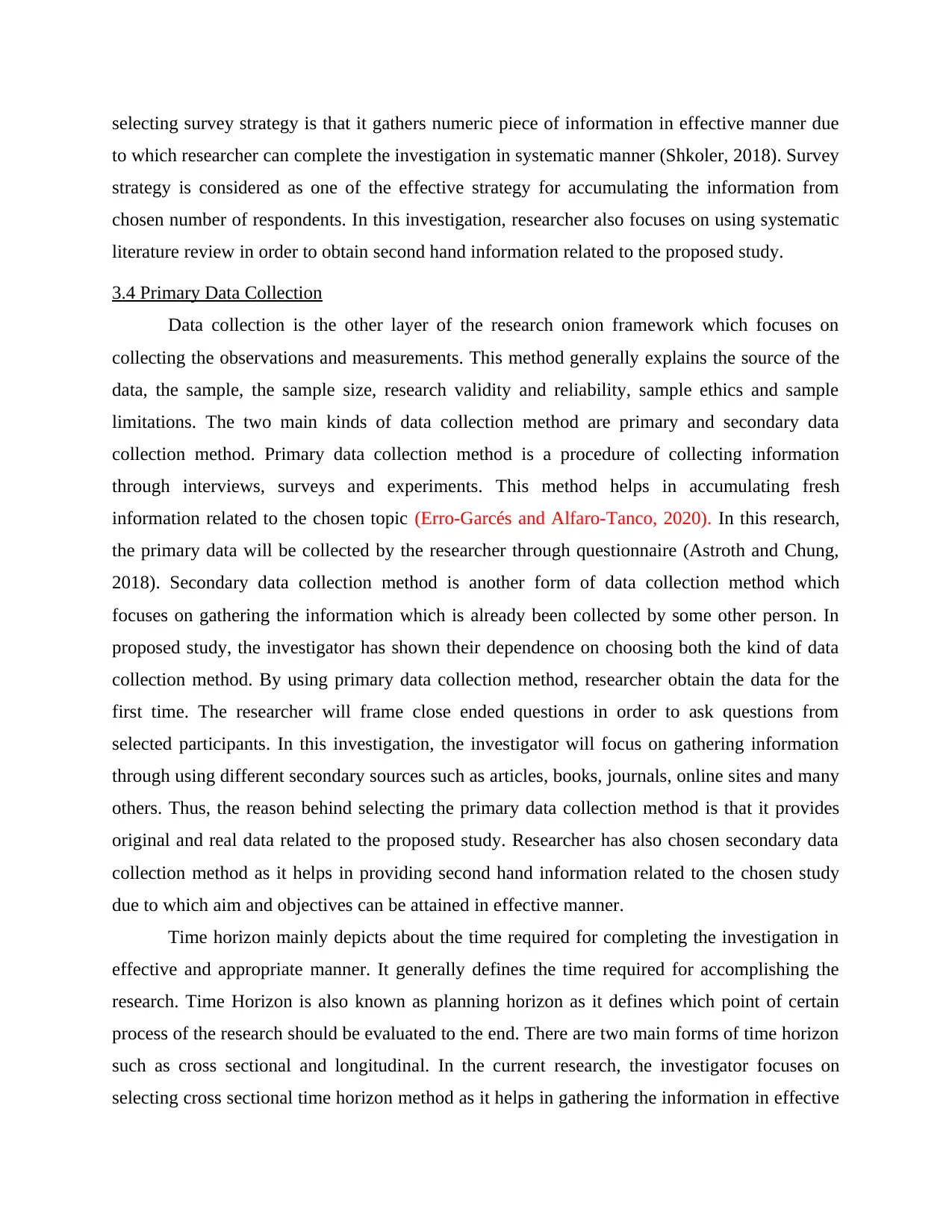
selecting survey strategy is that it gathers numeric piece of information in effective manner due
to which researcher can complete the investigation in systematic manner (Shkoler, 2018). Survey
strategy is considered as one of the effective strategy for accumulating the information from
chosen number of respondents. In this investigation, researcher also focuses on using systematic
literature review in order to obtain second hand information related to the proposed study.
3.4 Primary Data Collection
Data collection is the other layer of the research onion framework which focuses on
collecting the observations and measurements. This method generally explains the source of the
data, the sample, the sample size, research validity and reliability, sample ethics and sample
limitations. The two main kinds of data collection method are primary and secondary data
collection method. Primary data collection method is a procedure of collecting information
through interviews, surveys and experiments. This method helps in accumulating fresh
information related to the chosen topic (Erro-Garcés and Alfaro-Tanco, 2020). In this research,
the primary data will be collected by the researcher through questionnaire (Astroth and Chung,
2018). Secondary data collection method is another form of data collection method which
focuses on gathering the information which is already been collected by some other person. In
proposed study, the investigator has shown their dependence on choosing both the kind of data
collection method. By using primary data collection method, researcher obtain the data for the
first time. The researcher will frame close ended questions in order to ask questions from
selected participants. In this investigation, the investigator will focus on gathering information
through using different secondary sources such as articles, books, journals, online sites and many
others. Thus, the reason behind selecting the primary data collection method is that it provides
original and real data related to the proposed study. Researcher has also chosen secondary data
collection method as it helps in providing second hand information related to the chosen study
due to which aim and objectives can be attained in effective manner.
Time horizon mainly depicts about the time required for completing the investigation in
effective and appropriate manner. It generally defines the time required for accomplishing the
research. Time Horizon is also known as planning horizon as it defines which point of certain
process of the research should be evaluated to the end. There are two main forms of time horizon
such as cross sectional and longitudinal. In the current research, the investigator focuses on
selecting cross sectional time horizon method as it helps in gathering the information in effective
to which researcher can complete the investigation in systematic manner (Shkoler, 2018). Survey
strategy is considered as one of the effective strategy for accumulating the information from
chosen number of respondents. In this investigation, researcher also focuses on using systematic
literature review in order to obtain second hand information related to the proposed study.
3.4 Primary Data Collection
Data collection is the other layer of the research onion framework which focuses on
collecting the observations and measurements. This method generally explains the source of the
data, the sample, the sample size, research validity and reliability, sample ethics and sample
limitations. The two main kinds of data collection method are primary and secondary data
collection method. Primary data collection method is a procedure of collecting information
through interviews, surveys and experiments. This method helps in accumulating fresh
information related to the chosen topic (Erro-Garcés and Alfaro-Tanco, 2020). In this research,
the primary data will be collected by the researcher through questionnaire (Astroth and Chung,
2018). Secondary data collection method is another form of data collection method which
focuses on gathering the information which is already been collected by some other person. In
proposed study, the investigator has shown their dependence on choosing both the kind of data
collection method. By using primary data collection method, researcher obtain the data for the
first time. The researcher will frame close ended questions in order to ask questions from
selected participants. In this investigation, the investigator will focus on gathering information
through using different secondary sources such as articles, books, journals, online sites and many
others. Thus, the reason behind selecting the primary data collection method is that it provides
original and real data related to the proposed study. Researcher has also chosen secondary data
collection method as it helps in providing second hand information related to the chosen study
due to which aim and objectives can be attained in effective manner.
Time horizon mainly depicts about the time required for completing the investigation in
effective and appropriate manner. It generally defines the time required for accomplishing the
research. Time Horizon is also known as planning horizon as it defines which point of certain
process of the research should be evaluated to the end. There are two main forms of time horizon
such as cross sectional and longitudinal. In the current research, the investigator focuses on
selecting cross sectional time horizon method as it helps in gathering the information in effective
Paraphrase This Document
Need a fresh take? Get an instant paraphrase of this document with our AI Paraphraser
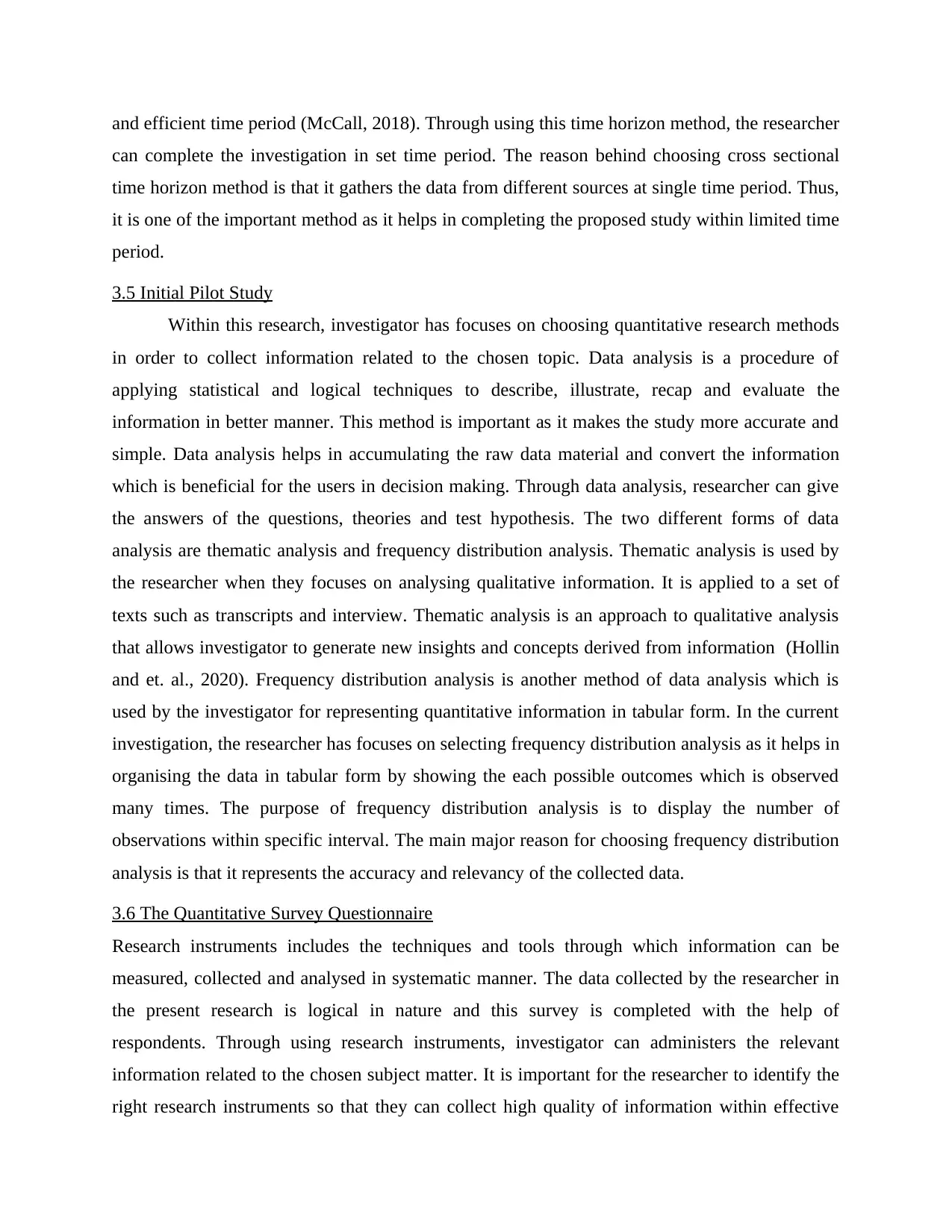
and efficient time period (McCall, 2018). Through using this time horizon method, the researcher
can complete the investigation in set time period. The reason behind choosing cross sectional
time horizon method is that it gathers the data from different sources at single time period. Thus,
it is one of the important method as it helps in completing the proposed study within limited time
period.
3.5 Initial Pilot Study
Within this research, investigator has focuses on choosing quantitative research methods
in order to collect information related to the chosen topic. Data analysis is a procedure of
applying statistical and logical techniques to describe, illustrate, recap and evaluate the
information in better manner. This method is important as it makes the study more accurate and
simple. Data analysis helps in accumulating the raw data material and convert the information
which is beneficial for the users in decision making. Through data analysis, researcher can give
the answers of the questions, theories and test hypothesis. The two different forms of data
analysis are thematic analysis and frequency distribution analysis. Thematic analysis is used by
the researcher when they focuses on analysing qualitative information. It is applied to a set of
texts such as transcripts and interview. Thematic analysis is an approach to qualitative analysis
that allows investigator to generate new insights and concepts derived from information (Hollin
and et. al., 2020). Frequency distribution analysis is another method of data analysis which is
used by the investigator for representing quantitative information in tabular form. In the current
investigation, the researcher has focuses on selecting frequency distribution analysis as it helps in
organising the data in tabular form by showing the each possible outcomes which is observed
many times. The purpose of frequency distribution analysis is to display the number of
observations within specific interval. The main major reason for choosing frequency distribution
analysis is that it represents the accuracy and relevancy of the collected data.
3.6 The Quantitative Survey Questionnaire
Research instruments includes the techniques and tools through which information can be
measured, collected and analysed in systematic manner. The data collected by the researcher in
the present research is logical in nature and this survey is completed with the help of
respondents. Through using research instruments, investigator can administers the relevant
information related to the chosen subject matter. It is important for the researcher to identify the
right research instruments so that they can collect high quality of information within effective
can complete the investigation in set time period. The reason behind choosing cross sectional
time horizon method is that it gathers the data from different sources at single time period. Thus,
it is one of the important method as it helps in completing the proposed study within limited time
period.
3.5 Initial Pilot Study
Within this research, investigator has focuses on choosing quantitative research methods
in order to collect information related to the chosen topic. Data analysis is a procedure of
applying statistical and logical techniques to describe, illustrate, recap and evaluate the
information in better manner. This method is important as it makes the study more accurate and
simple. Data analysis helps in accumulating the raw data material and convert the information
which is beneficial for the users in decision making. Through data analysis, researcher can give
the answers of the questions, theories and test hypothesis. The two different forms of data
analysis are thematic analysis and frequency distribution analysis. Thematic analysis is used by
the researcher when they focuses on analysing qualitative information. It is applied to a set of
texts such as transcripts and interview. Thematic analysis is an approach to qualitative analysis
that allows investigator to generate new insights and concepts derived from information (Hollin
and et. al., 2020). Frequency distribution analysis is another method of data analysis which is
used by the investigator for representing quantitative information in tabular form. In the current
investigation, the researcher has focuses on selecting frequency distribution analysis as it helps in
organising the data in tabular form by showing the each possible outcomes which is observed
many times. The purpose of frequency distribution analysis is to display the number of
observations within specific interval. The main major reason for choosing frequency distribution
analysis is that it represents the accuracy and relevancy of the collected data.
3.6 The Quantitative Survey Questionnaire
Research instruments includes the techniques and tools through which information can be
measured, collected and analysed in systematic manner. The data collected by the researcher in
the present research is logical in nature and this survey is completed with the help of
respondents. Through using research instruments, investigator can administers the relevant
information related to the chosen subject matter. It is important for the researcher to identify the
right research instruments so that they can collect high quality of information within effective
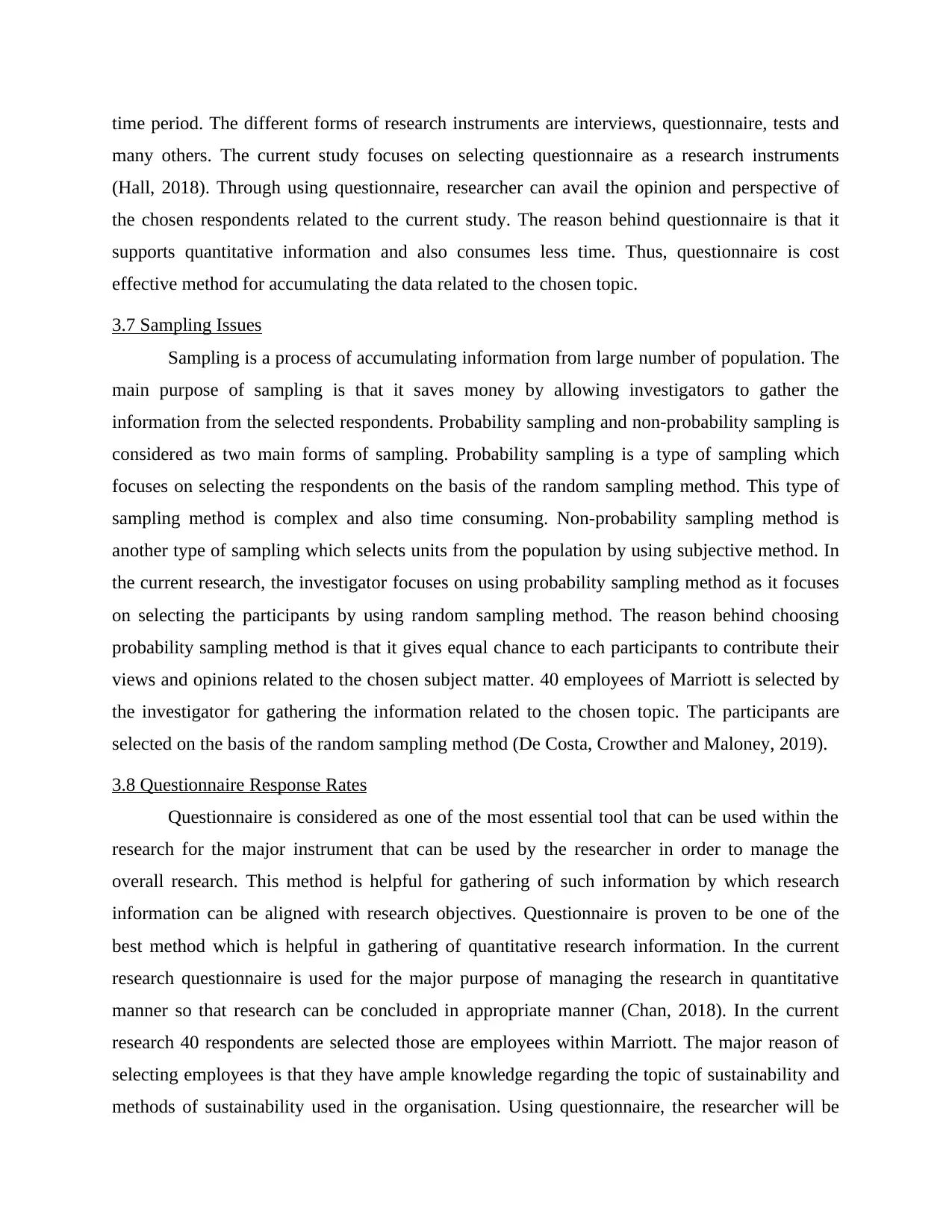
time period. The different forms of research instruments are interviews, questionnaire, tests and
many others. The current study focuses on selecting questionnaire as a research instruments
(Hall, 2018). Through using questionnaire, researcher can avail the opinion and perspective of
the chosen respondents related to the current study. The reason behind questionnaire is that it
supports quantitative information and also consumes less time. Thus, questionnaire is cost
effective method for accumulating the data related to the chosen topic.
3.7 Sampling Issues
Sampling is a process of accumulating information from large number of population. The
main purpose of sampling is that it saves money by allowing investigators to gather the
information from the selected respondents. Probability sampling and non-probability sampling is
considered as two main forms of sampling. Probability sampling is a type of sampling which
focuses on selecting the respondents on the basis of the random sampling method. This type of
sampling method is complex and also time consuming. Non-probability sampling method is
another type of sampling which selects units from the population by using subjective method. In
the current research, the investigator focuses on using probability sampling method as it focuses
on selecting the participants by using random sampling method. The reason behind choosing
probability sampling method is that it gives equal chance to each participants to contribute their
views and opinions related to the chosen subject matter. 40 employees of Marriott is selected by
the investigator for gathering the information related to the chosen topic. The participants are
selected on the basis of the random sampling method (De Costa, Crowther and Maloney, 2019).
3.8 Questionnaire Response Rates
Questionnaire is considered as one of the most essential tool that can be used within the
research for the major instrument that can be used by the researcher in order to manage the
overall research. This method is helpful for gathering of such information by which research
information can be aligned with research objectives. Questionnaire is proven to be one of the
best method which is helpful in gathering of quantitative research information. In the current
research questionnaire is used for the major purpose of managing the research in quantitative
manner so that research can be concluded in appropriate manner (Chan, 2018). In the current
research 40 respondents are selected those are employees within Marriott. The major reason of
selecting employees is that they have ample knowledge regarding the topic of sustainability and
methods of sustainability used in the organisation. Using questionnaire, the researcher will be
many others. The current study focuses on selecting questionnaire as a research instruments
(Hall, 2018). Through using questionnaire, researcher can avail the opinion and perspective of
the chosen respondents related to the current study. The reason behind questionnaire is that it
supports quantitative information and also consumes less time. Thus, questionnaire is cost
effective method for accumulating the data related to the chosen topic.
3.7 Sampling Issues
Sampling is a process of accumulating information from large number of population. The
main purpose of sampling is that it saves money by allowing investigators to gather the
information from the selected respondents. Probability sampling and non-probability sampling is
considered as two main forms of sampling. Probability sampling is a type of sampling which
focuses on selecting the respondents on the basis of the random sampling method. This type of
sampling method is complex and also time consuming. Non-probability sampling method is
another type of sampling which selects units from the population by using subjective method. In
the current research, the investigator focuses on using probability sampling method as it focuses
on selecting the participants by using random sampling method. The reason behind choosing
probability sampling method is that it gives equal chance to each participants to contribute their
views and opinions related to the chosen subject matter. 40 employees of Marriott is selected by
the investigator for gathering the information related to the chosen topic. The participants are
selected on the basis of the random sampling method (De Costa, Crowther and Maloney, 2019).
3.8 Questionnaire Response Rates
Questionnaire is considered as one of the most essential tool that can be used within the
research for the major instrument that can be used by the researcher in order to manage the
overall research. This method is helpful for gathering of such information by which research
information can be aligned with research objectives. Questionnaire is proven to be one of the
best method which is helpful in gathering of quantitative research information. In the current
research questionnaire is used for the major purpose of managing the research in quantitative
manner so that research can be concluded in appropriate manner (Chan, 2018). In the current
research 40 respondents are selected those are employees within Marriott. The major reason of
selecting employees is that they have ample knowledge regarding the topic of sustainability and
methods of sustainability used in the organisation. Using questionnaire, the researcher will be
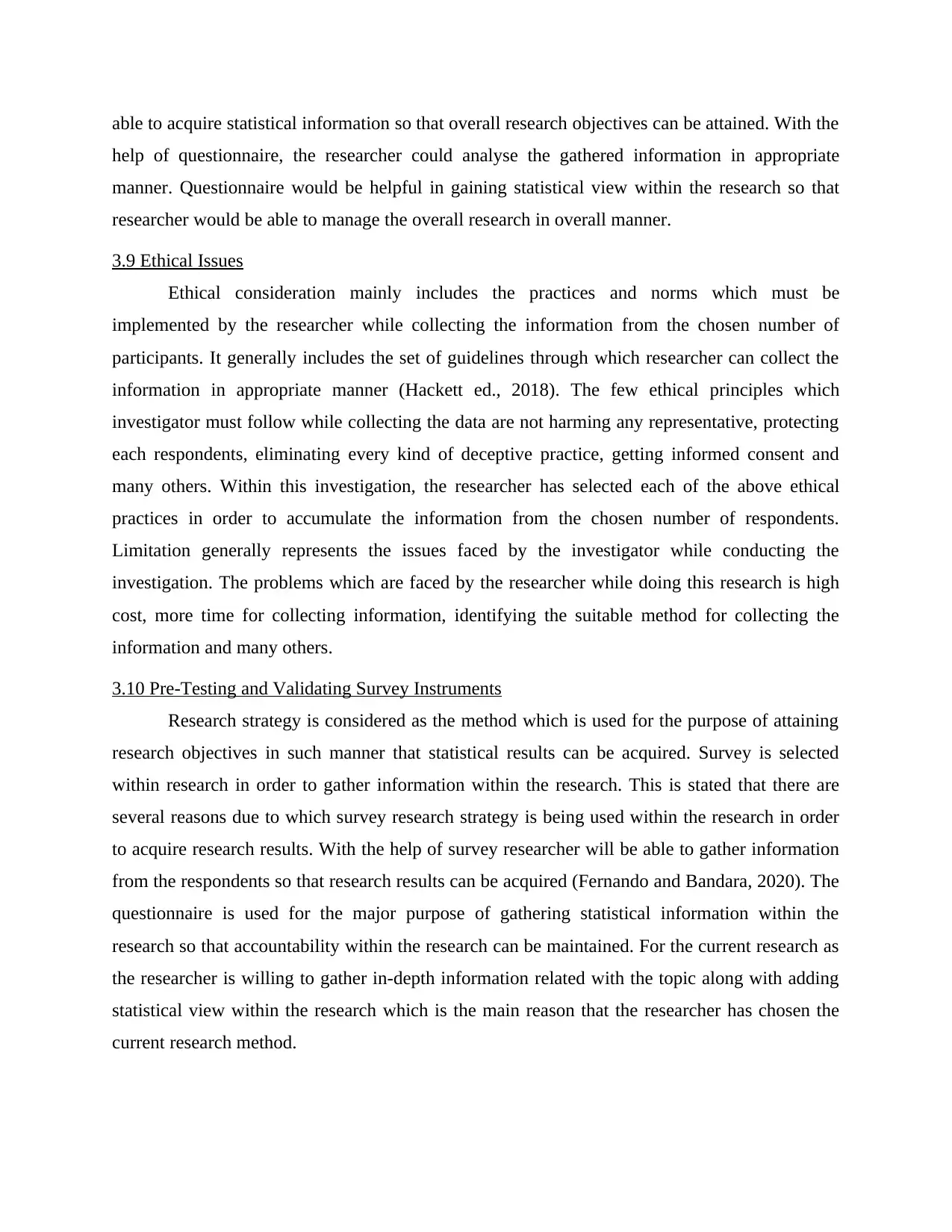
able to acquire statistical information so that overall research objectives can be attained. With the
help of questionnaire, the researcher could analyse the gathered information in appropriate
manner. Questionnaire would be helpful in gaining statistical view within the research so that
researcher would be able to manage the overall research in overall manner.
3.9 Ethical Issues
Ethical consideration mainly includes the practices and norms which must be
implemented by the researcher while collecting the information from the chosen number of
participants. It generally includes the set of guidelines through which researcher can collect the
information in appropriate manner (Hackett ed., 2018). The few ethical principles which
investigator must follow while collecting the data are not harming any representative, protecting
each respondents, eliminating every kind of deceptive practice, getting informed consent and
many others. Within this investigation, the researcher has selected each of the above ethical
practices in order to accumulate the information from the chosen number of respondents.
Limitation generally represents the issues faced by the investigator while conducting the
investigation. The problems which are faced by the researcher while doing this research is high
cost, more time for collecting information, identifying the suitable method for collecting the
information and many others.
3.10 Pre-Testing and Validating Survey Instruments
Research strategy is considered as the method which is used for the purpose of attaining
research objectives in such manner that statistical results can be acquired. Survey is selected
within research in order to gather information within the research. This is stated that there are
several reasons due to which survey research strategy is being used within the research in order
to acquire research results. With the help of survey researcher will be able to gather information
from the respondents so that research results can be acquired (Fernando and Bandara, 2020). The
questionnaire is used for the major purpose of gathering statistical information within the
research so that accountability within the research can be maintained. For the current research as
the researcher is willing to gather in-depth information related with the topic along with adding
statistical view within the research which is the main reason that the researcher has chosen the
current research method.
help of questionnaire, the researcher could analyse the gathered information in appropriate
manner. Questionnaire would be helpful in gaining statistical view within the research so that
researcher would be able to manage the overall research in overall manner.
3.9 Ethical Issues
Ethical consideration mainly includes the practices and norms which must be
implemented by the researcher while collecting the information from the chosen number of
participants. It generally includes the set of guidelines through which researcher can collect the
information in appropriate manner (Hackett ed., 2018). The few ethical principles which
investigator must follow while collecting the data are not harming any representative, protecting
each respondents, eliminating every kind of deceptive practice, getting informed consent and
many others. Within this investigation, the researcher has selected each of the above ethical
practices in order to accumulate the information from the chosen number of respondents.
Limitation generally represents the issues faced by the investigator while conducting the
investigation. The problems which are faced by the researcher while doing this research is high
cost, more time for collecting information, identifying the suitable method for collecting the
information and many others.
3.10 Pre-Testing and Validating Survey Instruments
Research strategy is considered as the method which is used for the purpose of attaining
research objectives in such manner that statistical results can be acquired. Survey is selected
within research in order to gather information within the research. This is stated that there are
several reasons due to which survey research strategy is being used within the research in order
to acquire research results. With the help of survey researcher will be able to gather information
from the respondents so that research results can be acquired (Fernando and Bandara, 2020). The
questionnaire is used for the major purpose of gathering statistical information within the
research so that accountability within the research can be maintained. For the current research as
the researcher is willing to gather in-depth information related with the topic along with adding
statistical view within the research which is the main reason that the researcher has chosen the
current research method.
Secure Best Marks with AI Grader
Need help grading? Try our AI Grader for instant feedback on your assignments.
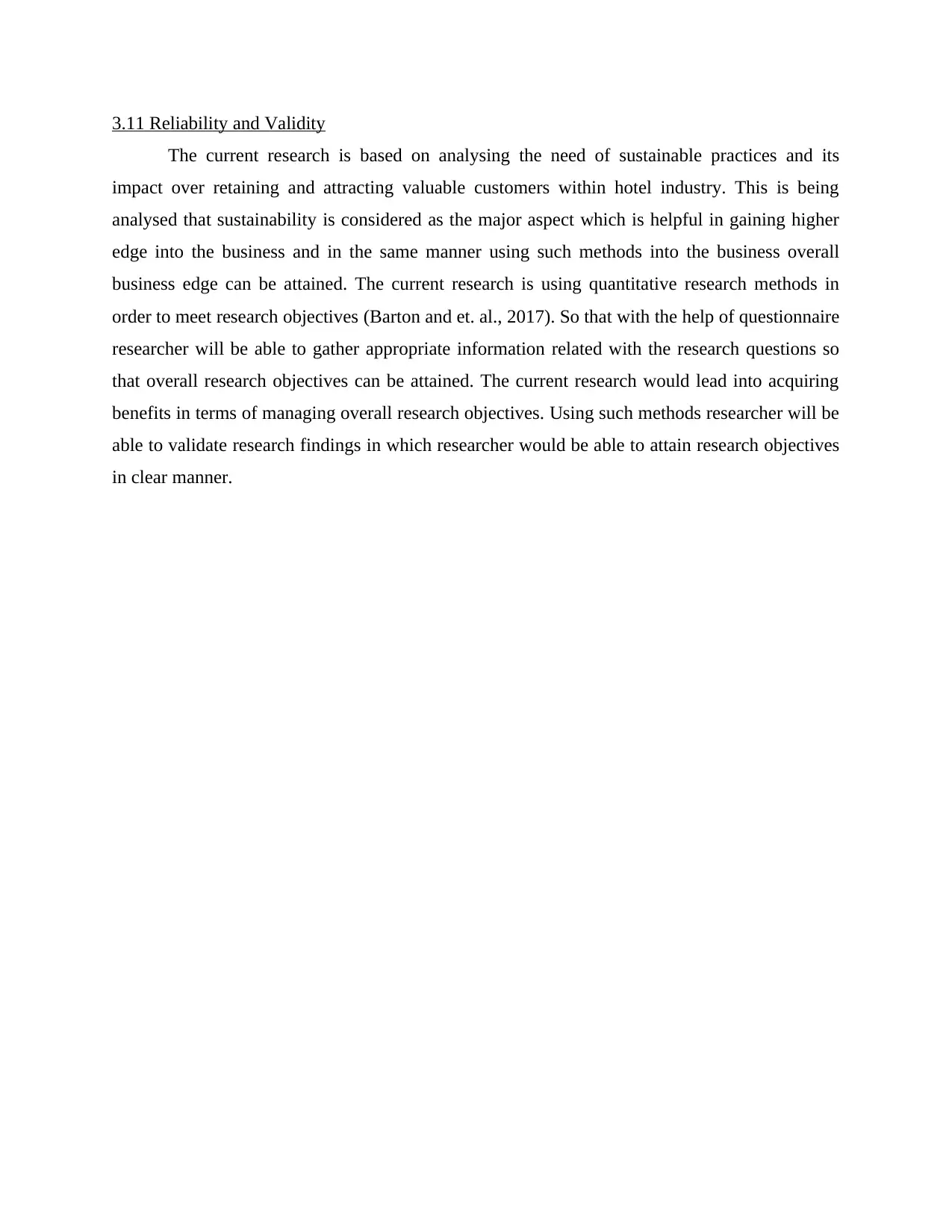
3.11 Reliability and Validity
The current research is based on analysing the need of sustainable practices and its
impact over retaining and attracting valuable customers within hotel industry. This is being
analysed that sustainability is considered as the major aspect which is helpful in gaining higher
edge into the business and in the same manner using such methods into the business overall
business edge can be attained. The current research is using quantitative research methods in
order to meet research objectives (Barton and et. al., 2017). So that with the help of questionnaire
researcher will be able to gather appropriate information related with the research questions so
that overall research objectives can be attained. The current research would lead into acquiring
benefits in terms of managing overall research objectives. Using such methods researcher will be
able to validate research findings in which researcher would be able to attain research objectives
in clear manner.
The current research is based on analysing the need of sustainable practices and its
impact over retaining and attracting valuable customers within hotel industry. This is being
analysed that sustainability is considered as the major aspect which is helpful in gaining higher
edge into the business and in the same manner using such methods into the business overall
business edge can be attained. The current research is using quantitative research methods in
order to meet research objectives (Barton and et. al., 2017). So that with the help of questionnaire
researcher will be able to gather appropriate information related with the research questions so
that overall research objectives can be attained. The current research would lead into acquiring
benefits in terms of managing overall research objectives. Using such methods researcher will be
able to validate research findings in which researcher would be able to attain research objectives
in clear manner.
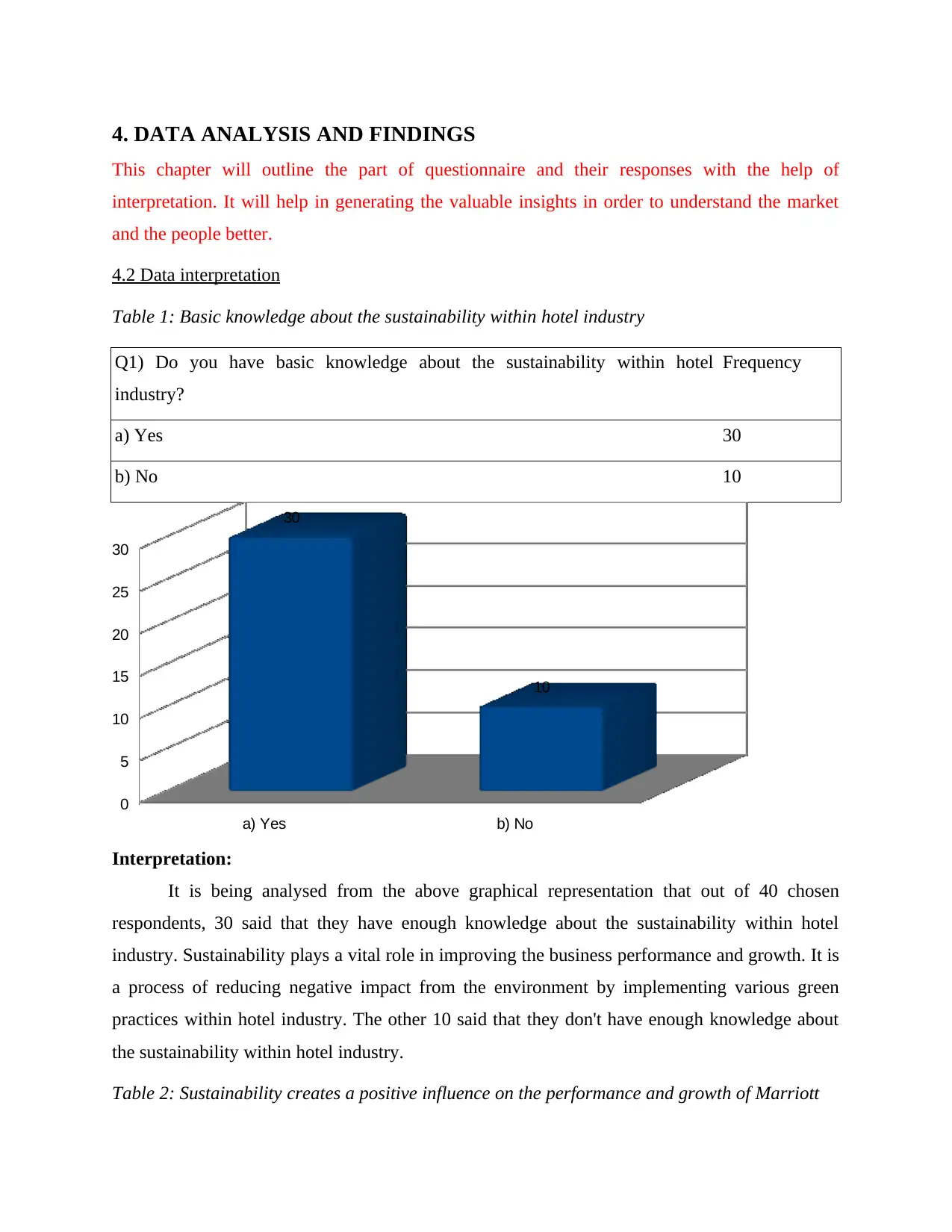
4. DATA ANALYSIS AND FINDINGS
This chapter will outline the part of questionnaire and their responses with the help of
interpretation. It will help in generating the valuable insights in order to understand the market
and the people better.
4.2 Data interpretation
Table 1: Basic knowledge about the sustainability within hotel industry
Q1) Do you have basic knowledge about the sustainability within hotel
industry?
Frequency
a) Yes 30
b) No 10
a) Yes b) No
0
5
10
15
20
25
30
30
10
Interpretation:
It is being analysed from the above graphical representation that out of 40 chosen
respondents, 30 said that they have enough knowledge about the sustainability within hotel
industry. Sustainability plays a vital role in improving the business performance and growth. It is
a process of reducing negative impact from the environment by implementing various green
practices within hotel industry. The other 10 said that they don't have enough knowledge about
the sustainability within hotel industry.
Table 2: Sustainability creates a positive influence on the performance and growth of Marriott
This chapter will outline the part of questionnaire and their responses with the help of
interpretation. It will help in generating the valuable insights in order to understand the market
and the people better.
4.2 Data interpretation
Table 1: Basic knowledge about the sustainability within hotel industry
Q1) Do you have basic knowledge about the sustainability within hotel
industry?
Frequency
a) Yes 30
b) No 10
a) Yes b) No
0
5
10
15
20
25
30
30
10
Interpretation:
It is being analysed from the above graphical representation that out of 40 chosen
respondents, 30 said that they have enough knowledge about the sustainability within hotel
industry. Sustainability plays a vital role in improving the business performance and growth. It is
a process of reducing negative impact from the environment by implementing various green
practices within hotel industry. The other 10 said that they don't have enough knowledge about
the sustainability within hotel industry.
Table 2: Sustainability creates a positive influence on the performance and growth of Marriott
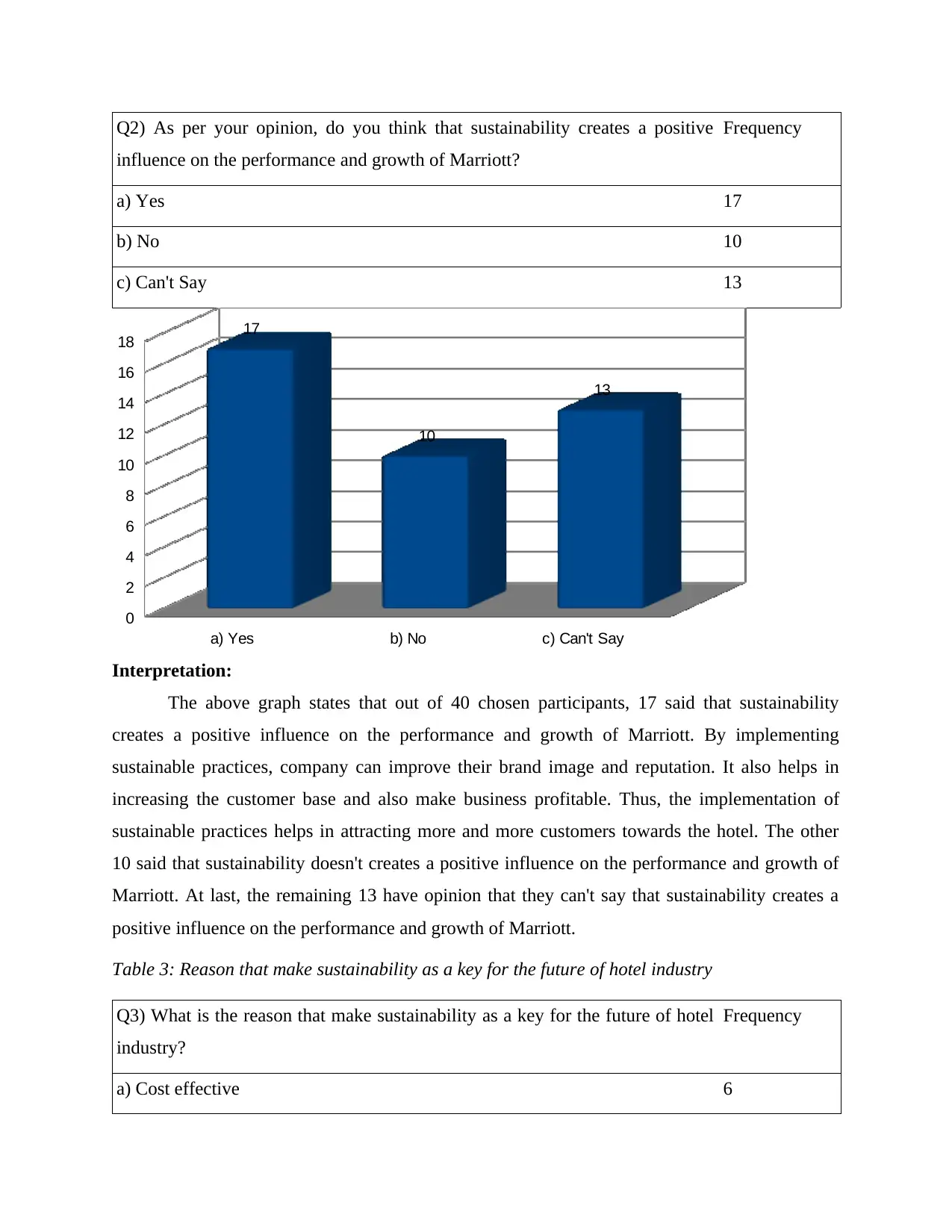
Q2) As per your opinion, do you think that sustainability creates a positive
influence on the performance and growth of Marriott?
Frequency
a) Yes 17
b) No 10
c) Can't Say 13
a) Yes b) No c) Can't Say
0
2
4
6
8
10
12
14
16
18 17
10
13
Interpretation:
The above graph states that out of 40 chosen participants, 17 said that sustainability
creates a positive influence on the performance and growth of Marriott. By implementing
sustainable practices, company can improve their brand image and reputation. It also helps in
increasing the customer base and also make business profitable. Thus, the implementation of
sustainable practices helps in attracting more and more customers towards the hotel. The other
10 said that sustainability doesn't creates a positive influence on the performance and growth of
Marriott. At last, the remaining 13 have opinion that they can't say that sustainability creates a
positive influence on the performance and growth of Marriott.
Table 3: Reason that make sustainability as a key for the future of hotel industry
Q3) What is the reason that make sustainability as a key for the future of hotel
industry?
Frequency
a) Cost effective 6
influence on the performance and growth of Marriott?
Frequency
a) Yes 17
b) No 10
c) Can't Say 13
a) Yes b) No c) Can't Say
0
2
4
6
8
10
12
14
16
18 17
10
13
Interpretation:
The above graph states that out of 40 chosen participants, 17 said that sustainability
creates a positive influence on the performance and growth of Marriott. By implementing
sustainable practices, company can improve their brand image and reputation. It also helps in
increasing the customer base and also make business profitable. Thus, the implementation of
sustainable practices helps in attracting more and more customers towards the hotel. The other
10 said that sustainability doesn't creates a positive influence on the performance and growth of
Marriott. At last, the remaining 13 have opinion that they can't say that sustainability creates a
positive influence on the performance and growth of Marriott.
Table 3: Reason that make sustainability as a key for the future of hotel industry
Q3) What is the reason that make sustainability as a key for the future of hotel
industry?
Frequency
a) Cost effective 6
Paraphrase This Document
Need a fresh take? Get an instant paraphrase of this document with our AI Paraphraser
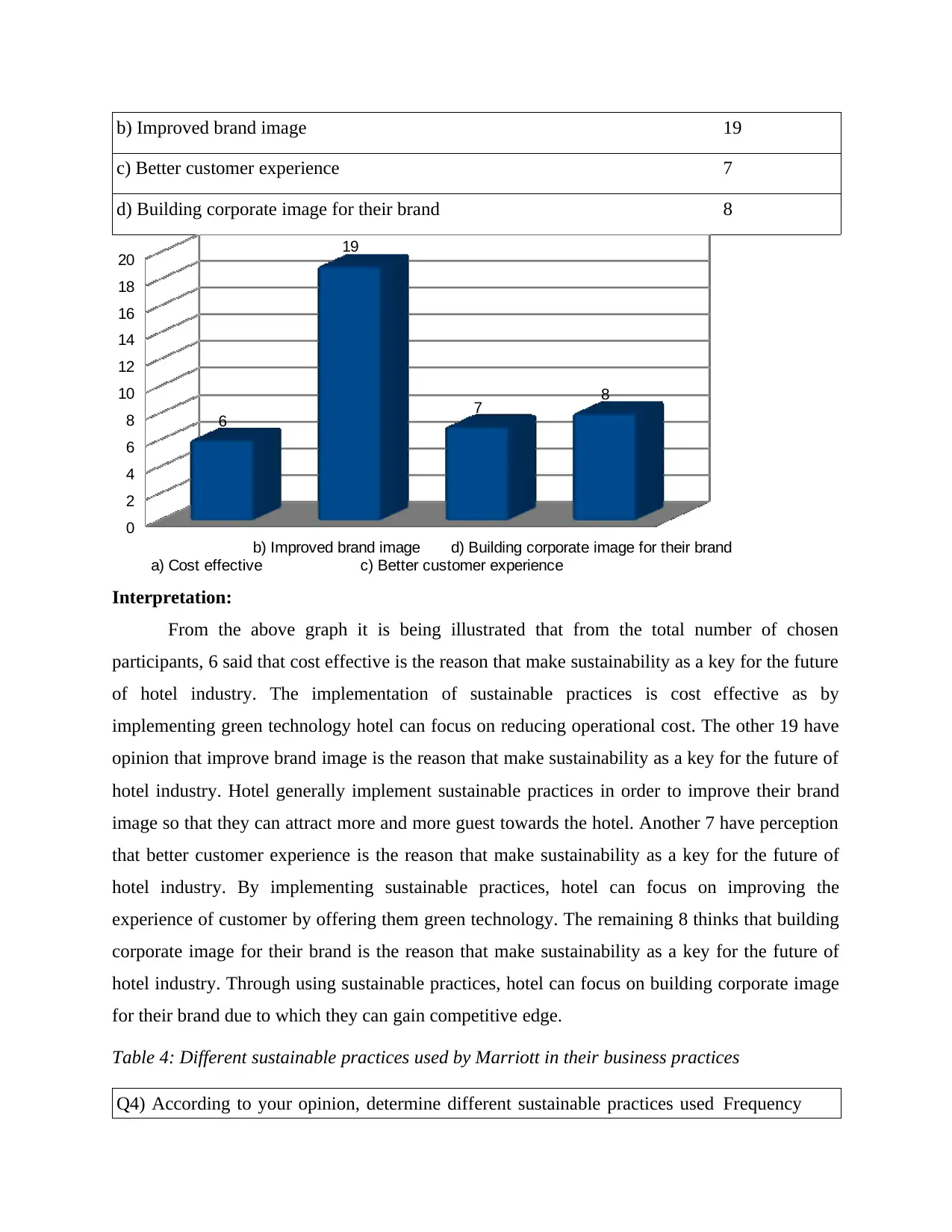
b) Improved brand image 19
c) Better customer experience 7
d) Building corporate image for their brand 8
a) Cost effective
b) Improved brand image
c) Better customer experience
d) Building corporate image for their brand
0
2
4
6
8
10
12
14
16
18
20
6
19
7 8
Interpretation:
From the above graph it is being illustrated that from the total number of chosen
participants, 6 said that cost effective is the reason that make sustainability as a key for the future
of hotel industry. The implementation of sustainable practices is cost effective as by
implementing green technology hotel can focus on reducing operational cost. The other 19 have
opinion that improve brand image is the reason that make sustainability as a key for the future of
hotel industry. Hotel generally implement sustainable practices in order to improve their brand
image so that they can attract more and more guest towards the hotel. Another 7 have perception
that better customer experience is the reason that make sustainability as a key for the future of
hotel industry. By implementing sustainable practices, hotel can focus on improving the
experience of customer by offering them green technology. The remaining 8 thinks that building
corporate image for their brand is the reason that make sustainability as a key for the future of
hotel industry. Through using sustainable practices, hotel can focus on building corporate image
for their brand due to which they can gain competitive edge.
Table 4: Different sustainable practices used by Marriott in their business practices
Q4) According to your opinion, determine different sustainable practices used Frequency
c) Better customer experience 7
d) Building corporate image for their brand 8
a) Cost effective
b) Improved brand image
c) Better customer experience
d) Building corporate image for their brand
0
2
4
6
8
10
12
14
16
18
20
6
19
7 8
Interpretation:
From the above graph it is being illustrated that from the total number of chosen
participants, 6 said that cost effective is the reason that make sustainability as a key for the future
of hotel industry. The implementation of sustainable practices is cost effective as by
implementing green technology hotel can focus on reducing operational cost. The other 19 have
opinion that improve brand image is the reason that make sustainability as a key for the future of
hotel industry. Hotel generally implement sustainable practices in order to improve their brand
image so that they can attract more and more guest towards the hotel. Another 7 have perception
that better customer experience is the reason that make sustainability as a key for the future of
hotel industry. By implementing sustainable practices, hotel can focus on improving the
experience of customer by offering them green technology. The remaining 8 thinks that building
corporate image for their brand is the reason that make sustainability as a key for the future of
hotel industry. Through using sustainable practices, hotel can focus on building corporate image
for their brand due to which they can gain competitive edge.
Table 4: Different sustainable practices used by Marriott in their business practices
Q4) According to your opinion, determine different sustainable practices used Frequency
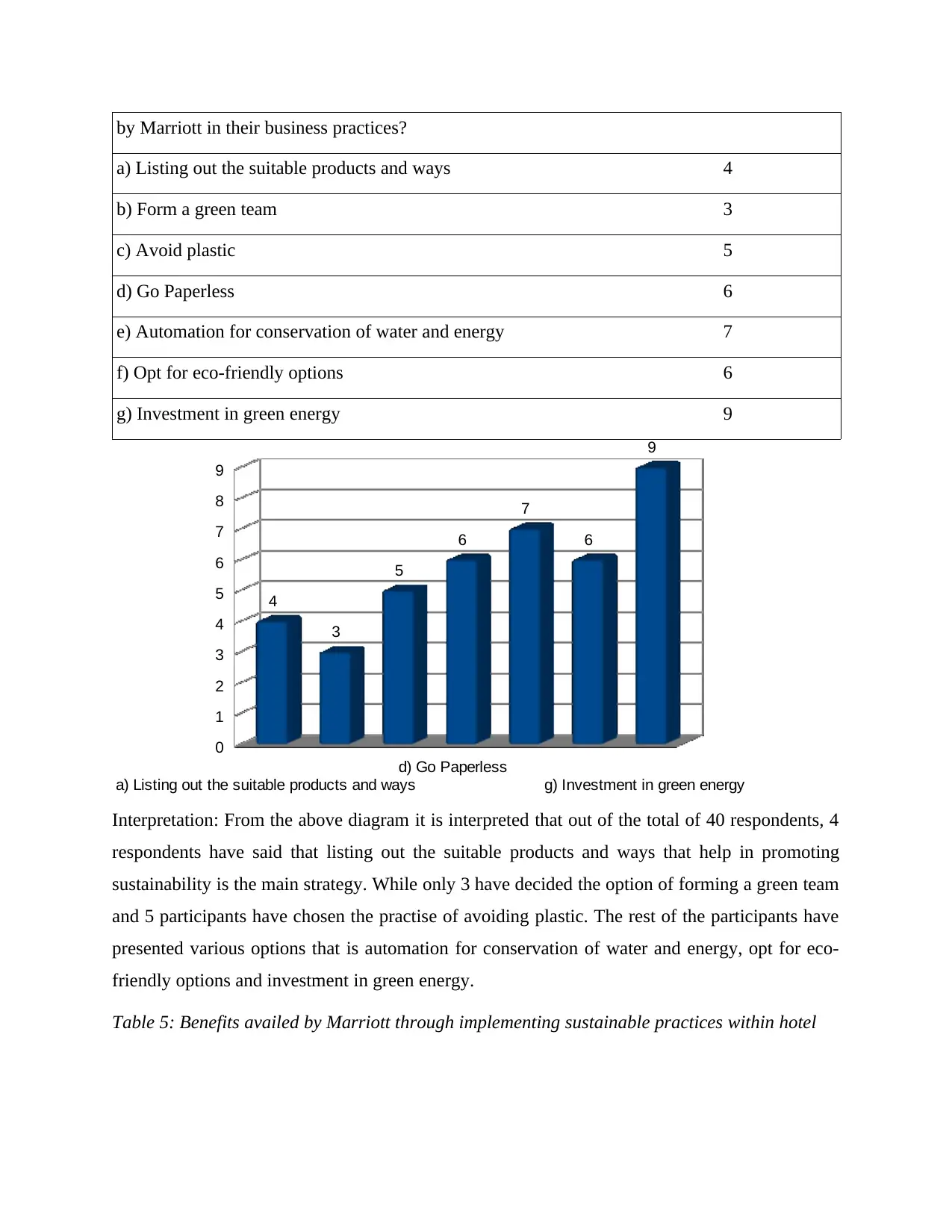
by Marriott in their business practices?
a) Listing out the suitable products and ways 4
b) Form a green team 3
c) Avoid plastic 5
d) Go Paperless 6
e) Automation for conservation of water and energy 7
f) Opt for eco-friendly options 6
g) Investment in green energy 9
a) Listing out the suitable products and ways
d) Go Paperless
g) Investment in green energy
0
1
2
3
4
5
6
7
8
9
4
3
5
6
7
6
9
Interpretation: From the above diagram it is interpreted that out of the total of 40 respondents, 4
respondents have said that listing out the suitable products and ways that help in promoting
sustainability is the main strategy. While only 3 have decided the option of forming a green team
and 5 participants have chosen the practise of avoiding plastic. The rest of the participants have
presented various options that is automation for conservation of water and energy, opt for eco-
friendly options and investment in green energy.
Table 5: Benefits availed by Marriott through implementing sustainable practices within hotel
a) Listing out the suitable products and ways 4
b) Form a green team 3
c) Avoid plastic 5
d) Go Paperless 6
e) Automation for conservation of water and energy 7
f) Opt for eco-friendly options 6
g) Investment in green energy 9
a) Listing out the suitable products and ways
d) Go Paperless
g) Investment in green energy
0
1
2
3
4
5
6
7
8
9
4
3
5
6
7
6
9
Interpretation: From the above diagram it is interpreted that out of the total of 40 respondents, 4
respondents have said that listing out the suitable products and ways that help in promoting
sustainability is the main strategy. While only 3 have decided the option of forming a green team
and 5 participants have chosen the practise of avoiding plastic. The rest of the participants have
presented various options that is automation for conservation of water and energy, opt for eco-
friendly options and investment in green energy.
Table 5: Benefits availed by Marriott through implementing sustainable practices within hotel
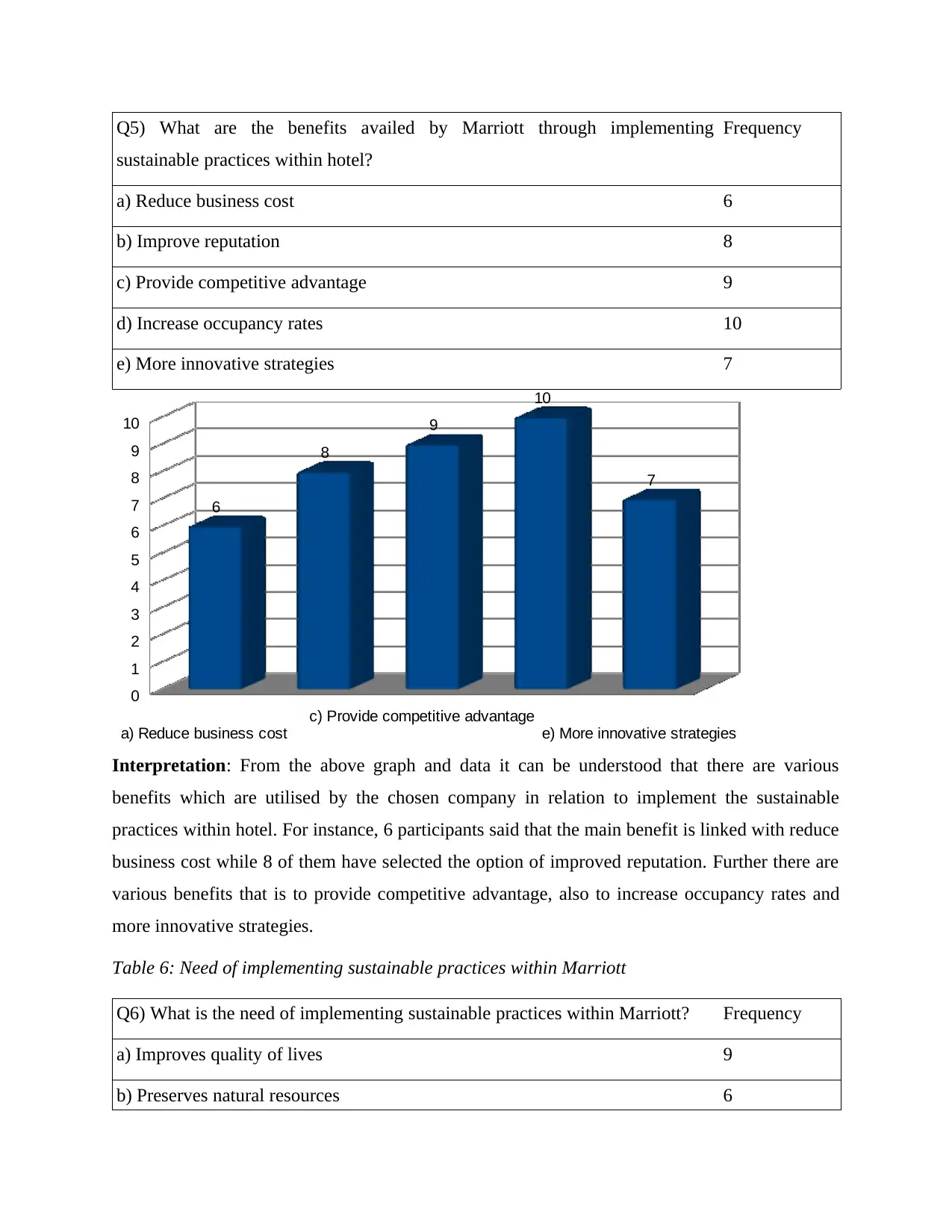
Q5) What are the benefits availed by Marriott through implementing
sustainable practices within hotel?
Frequency
a) Reduce business cost 6
b) Improve reputation 8
c) Provide competitive advantage 9
d) Increase occupancy rates 10
e) More innovative strategies 7
a) Reduce business cost
c) Provide competitive advantage
e) More innovative strategies
0
1
2
3
4
5
6
7
8
9
10
6
8
9
10
7
Interpretation: From the above graph and data it can be understood that there are various
benefits which are utilised by the chosen company in relation to implement the sustainable
practices within hotel. For instance, 6 participants said that the main benefit is linked with reduce
business cost while 8 of them have selected the option of improved reputation. Further there are
various benefits that is to provide competitive advantage, also to increase occupancy rates and
more innovative strategies.
Table 6: Need of implementing sustainable practices within Marriott
Q6) What is the need of implementing sustainable practices within Marriott? Frequency
a) Improves quality of lives 9
b) Preserves natural resources 6
sustainable practices within hotel?
Frequency
a) Reduce business cost 6
b) Improve reputation 8
c) Provide competitive advantage 9
d) Increase occupancy rates 10
e) More innovative strategies 7
a) Reduce business cost
c) Provide competitive advantage
e) More innovative strategies
0
1
2
3
4
5
6
7
8
9
10
6
8
9
10
7
Interpretation: From the above graph and data it can be understood that there are various
benefits which are utilised by the chosen company in relation to implement the sustainable
practices within hotel. For instance, 6 participants said that the main benefit is linked with reduce
business cost while 8 of them have selected the option of improved reputation. Further there are
various benefits that is to provide competitive advantage, also to increase occupancy rates and
more innovative strategies.
Table 6: Need of implementing sustainable practices within Marriott
Q6) What is the need of implementing sustainable practices within Marriott? Frequency
a) Improves quality of lives 9
b) Preserves natural resources 6
Secure Best Marks with AI Grader
Need help grading? Try our AI Grader for instant feedback on your assignments.
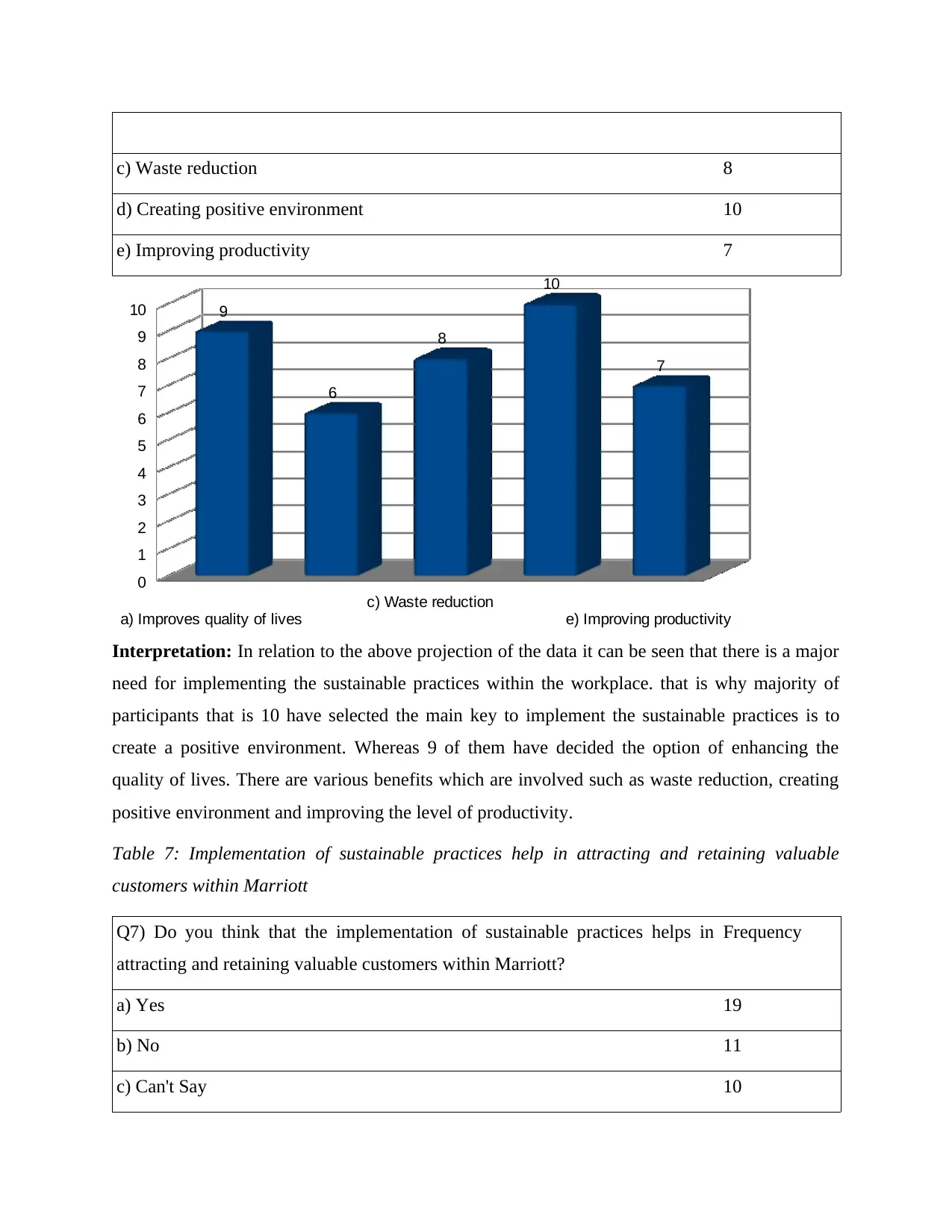
c) Waste reduction 8
d) Creating positive environment 10
e) Improving productivity 7
a) Improves quality of lives
c) Waste reduction
e) Improving productivity
0
1
2
3
4
5
6
7
8
9
10 9
6
8
10
7
Interpretation: In relation to the above projection of the data it can be seen that there is a major
need for implementing the sustainable practices within the workplace. that is why majority of
participants that is 10 have selected the main key to implement the sustainable practices is to
create a positive environment. Whereas 9 of them have decided the option of enhancing the
quality of lives. There are various benefits which are involved such as waste reduction, creating
positive environment and improving the level of productivity.
Table 7: Implementation of sustainable practices help in attracting and retaining valuable
customers within Marriott
Q7) Do you think that the implementation of sustainable practices helps in
attracting and retaining valuable customers within Marriott?
Frequency
a) Yes 19
b) No 11
c) Can't Say 10
d) Creating positive environment 10
e) Improving productivity 7
a) Improves quality of lives
c) Waste reduction
e) Improving productivity
0
1
2
3
4
5
6
7
8
9
10 9
6
8
10
7
Interpretation: In relation to the above projection of the data it can be seen that there is a major
need for implementing the sustainable practices within the workplace. that is why majority of
participants that is 10 have selected the main key to implement the sustainable practices is to
create a positive environment. Whereas 9 of them have decided the option of enhancing the
quality of lives. There are various benefits which are involved such as waste reduction, creating
positive environment and improving the level of productivity.
Table 7: Implementation of sustainable practices help in attracting and retaining valuable
customers within Marriott
Q7) Do you think that the implementation of sustainable practices helps in
attracting and retaining valuable customers within Marriott?
Frequency
a) Yes 19
b) No 11
c) Can't Say 10
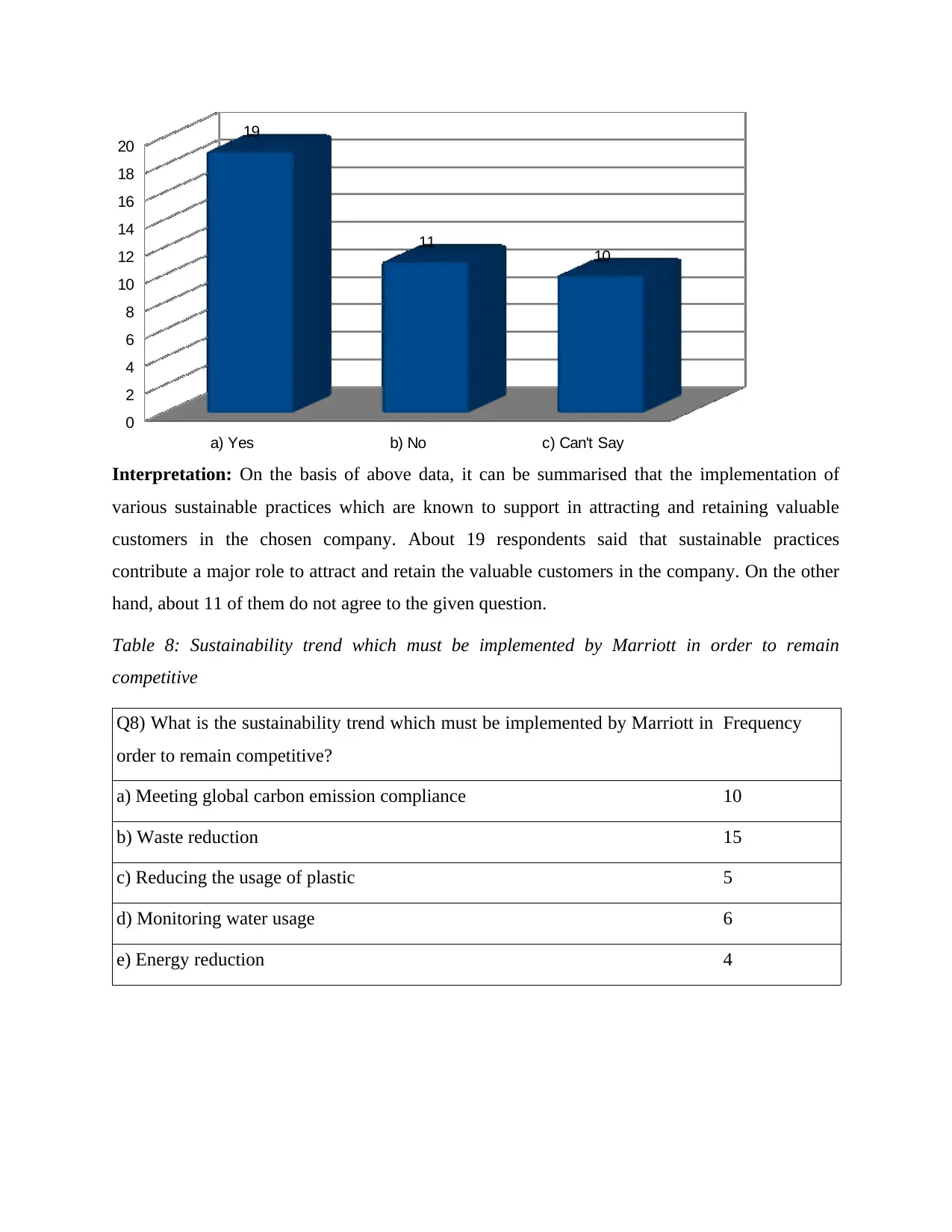
a) Yes b) No c) Can't Say
0
2
4
6
8
10
12
14
16
18
20 19
11 10
Interpretation: On the basis of above data, it can be summarised that the implementation of
various sustainable practices which are known to support in attracting and retaining valuable
customers in the chosen company. About 19 respondents said that sustainable practices
contribute a major role to attract and retain the valuable customers in the company. On the other
hand, about 11 of them do not agree to the given question.
Table 8: Sustainability trend which must be implemented by Marriott in order to remain
competitive
Q8) What is the sustainability trend which must be implemented by Marriott in
order to remain competitive?
Frequency
a) Meeting global carbon emission compliance 10
b) Waste reduction 15
c) Reducing the usage of plastic 5
d) Monitoring water usage 6
e) Energy reduction 4
0
2
4
6
8
10
12
14
16
18
20 19
11 10
Interpretation: On the basis of above data, it can be summarised that the implementation of
various sustainable practices which are known to support in attracting and retaining valuable
customers in the chosen company. About 19 respondents said that sustainable practices
contribute a major role to attract and retain the valuable customers in the company. On the other
hand, about 11 of them do not agree to the given question.
Table 8: Sustainability trend which must be implemented by Marriott in order to remain
competitive
Q8) What is the sustainability trend which must be implemented by Marriott in
order to remain competitive?
Frequency
a) Meeting global carbon emission compliance 10
b) Waste reduction 15
c) Reducing the usage of plastic 5
d) Monitoring water usage 6
e) Energy reduction 4
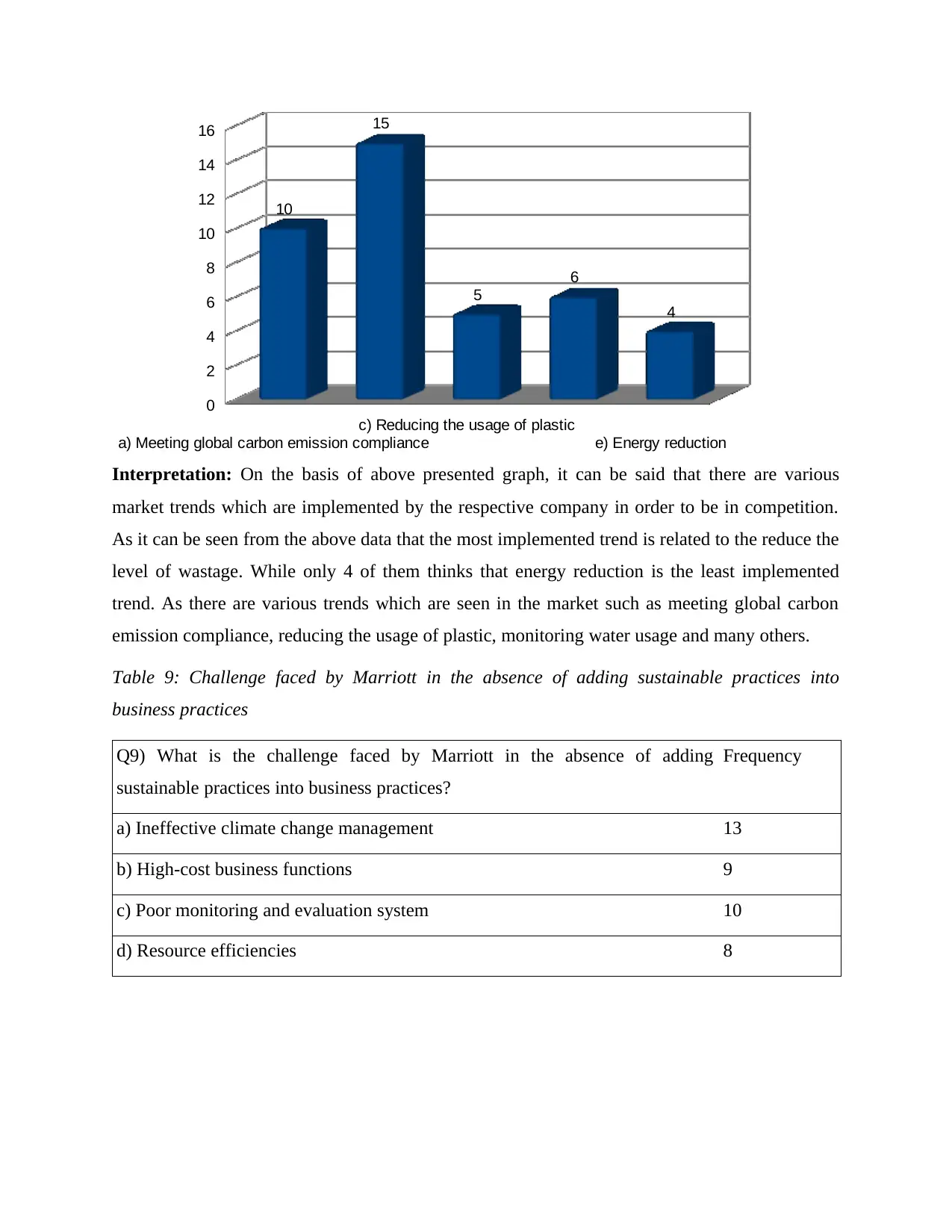
a) Meeting global carbon emission compliance
c) Reducing the usage of plastic
e) Energy reduction
0
2
4
6
8
10
12
14
16
10
15
5
6
4
Interpretation: On the basis of above presented graph, it can be said that there are various
market trends which are implemented by the respective company in order to be in competition.
As it can be seen from the above data that the most implemented trend is related to the reduce the
level of wastage. While only 4 of them thinks that energy reduction is the least implemented
trend. As there are various trends which are seen in the market such as meeting global carbon
emission compliance, reducing the usage of plastic, monitoring water usage and many others.
Table 9: Challenge faced by Marriott in the absence of adding sustainable practices into
business practices
Q9) What is the challenge faced by Marriott in the absence of adding
sustainable practices into business practices?
Frequency
a) Ineffective climate change management 13
b) High-cost business functions 9
c) Poor monitoring and evaluation system 10
d) Resource efficiencies 8
c) Reducing the usage of plastic
e) Energy reduction
0
2
4
6
8
10
12
14
16
10
15
5
6
4
Interpretation: On the basis of above presented graph, it can be said that there are various
market trends which are implemented by the respective company in order to be in competition.
As it can be seen from the above data that the most implemented trend is related to the reduce the
level of wastage. While only 4 of them thinks that energy reduction is the least implemented
trend. As there are various trends which are seen in the market such as meeting global carbon
emission compliance, reducing the usage of plastic, monitoring water usage and many others.
Table 9: Challenge faced by Marriott in the absence of adding sustainable practices into
business practices
Q9) What is the challenge faced by Marriott in the absence of adding
sustainable practices into business practices?
Frequency
a) Ineffective climate change management 13
b) High-cost business functions 9
c) Poor monitoring and evaluation system 10
d) Resource efficiencies 8
Paraphrase This Document
Need a fresh take? Get an instant paraphrase of this document with our AI Paraphraser
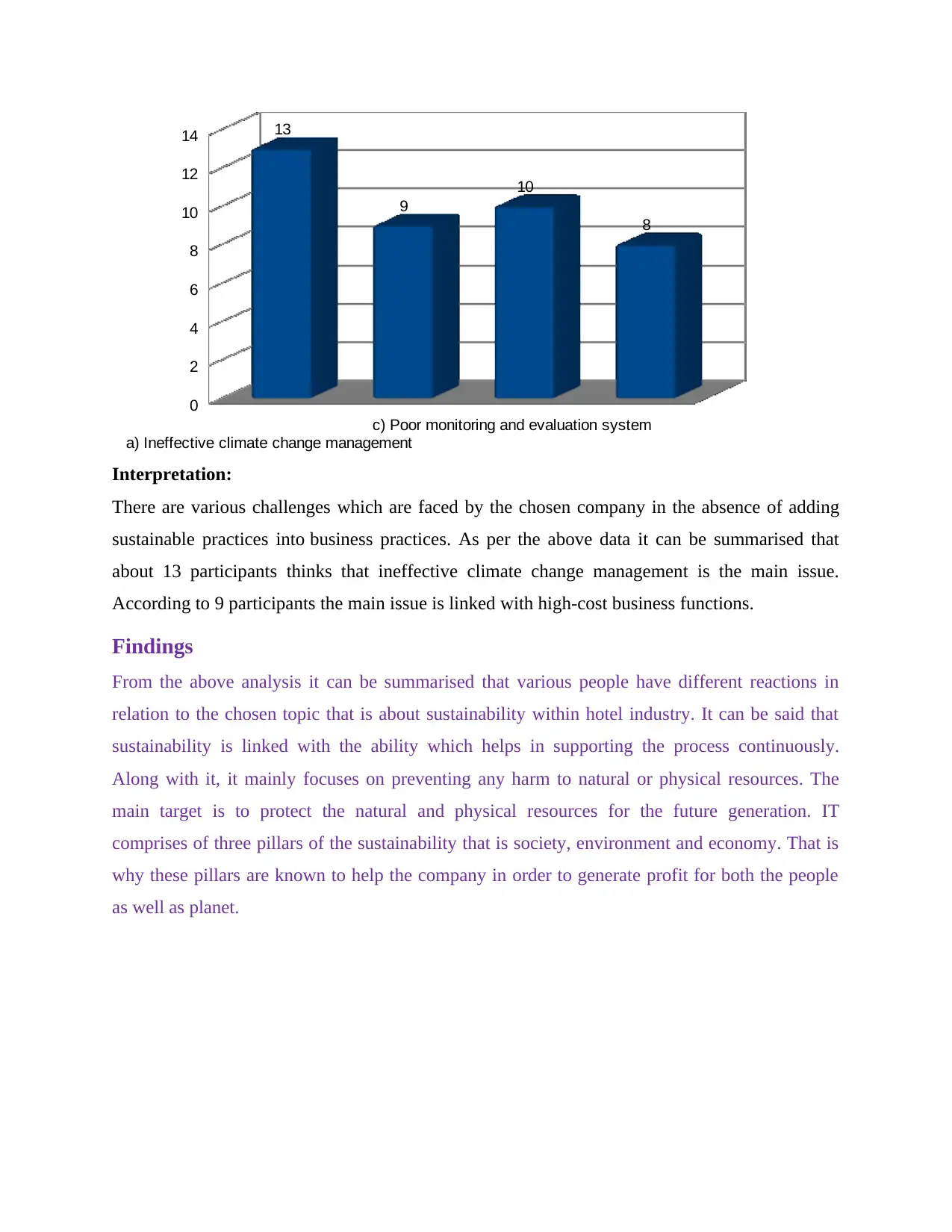
a) Ineffective climate change management
c) Poor monitoring and evaluation system
0
2
4
6
8
10
12
14 13
9
10
8
Interpretation:
There are various challenges which are faced by the chosen company in the absence of adding
sustainable practices into business practices. As per the above data it can be summarised that
about 13 participants thinks that ineffective climate change management is the main issue.
According to 9 participants the main issue is linked with high-cost business functions.
Findings
From the above analysis it can be summarised that various people have different reactions in
relation to the chosen topic that is about sustainability within hotel industry. It can be said that
sustainability is linked with the ability which helps in supporting the process continuously.
Along with it, it mainly focuses on preventing any harm to natural or physical resources. The
main target is to protect the natural and physical resources for the future generation. IT
comprises of three pillars of the sustainability that is society, environment and economy. That is
why these pillars are known to help the company in order to generate profit for both the people
as well as planet.
c) Poor monitoring and evaluation system
0
2
4
6
8
10
12
14 13
9
10
8
Interpretation:
There are various challenges which are faced by the chosen company in the absence of adding
sustainable practices into business practices. As per the above data it can be summarised that
about 13 participants thinks that ineffective climate change management is the main issue.
According to 9 participants the main issue is linked with high-cost business functions.
Findings
From the above analysis it can be summarised that various people have different reactions in
relation to the chosen topic that is about sustainability within hotel industry. It can be said that
sustainability is linked with the ability which helps in supporting the process continuously.
Along with it, it mainly focuses on preventing any harm to natural or physical resources. The
main target is to protect the natural and physical resources for the future generation. IT
comprises of three pillars of the sustainability that is society, environment and economy. That is
why these pillars are known to help the company in order to generate profit for both the people
as well as planet.
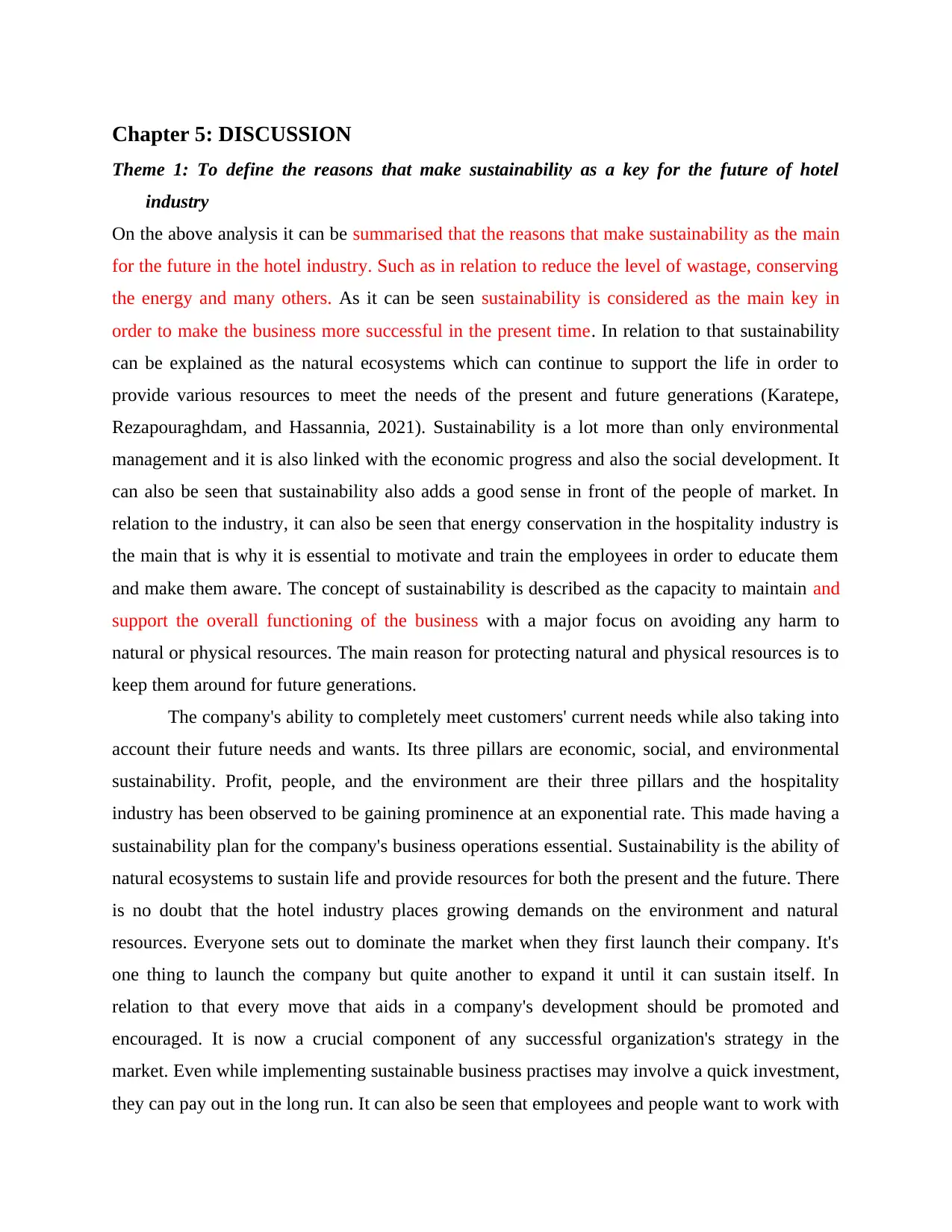
Chapter 5: DISCUSSION
Theme 1: To define the reasons that make sustainability as a key for the future of hotel
industry
On the above analysis it can be summarised that the reasons that make sustainability as the main
for the future in the hotel industry. Such as in relation to reduce the level of wastage, conserving
the energy and many others. As it can be seen sustainability is considered as the main key in
order to make the business more successful in the present time. In relation to that sustainability
can be explained as the natural ecosystems which can continue to support the life in order to
provide various resources to meet the needs of the present and future generations (Karatepe,
Rezapouraghdam, and Hassannia, 2021). Sustainability is a lot more than only environmental
management and it is also linked with the economic progress and also the social development. It
can also be seen that sustainability also adds a good sense in front of the people of market. In
relation to the industry, it can also be seen that energy conservation in the hospitality industry is
the main that is why it is essential to motivate and train the employees in order to educate them
and make them aware. The concept of sustainability is described as the capacity to maintain and
support the overall functioning of the business with a major focus on avoiding any harm to
natural or physical resources. The main reason for protecting natural and physical resources is to
keep them around for future generations.
The company's ability to completely meet customers' current needs while also taking into
account their future needs and wants. Its three pillars are economic, social, and environmental
sustainability. Profit, people, and the environment are their three pillars and the hospitality
industry has been observed to be gaining prominence at an exponential rate. This made having a
sustainability plan for the company's business operations essential. Sustainability is the ability of
natural ecosystems to sustain life and provide resources for both the present and the future. There
is no doubt that the hotel industry places growing demands on the environment and natural
resources. Everyone sets out to dominate the market when they first launch their company. It's
one thing to launch the company but quite another to expand it until it can sustain itself. In
relation to that every move that aids in a company's development should be promoted and
encouraged. It is now a crucial component of any successful organization's strategy in the
market. Even while implementing sustainable business practises may involve a quick investment,
they can pay out in the long run. It can also be seen that employees and people want to work with
Theme 1: To define the reasons that make sustainability as a key for the future of hotel
industry
On the above analysis it can be summarised that the reasons that make sustainability as the main
for the future in the hotel industry. Such as in relation to reduce the level of wastage, conserving
the energy and many others. As it can be seen sustainability is considered as the main key in
order to make the business more successful in the present time. In relation to that sustainability
can be explained as the natural ecosystems which can continue to support the life in order to
provide various resources to meet the needs of the present and future generations (Karatepe,
Rezapouraghdam, and Hassannia, 2021). Sustainability is a lot more than only environmental
management and it is also linked with the economic progress and also the social development. It
can also be seen that sustainability also adds a good sense in front of the people of market. In
relation to the industry, it can also be seen that energy conservation in the hospitality industry is
the main that is why it is essential to motivate and train the employees in order to educate them
and make them aware. The concept of sustainability is described as the capacity to maintain and
support the overall functioning of the business with a major focus on avoiding any harm to
natural or physical resources. The main reason for protecting natural and physical resources is to
keep them around for future generations.
The company's ability to completely meet customers' current needs while also taking into
account their future needs and wants. Its three pillars are economic, social, and environmental
sustainability. Profit, people, and the environment are their three pillars and the hospitality
industry has been observed to be gaining prominence at an exponential rate. This made having a
sustainability plan for the company's business operations essential. Sustainability is the ability of
natural ecosystems to sustain life and provide resources for both the present and the future. There
is no doubt that the hotel industry places growing demands on the environment and natural
resources. Everyone sets out to dominate the market when they first launch their company. It's
one thing to launch the company but quite another to expand it until it can sustain itself. In
relation to that every move that aids in a company's development should be promoted and
encouraged. It is now a crucial component of any successful organization's strategy in the
market. Even while implementing sustainable business practises may involve a quick investment,
they can pay out in the long run. It can also be seen that employees and people want to work with
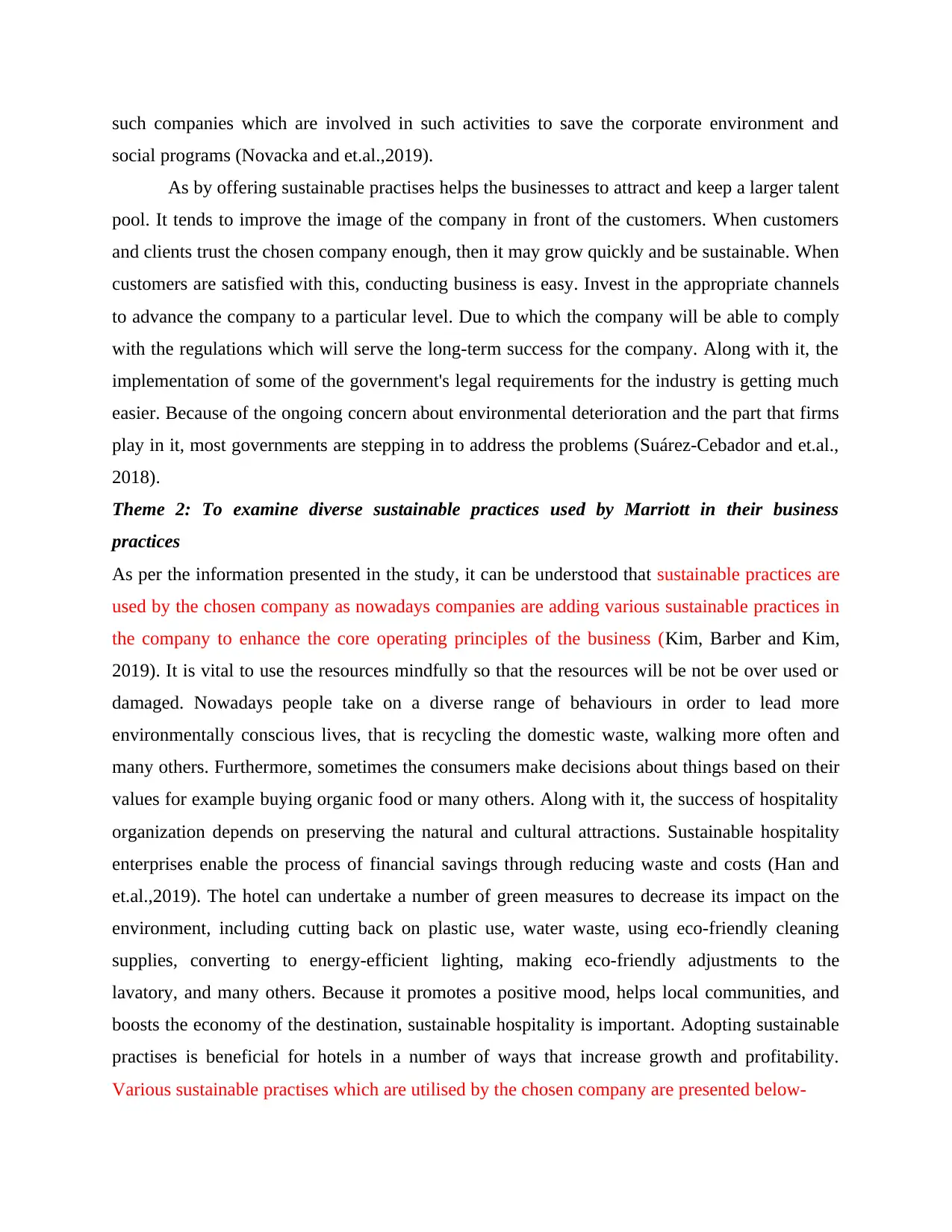
such companies which are involved in such activities to save the corporate environment and
social programs (Novacka and et.al.,2019).
As by offering sustainable practises helps the businesses to attract and keep a larger talent
pool. It tends to improve the image of the company in front of the customers. When customers
and clients trust the chosen company enough, then it may grow quickly and be sustainable. When
customers are satisfied with this, conducting business is easy. Invest in the appropriate channels
to advance the company to a particular level. Due to which the company will be able to comply
with the regulations which will serve the long-term success for the company. Along with it, the
implementation of some of the government's legal requirements for the industry is getting much
easier. Because of the ongoing concern about environmental deterioration and the part that firms
play in it, most governments are stepping in to address the problems (Suárez‐Cebador and et.al.,
2018).
Theme 2: To examine diverse sustainable practices used by Marriott in their business
practices
As per the information presented in the study, it can be understood that sustainable practices are
used by the chosen company as nowadays companies are adding various sustainable practices in
the company to enhance the core operating principles of the business (Kim, Barber and Kim,
2019). It is vital to use the resources mindfully so that the resources will be not be over used or
damaged. Nowadays people take on a diverse range of behaviours in order to lead more
environmentally conscious lives, that is recycling the domestic waste, walking more often and
many others. Furthermore, sometimes the consumers make decisions about things based on their
values for example buying organic food or many others. Along with it, the success of hospitality
organization depends on preserving the natural and cultural attractions. Sustainable hospitality
enterprises enable the process of financial savings through reducing waste and costs (Han and
et.al.,2019). The hotel can undertake a number of green measures to decrease its impact on the
environment, including cutting back on plastic use, water waste, using eco-friendly cleaning
supplies, converting to energy-efficient lighting, making eco-friendly adjustments to the
lavatory, and many others. Because it promotes a positive mood, helps local communities, and
boosts the economy of the destination, sustainable hospitality is important. Adopting sustainable
practises is beneficial for hotels in a number of ways that increase growth and profitability.
Various sustainable practises which are utilised by the chosen company are presented below-
social programs (Novacka and et.al.,2019).
As by offering sustainable practises helps the businesses to attract and keep a larger talent
pool. It tends to improve the image of the company in front of the customers. When customers
and clients trust the chosen company enough, then it may grow quickly and be sustainable. When
customers are satisfied with this, conducting business is easy. Invest in the appropriate channels
to advance the company to a particular level. Due to which the company will be able to comply
with the regulations which will serve the long-term success for the company. Along with it, the
implementation of some of the government's legal requirements for the industry is getting much
easier. Because of the ongoing concern about environmental deterioration and the part that firms
play in it, most governments are stepping in to address the problems (Suárez‐Cebador and et.al.,
2018).
Theme 2: To examine diverse sustainable practices used by Marriott in their business
practices
As per the information presented in the study, it can be understood that sustainable practices are
used by the chosen company as nowadays companies are adding various sustainable practices in
the company to enhance the core operating principles of the business (Kim, Barber and Kim,
2019). It is vital to use the resources mindfully so that the resources will be not be over used or
damaged. Nowadays people take on a diverse range of behaviours in order to lead more
environmentally conscious lives, that is recycling the domestic waste, walking more often and
many others. Furthermore, sometimes the consumers make decisions about things based on their
values for example buying organic food or many others. Along with it, the success of hospitality
organization depends on preserving the natural and cultural attractions. Sustainable hospitality
enterprises enable the process of financial savings through reducing waste and costs (Han and
et.al.,2019). The hotel can undertake a number of green measures to decrease its impact on the
environment, including cutting back on plastic use, water waste, using eco-friendly cleaning
supplies, converting to energy-efficient lighting, making eco-friendly adjustments to the
lavatory, and many others. Because it promotes a positive mood, helps local communities, and
boosts the economy of the destination, sustainable hospitality is important. Adopting sustainable
practises is beneficial for hotels in a number of ways that increase growth and profitability.
Various sustainable practises which are utilised by the chosen company are presented below-
Secure Best Marks with AI Grader
Need help grading? Try our AI Grader for instant feedback on your assignments.
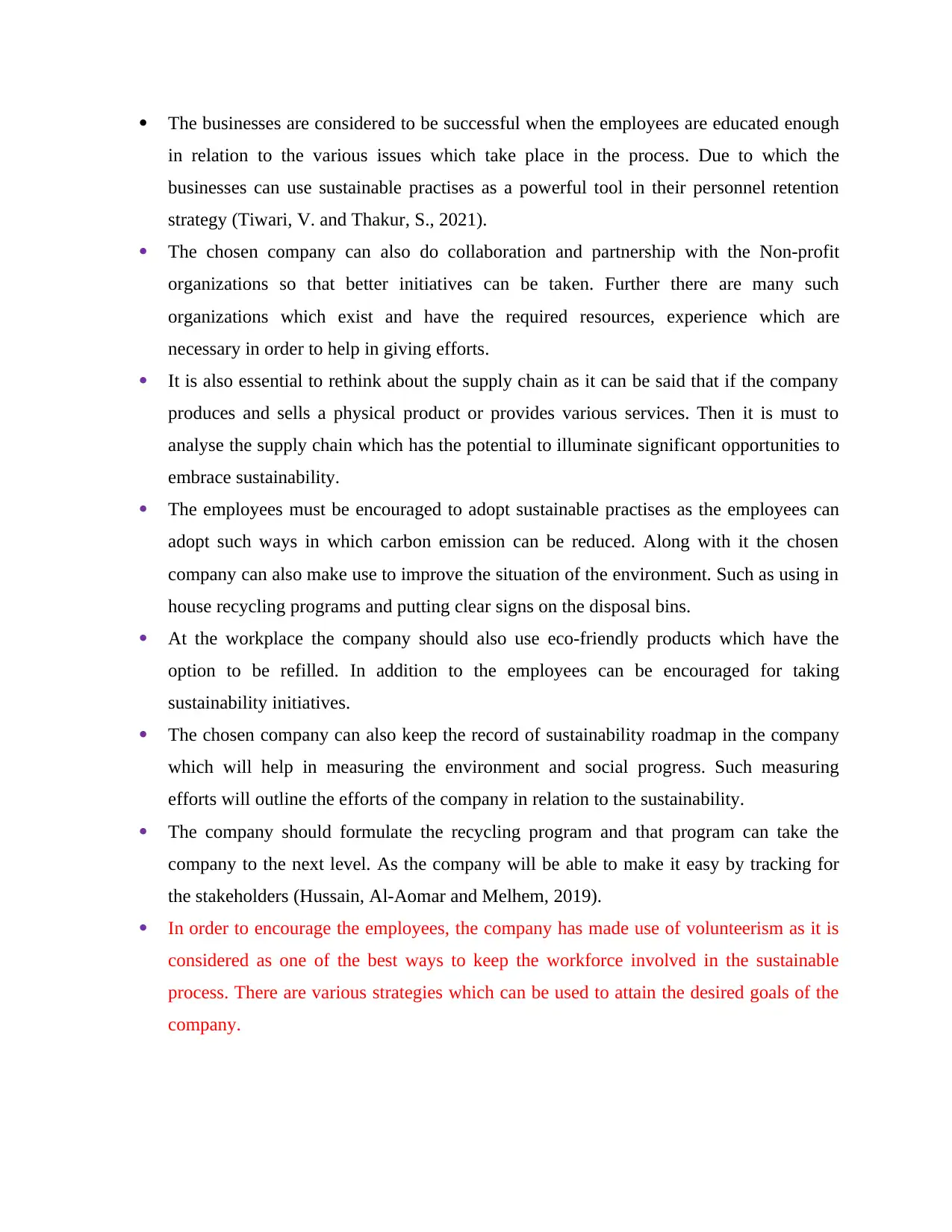
The businesses are considered to be successful when the employees are educated enough
in relation to the various issues which take place in the process. Due to which the
businesses can use sustainable practises as a powerful tool in their personnel retention
strategy (Tiwari, V. and Thakur, S., 2021).
The chosen company can also do collaboration and partnership with the Non-profit
organizations so that better initiatives can be taken. Further there are many such
organizations which exist and have the required resources, experience which are
necessary in order to help in giving efforts.
It is also essential to rethink about the supply chain as it can be said that if the company
produces and sells a physical product or provides various services. Then it is must to
analyse the supply chain which has the potential to illuminate significant opportunities to
embrace sustainability.
The employees must be encouraged to adopt sustainable practises as the employees can
adopt such ways in which carbon emission can be reduced. Along with it the chosen
company can also make use to improve the situation of the environment. Such as using in
house recycling programs and putting clear signs on the disposal bins.
At the workplace the company should also use eco-friendly products which have the
option to be refilled. In addition to the employees can be encouraged for taking
sustainability initiatives.
The chosen company can also keep the record of sustainability roadmap in the company
which will help in measuring the environment and social progress. Such measuring
efforts will outline the efforts of the company in relation to the sustainability.
The company should formulate the recycling program and that program can take the
company to the next level. As the company will be able to make it easy by tracking for
the stakeholders (Hussain, Al-Aomar and Melhem, 2019).
In order to encourage the employees, the company has made use of volunteerism as it is
considered as one of the best ways to keep the workforce involved in the sustainable
process. There are various strategies which can be used to attain the desired goals of the
company.
in relation to the various issues which take place in the process. Due to which the
businesses can use sustainable practises as a powerful tool in their personnel retention
strategy (Tiwari, V. and Thakur, S., 2021).
The chosen company can also do collaboration and partnership with the Non-profit
organizations so that better initiatives can be taken. Further there are many such
organizations which exist and have the required resources, experience which are
necessary in order to help in giving efforts.
It is also essential to rethink about the supply chain as it can be said that if the company
produces and sells a physical product or provides various services. Then it is must to
analyse the supply chain which has the potential to illuminate significant opportunities to
embrace sustainability.
The employees must be encouraged to adopt sustainable practises as the employees can
adopt such ways in which carbon emission can be reduced. Along with it the chosen
company can also make use to improve the situation of the environment. Such as using in
house recycling programs and putting clear signs on the disposal bins.
At the workplace the company should also use eco-friendly products which have the
option to be refilled. In addition to the employees can be encouraged for taking
sustainability initiatives.
The chosen company can also keep the record of sustainability roadmap in the company
which will help in measuring the environment and social progress. Such measuring
efforts will outline the efforts of the company in relation to the sustainability.
The company should formulate the recycling program and that program can take the
company to the next level. As the company will be able to make it easy by tracking for
the stakeholders (Hussain, Al-Aomar and Melhem, 2019).
In order to encourage the employees, the company has made use of volunteerism as it is
considered as one of the best ways to keep the workforce involved in the sustainable
process. There are various strategies which can be used to attain the desired goals of the
company.
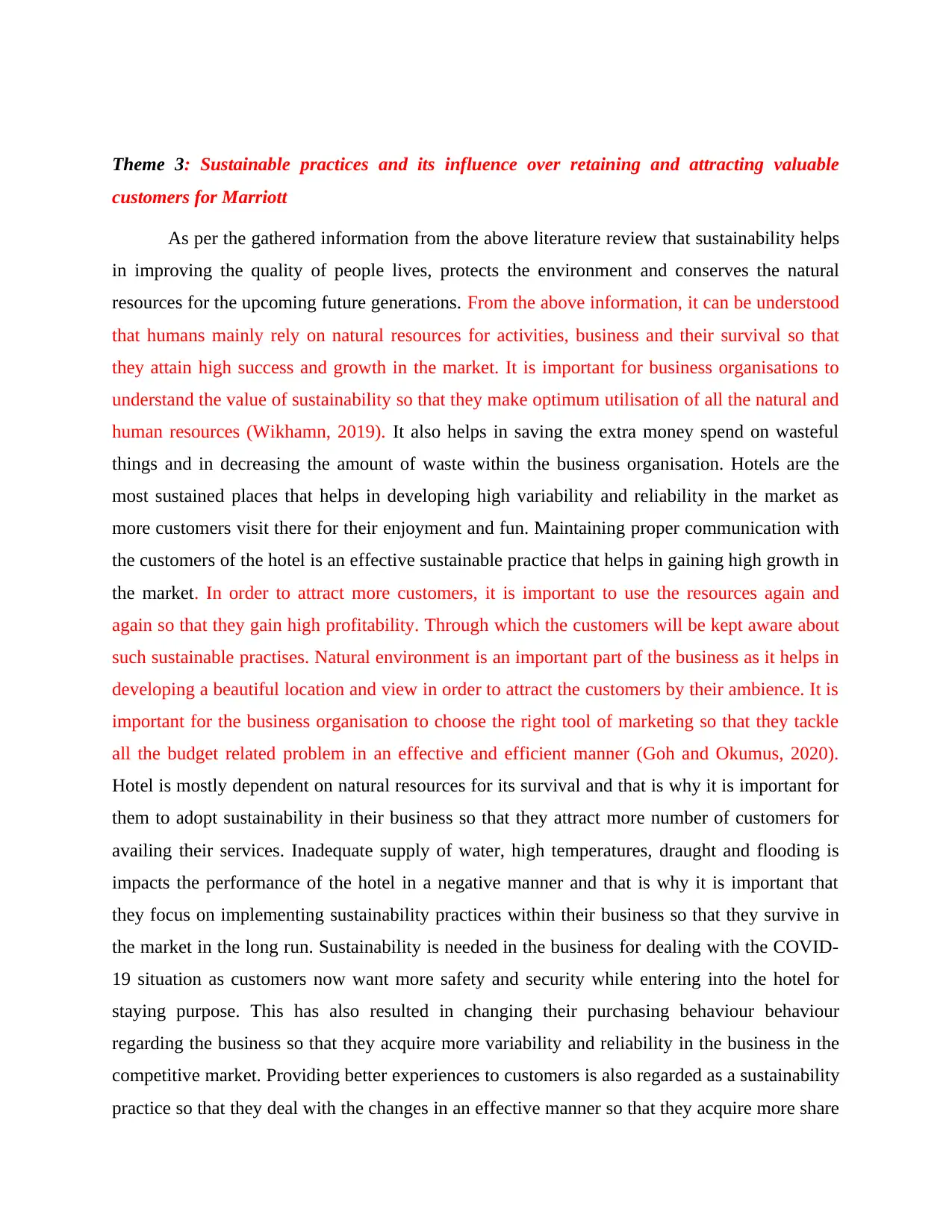
Theme 3: Sustainable practices and its influence over retaining and attracting valuable
customers for Marriott
As per the gathered information from the above literature review that sustainability helps
in improving the quality of people lives, protects the environment and conserves the natural
resources for the upcoming future generations. From the above information, it can be understood
that humans mainly rely on natural resources for activities, business and their survival so that
they attain high success and growth in the market. It is important for business organisations to
understand the value of sustainability so that they make optimum utilisation of all the natural and
human resources (Wikhamn, 2019). It also helps in saving the extra money spend on wasteful
things and in decreasing the amount of waste within the business organisation. Hotels are the
most sustained places that helps in developing high variability and reliability in the market as
more customers visit there for their enjoyment and fun. Maintaining proper communication with
the customers of the hotel is an effective sustainable practice that helps in gaining high growth in
the market. In order to attract more customers, it is important to use the resources again and
again so that they gain high profitability. Through which the customers will be kept aware about
such sustainable practises. Natural environment is an important part of the business as it helps in
developing a beautiful location and view in order to attract the customers by their ambience. It is
important for the business organisation to choose the right tool of marketing so that they tackle
all the budget related problem in an effective and efficient manner (Goh and Okumus, 2020).
Hotel is mostly dependent on natural resources for its survival and that is why it is important for
them to adopt sustainability in their business so that they attract more number of customers for
availing their services. Inadequate supply of water, high temperatures, draught and flooding is
impacts the performance of the hotel in a negative manner and that is why it is important that
they focus on implementing sustainability practices within their business so that they survive in
the market in the long run. Sustainability is needed in the business for dealing with the COVID-
19 situation as customers now want more safety and security while entering into the hotel for
staying purpose. This has also resulted in changing their purchasing behaviour behaviour
regarding the business so that they acquire more variability and reliability in the business in the
competitive market. Providing better experiences to customers is also regarded as a sustainability
practice so that they deal with the changes in an effective manner so that they acquire more share
customers for Marriott
As per the gathered information from the above literature review that sustainability helps
in improving the quality of people lives, protects the environment and conserves the natural
resources for the upcoming future generations. From the above information, it can be understood
that humans mainly rely on natural resources for activities, business and their survival so that
they attain high success and growth in the market. It is important for business organisations to
understand the value of sustainability so that they make optimum utilisation of all the natural and
human resources (Wikhamn, 2019). It also helps in saving the extra money spend on wasteful
things and in decreasing the amount of waste within the business organisation. Hotels are the
most sustained places that helps in developing high variability and reliability in the market as
more customers visit there for their enjoyment and fun. Maintaining proper communication with
the customers of the hotel is an effective sustainable practice that helps in gaining high growth in
the market. In order to attract more customers, it is important to use the resources again and
again so that they gain high profitability. Through which the customers will be kept aware about
such sustainable practises. Natural environment is an important part of the business as it helps in
developing a beautiful location and view in order to attract the customers by their ambience. It is
important for the business organisation to choose the right tool of marketing so that they tackle
all the budget related problem in an effective and efficient manner (Goh and Okumus, 2020).
Hotel is mostly dependent on natural resources for its survival and that is why it is important for
them to adopt sustainability in their business so that they attract more number of customers for
availing their services. Inadequate supply of water, high temperatures, draught and flooding is
impacts the performance of the hotel in a negative manner and that is why it is important that
they focus on implementing sustainability practices within their business so that they survive in
the market in the long run. Sustainability is needed in the business for dealing with the COVID-
19 situation as customers now want more safety and security while entering into the hotel for
staying purpose. This has also resulted in changing their purchasing behaviour behaviour
regarding the business so that they acquire more variability and reliability in the business in the
competitive market. Providing better experiences to customers is also regarded as a sustainability
practice so that they deal with the changes in an effective manner so that they acquire more share
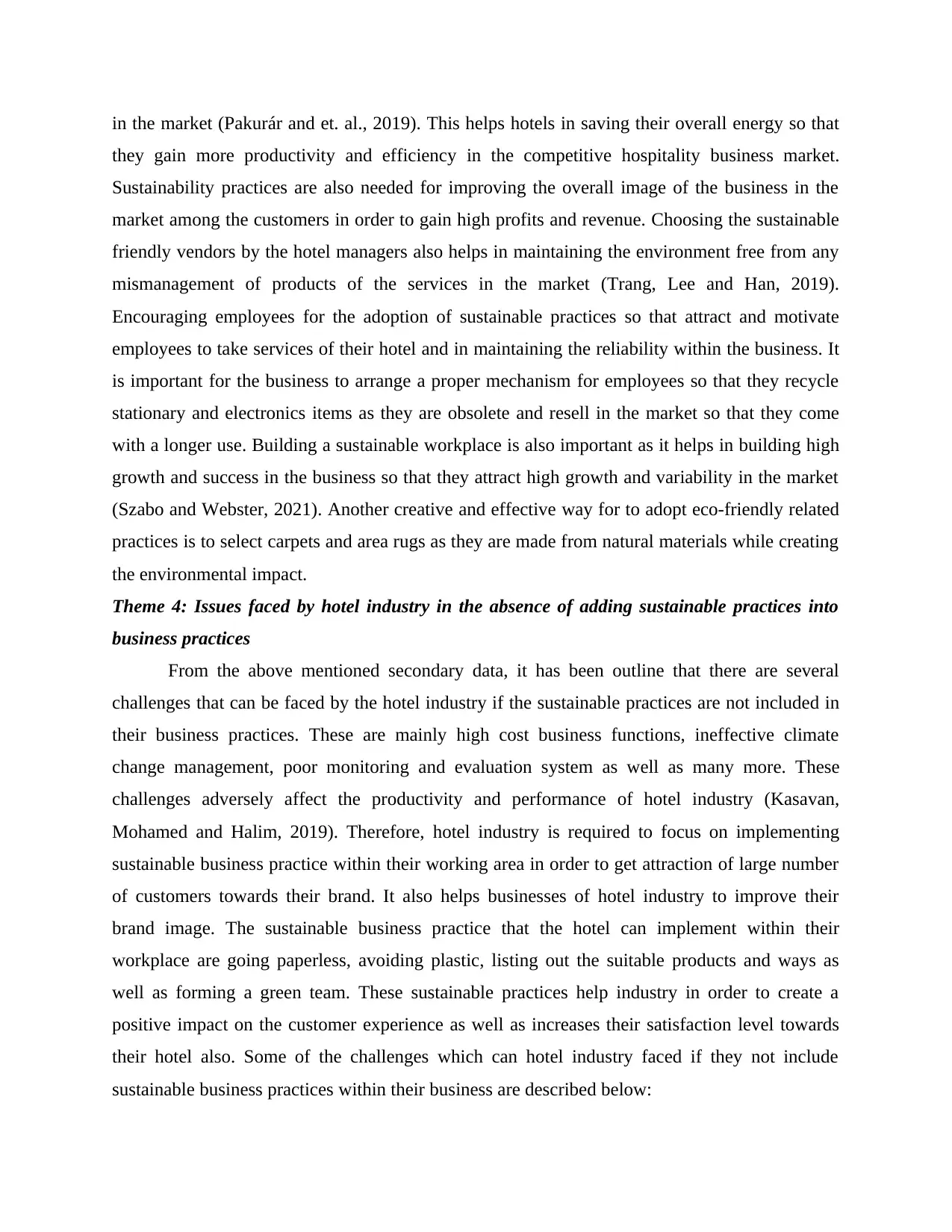
in the market (Pakurár and et. al., 2019). This helps hotels in saving their overall energy so that
they gain more productivity and efficiency in the competitive hospitality business market.
Sustainability practices are also needed for improving the overall image of the business in the
market among the customers in order to gain high profits and revenue. Choosing the sustainable
friendly vendors by the hotel managers also helps in maintaining the environment free from any
mismanagement of products of the services in the market (Trang, Lee and Han, 2019).
Encouraging employees for the adoption of sustainable practices so that attract and motivate
employees to take services of their hotel and in maintaining the reliability within the business. It
is important for the business to arrange a proper mechanism for employees so that they recycle
stationary and electronics items as they are obsolete and resell in the market so that they come
with a longer use. Building a sustainable workplace is also important as it helps in building high
growth and success in the business so that they attract high growth and variability in the market
(Szabo and Webster, 2021). Another creative and effective way for to adopt eco-friendly related
practices is to select carpets and area rugs as they are made from natural materials while creating
the environmental impact.
Theme 4: Issues faced by hotel industry in the absence of adding sustainable practices into
business practices
From the above mentioned secondary data, it has been outline that there are several
challenges that can be faced by the hotel industry if the sustainable practices are not included in
their business practices. These are mainly high cost business functions, ineffective climate
change management, poor monitoring and evaluation system as well as many more. These
challenges adversely affect the productivity and performance of hotel industry (Kasavan,
Mohamed and Halim, 2019). Therefore, hotel industry is required to focus on implementing
sustainable business practice within their working area in order to get attraction of large number
of customers towards their brand. It also helps businesses of hotel industry to improve their
brand image. The sustainable business practice that the hotel can implement within their
workplace are going paperless, avoiding plastic, listing out the suitable products and ways as
well as forming a green team. These sustainable practices help industry in order to create a
positive impact on the customer experience as well as increases their satisfaction level towards
their hotel also. Some of the challenges which can hotel industry faced if they not include
sustainable business practices within their business are described below:
they gain more productivity and efficiency in the competitive hospitality business market.
Sustainability practices are also needed for improving the overall image of the business in the
market among the customers in order to gain high profits and revenue. Choosing the sustainable
friendly vendors by the hotel managers also helps in maintaining the environment free from any
mismanagement of products of the services in the market (Trang, Lee and Han, 2019).
Encouraging employees for the adoption of sustainable practices so that attract and motivate
employees to take services of their hotel and in maintaining the reliability within the business. It
is important for the business to arrange a proper mechanism for employees so that they recycle
stationary and electronics items as they are obsolete and resell in the market so that they come
with a longer use. Building a sustainable workplace is also important as it helps in building high
growth and success in the business so that they attract high growth and variability in the market
(Szabo and Webster, 2021). Another creative and effective way for to adopt eco-friendly related
practices is to select carpets and area rugs as they are made from natural materials while creating
the environmental impact.
Theme 4: Issues faced by hotel industry in the absence of adding sustainable practices into
business practices
From the above mentioned secondary data, it has been outline that there are several
challenges that can be faced by the hotel industry if the sustainable practices are not included in
their business practices. These are mainly high cost business functions, ineffective climate
change management, poor monitoring and evaluation system as well as many more. These
challenges adversely affect the productivity and performance of hotel industry (Kasavan,
Mohamed and Halim, 2019). Therefore, hotel industry is required to focus on implementing
sustainable business practice within their working area in order to get attraction of large number
of customers towards their brand. It also helps businesses of hotel industry to improve their
brand image. The sustainable business practice that the hotel can implement within their
workplace are going paperless, avoiding plastic, listing out the suitable products and ways as
well as forming a green team. These sustainable practices help industry in order to create a
positive impact on the customer experience as well as increases their satisfaction level towards
their hotel also. Some of the challenges which can hotel industry faced if they not include
sustainable business practices within their business are described below:
Paraphrase This Document
Need a fresh take? Get an instant paraphrase of this document with our AI Paraphraser
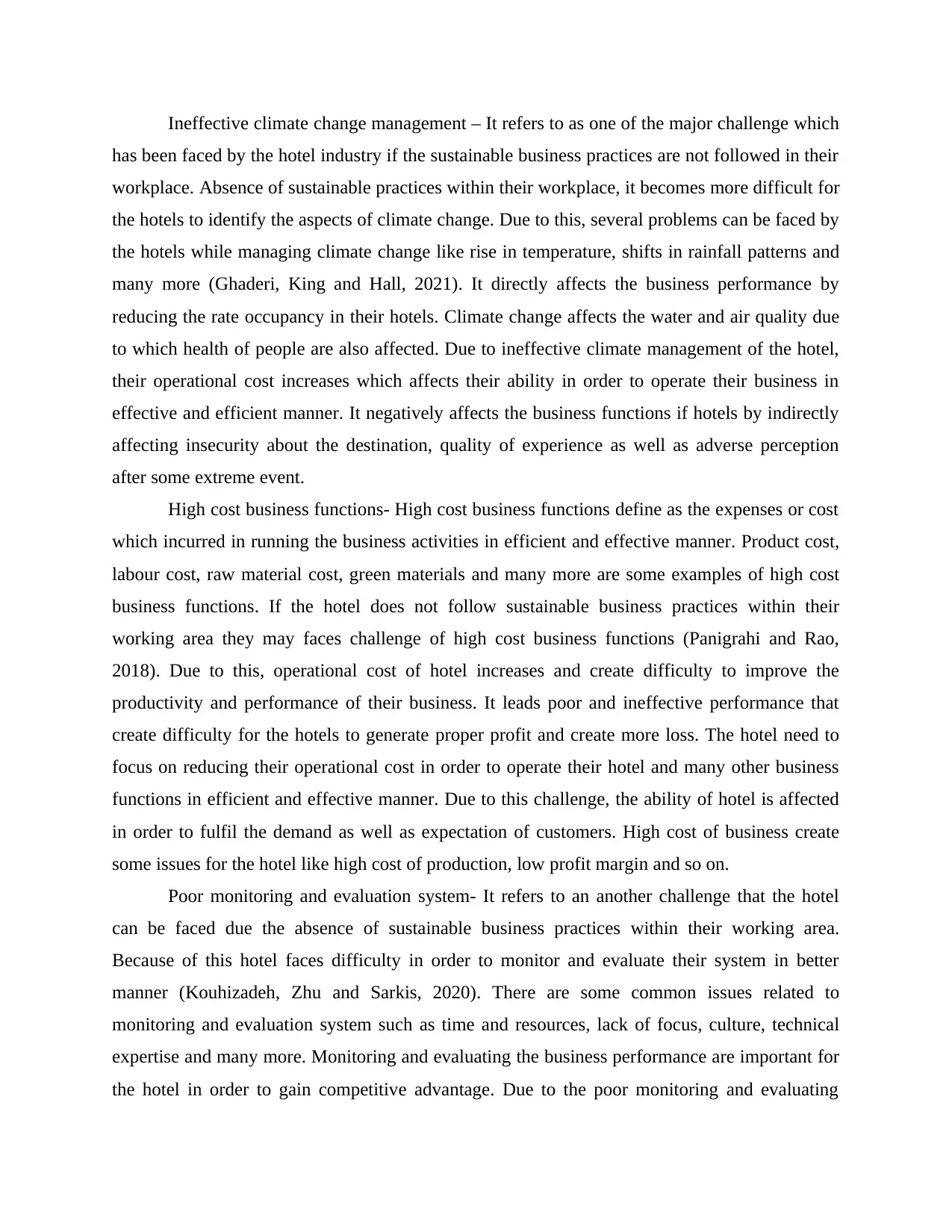
Ineffective climate change management – It refers to as one of the major challenge which
has been faced by the hotel industry if the sustainable business practices are not followed in their
workplace. Absence of sustainable practices within their workplace, it becomes more difficult for
the hotels to identify the aspects of climate change. Due to this, several problems can be faced by
the hotels while managing climate change like rise in temperature, shifts in rainfall patterns and
many more (Ghaderi, King and Hall, 2021). It directly affects the business performance by
reducing the rate occupancy in their hotels. Climate change affects the water and air quality due
to which health of people are also affected. Due to ineffective climate management of the hotel,
their operational cost increases which affects their ability in order to operate their business in
effective and efficient manner. It negatively affects the business functions if hotels by indirectly
affecting insecurity about the destination, quality of experience as well as adverse perception
after some extreme event.
High cost business functions- High cost business functions define as the expenses or cost
which incurred in running the business activities in efficient and effective manner. Product cost,
labour cost, raw material cost, green materials and many more are some examples of high cost
business functions. If the hotel does not follow sustainable business practices within their
working area they may faces challenge of high cost business functions (Panigrahi and Rao,
2018). Due to this, operational cost of hotel increases and create difficulty to improve the
productivity and performance of their business. It leads poor and ineffective performance that
create difficulty for the hotels to generate proper profit and create more loss. The hotel need to
focus on reducing their operational cost in order to operate their hotel and many other business
functions in efficient and effective manner. Due to this challenge, the ability of hotel is affected
in order to fulfil the demand as well as expectation of customers. High cost of business create
some issues for the hotel like high cost of production, low profit margin and so on.
Poor monitoring and evaluation system- It refers to an another challenge that the hotel
can be faced due the absence of sustainable business practices within their working area.
Because of this hotel faces difficulty in order to monitor and evaluate their system in better
manner (Kouhizadeh, Zhu and Sarkis, 2020). There are some common issues related to
monitoring and evaluation system such as time and resources, lack of focus, culture, technical
expertise and many more. Monitoring and evaluating the business performance are important for
the hotel in order to gain competitive advantage. Due to the poor monitoring and evaluating
has been faced by the hotel industry if the sustainable business practices are not followed in their
workplace. Absence of sustainable practices within their workplace, it becomes more difficult for
the hotels to identify the aspects of climate change. Due to this, several problems can be faced by
the hotels while managing climate change like rise in temperature, shifts in rainfall patterns and
many more (Ghaderi, King and Hall, 2021). It directly affects the business performance by
reducing the rate occupancy in their hotels. Climate change affects the water and air quality due
to which health of people are also affected. Due to ineffective climate management of the hotel,
their operational cost increases which affects their ability in order to operate their business in
effective and efficient manner. It negatively affects the business functions if hotels by indirectly
affecting insecurity about the destination, quality of experience as well as adverse perception
after some extreme event.
High cost business functions- High cost business functions define as the expenses or cost
which incurred in running the business activities in efficient and effective manner. Product cost,
labour cost, raw material cost, green materials and many more are some examples of high cost
business functions. If the hotel does not follow sustainable business practices within their
working area they may faces challenge of high cost business functions (Panigrahi and Rao,
2018). Due to this, operational cost of hotel increases and create difficulty to improve the
productivity and performance of their business. It leads poor and ineffective performance that
create difficulty for the hotels to generate proper profit and create more loss. The hotel need to
focus on reducing their operational cost in order to operate their hotel and many other business
functions in efficient and effective manner. Due to this challenge, the ability of hotel is affected
in order to fulfil the demand as well as expectation of customers. High cost of business create
some issues for the hotel like high cost of production, low profit margin and so on.
Poor monitoring and evaluation system- It refers to an another challenge that the hotel
can be faced due the absence of sustainable business practices within their working area.
Because of this hotel faces difficulty in order to monitor and evaluate their system in better
manner (Kouhizadeh, Zhu and Sarkis, 2020). There are some common issues related to
monitoring and evaluation system such as time and resources, lack of focus, culture, technical
expertise and many more. Monitoring and evaluating the business performance are important for
the hotel in order to gain competitive advantage. Due to the poor monitoring and evaluating
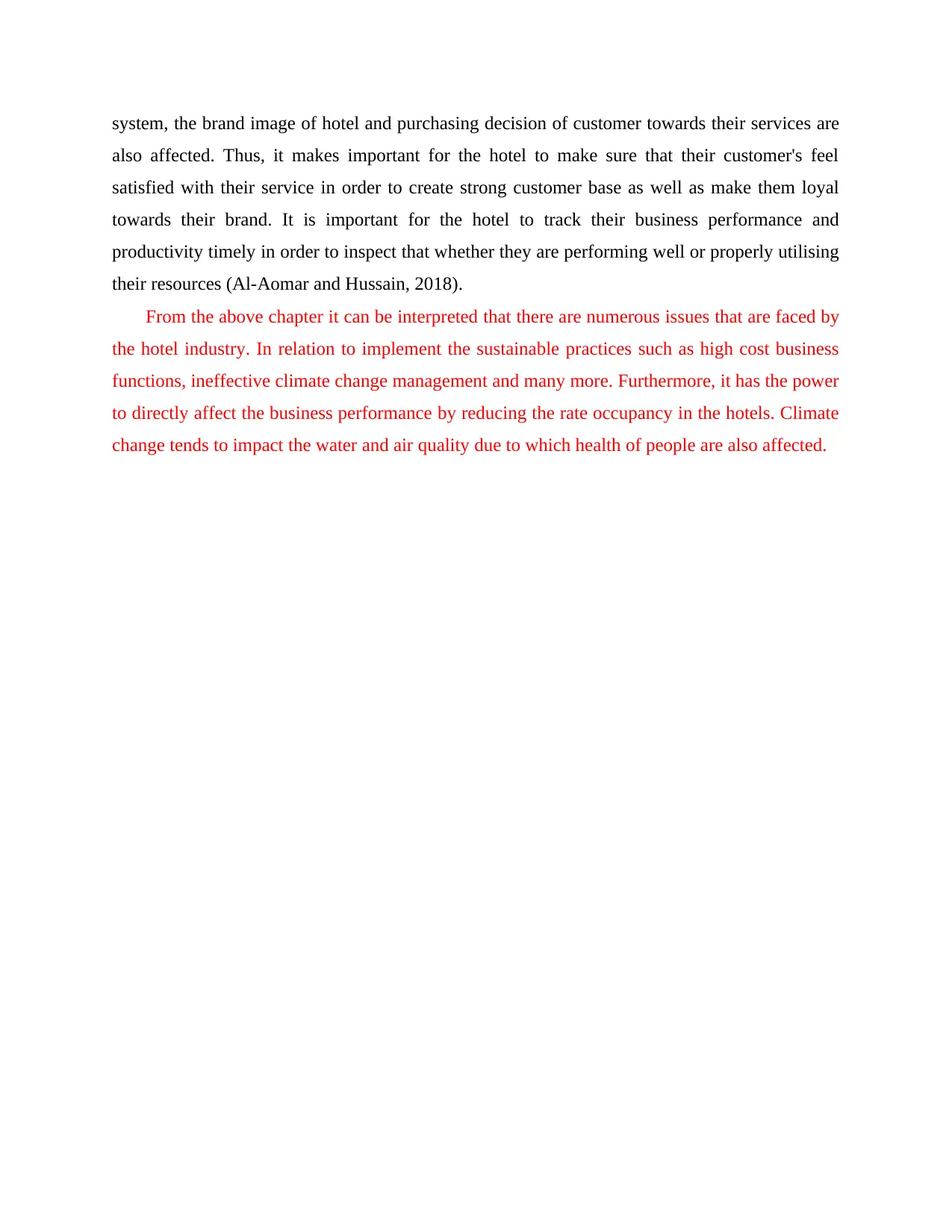
system, the brand image of hotel and purchasing decision of customer towards their services are
also affected. Thus, it makes important for the hotel to make sure that their customer's feel
satisfied with their service in order to create strong customer base as well as make them loyal
towards their brand. It is important for the hotel to track their business performance and
productivity timely in order to inspect that whether they are performing well or properly utilising
their resources (Al-Aomar and Hussain, 2018).
From the above chapter it can be interpreted that there are numerous issues that are faced by
the hotel industry. In relation to implement the sustainable practices such as high cost business
functions, ineffective climate change management and many more. Furthermore, it has the power
to directly affect the business performance by reducing the rate occupancy in the hotels. Climate
change tends to impact the water and air quality due to which health of people are also affected.
also affected. Thus, it makes important for the hotel to make sure that their customer's feel
satisfied with their service in order to create strong customer base as well as make them loyal
towards their brand. It is important for the hotel to track their business performance and
productivity timely in order to inspect that whether they are performing well or properly utilising
their resources (Al-Aomar and Hussain, 2018).
From the above chapter it can be interpreted that there are numerous issues that are faced by
the hotel industry. In relation to implement the sustainable practices such as high cost business
functions, ineffective climate change management and many more. Furthermore, it has the power
to directly affect the business performance by reducing the rate occupancy in the hotels. Climate
change tends to impact the water and air quality due to which health of people are also affected.
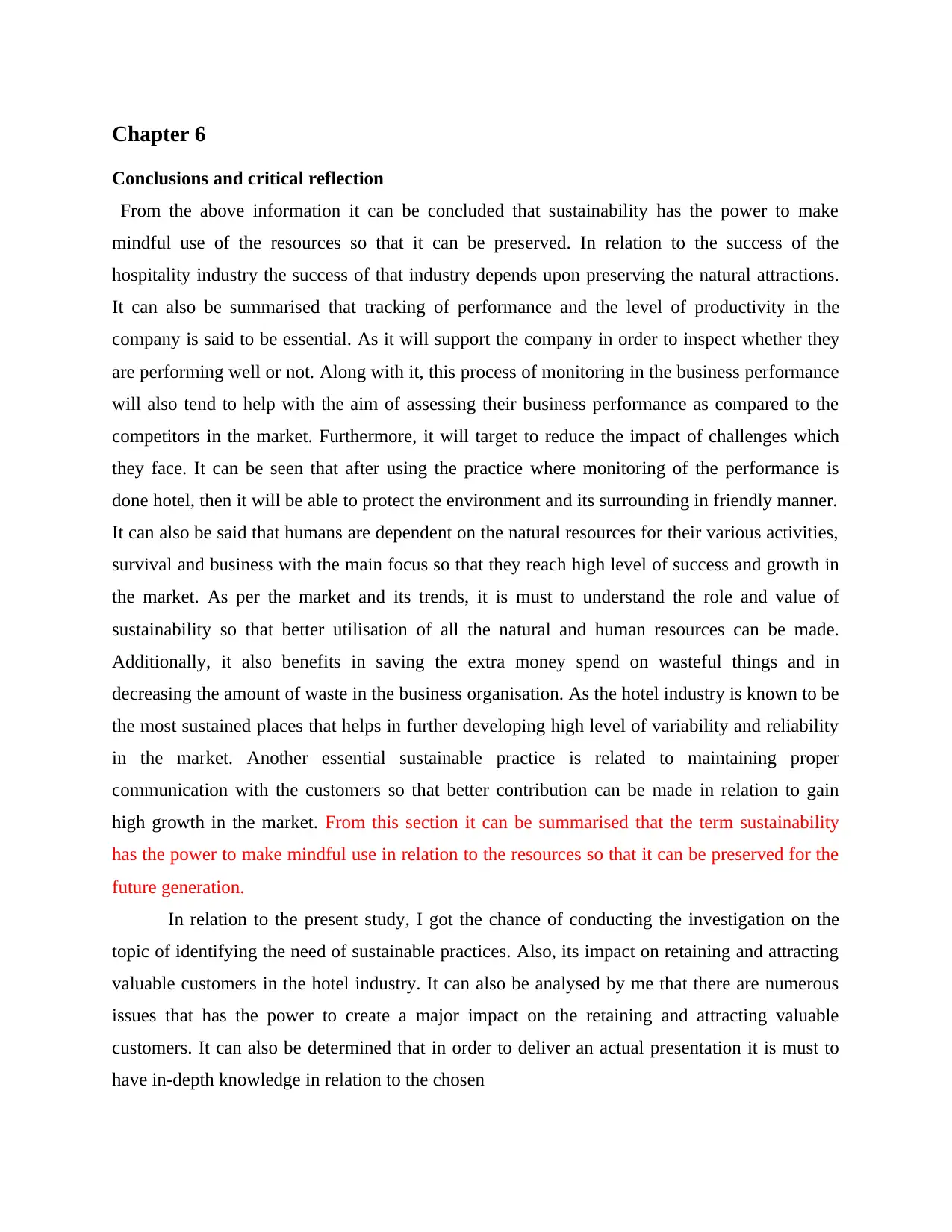
Chapter 6
Conclusions and critical reflection
From the above information it can be concluded that sustainability has the power to make
mindful use of the resources so that it can be preserved. In relation to the success of the
hospitality industry the success of that industry depends upon preserving the natural attractions.
It can also be summarised that tracking of performance and the level of productivity in the
company is said to be essential. As it will support the company in order to inspect whether they
are performing well or not. Along with it, this process of monitoring in the business performance
will also tend to help with the aim of assessing their business performance as compared to the
competitors in the market. Furthermore, it will target to reduce the impact of challenges which
they face. It can be seen that after using the practice where monitoring of the performance is
done hotel, then it will be able to protect the environment and its surrounding in friendly manner.
It can also be said that humans are dependent on the natural resources for their various activities,
survival and business with the main focus so that they reach high level of success and growth in
the market. As per the market and its trends, it is must to understand the role and value of
sustainability so that better utilisation of all the natural and human resources can be made.
Additionally, it also benefits in saving the extra money spend on wasteful things and in
decreasing the amount of waste in the business organisation. As the hotel industry is known to be
the most sustained places that helps in further developing high level of variability and reliability
in the market. Another essential sustainable practice is related to maintaining proper
communication with the customers so that better contribution can be made in relation to gain
high growth in the market. From this section it can be summarised that the term sustainability
has the power to make mindful use in relation to the resources so that it can be preserved for the
future generation.
In relation to the present study, I got the chance of conducting the investigation on the
topic of identifying the need of sustainable practices. Also, its impact on retaining and attracting
valuable customers in the hotel industry. It can also be analysed by me that there are numerous
issues that has the power to create a major impact on the retaining and attracting valuable
customers. It can also be determined that in order to deliver an actual presentation it is must to
have in-depth knowledge in relation to the chosen
Conclusions and critical reflection
From the above information it can be concluded that sustainability has the power to make
mindful use of the resources so that it can be preserved. In relation to the success of the
hospitality industry the success of that industry depends upon preserving the natural attractions.
It can also be summarised that tracking of performance and the level of productivity in the
company is said to be essential. As it will support the company in order to inspect whether they
are performing well or not. Along with it, this process of monitoring in the business performance
will also tend to help with the aim of assessing their business performance as compared to the
competitors in the market. Furthermore, it will target to reduce the impact of challenges which
they face. It can be seen that after using the practice where monitoring of the performance is
done hotel, then it will be able to protect the environment and its surrounding in friendly manner.
It can also be said that humans are dependent on the natural resources for their various activities,
survival and business with the main focus so that they reach high level of success and growth in
the market. As per the market and its trends, it is must to understand the role and value of
sustainability so that better utilisation of all the natural and human resources can be made.
Additionally, it also benefits in saving the extra money spend on wasteful things and in
decreasing the amount of waste in the business organisation. As the hotel industry is known to be
the most sustained places that helps in further developing high level of variability and reliability
in the market. Another essential sustainable practice is related to maintaining proper
communication with the customers so that better contribution can be made in relation to gain
high growth in the market. From this section it can be summarised that the term sustainability
has the power to make mindful use in relation to the resources so that it can be preserved for the
future generation.
In relation to the present study, I got the chance of conducting the investigation on the
topic of identifying the need of sustainable practices. Also, its impact on retaining and attracting
valuable customers in the hotel industry. It can also be analysed by me that there are numerous
issues that has the power to create a major impact on the retaining and attracting valuable
customers. It can also be determined that in order to deliver an actual presentation it is must to
have in-depth knowledge in relation to the chosen
Secure Best Marks with AI Grader
Need help grading? Try our AI Grader for instant feedback on your assignments.
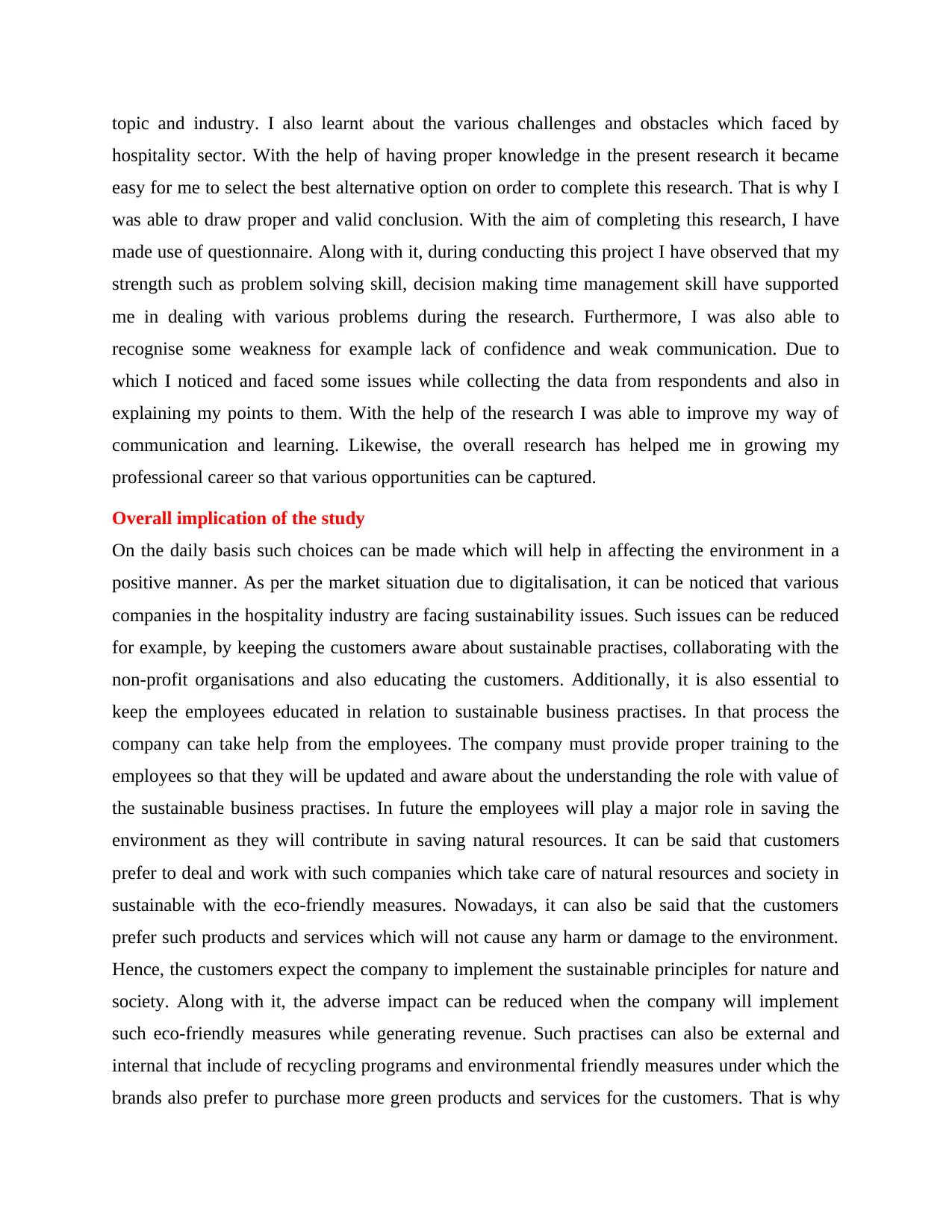
topic and industry. I also learnt about the various challenges and obstacles which faced by
hospitality sector. With the help of having proper knowledge in the present research it became
easy for me to select the best alternative option on order to complete this research. That is why I
was able to draw proper and valid conclusion. With the aim of completing this research, I have
made use of questionnaire. Along with it, during conducting this project I have observed that my
strength such as problem solving skill, decision making time management skill have supported
me in dealing with various problems during the research. Furthermore, I was also able to
recognise some weakness for example lack of confidence and weak communication. Due to
which I noticed and faced some issues while collecting the data from respondents and also in
explaining my points to them. With the help of the research I was able to improve my way of
communication and learning. Likewise, the overall research has helped me in growing my
professional career so that various opportunities can be captured.
Overall implication of the study
On the daily basis such choices can be made which will help in affecting the environment in a
positive manner. As per the market situation due to digitalisation, it can be noticed that various
companies in the hospitality industry are facing sustainability issues. Such issues can be reduced
for example, by keeping the customers aware about sustainable practises, collaborating with the
non-profit organisations and also educating the customers. Additionally, it is also essential to
keep the employees educated in relation to sustainable business practises. In that process the
company can take help from the employees. The company must provide proper training to the
employees so that they will be updated and aware about the understanding the role with value of
the sustainable business practises. In future the employees will play a major role in saving the
environment as they will contribute in saving natural resources. It can be said that customers
prefer to deal and work with such companies which take care of natural resources and society in
sustainable with the eco-friendly measures. Nowadays, it can also be said that the customers
prefer such products and services which will not cause any harm or damage to the environment.
Hence, the customers expect the company to implement the sustainable principles for nature and
society. Along with it, the adverse impact can be reduced when the company will implement
such eco-friendly measures while generating revenue. Such practises can also be external and
internal that include of recycling programs and environmental friendly measures under which the
brands also prefer to purchase more green products and services for the customers. That is why
hospitality sector. With the help of having proper knowledge in the present research it became
easy for me to select the best alternative option on order to complete this research. That is why I
was able to draw proper and valid conclusion. With the aim of completing this research, I have
made use of questionnaire. Along with it, during conducting this project I have observed that my
strength such as problem solving skill, decision making time management skill have supported
me in dealing with various problems during the research. Furthermore, I was also able to
recognise some weakness for example lack of confidence and weak communication. Due to
which I noticed and faced some issues while collecting the data from respondents and also in
explaining my points to them. With the help of the research I was able to improve my way of
communication and learning. Likewise, the overall research has helped me in growing my
professional career so that various opportunities can be captured.
Overall implication of the study
On the daily basis such choices can be made which will help in affecting the environment in a
positive manner. As per the market situation due to digitalisation, it can be noticed that various
companies in the hospitality industry are facing sustainability issues. Such issues can be reduced
for example, by keeping the customers aware about sustainable practises, collaborating with the
non-profit organisations and also educating the customers. Additionally, it is also essential to
keep the employees educated in relation to sustainable business practises. In that process the
company can take help from the employees. The company must provide proper training to the
employees so that they will be updated and aware about the understanding the role with value of
the sustainable business practises. In future the employees will play a major role in saving the
environment as they will contribute in saving natural resources. It can be said that customers
prefer to deal and work with such companies which take care of natural resources and society in
sustainable with the eco-friendly measures. Nowadays, it can also be said that the customers
prefer such products and services which will not cause any harm or damage to the environment.
Hence, the customers expect the company to implement the sustainable principles for nature and
society. Along with it, the adverse impact can be reduced when the company will implement
such eco-friendly measures while generating revenue. Such practises can also be external and
internal that include of recycling programs and environmental friendly measures under which the
brands also prefer to purchase more green products and services for the customers. That is why
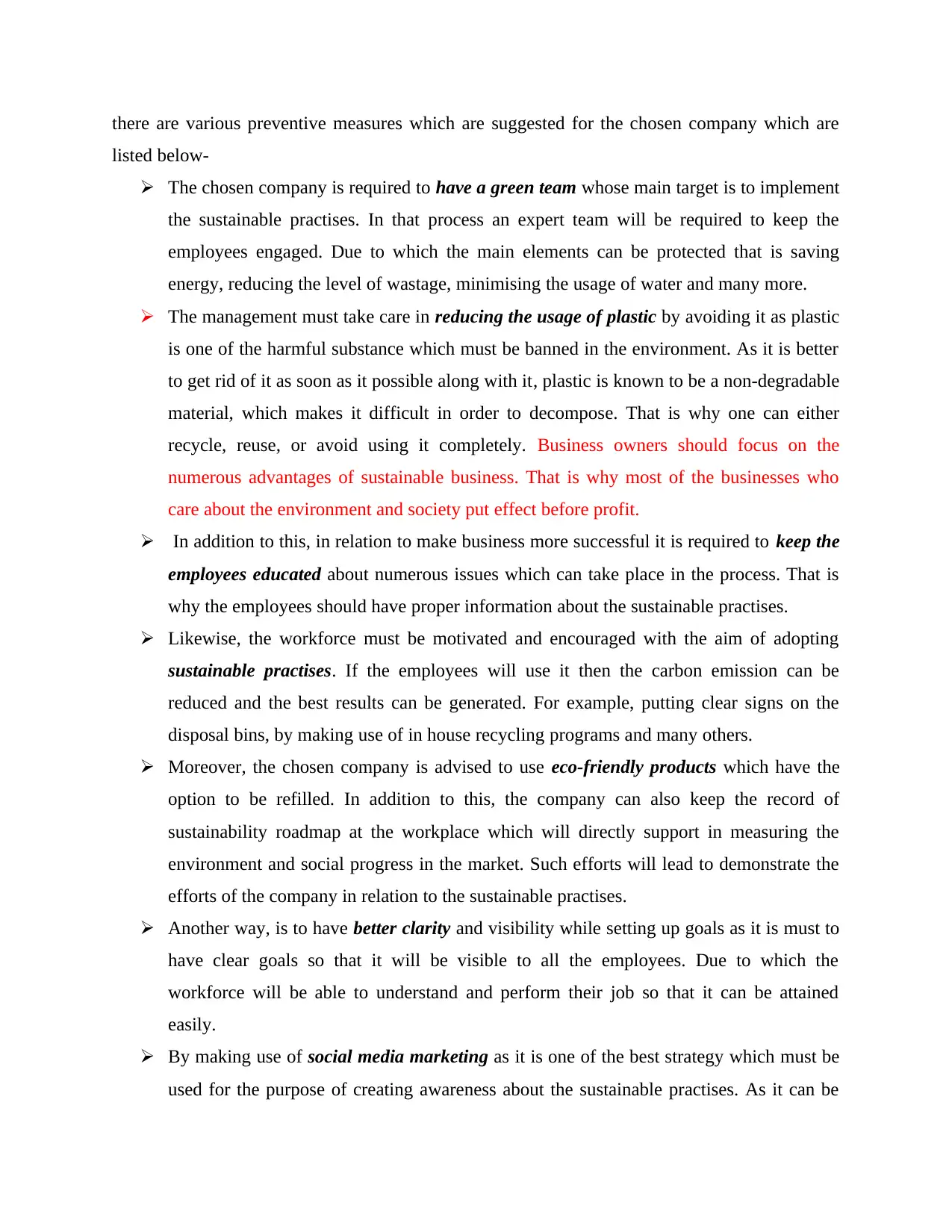
there are various preventive measures which are suggested for the chosen company which are
listed below-
The chosen company is required to have a green team whose main target is to implement
the sustainable practises. In that process an expert team will be required to keep the
employees engaged. Due to which the main elements can be protected that is saving
energy, reducing the level of wastage, minimising the usage of water and many more.
The management must take care in reducing the usage of plastic by avoiding it as plastic
is one of the harmful substance which must be banned in the environment. As it is better
to get rid of it as soon as it possible along with it, plastic is known to be a non-degradable
material, which makes it difficult in order to decompose. That is why one can either
recycle, reuse, or avoid using it completely. Business owners should focus on the
numerous advantages of sustainable business. That is why most of the businesses who
care about the environment and society put effect before profit.
In addition to this, in relation to make business more successful it is required to keep the
employees educated about numerous issues which can take place in the process. That is
why the employees should have proper information about the sustainable practises.
Likewise, the workforce must be motivated and encouraged with the aim of adopting
sustainable practises. If the employees will use it then the carbon emission can be
reduced and the best results can be generated. For example, putting clear signs on the
disposal bins, by making use of in house recycling programs and many others.
Moreover, the chosen company is advised to use eco-friendly products which have the
option to be refilled. In addition to this, the company can also keep the record of
sustainability roadmap at the workplace which will directly support in measuring the
environment and social progress in the market. Such efforts will lead to demonstrate the
efforts of the company in relation to the sustainable practises.
Another way, is to have better clarity and visibility while setting up goals as it is must to
have clear goals so that it will be visible to all the employees. Due to which the
workforce will be able to understand and perform their job so that it can be attained
easily.
By making use of social media marketing as it is one of the best strategy which must be
used for the purpose of creating awareness about the sustainable practises. As it can be
listed below-
The chosen company is required to have a green team whose main target is to implement
the sustainable practises. In that process an expert team will be required to keep the
employees engaged. Due to which the main elements can be protected that is saving
energy, reducing the level of wastage, minimising the usage of water and many more.
The management must take care in reducing the usage of plastic by avoiding it as plastic
is one of the harmful substance which must be banned in the environment. As it is better
to get rid of it as soon as it possible along with it, plastic is known to be a non-degradable
material, which makes it difficult in order to decompose. That is why one can either
recycle, reuse, or avoid using it completely. Business owners should focus on the
numerous advantages of sustainable business. That is why most of the businesses who
care about the environment and society put effect before profit.
In addition to this, in relation to make business more successful it is required to keep the
employees educated about numerous issues which can take place in the process. That is
why the employees should have proper information about the sustainable practises.
Likewise, the workforce must be motivated and encouraged with the aim of adopting
sustainable practises. If the employees will use it then the carbon emission can be
reduced and the best results can be generated. For example, putting clear signs on the
disposal bins, by making use of in house recycling programs and many others.
Moreover, the chosen company is advised to use eco-friendly products which have the
option to be refilled. In addition to this, the company can also keep the record of
sustainability roadmap at the workplace which will directly support in measuring the
environment and social progress in the market. Such efforts will lead to demonstrate the
efforts of the company in relation to the sustainable practises.
Another way, is to have better clarity and visibility while setting up goals as it is must to
have clear goals so that it will be visible to all the employees. Due to which the
workforce will be able to understand and perform their job so that it can be attained
easily.
By making use of social media marketing as it is one of the best strategy which must be
used for the purpose of creating awareness about the sustainable practises. As it can be
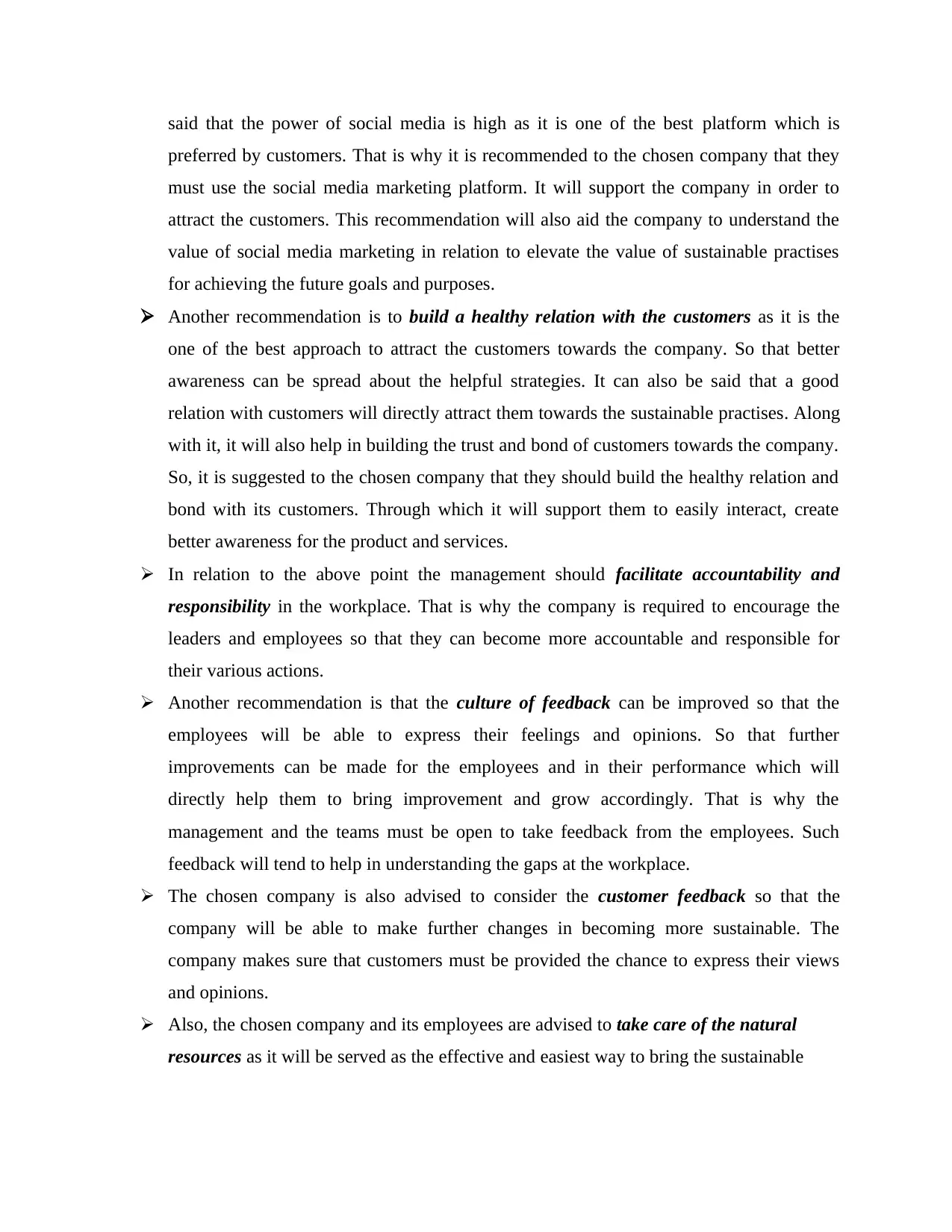
said that the power of social media is high as it is one of the best platform which is
preferred by customers. That is why it is recommended to the chosen company that they
must use the social media marketing platform. It will support the company in order to
attract the customers. This recommendation will also aid the company to understand the
value of social media marketing in relation to elevate the value of sustainable practises
for achieving the future goals and purposes.
Another recommendation is to build a healthy relation with the customers as it is the
one of the best approach to attract the customers towards the company. So that better
awareness can be spread about the helpful strategies. It can also be said that a good
relation with customers will directly attract them towards the sustainable practises. Along
with it, it will also help in building the trust and bond of customers towards the company.
So, it is suggested to the chosen company that they should build the healthy relation and
bond with its customers. Through which it will support them to easily interact, create
better awareness for the product and services.
In relation to the above point the management should facilitate accountability and
responsibility in the workplace. That is why the company is required to encourage the
leaders and employees so that they can become more accountable and responsible for
their various actions.
Another recommendation is that the culture of feedback can be improved so that the
employees will be able to express their feelings and opinions. So that further
improvements can be made for the employees and in their performance which will
directly help them to bring improvement and grow accordingly. That is why the
management and the teams must be open to take feedback from the employees. Such
feedback will tend to help in understanding the gaps at the workplace.
The chosen company is also advised to consider the customer feedback so that the
company will be able to make further changes in becoming more sustainable. The
company makes sure that customers must be provided the chance to express their views
and opinions.
Also, the chosen company and its employees are advised to take care of the natural
resources as it will be served as the effective and easiest way to bring the sustainable
preferred by customers. That is why it is recommended to the chosen company that they
must use the social media marketing platform. It will support the company in order to
attract the customers. This recommendation will also aid the company to understand the
value of social media marketing in relation to elevate the value of sustainable practises
for achieving the future goals and purposes.
Another recommendation is to build a healthy relation with the customers as it is the
one of the best approach to attract the customers towards the company. So that better
awareness can be spread about the helpful strategies. It can also be said that a good
relation with customers will directly attract them towards the sustainable practises. Along
with it, it will also help in building the trust and bond of customers towards the company.
So, it is suggested to the chosen company that they should build the healthy relation and
bond with its customers. Through which it will support them to easily interact, create
better awareness for the product and services.
In relation to the above point the management should facilitate accountability and
responsibility in the workplace. That is why the company is required to encourage the
leaders and employees so that they can become more accountable and responsible for
their various actions.
Another recommendation is that the culture of feedback can be improved so that the
employees will be able to express their feelings and opinions. So that further
improvements can be made for the employees and in their performance which will
directly help them to bring improvement and grow accordingly. That is why the
management and the teams must be open to take feedback from the employees. Such
feedback will tend to help in understanding the gaps at the workplace.
The chosen company is also advised to consider the customer feedback so that the
company will be able to make further changes in becoming more sustainable. The
company makes sure that customers must be provided the chance to express their views
and opinions.
Also, the chosen company and its employees are advised to take care of the natural
resources as it will be served as the effective and easiest way to bring the sustainable
Paraphrase This Document
Need a fresh take? Get an instant paraphrase of this document with our AI Paraphraser
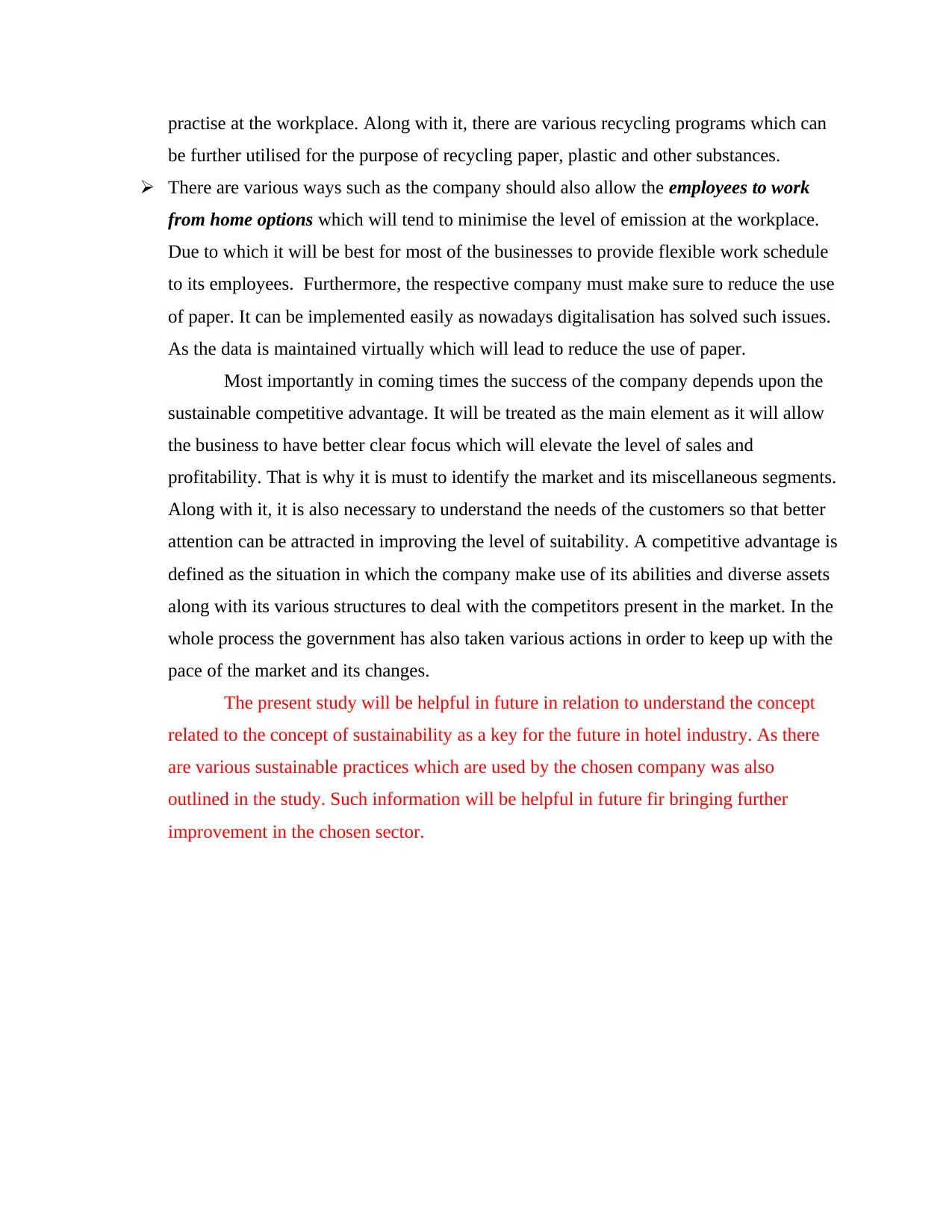
practise at the workplace. Along with it, there are various recycling programs which can
be further utilised for the purpose of recycling paper, plastic and other substances.
There are various ways such as the company should also allow the employees to work
from home options which will tend to minimise the level of emission at the workplace.
Due to which it will be best for most of the businesses to provide flexible work schedule
to its employees. Furthermore, the respective company must make sure to reduce the use
of paper. It can be implemented easily as nowadays digitalisation has solved such issues.
As the data is maintained virtually which will lead to reduce the use of paper.
Most importantly in coming times the success of the company depends upon the
sustainable competitive advantage. It will be treated as the main element as it will allow
the business to have better clear focus which will elevate the level of sales and
profitability. That is why it is must to identify the market and its miscellaneous segments.
Along with it, it is also necessary to understand the needs of the customers so that better
attention can be attracted in improving the level of suitability. A competitive advantage is
defined as the situation in which the company make use of its abilities and diverse assets
along with its various structures to deal with the competitors present in the market. In the
whole process the government has also taken various actions in order to keep up with the
pace of the market and its changes.
The present study will be helpful in future in relation to understand the concept
related to the concept of sustainability as a key for the future in hotel industry. As there
are various sustainable practices which are used by the chosen company was also
outlined in the study. Such information will be helpful in future fir bringing further
improvement in the chosen sector.
be further utilised for the purpose of recycling paper, plastic and other substances.
There are various ways such as the company should also allow the employees to work
from home options which will tend to minimise the level of emission at the workplace.
Due to which it will be best for most of the businesses to provide flexible work schedule
to its employees. Furthermore, the respective company must make sure to reduce the use
of paper. It can be implemented easily as nowadays digitalisation has solved such issues.
As the data is maintained virtually which will lead to reduce the use of paper.
Most importantly in coming times the success of the company depends upon the
sustainable competitive advantage. It will be treated as the main element as it will allow
the business to have better clear focus which will elevate the level of sales and
profitability. That is why it is must to identify the market and its miscellaneous segments.
Along with it, it is also necessary to understand the needs of the customers so that better
attention can be attracted in improving the level of suitability. A competitive advantage is
defined as the situation in which the company make use of its abilities and diverse assets
along with its various structures to deal with the competitors present in the market. In the
whole process the government has also taken various actions in order to keep up with the
pace of the market and its changes.
The present study will be helpful in future in relation to understand the concept
related to the concept of sustainability as a key for the future in hotel industry. As there
are various sustainable practices which are used by the chosen company was also
outlined in the study. Such information will be helpful in future fir bringing further
improvement in the chosen sector.
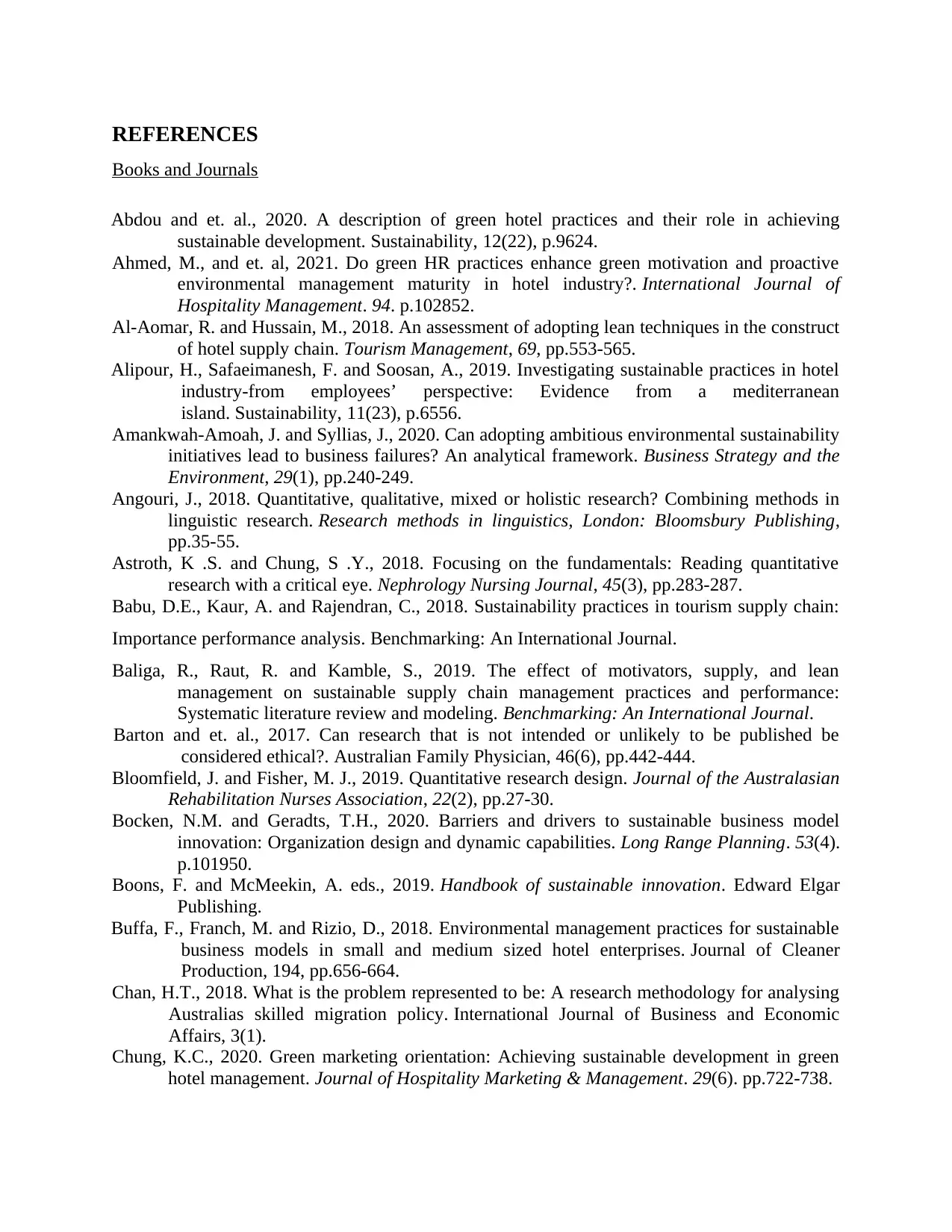
REFERENCES
Books and Journals
Abdou and et. al., 2020. A description of green hotel practices and their role in achieving
sustainable development. Sustainability, 12(22), p.9624.
Ahmed, M., and et. al, 2021. Do green HR practices enhance green motivation and proactive
environmental management maturity in hotel industry?. International Journal of
Hospitality Management. 94. p.102852.
Al-Aomar, R. and Hussain, M., 2018. An assessment of adopting lean techniques in the construct
of hotel supply chain. Tourism Management, 69, pp.553-565.
Alipour, H., Safaeimanesh, F. and Soosan, A., 2019. Investigating sustainable practices in hotel
industry-from employees’ perspective: Evidence from a mediterranean
island. Sustainability, 11(23), p.6556.
Amankwah‐Amoah, J. and Syllias, J., 2020. Can adopting ambitious environmental sustainability
initiatives lead to business failures? An analytical framework. Business Strategy and the
Environment, 29(1), pp.240-249.
Angouri, J., 2018. Quantitative, qualitative, mixed or holistic research? Combining methods in
linguistic research. Research methods in linguistics, London: Bloomsbury Publishing,
pp.35-55.
Astroth, K .S. and Chung, S .Y., 2018. Focusing on the fundamentals: Reading quantitative
research with a critical eye. Nephrology Nursing Journal, 45(3), pp.283-287.
Babu, D.E., Kaur, A. and Rajendran, C., 2018. Sustainability practices in tourism supply chain:
Importance performance analysis. Benchmarking: An International Journal.
Baliga, R., Raut, R. and Kamble, S., 2019. The effect of motivators, supply, and lean
management on sustainable supply chain management practices and performance:
Systematic literature review and modeling. Benchmarking: An International Journal.
Barton and et. al., 2017. Can research that is not intended or unlikely to be published be
considered ethical?. Australian Family Physician, 46(6), pp.442-444.
Bloomfield, J. and Fisher, M. J., 2019. Quantitative research design. Journal of the Australasian
Rehabilitation Nurses Association, 22(2), pp.27-30.
Bocken, N.M. and Geradts, T.H., 2020. Barriers and drivers to sustainable business model
innovation: Organization design and dynamic capabilities. Long Range Planning. 53(4).
p.101950.
Boons, F. and McMeekin, A. eds., 2019. Handbook of sustainable innovation. Edward Elgar
Publishing.
Buffa, F., Franch, M. and Rizio, D., 2018. Environmental management practices for sustainable
business models in small and medium sized hotel enterprises. Journal of Cleaner
Production, 194, pp.656-664.
Chan, H.T., 2018. What is the problem represented to be: A research methodology for analysing
Australias skilled migration policy. International Journal of Business and Economic
Affairs, 3(1).
Chung, K.C., 2020. Green marketing orientation: Achieving sustainable development in green
hotel management. Journal of Hospitality Marketing & Management. 29(6). pp.722-738.
Books and Journals
Abdou and et. al., 2020. A description of green hotel practices and their role in achieving
sustainable development. Sustainability, 12(22), p.9624.
Ahmed, M., and et. al, 2021. Do green HR practices enhance green motivation and proactive
environmental management maturity in hotel industry?. International Journal of
Hospitality Management. 94. p.102852.
Al-Aomar, R. and Hussain, M., 2018. An assessment of adopting lean techniques in the construct
of hotel supply chain. Tourism Management, 69, pp.553-565.
Alipour, H., Safaeimanesh, F. and Soosan, A., 2019. Investigating sustainable practices in hotel
industry-from employees’ perspective: Evidence from a mediterranean
island. Sustainability, 11(23), p.6556.
Amankwah‐Amoah, J. and Syllias, J., 2020. Can adopting ambitious environmental sustainability
initiatives lead to business failures? An analytical framework. Business Strategy and the
Environment, 29(1), pp.240-249.
Angouri, J., 2018. Quantitative, qualitative, mixed or holistic research? Combining methods in
linguistic research. Research methods in linguistics, London: Bloomsbury Publishing,
pp.35-55.
Astroth, K .S. and Chung, S .Y., 2018. Focusing on the fundamentals: Reading quantitative
research with a critical eye. Nephrology Nursing Journal, 45(3), pp.283-287.
Babu, D.E., Kaur, A. and Rajendran, C., 2018. Sustainability practices in tourism supply chain:
Importance performance analysis. Benchmarking: An International Journal.
Baliga, R., Raut, R. and Kamble, S., 2019. The effect of motivators, supply, and lean
management on sustainable supply chain management practices and performance:
Systematic literature review and modeling. Benchmarking: An International Journal.
Barton and et. al., 2017. Can research that is not intended or unlikely to be published be
considered ethical?. Australian Family Physician, 46(6), pp.442-444.
Bloomfield, J. and Fisher, M. J., 2019. Quantitative research design. Journal of the Australasian
Rehabilitation Nurses Association, 22(2), pp.27-30.
Bocken, N.M. and Geradts, T.H., 2020. Barriers and drivers to sustainable business model
innovation: Organization design and dynamic capabilities. Long Range Planning. 53(4).
p.101950.
Boons, F. and McMeekin, A. eds., 2019. Handbook of sustainable innovation. Edward Elgar
Publishing.
Buffa, F., Franch, M. and Rizio, D., 2018. Environmental management practices for sustainable
business models in small and medium sized hotel enterprises. Journal of Cleaner
Production, 194, pp.656-664.
Chan, H.T., 2018. What is the problem represented to be: A research methodology for analysing
Australias skilled migration policy. International Journal of Business and Economic
Affairs, 3(1).
Chung, K.C., 2020. Green marketing orientation: Achieving sustainable development in green
hotel management. Journal of Hospitality Marketing & Management. 29(6). pp.722-738.
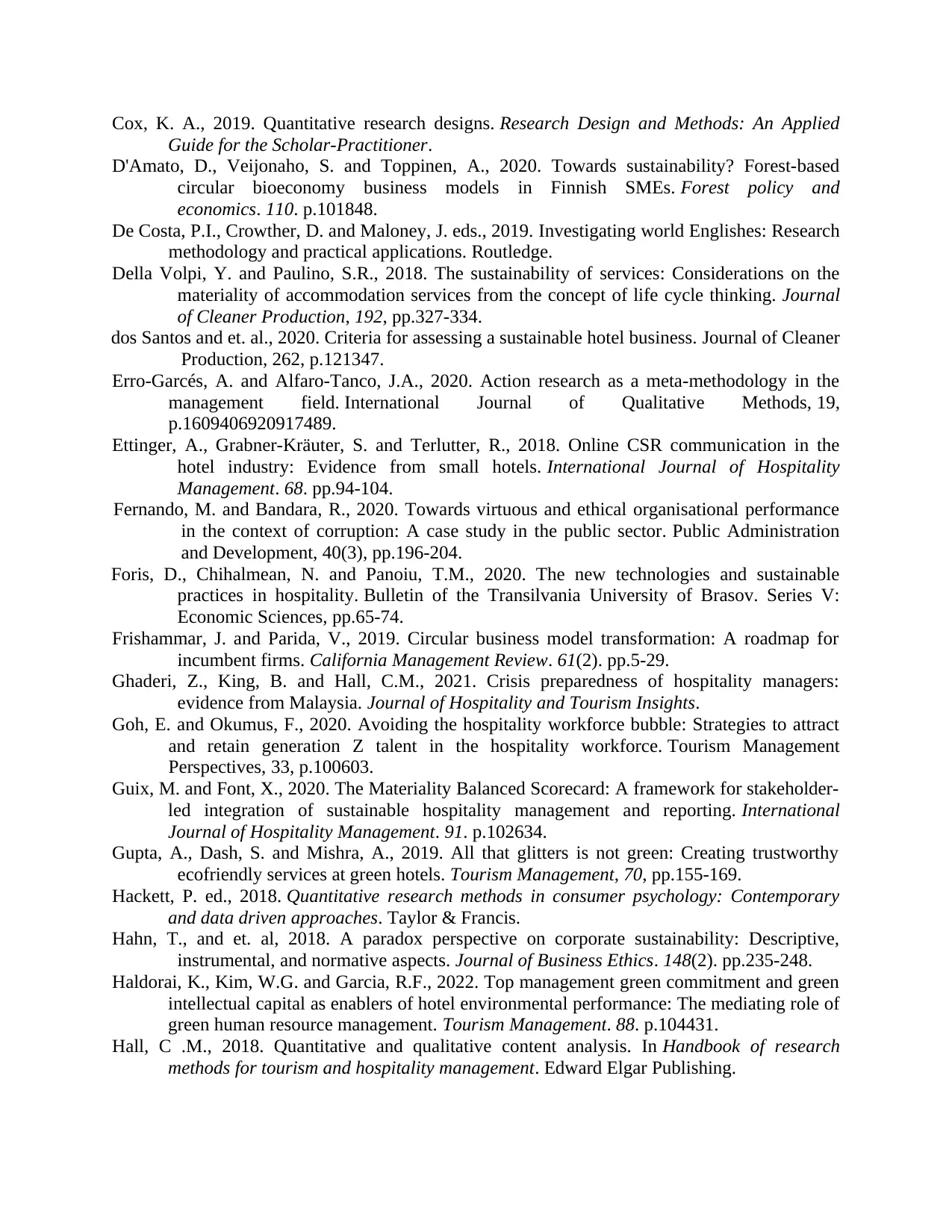
Cox, K. A., 2019. Quantitative research designs. Research Design and Methods: An Applied
Guide for the Scholar-Practitioner.
D'Amato, D., Veijonaho, S. and Toppinen, A., 2020. Towards sustainability? Forest-based
circular bioeconomy business models in Finnish SMEs. Forest policy and
economics. 110. p.101848.
De Costa, P.I., Crowther, D. and Maloney, J. eds., 2019. Investigating world Englishes: Research
methodology and practical applications. Routledge.
Della Volpi, Y. and Paulino, S.R., 2018. The sustainability of services: Considerations on the
materiality of accommodation services from the concept of life cycle thinking. Journal
of Cleaner Production, 192, pp.327-334.
dos Santos and et. al., 2020. Criteria for assessing a sustainable hotel business. Journal of Cleaner
Production, 262, p.121347.
Erro-Garcés, A. and Alfaro-Tanco, J.A., 2020. Action research as a meta-methodology in the
management field. International Journal of Qualitative Methods, 19,
p.1609406920917489.
Ettinger, A., Grabner-Kräuter, S. and Terlutter, R., 2018. Online CSR communication in the
hotel industry: Evidence from small hotels. International Journal of Hospitality
Management. 68. pp.94-104.
Fernando, M. and Bandara, R., 2020. Towards virtuous and ethical organisational performance
in the context of corruption: A case study in the public sector. Public Administration
and Development, 40(3), pp.196-204.
Foris, D., Chihalmean, N. and Panoiu, T.M., 2020. The new technologies and sustainable
practices in hospitality. Bulletin of the Transilvania University of Brasov. Series V:
Economic Sciences, pp.65-74.
Frishammar, J. and Parida, V., 2019. Circular business model transformation: A roadmap for
incumbent firms. California Management Review. 61(2). pp.5-29.
Ghaderi, Z., King, B. and Hall, C.M., 2021. Crisis preparedness of hospitality managers:
evidence from Malaysia. Journal of Hospitality and Tourism Insights.
Goh, E. and Okumus, F., 2020. Avoiding the hospitality workforce bubble: Strategies to attract
and retain generation Z talent in the hospitality workforce. Tourism Management
Perspectives, 33, p.100603.
Guix, M. and Font, X., 2020. The Materiality Balanced Scorecard: A framework for stakeholder-
led integration of sustainable hospitality management and reporting. International
Journal of Hospitality Management. 91. p.102634.
Gupta, A., Dash, S. and Mishra, A., 2019. All that glitters is not green: Creating trustworthy
ecofriendly services at green hotels. Tourism Management, 70, pp.155-169.
Hackett, P. ed., 2018. Quantitative research methods in consumer psychology: Contemporary
and data driven approaches. Taylor & Francis.
Hahn, T., and et. al, 2018. A paradox perspective on corporate sustainability: Descriptive,
instrumental, and normative aspects. Journal of Business Ethics. 148(2). pp.235-248.
Haldorai, K., Kim, W.G. and Garcia, R.F., 2022. Top management green commitment and green
intellectual capital as enablers of hotel environmental performance: The mediating role of
green human resource management. Tourism Management. 88. p.104431.
Hall, C .M., 2018. Quantitative and qualitative content analysis. In Handbook of research
methods for tourism and hospitality management. Edward Elgar Publishing.
Guide for the Scholar-Practitioner.
D'Amato, D., Veijonaho, S. and Toppinen, A., 2020. Towards sustainability? Forest-based
circular bioeconomy business models in Finnish SMEs. Forest policy and
economics. 110. p.101848.
De Costa, P.I., Crowther, D. and Maloney, J. eds., 2019. Investigating world Englishes: Research
methodology and practical applications. Routledge.
Della Volpi, Y. and Paulino, S.R., 2018. The sustainability of services: Considerations on the
materiality of accommodation services from the concept of life cycle thinking. Journal
of Cleaner Production, 192, pp.327-334.
dos Santos and et. al., 2020. Criteria for assessing a sustainable hotel business. Journal of Cleaner
Production, 262, p.121347.
Erro-Garcés, A. and Alfaro-Tanco, J.A., 2020. Action research as a meta-methodology in the
management field. International Journal of Qualitative Methods, 19,
p.1609406920917489.
Ettinger, A., Grabner-Kräuter, S. and Terlutter, R., 2018. Online CSR communication in the
hotel industry: Evidence from small hotels. International Journal of Hospitality
Management. 68. pp.94-104.
Fernando, M. and Bandara, R., 2020. Towards virtuous and ethical organisational performance
in the context of corruption: A case study in the public sector. Public Administration
and Development, 40(3), pp.196-204.
Foris, D., Chihalmean, N. and Panoiu, T.M., 2020. The new technologies and sustainable
practices in hospitality. Bulletin of the Transilvania University of Brasov. Series V:
Economic Sciences, pp.65-74.
Frishammar, J. and Parida, V., 2019. Circular business model transformation: A roadmap for
incumbent firms. California Management Review. 61(2). pp.5-29.
Ghaderi, Z., King, B. and Hall, C.M., 2021. Crisis preparedness of hospitality managers:
evidence from Malaysia. Journal of Hospitality and Tourism Insights.
Goh, E. and Okumus, F., 2020. Avoiding the hospitality workforce bubble: Strategies to attract
and retain generation Z talent in the hospitality workforce. Tourism Management
Perspectives, 33, p.100603.
Guix, M. and Font, X., 2020. The Materiality Balanced Scorecard: A framework for stakeholder-
led integration of sustainable hospitality management and reporting. International
Journal of Hospitality Management. 91. p.102634.
Gupta, A., Dash, S. and Mishra, A., 2019. All that glitters is not green: Creating trustworthy
ecofriendly services at green hotels. Tourism Management, 70, pp.155-169.
Hackett, P. ed., 2018. Quantitative research methods in consumer psychology: Contemporary
and data driven approaches. Taylor & Francis.
Hahn, T., and et. al, 2018. A paradox perspective on corporate sustainability: Descriptive,
instrumental, and normative aspects. Journal of Business Ethics. 148(2). pp.235-248.
Haldorai, K., Kim, W.G. and Garcia, R.F., 2022. Top management green commitment and green
intellectual capital as enablers of hotel environmental performance: The mediating role of
green human resource management. Tourism Management. 88. p.104431.
Hall, C .M., 2018. Quantitative and qualitative content analysis. In Handbook of research
methods for tourism and hospitality management. Edward Elgar Publishing.
Secure Best Marks with AI Grader
Need help grading? Try our AI Grader for instant feedback on your assignments.
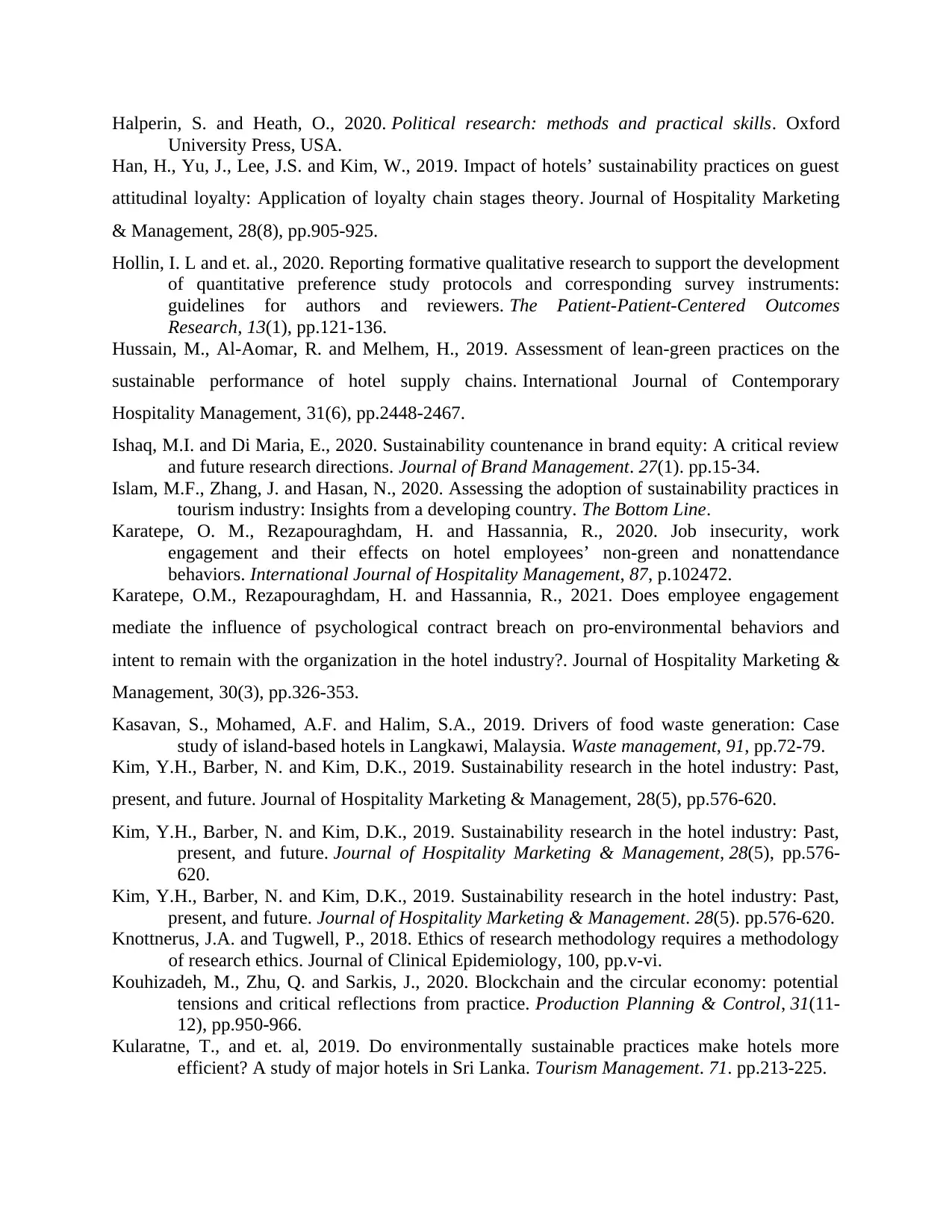
Halperin, S. and Heath, O., 2020. Political research: methods and practical skills. Oxford
University Press, USA.
Han, H., Yu, J., Lee, J.S. and Kim, W., 2019. Impact of hotels’ sustainability practices on guest
attitudinal loyalty: Application of loyalty chain stages theory. Journal of Hospitality Marketing
& Management, 28(8), pp.905-925.
Hollin, I. L and et. al., 2020. Reporting formative qualitative research to support the development
of quantitative preference study protocols and corresponding survey instruments:
guidelines for authors and reviewers. The Patient-Patient-Centered Outcomes
Research, 13(1), pp.121-136.
Hussain, M., Al-Aomar, R. and Melhem, H., 2019. Assessment of lean-green practices on the
sustainable performance of hotel supply chains. International Journal of Contemporary
Hospitality Management, 31(6), pp.2448-2467.
Ishaq, M.I. and Di Maria, E., 2020. Sustainability countenance in brand equity: A critical review
and future research directions. Journal of Brand Management. 27(1). pp.15-34.
Islam, M.F., Zhang, J. and Hasan, N., 2020. Assessing the adoption of sustainability practices in
tourism industry: Insights from a developing country. The Bottom Line.
Karatepe, O. M., Rezapouraghdam, H. and Hassannia, R., 2020. Job insecurity, work
engagement and their effects on hotel employees’ non-green and nonattendance
behaviors. International Journal of Hospitality Management, 87, p.102472.
Karatepe, O.M., Rezapouraghdam, H. and Hassannia, R., 2021. Does employee engagement
mediate the influence of psychological contract breach on pro-environmental behaviors and
intent to remain with the organization in the hotel industry?. Journal of Hospitality Marketing &
Management, 30(3), pp.326-353.
Kasavan, S., Mohamed, A.F. and Halim, S.A., 2019. Drivers of food waste generation: Case
study of island-based hotels in Langkawi, Malaysia. Waste management, 91, pp.72-79.
Kim, Y.H., Barber, N. and Kim, D.K., 2019. Sustainability research in the hotel industry: Past,
present, and future. Journal of Hospitality Marketing & Management, 28(5), pp.576-620.
Kim, Y.H., Barber, N. and Kim, D.K., 2019. Sustainability research in the hotel industry: Past,
present, and future. Journal of Hospitality Marketing & Management, 28(5), pp.576-
620.
Kim, Y.H., Barber, N. and Kim, D.K., 2019. Sustainability research in the hotel industry: Past,
present, and future. Journal of Hospitality Marketing & Management. 28(5). pp.576-620.
Knottnerus, J.A. and Tugwell, P., 2018. Ethics of research methodology requires a methodology
of research ethics. Journal of Clinical Epidemiology, 100, pp.v-vi.
Kouhizadeh, M., Zhu, Q. and Sarkis, J., 2020. Blockchain and the circular economy: potential
tensions and critical reflections from practice. Production Planning & Control, 31(11-
12), pp.950-966.
Kularatne, T., and et. al, 2019. Do environmentally sustainable practices make hotels more
efficient? A study of major hotels in Sri Lanka. Tourism Management. 71. pp.213-225.
University Press, USA.
Han, H., Yu, J., Lee, J.S. and Kim, W., 2019. Impact of hotels’ sustainability practices on guest
attitudinal loyalty: Application of loyalty chain stages theory. Journal of Hospitality Marketing
& Management, 28(8), pp.905-925.
Hollin, I. L and et. al., 2020. Reporting formative qualitative research to support the development
of quantitative preference study protocols and corresponding survey instruments:
guidelines for authors and reviewers. The Patient-Patient-Centered Outcomes
Research, 13(1), pp.121-136.
Hussain, M., Al-Aomar, R. and Melhem, H., 2019. Assessment of lean-green practices on the
sustainable performance of hotel supply chains. International Journal of Contemporary
Hospitality Management, 31(6), pp.2448-2467.
Ishaq, M.I. and Di Maria, E., 2020. Sustainability countenance in brand equity: A critical review
and future research directions. Journal of Brand Management. 27(1). pp.15-34.
Islam, M.F., Zhang, J. and Hasan, N., 2020. Assessing the adoption of sustainability practices in
tourism industry: Insights from a developing country. The Bottom Line.
Karatepe, O. M., Rezapouraghdam, H. and Hassannia, R., 2020. Job insecurity, work
engagement and their effects on hotel employees’ non-green and nonattendance
behaviors. International Journal of Hospitality Management, 87, p.102472.
Karatepe, O.M., Rezapouraghdam, H. and Hassannia, R., 2021. Does employee engagement
mediate the influence of psychological contract breach on pro-environmental behaviors and
intent to remain with the organization in the hotel industry?. Journal of Hospitality Marketing &
Management, 30(3), pp.326-353.
Kasavan, S., Mohamed, A.F. and Halim, S.A., 2019. Drivers of food waste generation: Case
study of island-based hotels in Langkawi, Malaysia. Waste management, 91, pp.72-79.
Kim, Y.H., Barber, N. and Kim, D.K., 2019. Sustainability research in the hotel industry: Past,
present, and future. Journal of Hospitality Marketing & Management, 28(5), pp.576-620.
Kim, Y.H., Barber, N. and Kim, D.K., 2019. Sustainability research in the hotel industry: Past,
present, and future. Journal of Hospitality Marketing & Management, 28(5), pp.576-
620.
Kim, Y.H., Barber, N. and Kim, D.K., 2019. Sustainability research in the hotel industry: Past,
present, and future. Journal of Hospitality Marketing & Management. 28(5). pp.576-620.
Knottnerus, J.A. and Tugwell, P., 2018. Ethics of research methodology requires a methodology
of research ethics. Journal of Clinical Epidemiology, 100, pp.v-vi.
Kouhizadeh, M., Zhu, Q. and Sarkis, J., 2020. Blockchain and the circular economy: potential
tensions and critical reflections from practice. Production Planning & Control, 31(11-
12), pp.950-966.
Kularatne, T., and et. al, 2019. Do environmentally sustainable practices make hotels more
efficient? A study of major hotels in Sri Lanka. Tourism Management. 71. pp.213-225.
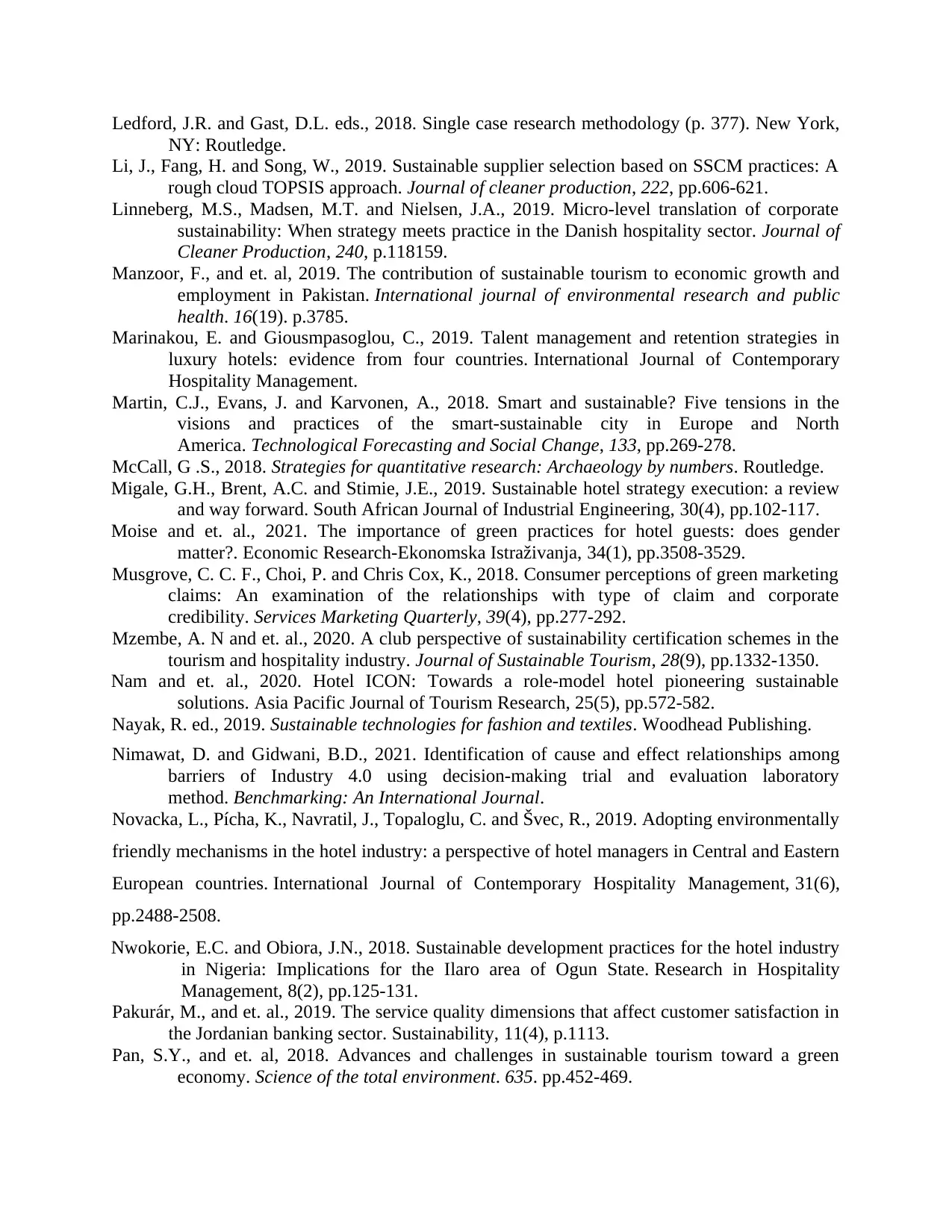
Ledford, J.R. and Gast, D.L. eds., 2018. Single case research methodology (p. 377). New York,
NY: Routledge.
Li, J., Fang, H. and Song, W., 2019. Sustainable supplier selection based on SSCM practices: A
rough cloud TOPSIS approach. Journal of cleaner production, 222, pp.606-621.
Linneberg, M.S., Madsen, M.T. and Nielsen, J.A., 2019. Micro-level translation of corporate
sustainability: When strategy meets practice in the Danish hospitality sector. Journal of
Cleaner Production, 240, p.118159.
Manzoor, F., and et. al, 2019. The contribution of sustainable tourism to economic growth and
employment in Pakistan. International journal of environmental research and public
health. 16(19). p.3785.
Marinakou, E. and Giousmpasoglou, C., 2019. Talent management and retention strategies in
luxury hotels: evidence from four countries. International Journal of Contemporary
Hospitality Management.
Martin, C.J., Evans, J. and Karvonen, A., 2018. Smart and sustainable? Five tensions in the
visions and practices of the smart-sustainable city in Europe and North
America. Technological Forecasting and Social Change, 133, pp.269-278.
McCall, G .S., 2018. Strategies for quantitative research: Archaeology by numbers. Routledge.
Migale, G.H., Brent, A.C. and Stimie, J.E., 2019. Sustainable hotel strategy execution: a review
and way forward. South African Journal of Industrial Engineering, 30(4), pp.102-117.
Moise and et. al., 2021. The importance of green practices for hotel guests: does gender
matter?. Economic Research-Ekonomska Istraživanja, 34(1), pp.3508-3529.
Musgrove, C. C. F., Choi, P. and Chris Cox, K., 2018. Consumer perceptions of green marketing
claims: An examination of the relationships with type of claim and corporate
credibility. Services Marketing Quarterly, 39(4), pp.277-292.
Mzembe, A. N and et. al., 2020. A club perspective of sustainability certification schemes in the
tourism and hospitality industry. Journal of Sustainable Tourism, 28(9), pp.1332-1350.
Nam and et. al., 2020. Hotel ICON: Towards a role-model hotel pioneering sustainable
solutions. Asia Pacific Journal of Tourism Research, 25(5), pp.572-582.
Nayak, R. ed., 2019. Sustainable technologies for fashion and textiles. Woodhead Publishing.
Nimawat, D. and Gidwani, B.D., 2021. Identification of cause and effect relationships among
barriers of Industry 4.0 using decision-making trial and evaluation laboratory
method. Benchmarking: An International Journal.
Novacka, L., Pícha, K., Navratil, J., Topaloglu, C. and Švec, R., 2019. Adopting environmentally
friendly mechanisms in the hotel industry: a perspective of hotel managers in Central and Eastern
European countries. International Journal of Contemporary Hospitality Management, 31(6),
pp.2488-2508.
Nwokorie, E.C. and Obiora, J.N., 2018. Sustainable development practices for the hotel industry
in Nigeria: Implications for the Ilaro area of Ogun State. Research in Hospitality
Management, 8(2), pp.125-131.
Pakurár, M., and et. al., 2019. The service quality dimensions that affect customer satisfaction in
the Jordanian banking sector. Sustainability, 11(4), p.1113.
Pan, S.Y., and et. al, 2018. Advances and challenges in sustainable tourism toward a green
economy. Science of the total environment. 635. pp.452-469.
NY: Routledge.
Li, J., Fang, H. and Song, W., 2019. Sustainable supplier selection based on SSCM practices: A
rough cloud TOPSIS approach. Journal of cleaner production, 222, pp.606-621.
Linneberg, M.S., Madsen, M.T. and Nielsen, J.A., 2019. Micro-level translation of corporate
sustainability: When strategy meets practice in the Danish hospitality sector. Journal of
Cleaner Production, 240, p.118159.
Manzoor, F., and et. al, 2019. The contribution of sustainable tourism to economic growth and
employment in Pakistan. International journal of environmental research and public
health. 16(19). p.3785.
Marinakou, E. and Giousmpasoglou, C., 2019. Talent management and retention strategies in
luxury hotels: evidence from four countries. International Journal of Contemporary
Hospitality Management.
Martin, C.J., Evans, J. and Karvonen, A., 2018. Smart and sustainable? Five tensions in the
visions and practices of the smart-sustainable city in Europe and North
America. Technological Forecasting and Social Change, 133, pp.269-278.
McCall, G .S., 2018. Strategies for quantitative research: Archaeology by numbers. Routledge.
Migale, G.H., Brent, A.C. and Stimie, J.E., 2019. Sustainable hotel strategy execution: a review
and way forward. South African Journal of Industrial Engineering, 30(4), pp.102-117.
Moise and et. al., 2021. The importance of green practices for hotel guests: does gender
matter?. Economic Research-Ekonomska Istraživanja, 34(1), pp.3508-3529.
Musgrove, C. C. F., Choi, P. and Chris Cox, K., 2018. Consumer perceptions of green marketing
claims: An examination of the relationships with type of claim and corporate
credibility. Services Marketing Quarterly, 39(4), pp.277-292.
Mzembe, A. N and et. al., 2020. A club perspective of sustainability certification schemes in the
tourism and hospitality industry. Journal of Sustainable Tourism, 28(9), pp.1332-1350.
Nam and et. al., 2020. Hotel ICON: Towards a role-model hotel pioneering sustainable
solutions. Asia Pacific Journal of Tourism Research, 25(5), pp.572-582.
Nayak, R. ed., 2019. Sustainable technologies for fashion and textiles. Woodhead Publishing.
Nimawat, D. and Gidwani, B.D., 2021. Identification of cause and effect relationships among
barriers of Industry 4.0 using decision-making trial and evaluation laboratory
method. Benchmarking: An International Journal.
Novacka, L., Pícha, K., Navratil, J., Topaloglu, C. and Švec, R., 2019. Adopting environmentally
friendly mechanisms in the hotel industry: a perspective of hotel managers in Central and Eastern
European countries. International Journal of Contemporary Hospitality Management, 31(6),
pp.2488-2508.
Nwokorie, E.C. and Obiora, J.N., 2018. Sustainable development practices for the hotel industry
in Nigeria: Implications for the Ilaro area of Ogun State. Research in Hospitality
Management, 8(2), pp.125-131.
Pakurár, M., and et. al., 2019. The service quality dimensions that affect customer satisfaction in
the Jordanian banking sector. Sustainability, 11(4), p.1113.
Pan, S.Y., and et. al, 2018. Advances and challenges in sustainable tourism toward a green
economy. Science of the total environment. 635. pp.452-469.
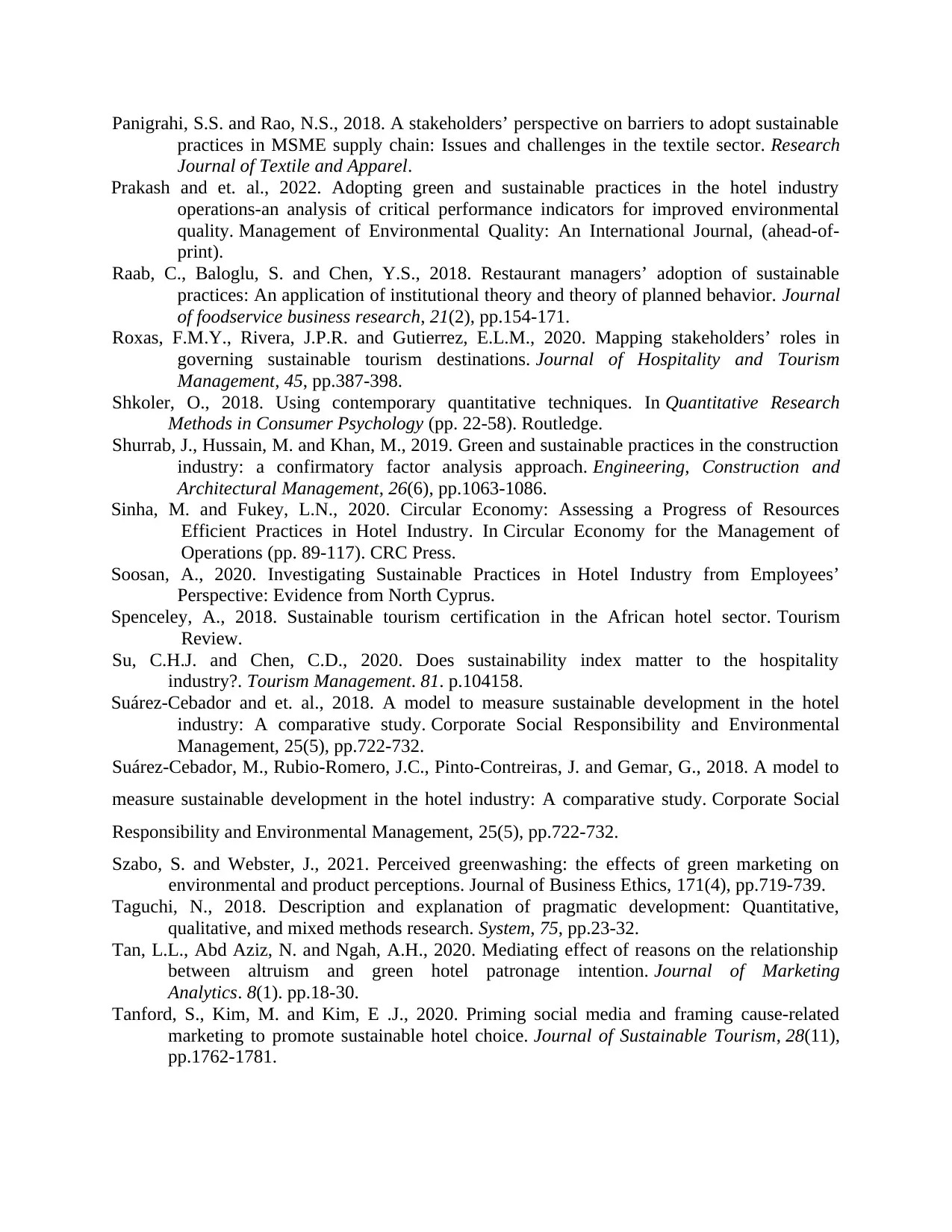
Panigrahi, S.S. and Rao, N.S., 2018. A stakeholders’ perspective on barriers to adopt sustainable
practices in MSME supply chain: Issues and challenges in the textile sector. Research
Journal of Textile and Apparel.
Prakash and et. al., 2022. Adopting green and sustainable practices in the hotel industry
operations-an analysis of critical performance indicators for improved environmental
quality. Management of Environmental Quality: An International Journal, (ahead-of-
print).
Raab, C., Baloglu, S. and Chen, Y.S., 2018. Restaurant managers’ adoption of sustainable
practices: An application of institutional theory and theory of planned behavior. Journal
of foodservice business research, 21(2), pp.154-171.
Roxas, F.M.Y., Rivera, J.P.R. and Gutierrez, E.L.M., 2020. Mapping stakeholders’ roles in
governing sustainable tourism destinations. Journal of Hospitality and Tourism
Management, 45, pp.387-398.
Shkoler, O., 2018. Using contemporary quantitative techniques. In Quantitative Research
Methods in Consumer Psychology (pp. 22-58). Routledge.
Shurrab, J., Hussain, M. and Khan, M., 2019. Green and sustainable practices in the construction
industry: a confirmatory factor analysis approach. Engineering, Construction and
Architectural Management, 26(6), pp.1063-1086.
Sinha, M. and Fukey, L.N., 2020. Circular Economy: Assessing a Progress of Resources
Efficient Practices in Hotel Industry. In Circular Economy for the Management of
Operations (pp. 89-117). CRC Press.
Soosan, A., 2020. Investigating Sustainable Practices in Hotel Industry from Employees’
Perspective: Evidence from North Cyprus.
Spenceley, A., 2018. Sustainable tourism certification in the African hotel sector. Tourism
Review.
Su, C.H.J. and Chen, C.D., 2020. Does sustainability index matter to the hospitality
industry?. Tourism Management. 81. p.104158.
Suárez‐Cebador and et. al., 2018. A model to measure sustainable development in the hotel
industry: A comparative study. Corporate Social Responsibility and Environmental
Management, 25(5), pp.722-732.
Suárez‐Cebador, M., Rubio‐Romero, J.C., Pinto‐Contreiras, J. and Gemar, G., 2018. A model to
measure sustainable development in the hotel industry: A comparative study. Corporate Social
Responsibility and Environmental Management, 25(5), pp.722-732.
Szabo, S. and Webster, J., 2021. Perceived greenwashing: the effects of green marketing on
environmental and product perceptions. Journal of Business Ethics, 171(4), pp.719-739.
Taguchi, N., 2018. Description and explanation of pragmatic development: Quantitative,
qualitative, and mixed methods research. System, 75, pp.23-32.
Tan, L.L., Abd Aziz, N. and Ngah, A.H., 2020. Mediating effect of reasons on the relationship
between altruism and green hotel patronage intention. Journal of Marketing
Analytics. 8(1). pp.18-30.
Tanford, S., Kim, M. and Kim, E .J., 2020. Priming social media and framing cause-related
marketing to promote sustainable hotel choice. Journal of Sustainable Tourism, 28(11),
pp.1762-1781.
practices in MSME supply chain: Issues and challenges in the textile sector. Research
Journal of Textile and Apparel.
Prakash and et. al., 2022. Adopting green and sustainable practices in the hotel industry
operations-an analysis of critical performance indicators for improved environmental
quality. Management of Environmental Quality: An International Journal, (ahead-of-
print).
Raab, C., Baloglu, S. and Chen, Y.S., 2018. Restaurant managers’ adoption of sustainable
practices: An application of institutional theory and theory of planned behavior. Journal
of foodservice business research, 21(2), pp.154-171.
Roxas, F.M.Y., Rivera, J.P.R. and Gutierrez, E.L.M., 2020. Mapping stakeholders’ roles in
governing sustainable tourism destinations. Journal of Hospitality and Tourism
Management, 45, pp.387-398.
Shkoler, O., 2018. Using contemporary quantitative techniques. In Quantitative Research
Methods in Consumer Psychology (pp. 22-58). Routledge.
Shurrab, J., Hussain, M. and Khan, M., 2019. Green and sustainable practices in the construction
industry: a confirmatory factor analysis approach. Engineering, Construction and
Architectural Management, 26(6), pp.1063-1086.
Sinha, M. and Fukey, L.N., 2020. Circular Economy: Assessing a Progress of Resources
Efficient Practices in Hotel Industry. In Circular Economy for the Management of
Operations (pp. 89-117). CRC Press.
Soosan, A., 2020. Investigating Sustainable Practices in Hotel Industry from Employees’
Perspective: Evidence from North Cyprus.
Spenceley, A., 2018. Sustainable tourism certification in the African hotel sector. Tourism
Review.
Su, C.H.J. and Chen, C.D., 2020. Does sustainability index matter to the hospitality
industry?. Tourism Management. 81. p.104158.
Suárez‐Cebador and et. al., 2018. A model to measure sustainable development in the hotel
industry: A comparative study. Corporate Social Responsibility and Environmental
Management, 25(5), pp.722-732.
Suárez‐Cebador, M., Rubio‐Romero, J.C., Pinto‐Contreiras, J. and Gemar, G., 2018. A model to
measure sustainable development in the hotel industry: A comparative study. Corporate Social
Responsibility and Environmental Management, 25(5), pp.722-732.
Szabo, S. and Webster, J., 2021. Perceived greenwashing: the effects of green marketing on
environmental and product perceptions. Journal of Business Ethics, 171(4), pp.719-739.
Taguchi, N., 2018. Description and explanation of pragmatic development: Quantitative,
qualitative, and mixed methods research. System, 75, pp.23-32.
Tan, L.L., Abd Aziz, N. and Ngah, A.H., 2020. Mediating effect of reasons on the relationship
between altruism and green hotel patronage intention. Journal of Marketing
Analytics. 8(1). pp.18-30.
Tanford, S., Kim, M. and Kim, E .J., 2020. Priming social media and framing cause-related
marketing to promote sustainable hotel choice. Journal of Sustainable Tourism, 28(11),
pp.1762-1781.
Paraphrase This Document
Need a fresh take? Get an instant paraphrase of this document with our AI Paraphraser
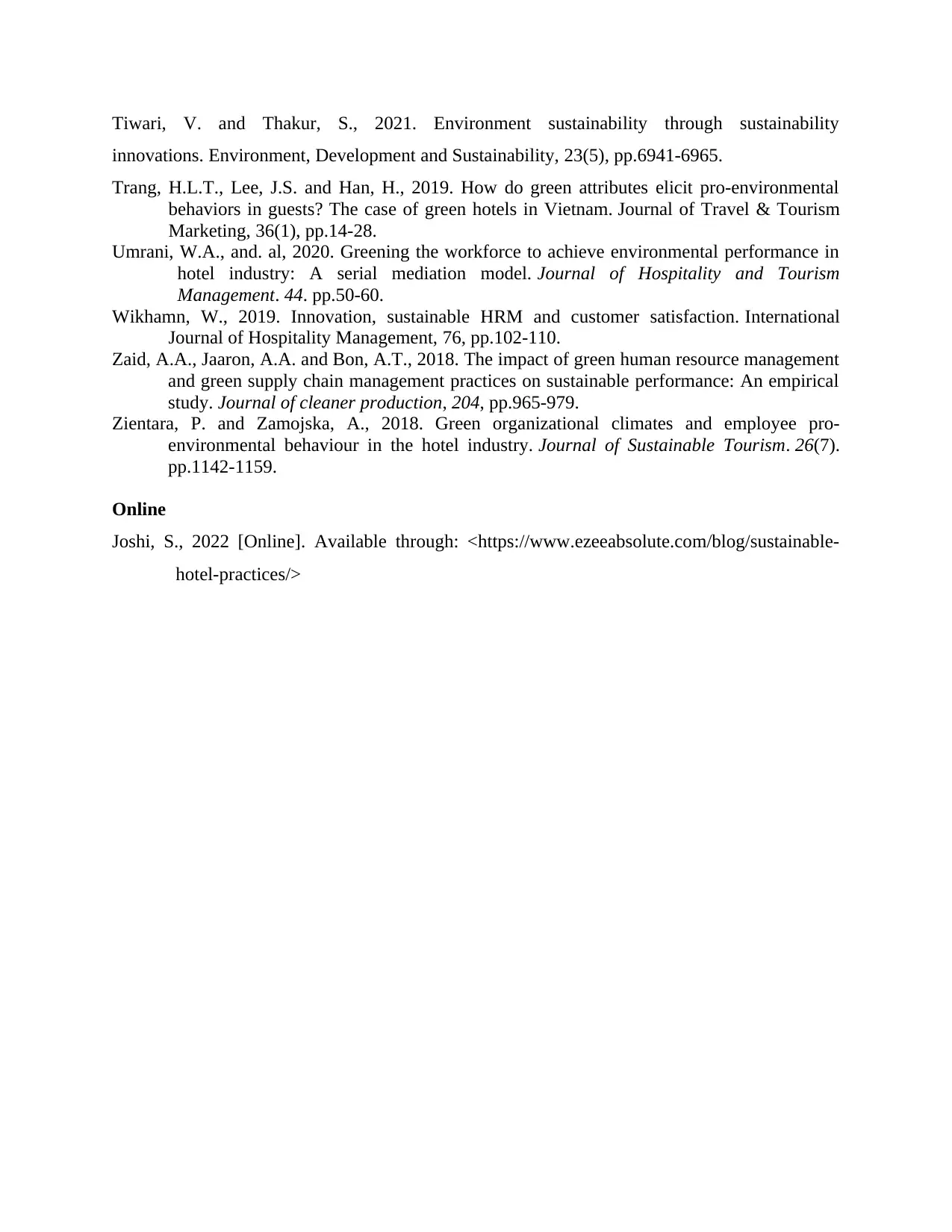
Tiwari, V. and Thakur, S., 2021. Environment sustainability through sustainability
innovations. Environment, Development and Sustainability, 23(5), pp.6941-6965.
Trang, H.L.T., Lee, J.S. and Han, H., 2019. How do green attributes elicit pro-environmental
behaviors in guests? The case of green hotels in Vietnam. Journal of Travel & Tourism
Marketing, 36(1), pp.14-28.
Umrani, W.A., and. al, 2020. Greening the workforce to achieve environmental performance in
hotel industry: A serial mediation model. Journal of Hospitality and Tourism
Management. 44. pp.50-60.
Wikhamn, W., 2019. Innovation, sustainable HRM and customer satisfaction. International
Journal of Hospitality Management, 76, pp.102-110.
Zaid, A.A., Jaaron, A.A. and Bon, A.T., 2018. The impact of green human resource management
and green supply chain management practices on sustainable performance: An empirical
study. Journal of cleaner production, 204, pp.965-979.
Zientara, P. and Zamojska, A., 2018. Green organizational climates and employee pro-
environmental behaviour in the hotel industry. Journal of Sustainable Tourism. 26(7).
pp.1142-1159.
Online
Joshi, S., 2022 [Online]. Available through: <https://www.ezeeabsolute.com/blog/sustainable-
hotel-practices/>
innovations. Environment, Development and Sustainability, 23(5), pp.6941-6965.
Trang, H.L.T., Lee, J.S. and Han, H., 2019. How do green attributes elicit pro-environmental
behaviors in guests? The case of green hotels in Vietnam. Journal of Travel & Tourism
Marketing, 36(1), pp.14-28.
Umrani, W.A., and. al, 2020. Greening the workforce to achieve environmental performance in
hotel industry: A serial mediation model. Journal of Hospitality and Tourism
Management. 44. pp.50-60.
Wikhamn, W., 2019. Innovation, sustainable HRM and customer satisfaction. International
Journal of Hospitality Management, 76, pp.102-110.
Zaid, A.A., Jaaron, A.A. and Bon, A.T., 2018. The impact of green human resource management
and green supply chain management practices on sustainable performance: An empirical
study. Journal of cleaner production, 204, pp.965-979.
Zientara, P. and Zamojska, A., 2018. Green organizational climates and employee pro-
environmental behaviour in the hotel industry. Journal of Sustainable Tourism. 26(7).
pp.1142-1159.
Online
Joshi, S., 2022 [Online]. Available through: <https://www.ezeeabsolute.com/blog/sustainable-
hotel-practices/>
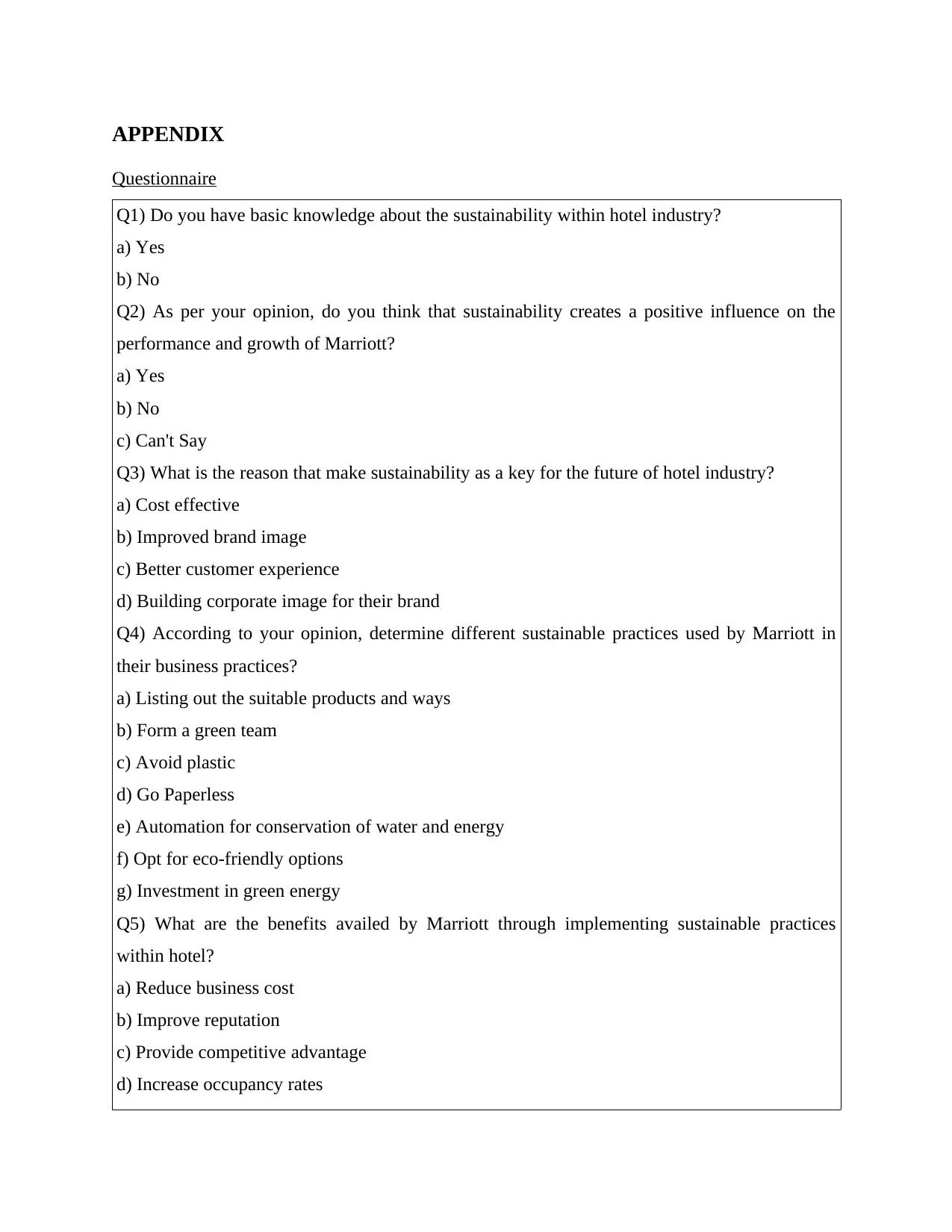
APPENDIX
Questionnaire
Q1) Do you have basic knowledge about the sustainability within hotel industry?
a) Yes
b) No
Q2) As per your opinion, do you think that sustainability creates a positive influence on the
performance and growth of Marriott?
a) Yes
b) No
c) Can't Say
Q3) What is the reason that make sustainability as a key for the future of hotel industry?
a) Cost effective
b) Improved brand image
c) Better customer experience
d) Building corporate image for their brand
Q4) According to your opinion, determine different sustainable practices used by Marriott in
their business practices?
a) Listing out the suitable products and ways
b) Form a green team
c) Avoid plastic
d) Go Paperless
e) Automation for conservation of water and energy
f) Opt for eco-friendly options
g) Investment in green energy
Q5) What are the benefits availed by Marriott through implementing sustainable practices
within hotel?
a) Reduce business cost
b) Improve reputation
c) Provide competitive advantage
d) Increase occupancy rates
Questionnaire
Q1) Do you have basic knowledge about the sustainability within hotel industry?
a) Yes
b) No
Q2) As per your opinion, do you think that sustainability creates a positive influence on the
performance and growth of Marriott?
a) Yes
b) No
c) Can't Say
Q3) What is the reason that make sustainability as a key for the future of hotel industry?
a) Cost effective
b) Improved brand image
c) Better customer experience
d) Building corporate image for their brand
Q4) According to your opinion, determine different sustainable practices used by Marriott in
their business practices?
a) Listing out the suitable products and ways
b) Form a green team
c) Avoid plastic
d) Go Paperless
e) Automation for conservation of water and energy
f) Opt for eco-friendly options
g) Investment in green energy
Q5) What are the benefits availed by Marriott through implementing sustainable practices
within hotel?
a) Reduce business cost
b) Improve reputation
c) Provide competitive advantage
d) Increase occupancy rates
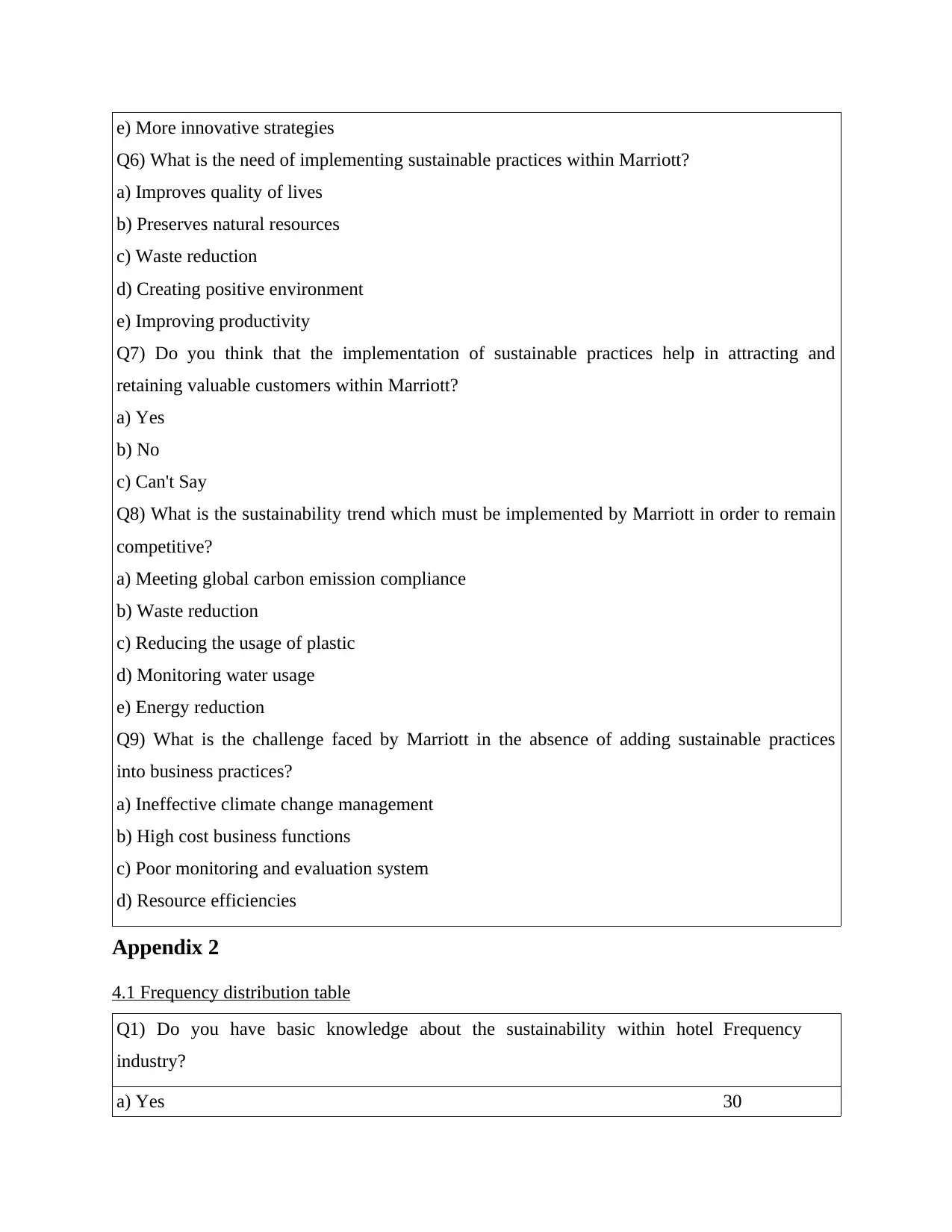
e) More innovative strategies
Q6) What is the need of implementing sustainable practices within Marriott?
a) Improves quality of lives
b) Preserves natural resources
c) Waste reduction
d) Creating positive environment
e) Improving productivity
Q7) Do you think that the implementation of sustainable practices help in attracting and
retaining valuable customers within Marriott?
a) Yes
b) No
c) Can't Say
Q8) What is the sustainability trend which must be implemented by Marriott in order to remain
competitive?
a) Meeting global carbon emission compliance
b) Waste reduction
c) Reducing the usage of plastic
d) Monitoring water usage
e) Energy reduction
Q9) What is the challenge faced by Marriott in the absence of adding sustainable practices
into business practices?
a) Ineffective climate change management
b) High cost business functions
c) Poor monitoring and evaluation system
d) Resource efficiencies
Appendix 2
4.1 Frequency distribution table
Q1) Do you have basic knowledge about the sustainability within hotel
industry?
Frequency
a) Yes 30
Q6) What is the need of implementing sustainable practices within Marriott?
a) Improves quality of lives
b) Preserves natural resources
c) Waste reduction
d) Creating positive environment
e) Improving productivity
Q7) Do you think that the implementation of sustainable practices help in attracting and
retaining valuable customers within Marriott?
a) Yes
b) No
c) Can't Say
Q8) What is the sustainability trend which must be implemented by Marriott in order to remain
competitive?
a) Meeting global carbon emission compliance
b) Waste reduction
c) Reducing the usage of plastic
d) Monitoring water usage
e) Energy reduction
Q9) What is the challenge faced by Marriott in the absence of adding sustainable practices
into business practices?
a) Ineffective climate change management
b) High cost business functions
c) Poor monitoring and evaluation system
d) Resource efficiencies
Appendix 2
4.1 Frequency distribution table
Q1) Do you have basic knowledge about the sustainability within hotel
industry?
Frequency
a) Yes 30
Secure Best Marks with AI Grader
Need help grading? Try our AI Grader for instant feedback on your assignments.
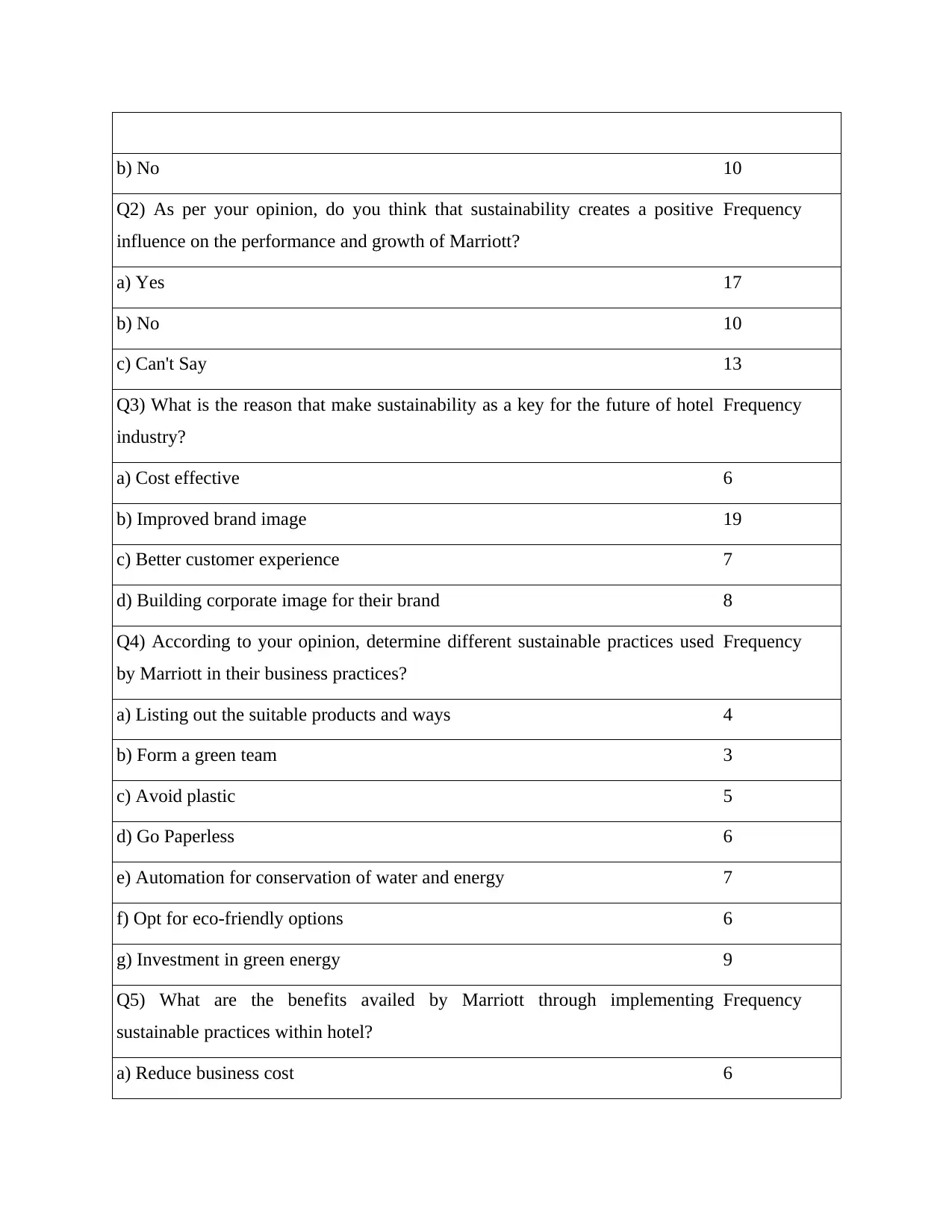
b) No 10
Q2) As per your opinion, do you think that sustainability creates a positive
influence on the performance and growth of Marriott?
Frequency
a) Yes 17
b) No 10
c) Can't Say 13
Q3) What is the reason that make sustainability as a key for the future of hotel
industry?
Frequency
a) Cost effective 6
b) Improved brand image 19
c) Better customer experience 7
d) Building corporate image for their brand 8
Q4) According to your opinion, determine different sustainable practices used
by Marriott in their business practices?
Frequency
a) Listing out the suitable products and ways 4
b) Form a green team 3
c) Avoid plastic 5
d) Go Paperless 6
e) Automation for conservation of water and energy 7
f) Opt for eco-friendly options 6
g) Investment in green energy 9
Q5) What are the benefits availed by Marriott through implementing
sustainable practices within hotel?
Frequency
a) Reduce business cost 6
Q2) As per your opinion, do you think that sustainability creates a positive
influence on the performance and growth of Marriott?
Frequency
a) Yes 17
b) No 10
c) Can't Say 13
Q3) What is the reason that make sustainability as a key for the future of hotel
industry?
Frequency
a) Cost effective 6
b) Improved brand image 19
c) Better customer experience 7
d) Building corporate image for their brand 8
Q4) According to your opinion, determine different sustainable practices used
by Marriott in their business practices?
Frequency
a) Listing out the suitable products and ways 4
b) Form a green team 3
c) Avoid plastic 5
d) Go Paperless 6
e) Automation for conservation of water and energy 7
f) Opt for eco-friendly options 6
g) Investment in green energy 9
Q5) What are the benefits availed by Marriott through implementing
sustainable practices within hotel?
Frequency
a) Reduce business cost 6
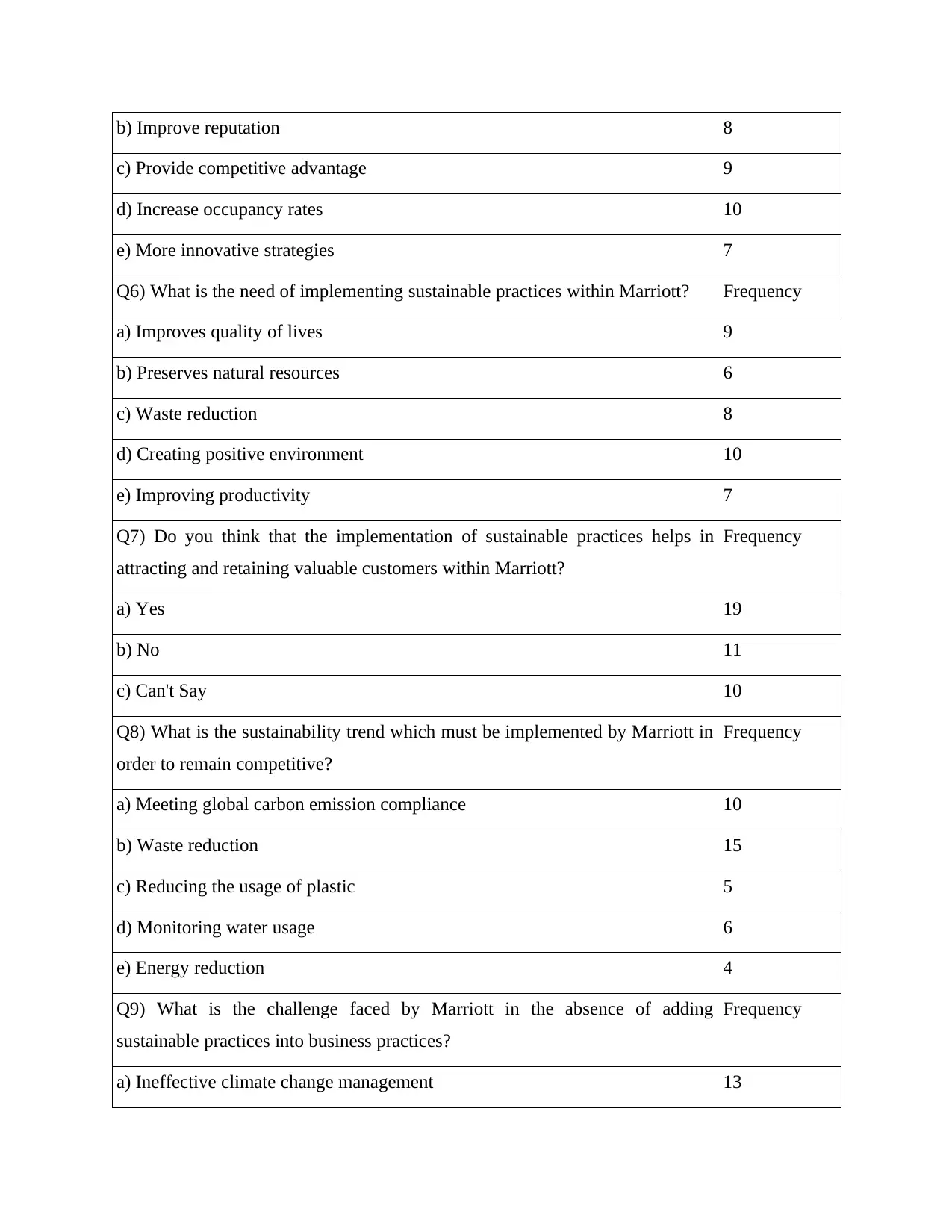
b) Improve reputation 8
c) Provide competitive advantage 9
d) Increase occupancy rates 10
e) More innovative strategies 7
Q6) What is the need of implementing sustainable practices within Marriott? Frequency
a) Improves quality of lives 9
b) Preserves natural resources 6
c) Waste reduction 8
d) Creating positive environment 10
e) Improving productivity 7
Q7) Do you think that the implementation of sustainable practices helps in
attracting and retaining valuable customers within Marriott?
Frequency
a) Yes 19
b) No 11
c) Can't Say 10
Q8) What is the sustainability trend which must be implemented by Marriott in
order to remain competitive?
Frequency
a) Meeting global carbon emission compliance 10
b) Waste reduction 15
c) Reducing the usage of plastic 5
d) Monitoring water usage 6
e) Energy reduction 4
Q9) What is the challenge faced by Marriott in the absence of adding
sustainable practices into business practices?
Frequency
a) Ineffective climate change management 13
c) Provide competitive advantage 9
d) Increase occupancy rates 10
e) More innovative strategies 7
Q6) What is the need of implementing sustainable practices within Marriott? Frequency
a) Improves quality of lives 9
b) Preserves natural resources 6
c) Waste reduction 8
d) Creating positive environment 10
e) Improving productivity 7
Q7) Do you think that the implementation of sustainable practices helps in
attracting and retaining valuable customers within Marriott?
Frequency
a) Yes 19
b) No 11
c) Can't Say 10
Q8) What is the sustainability trend which must be implemented by Marriott in
order to remain competitive?
Frequency
a) Meeting global carbon emission compliance 10
b) Waste reduction 15
c) Reducing the usage of plastic 5
d) Monitoring water usage 6
e) Energy reduction 4
Q9) What is the challenge faced by Marriott in the absence of adding
sustainable practices into business practices?
Frequency
a) Ineffective climate change management 13

b) High-cost business functions 9
c) Poor monitoring and evaluation system 10
d) Resource efficiencies 8
c) Poor monitoring and evaluation system 10
d) Resource efficiencies 8
1 out of 67
Related Documents
Your All-in-One AI-Powered Toolkit for Academic Success.
+13062052269
info@desklib.com
Available 24*7 on WhatsApp / Email
![[object Object]](/_next/static/media/star-bottom.7253800d.svg)
Unlock your academic potential
© 2024 | Zucol Services PVT LTD | All rights reserved.





